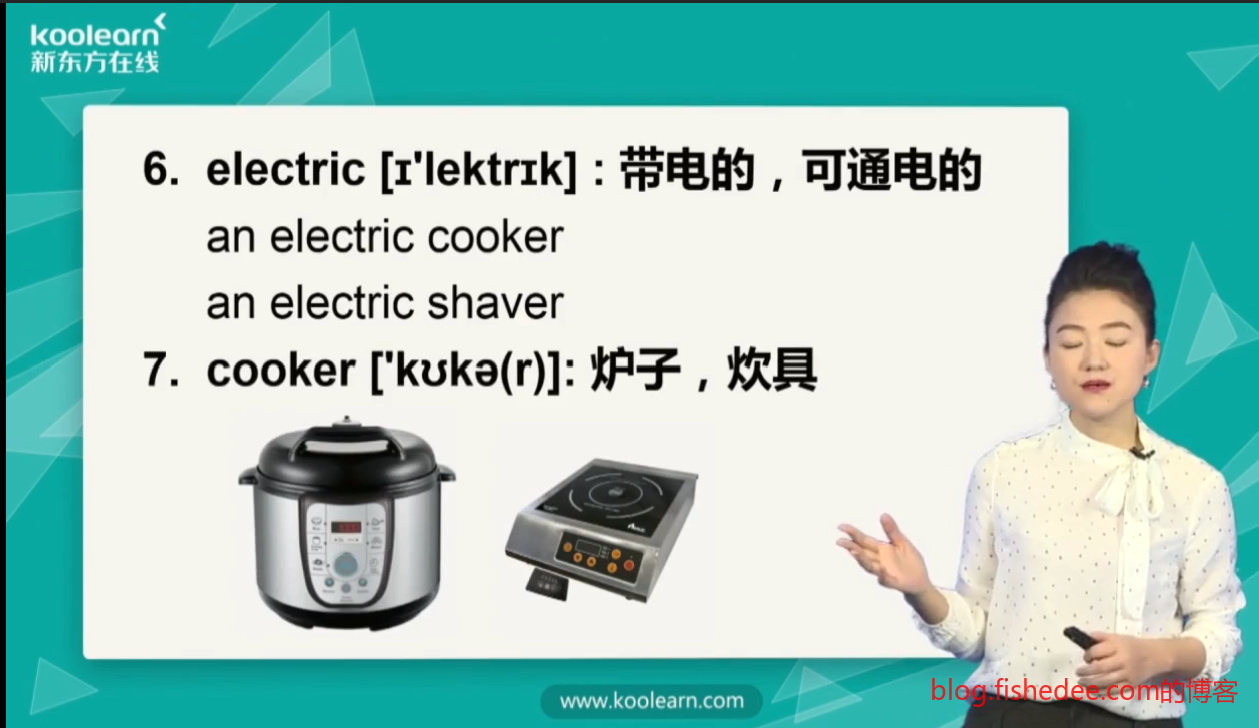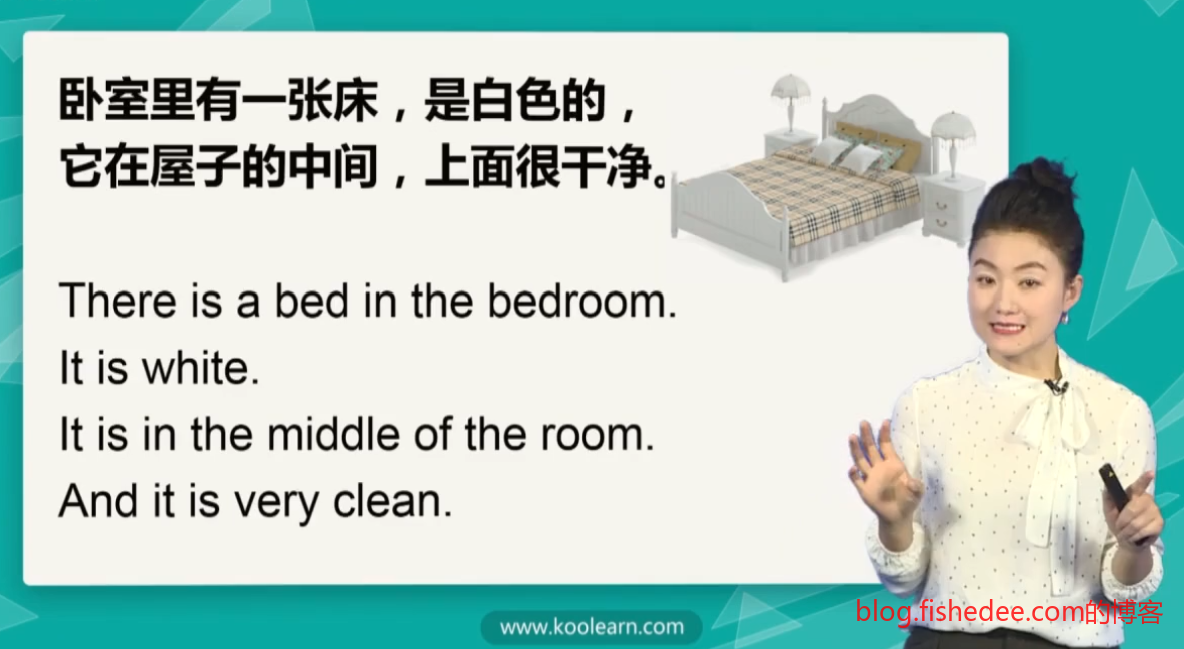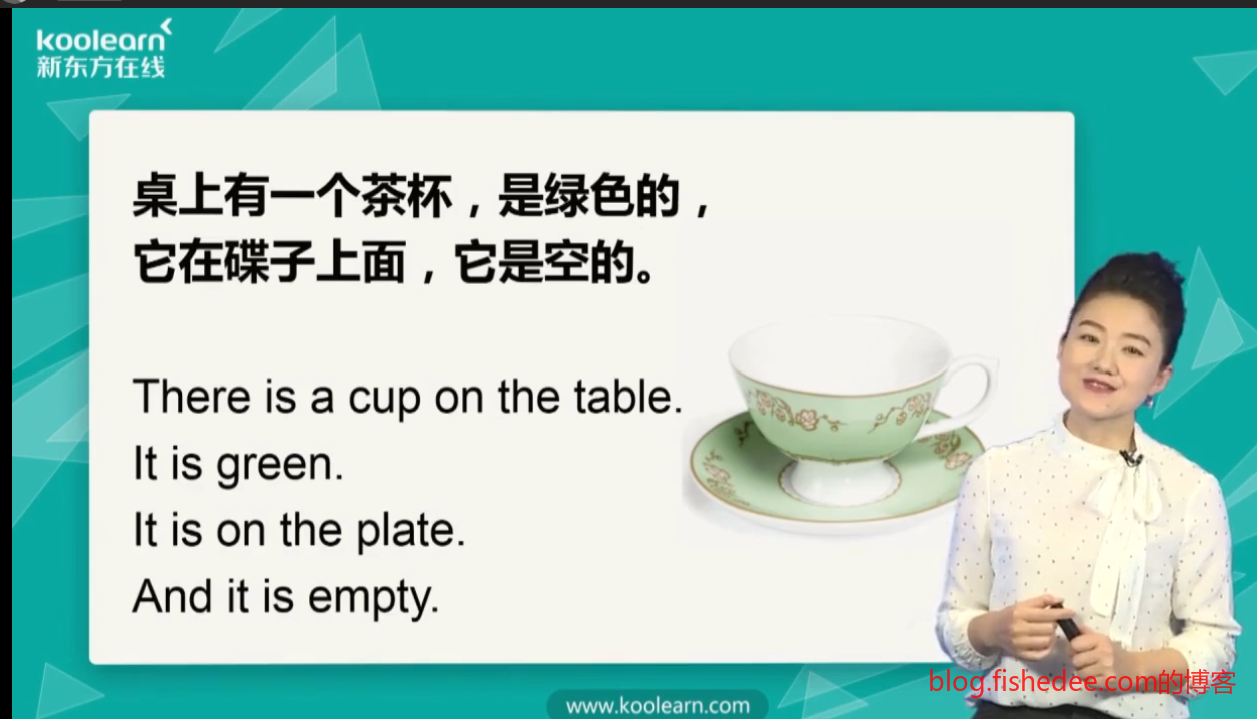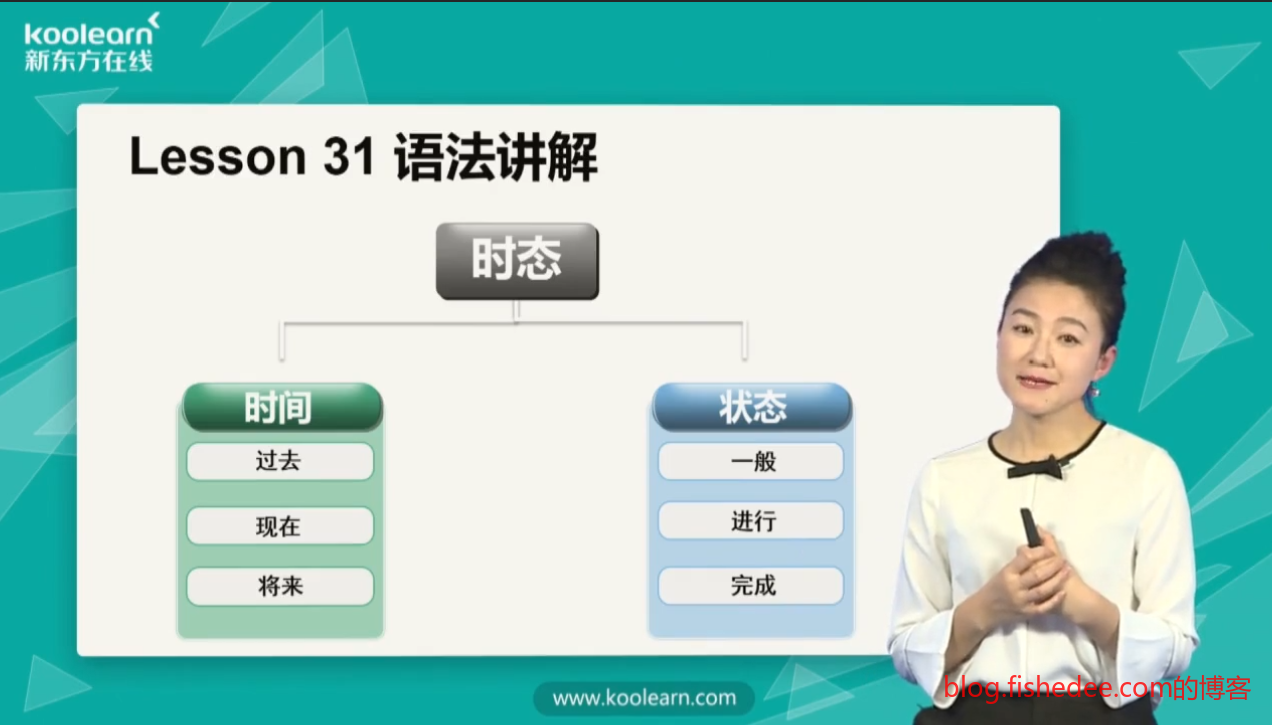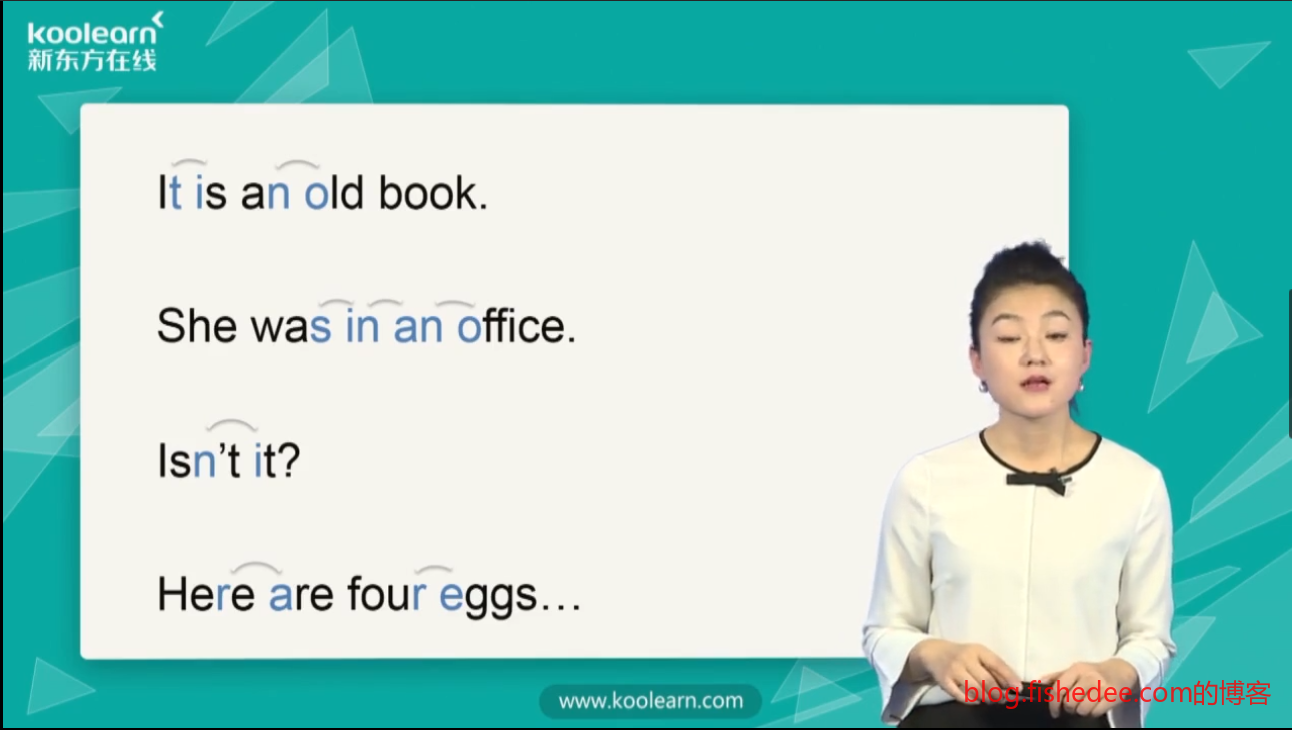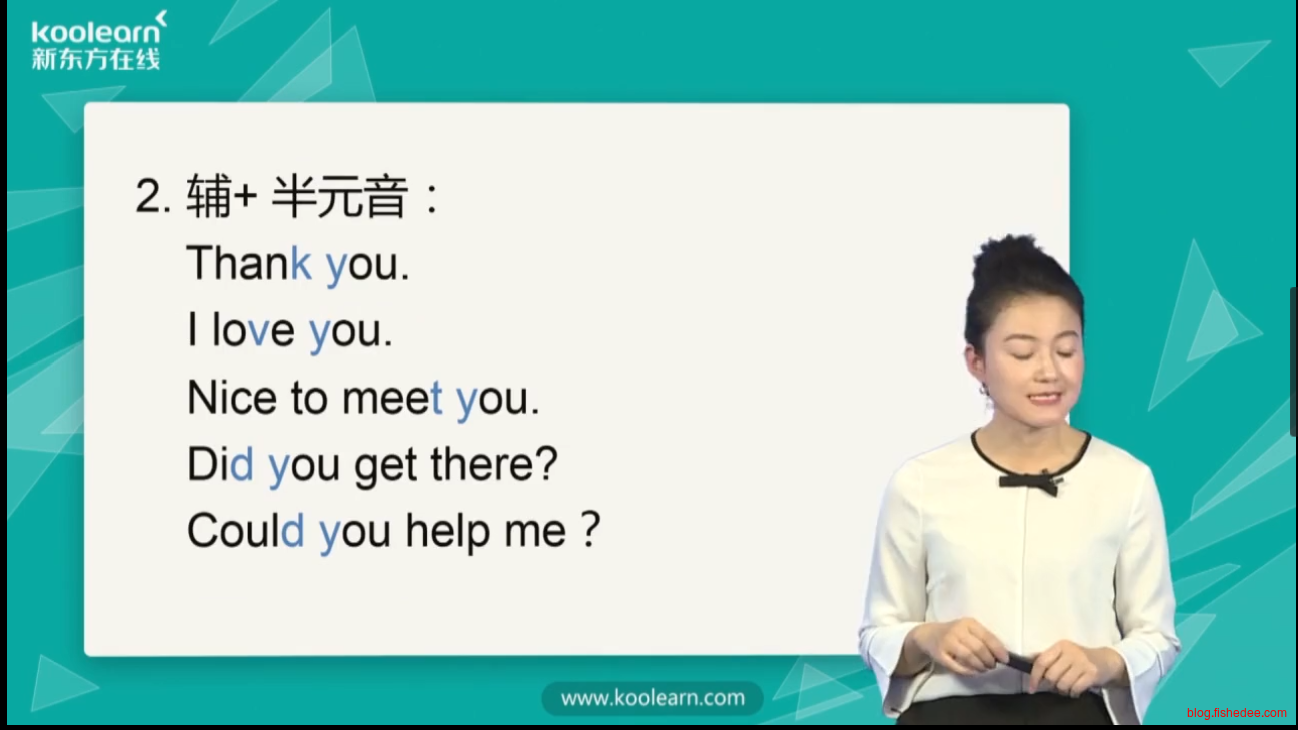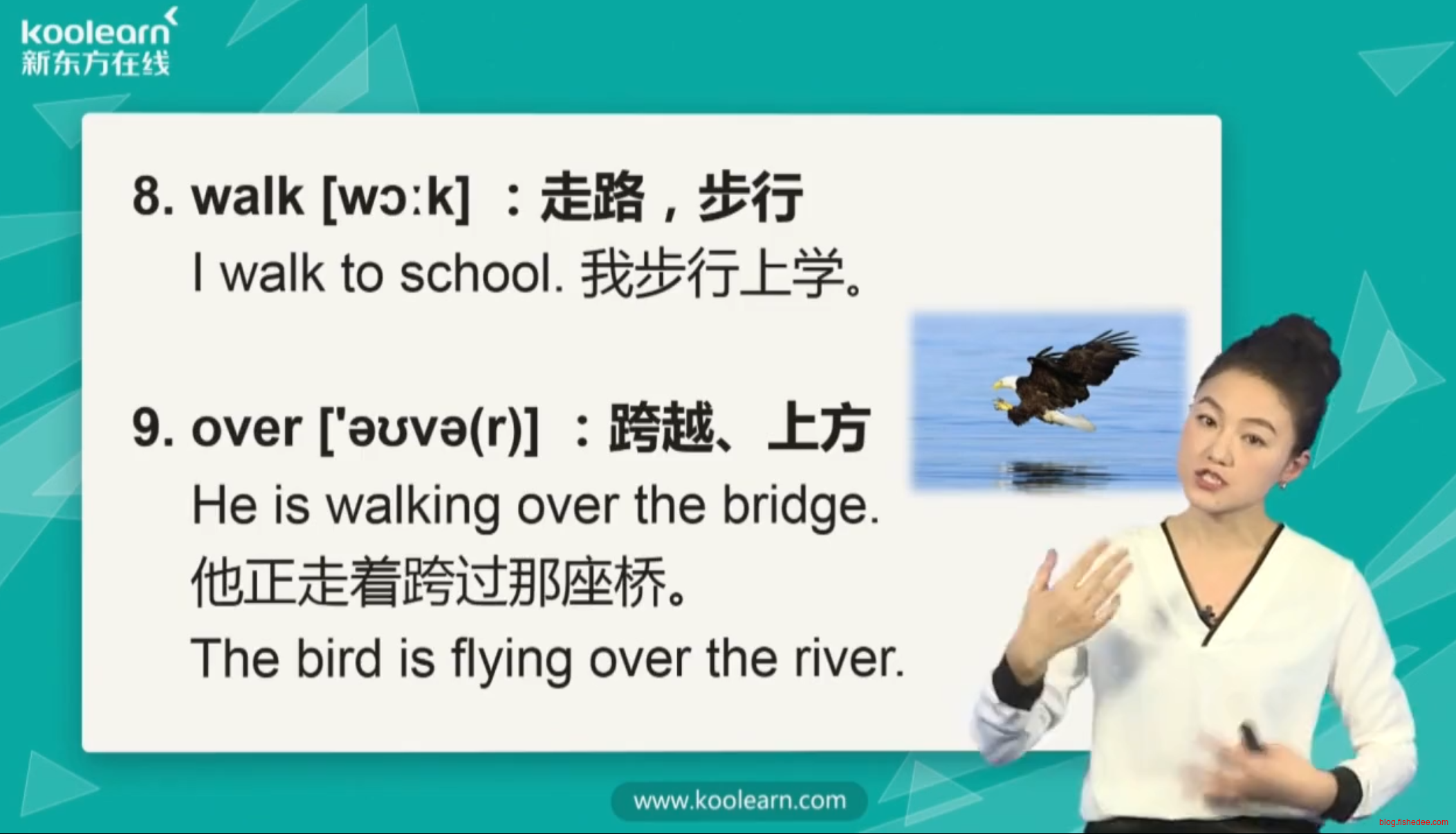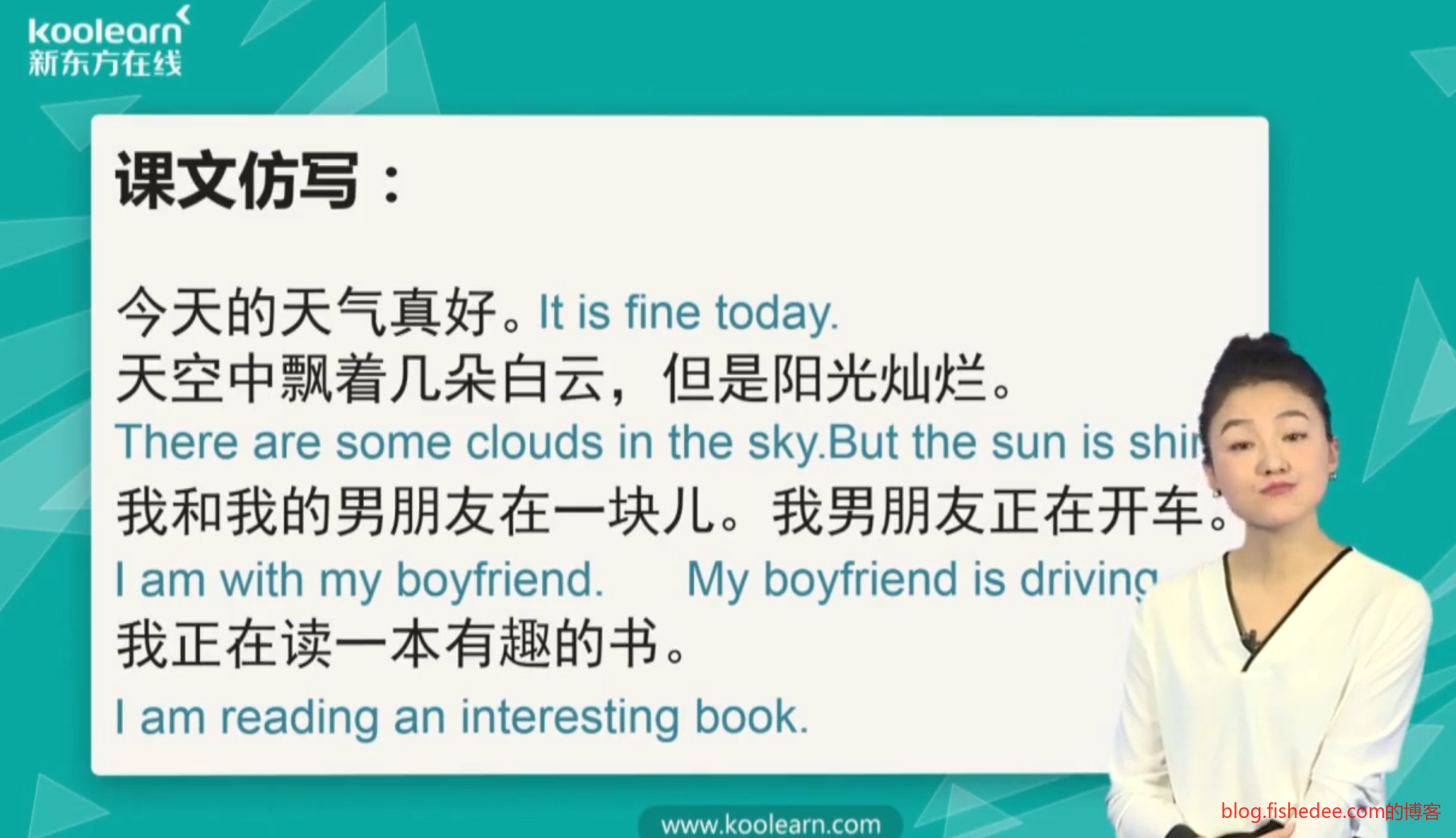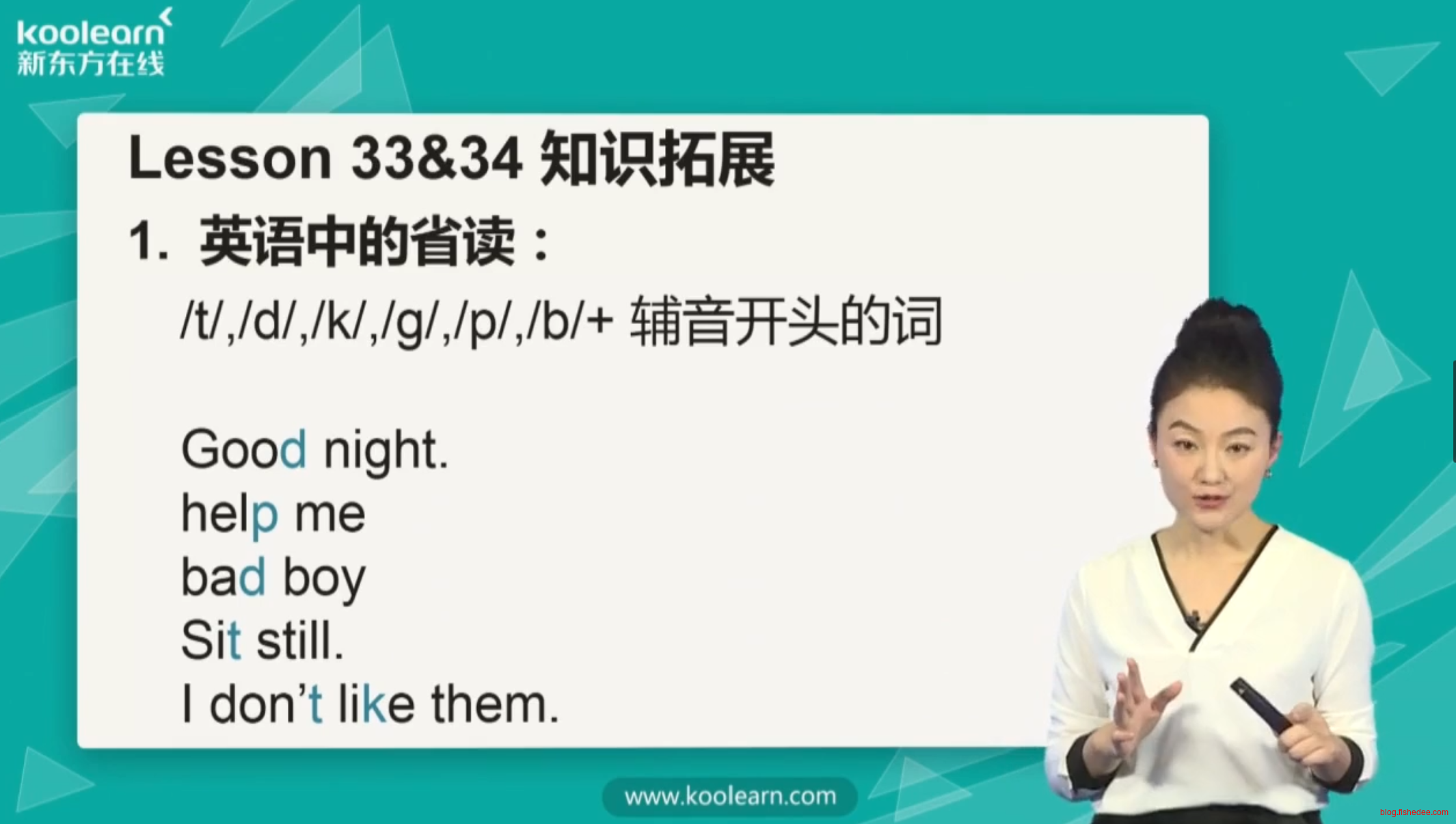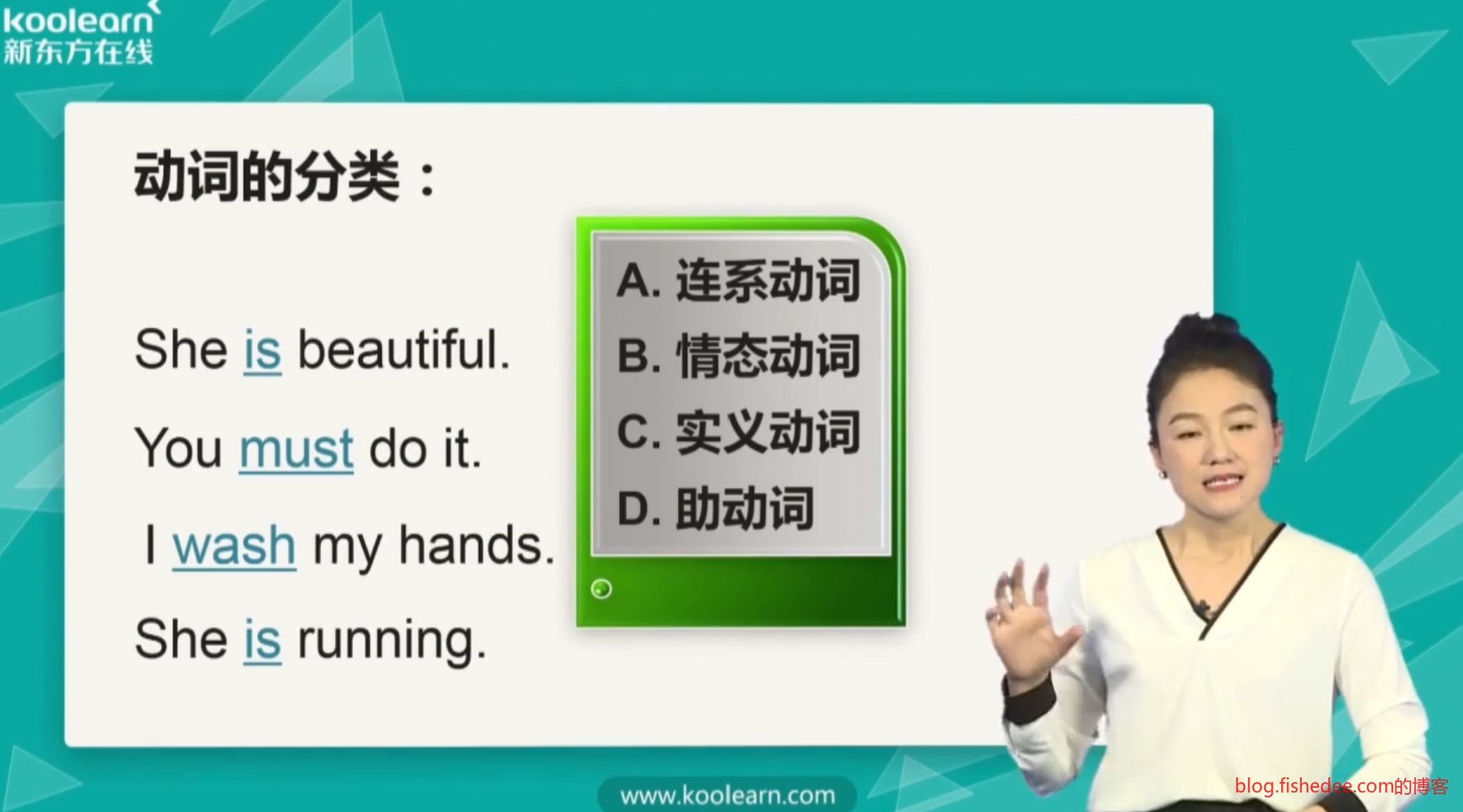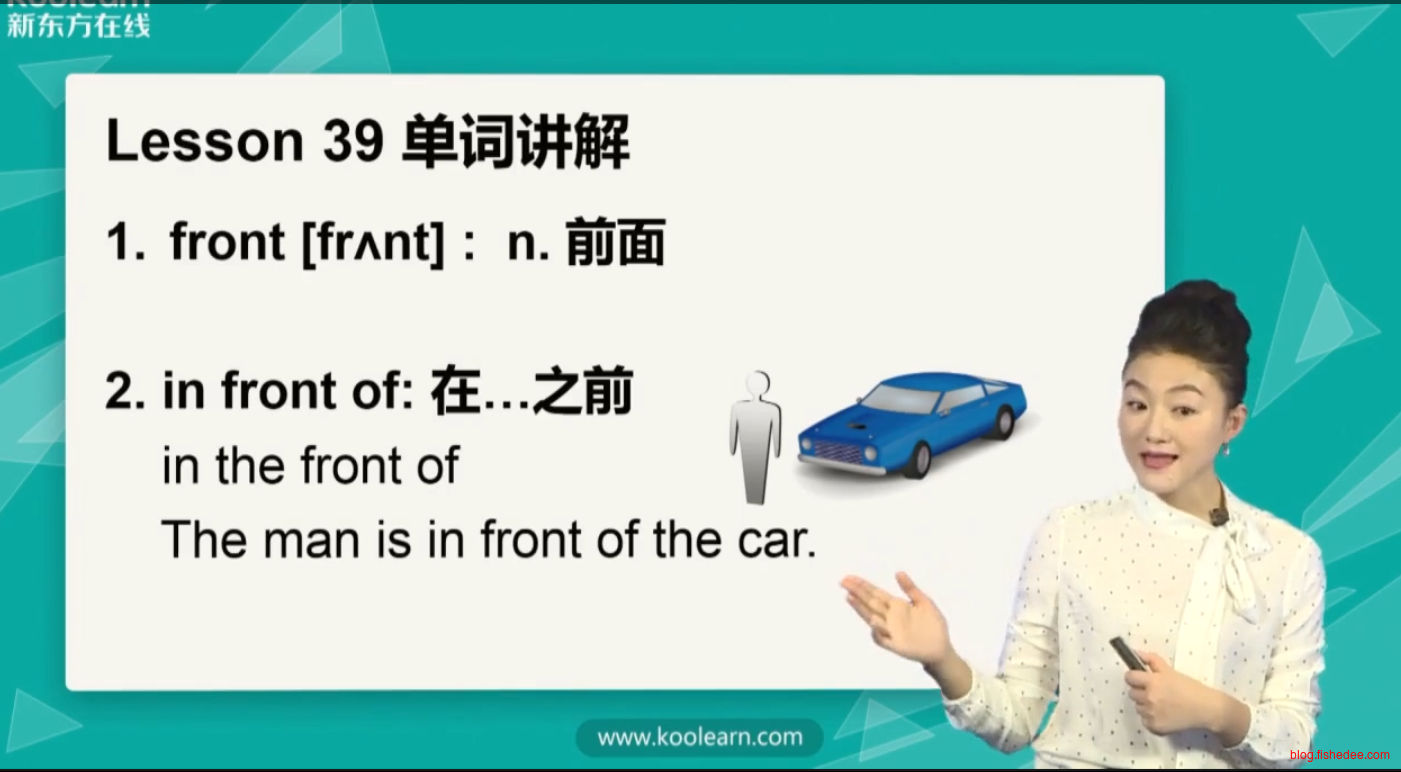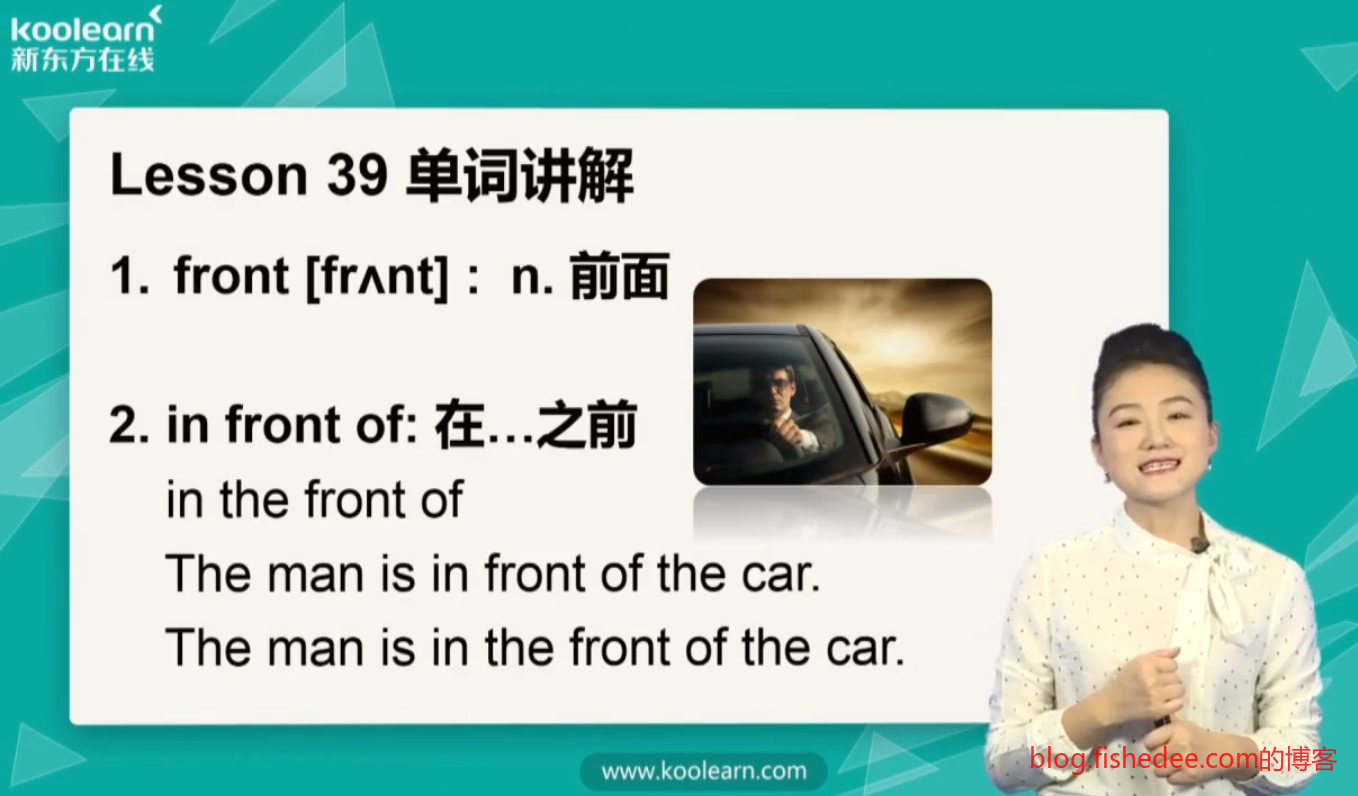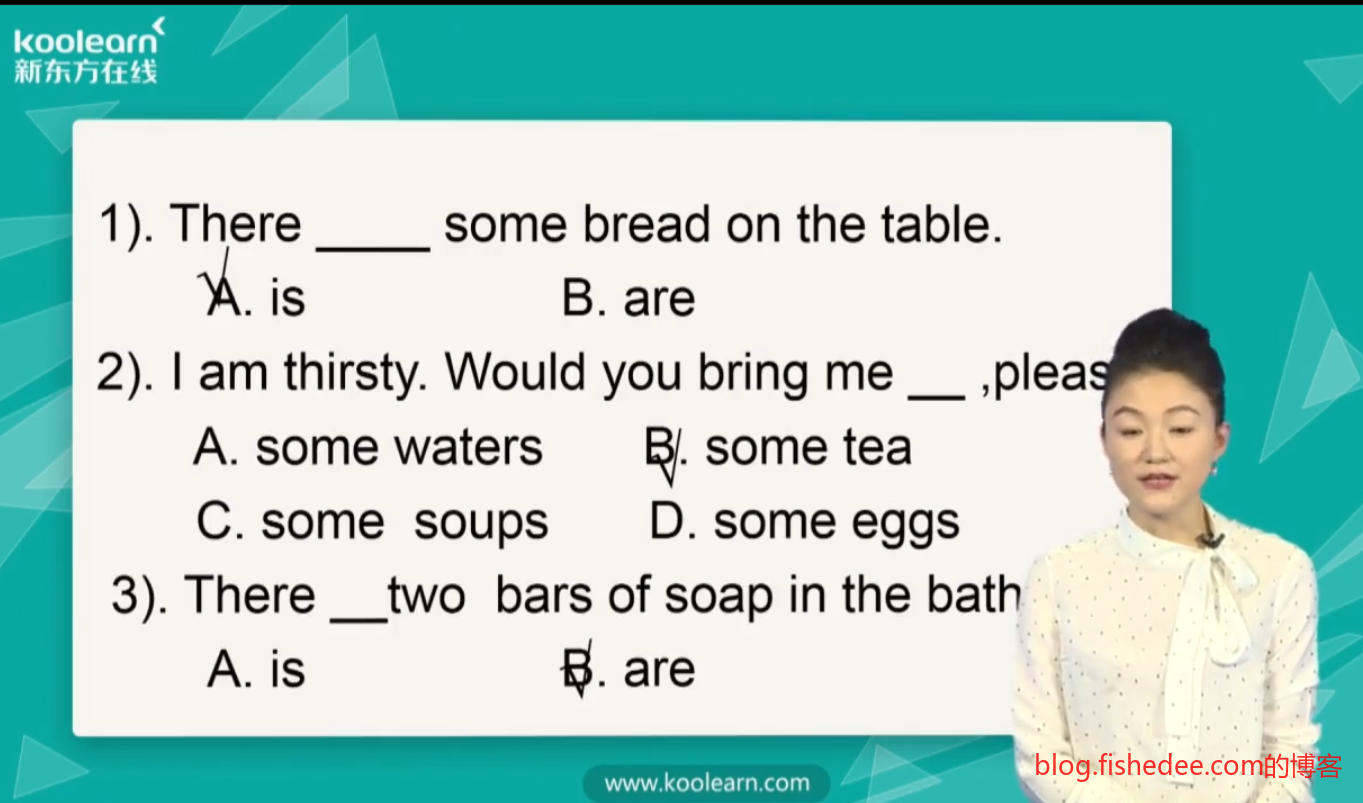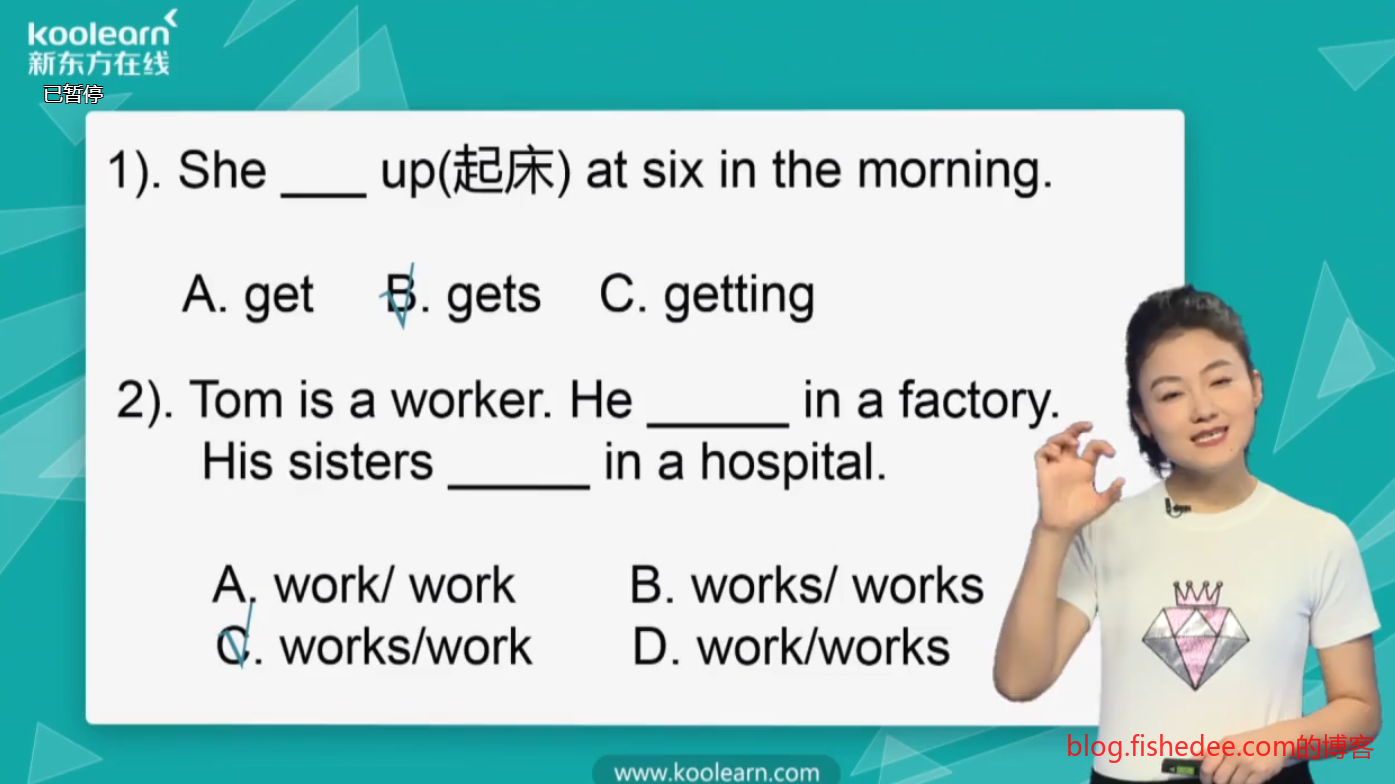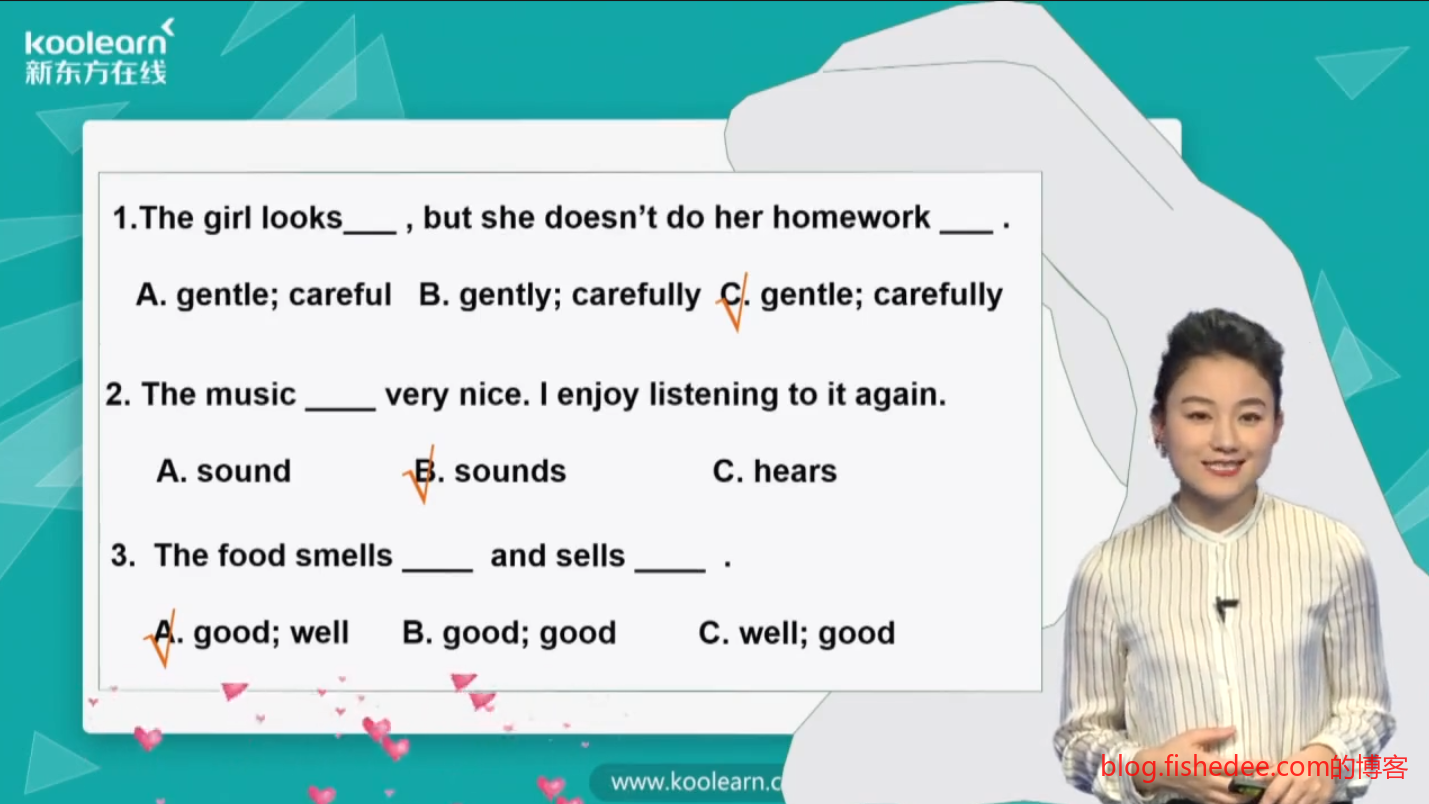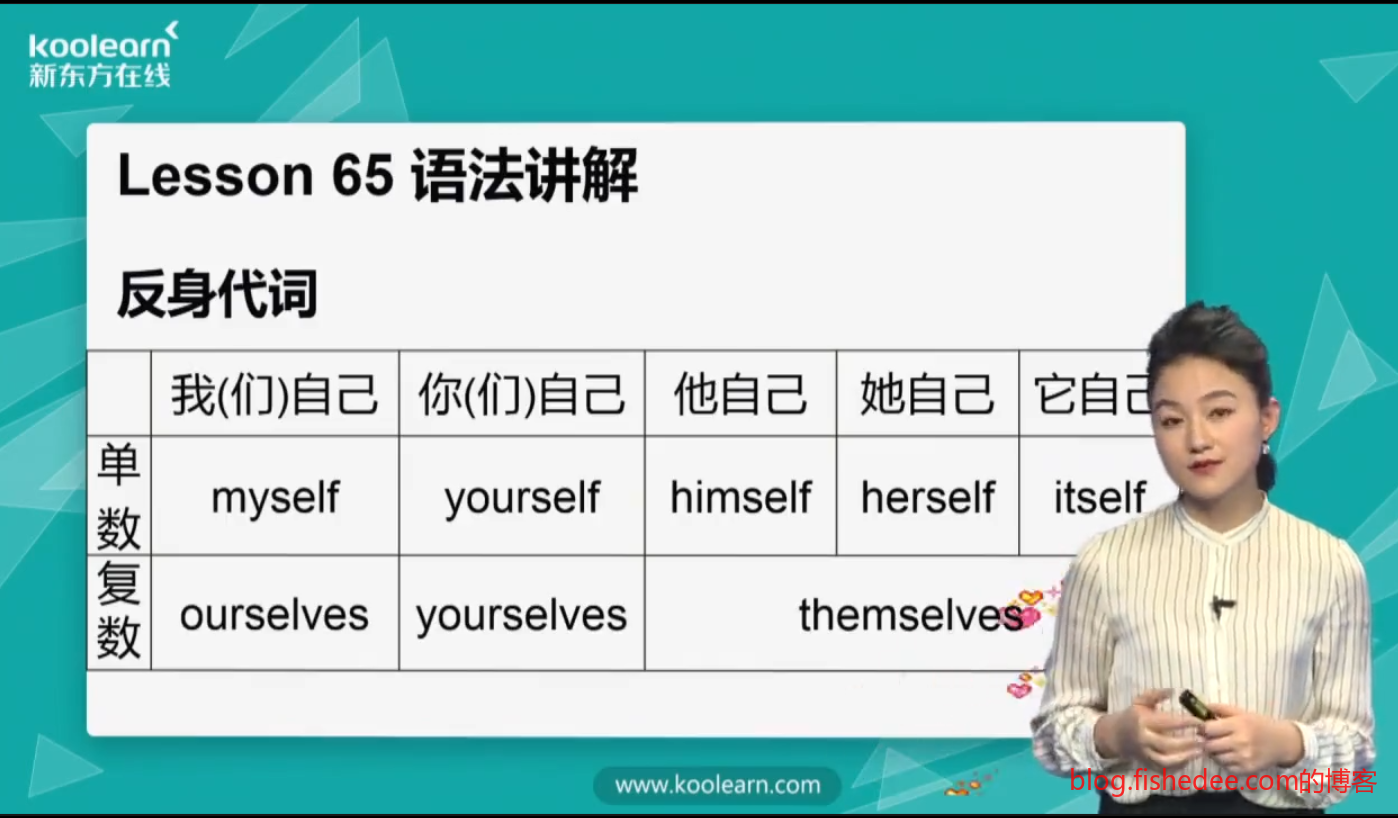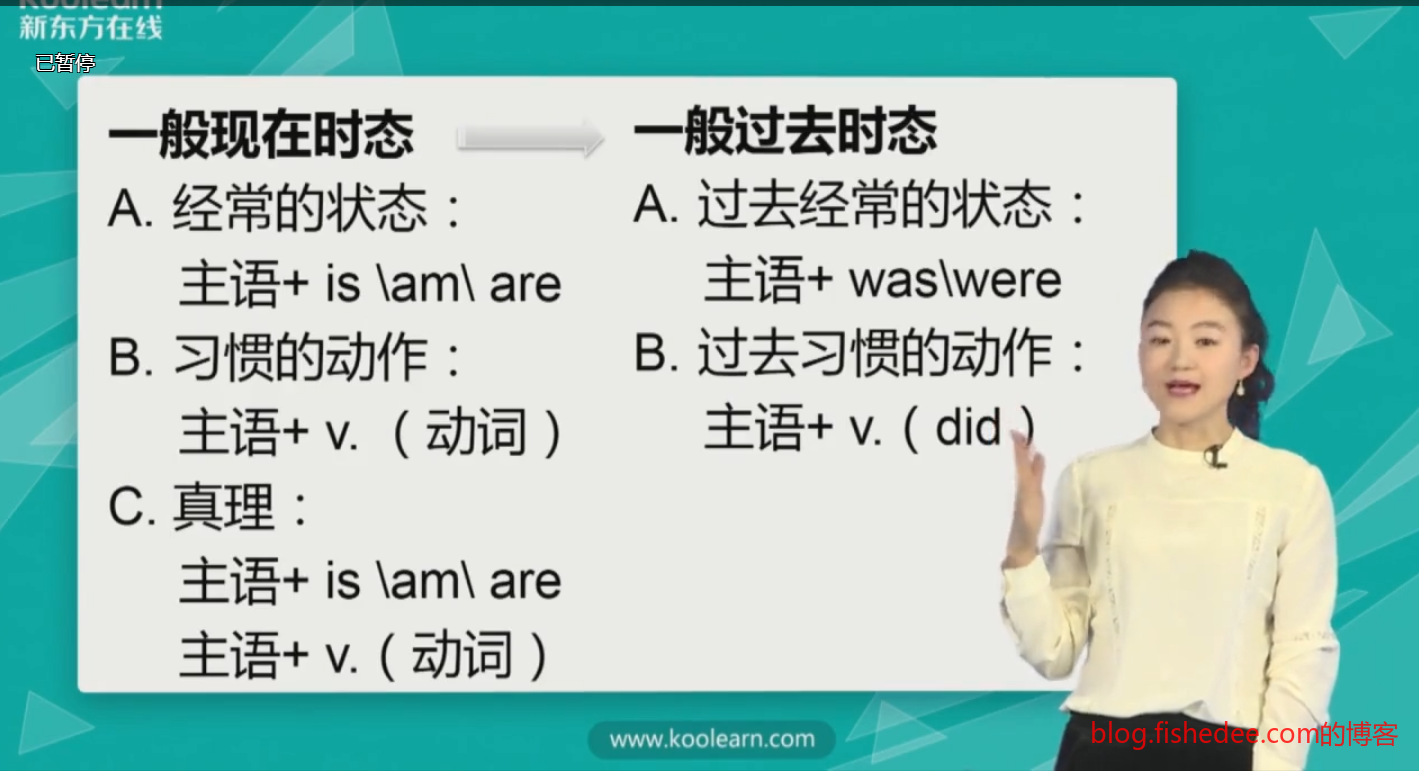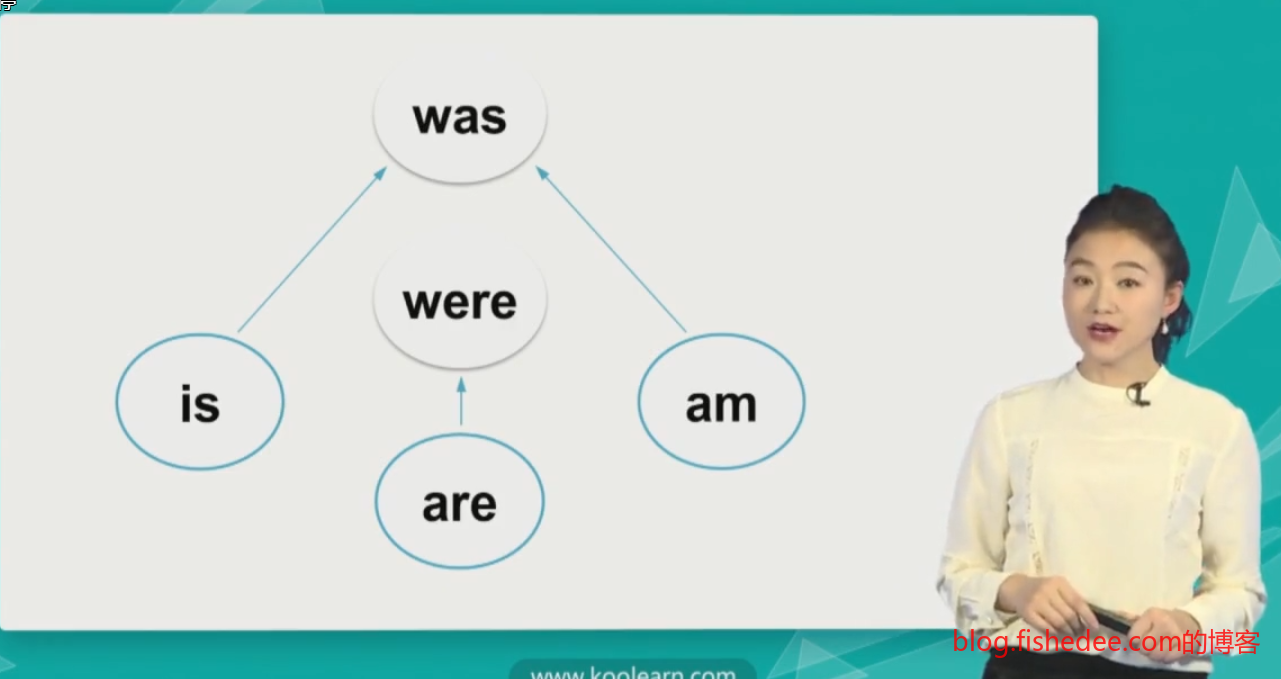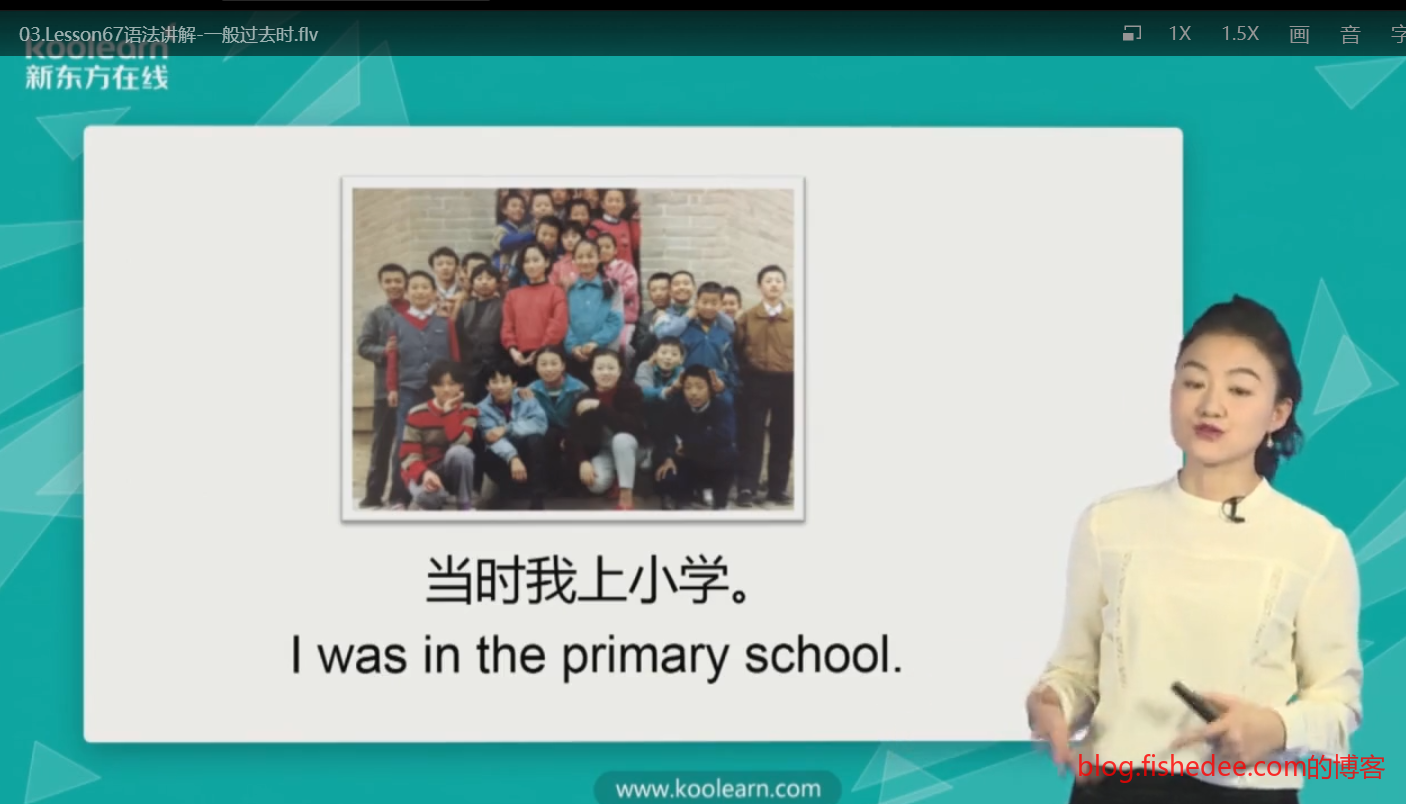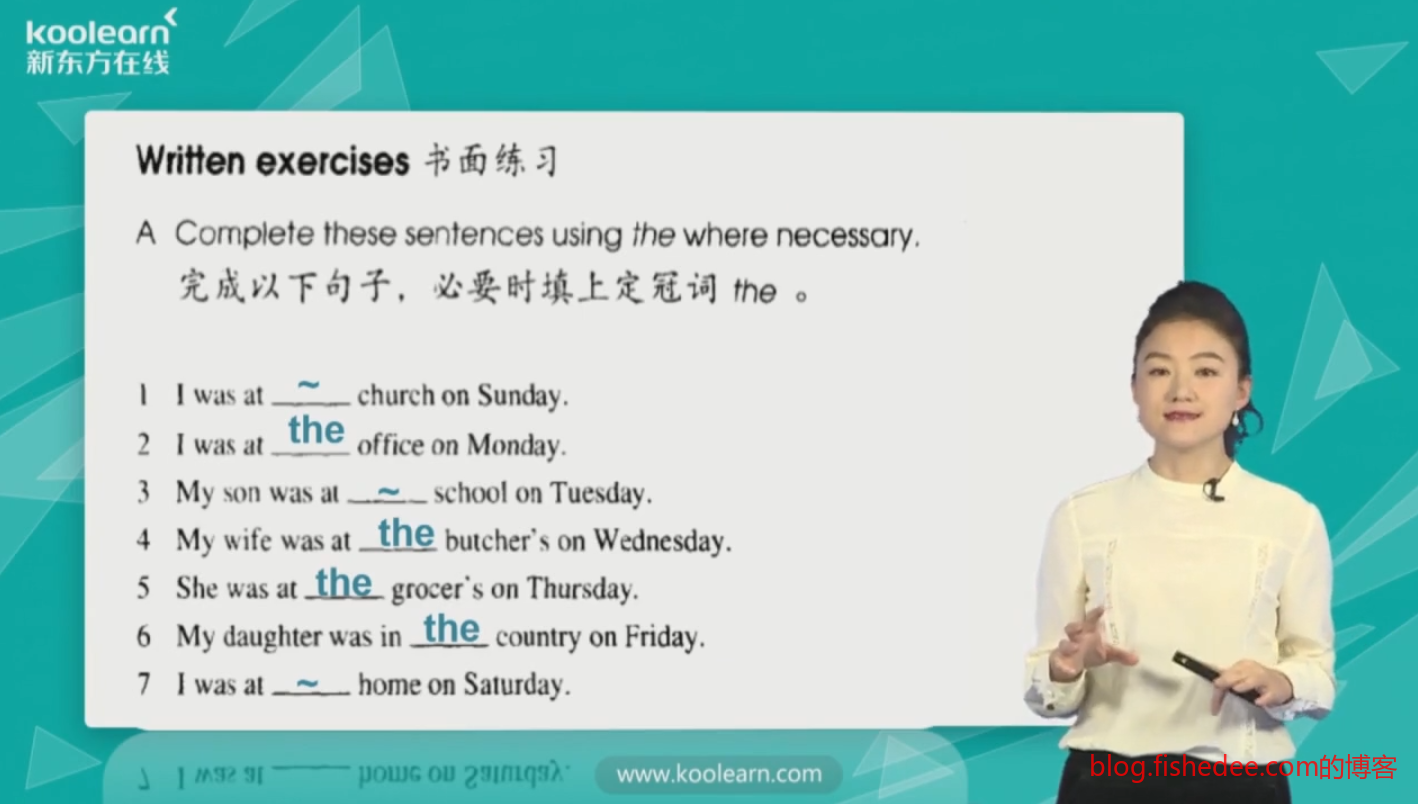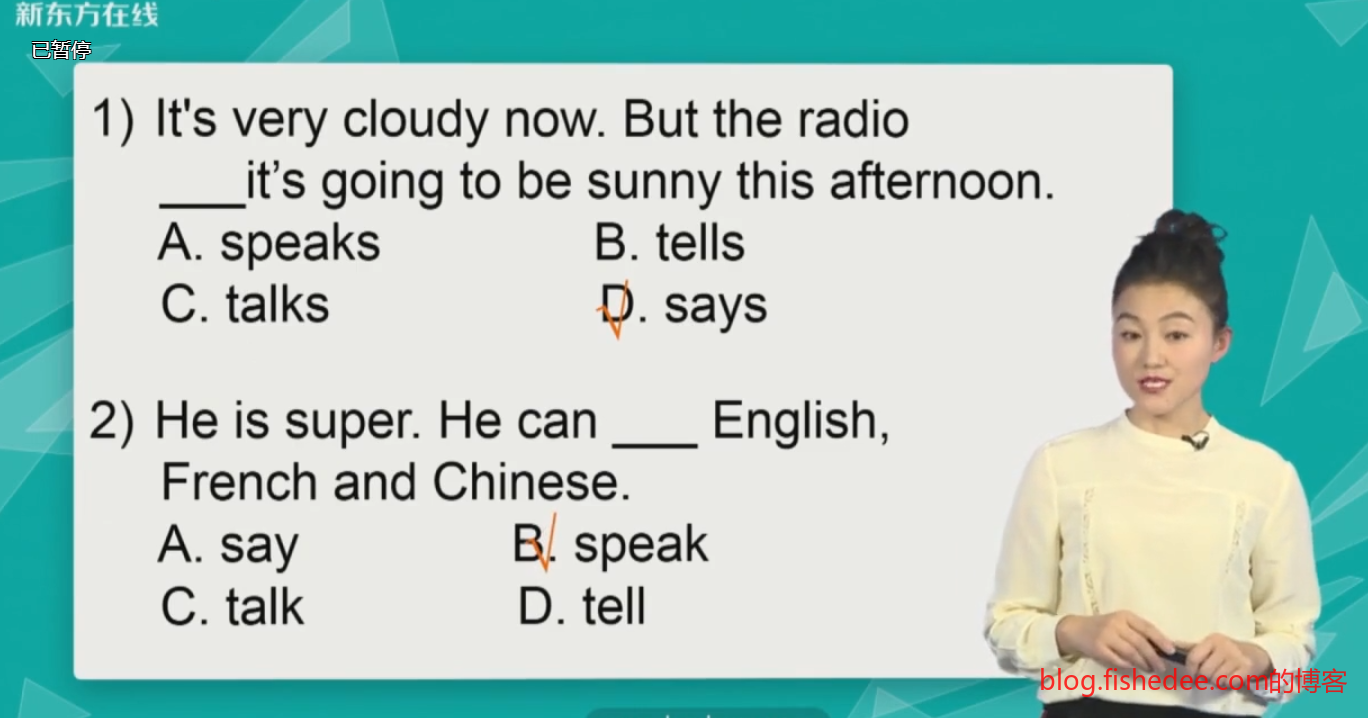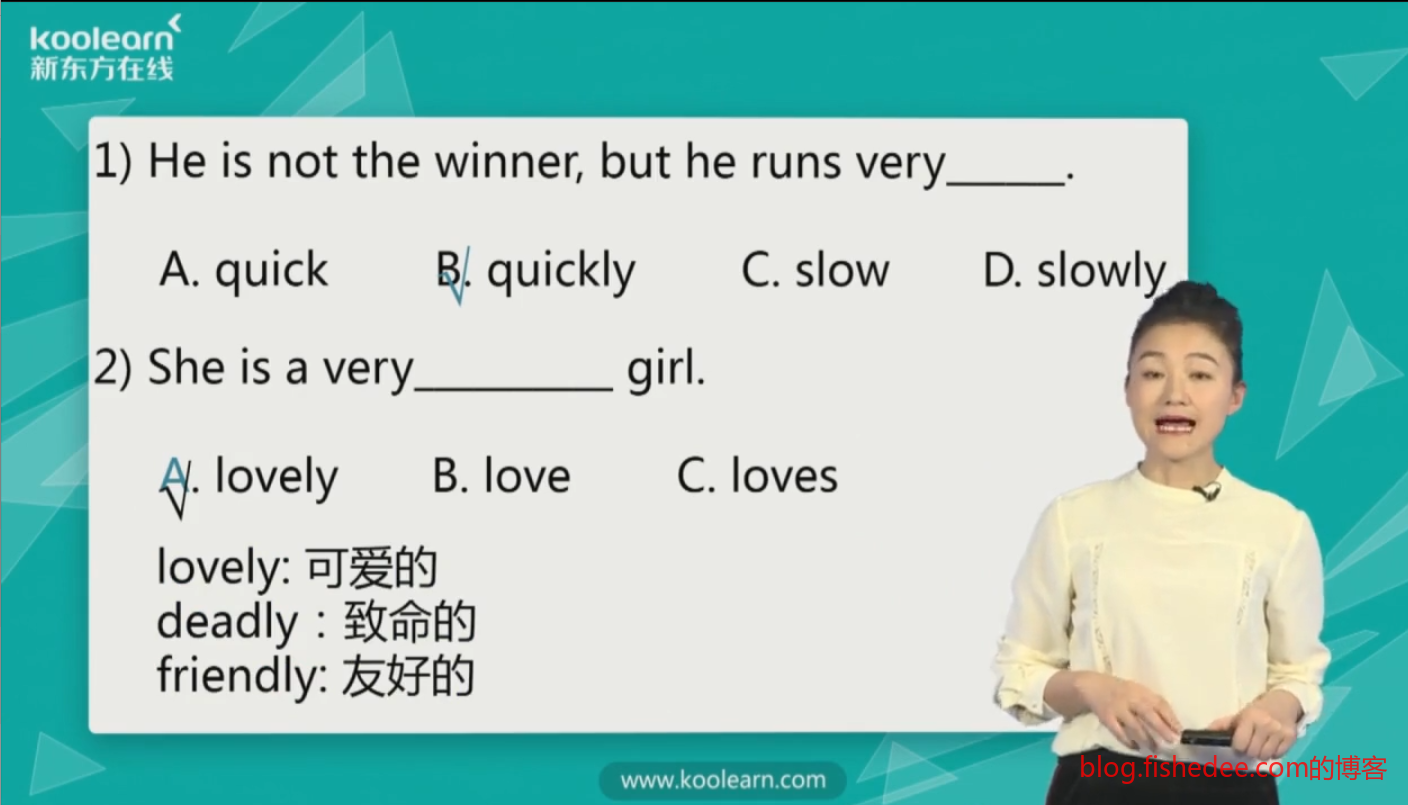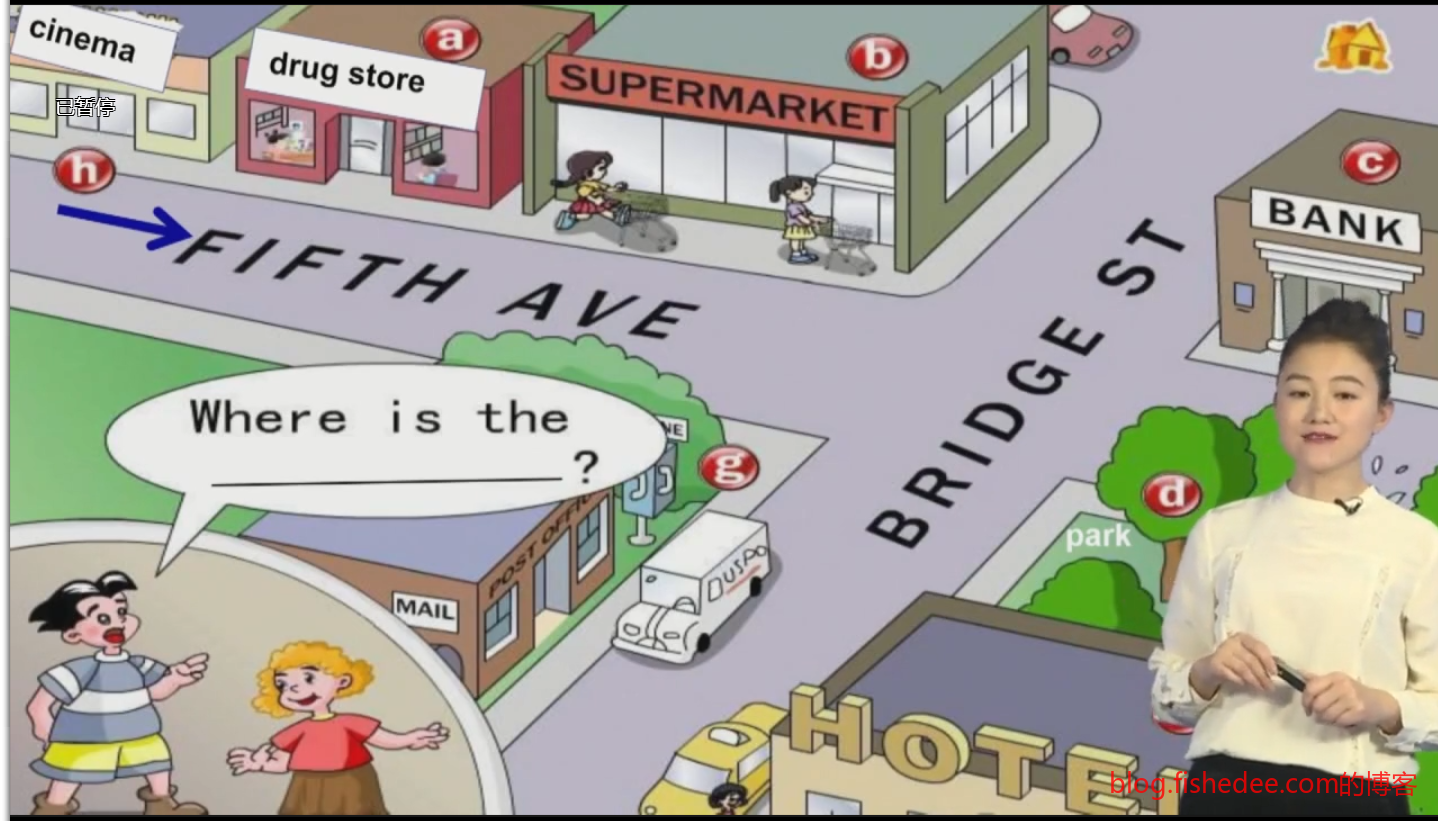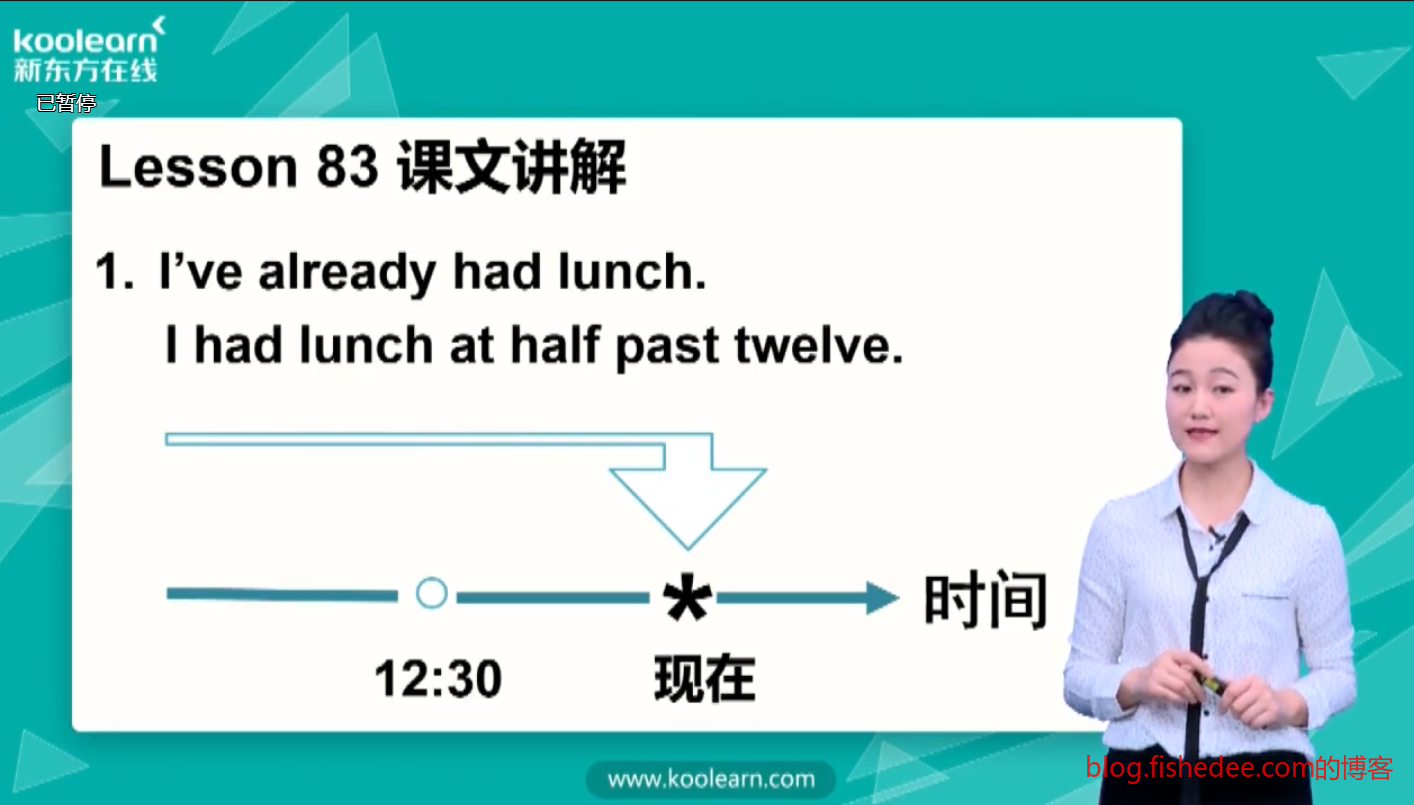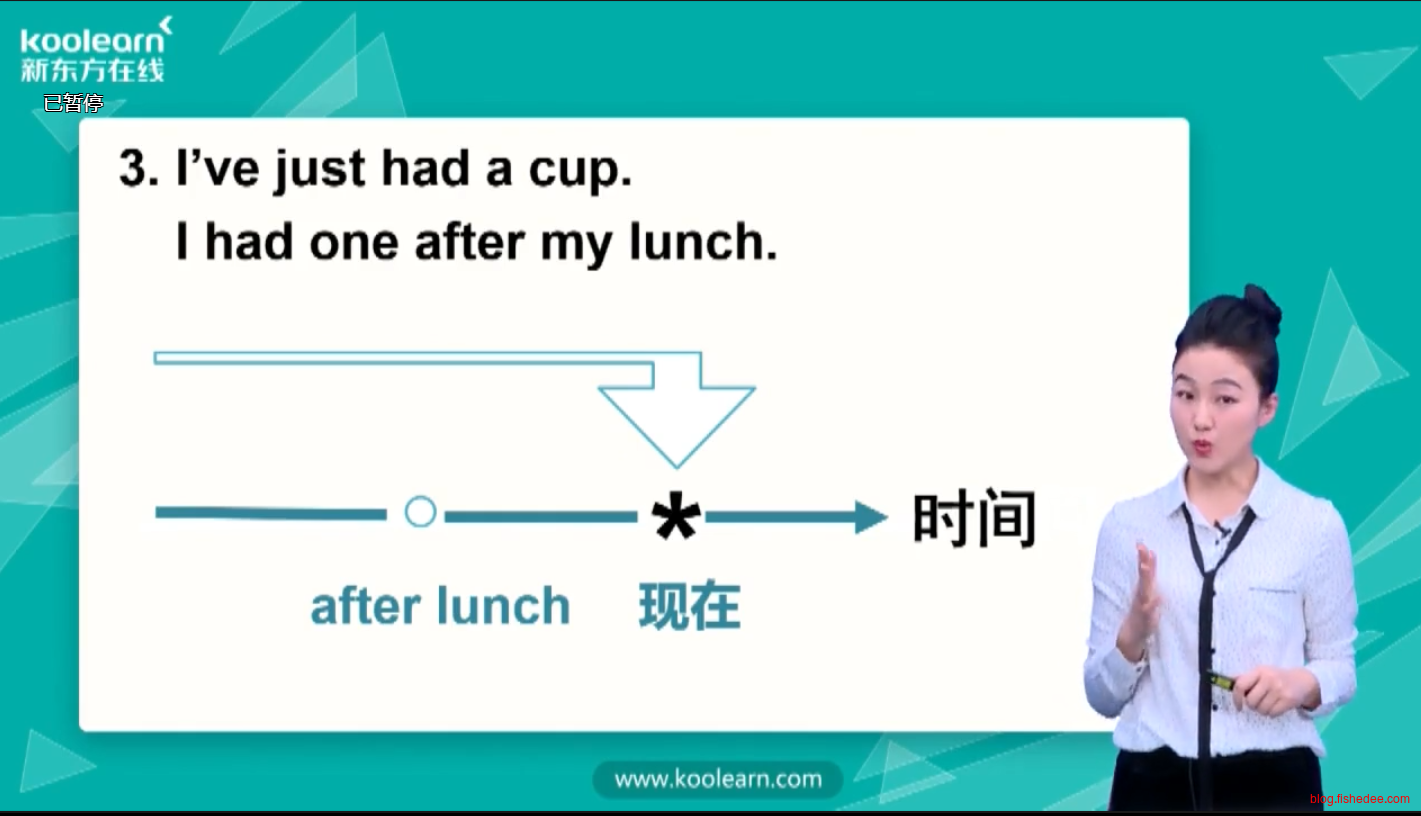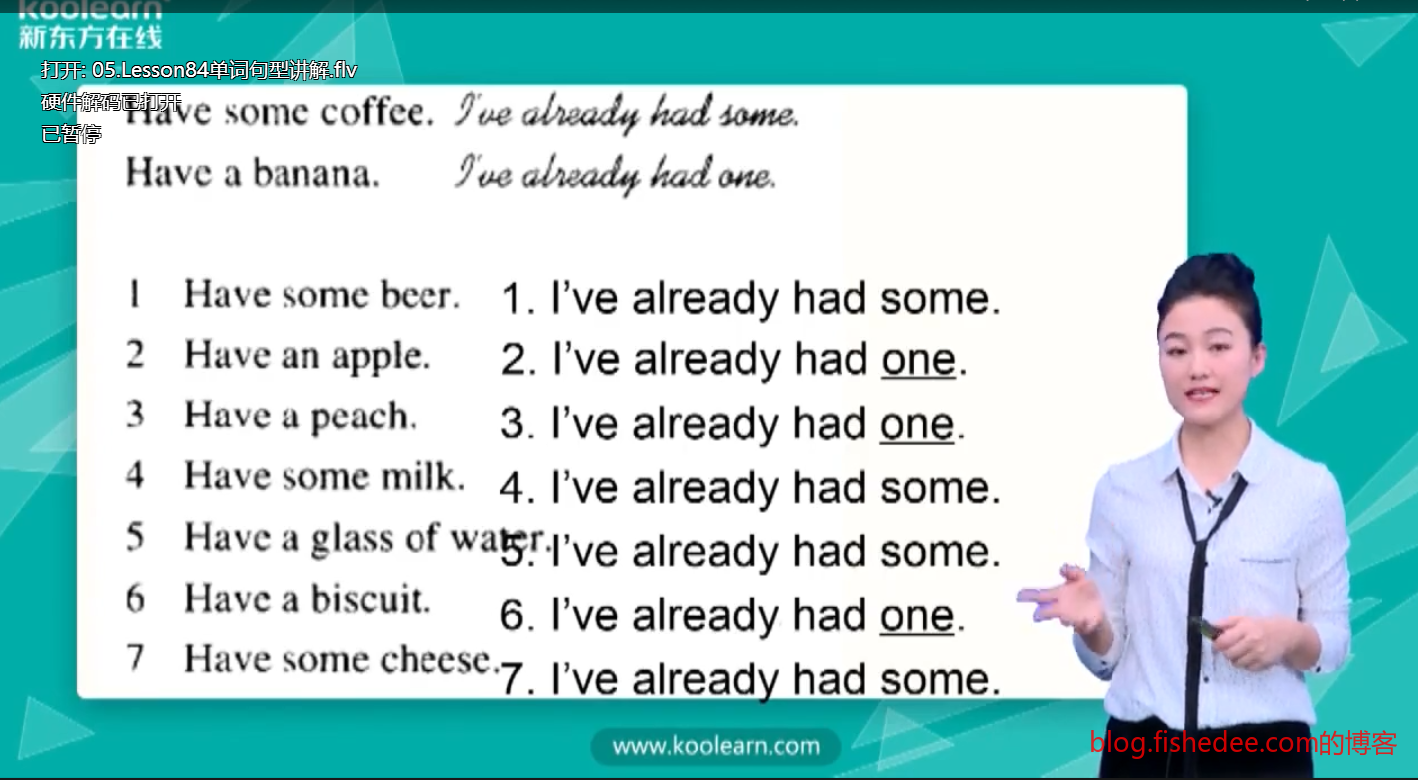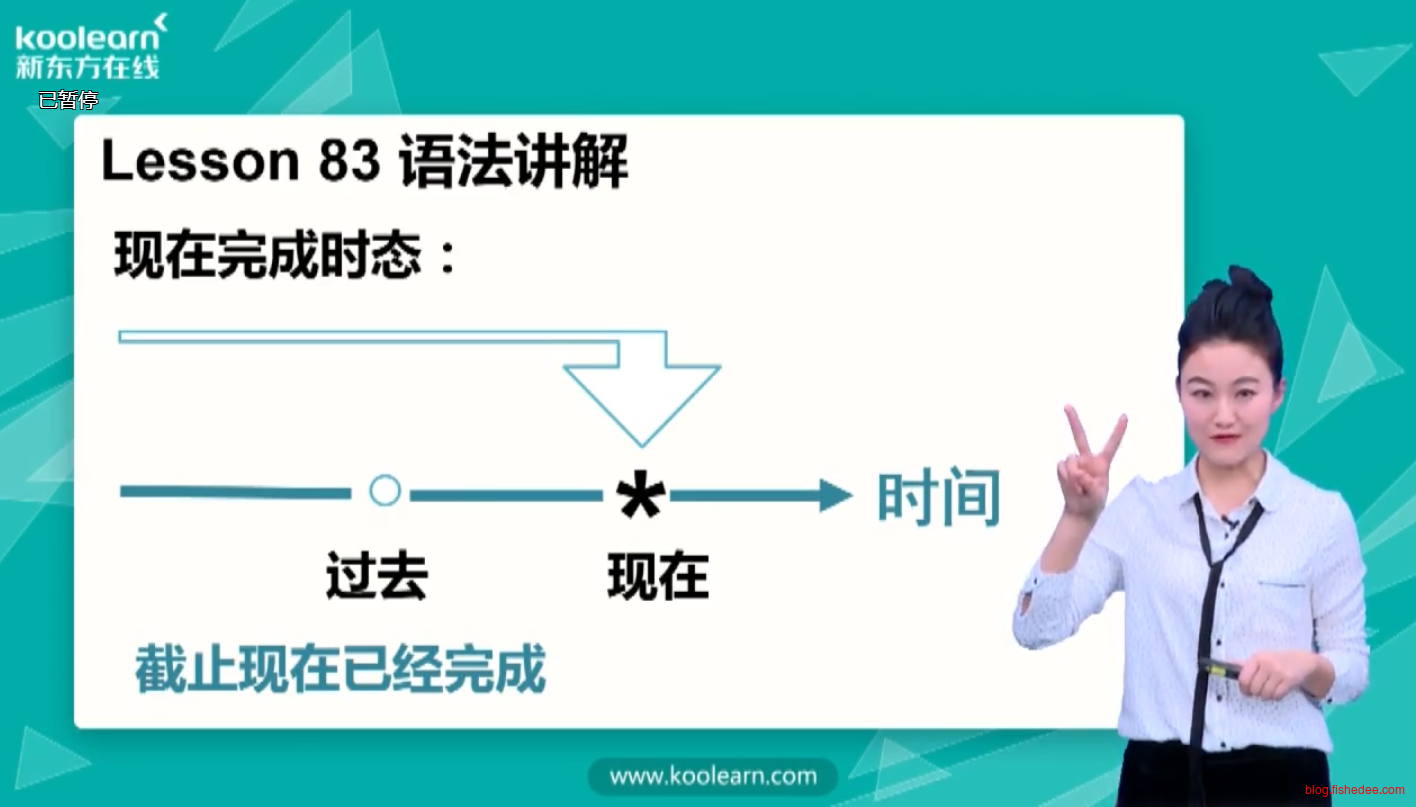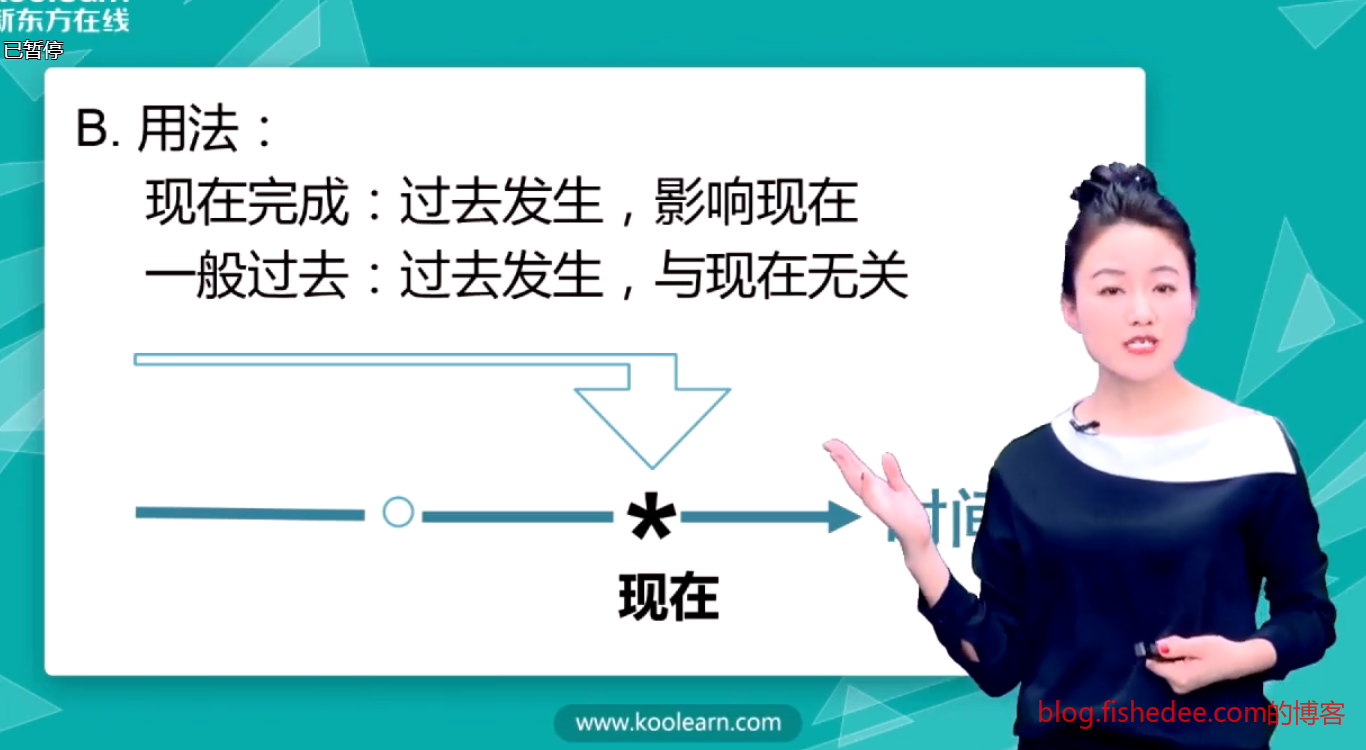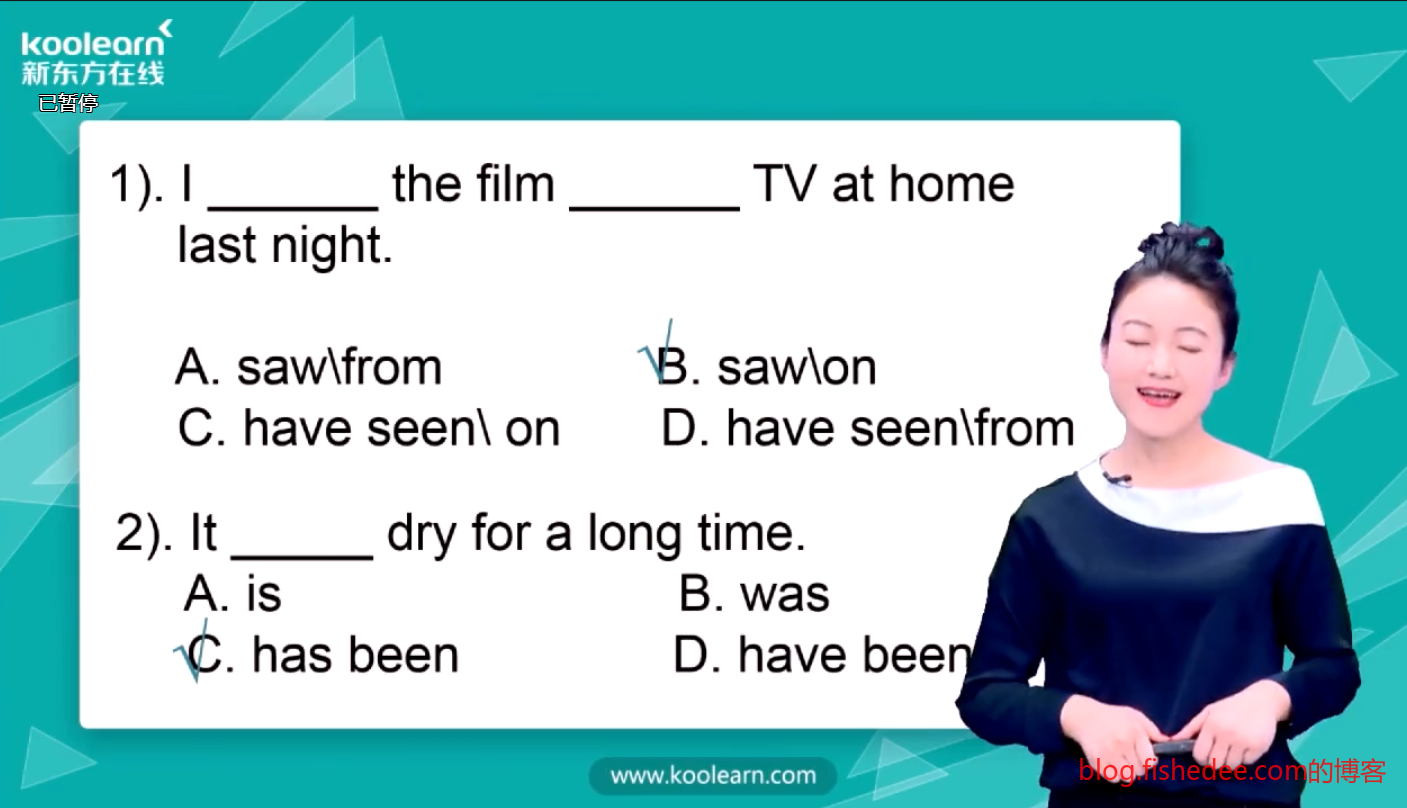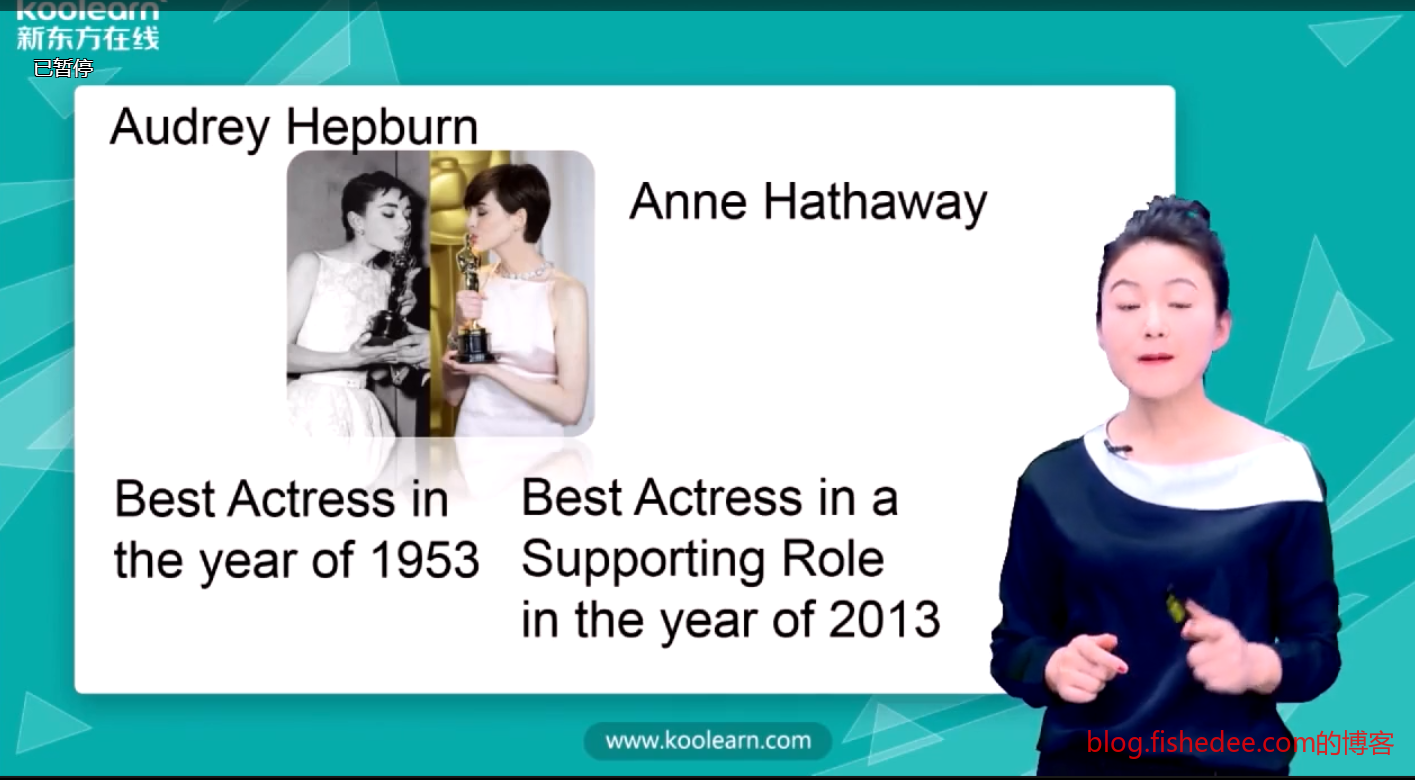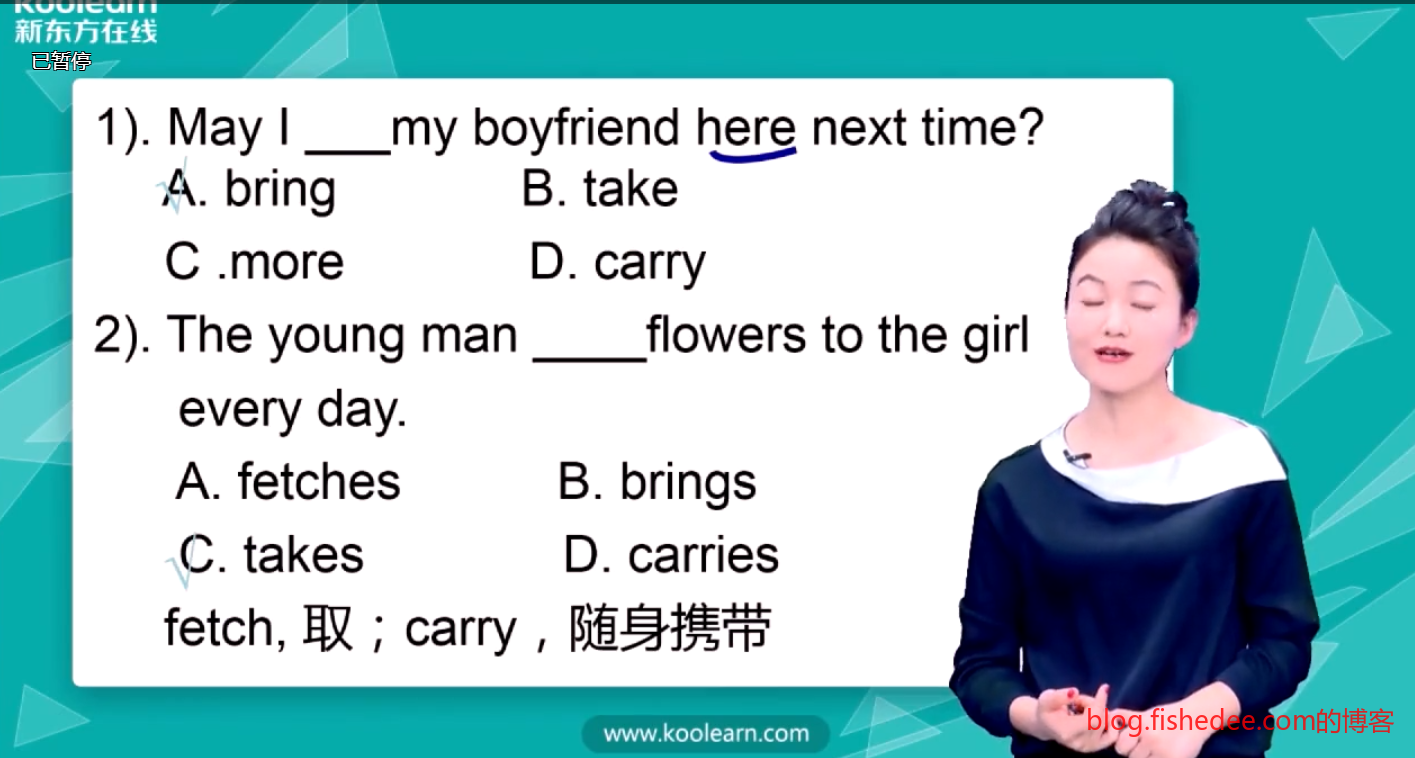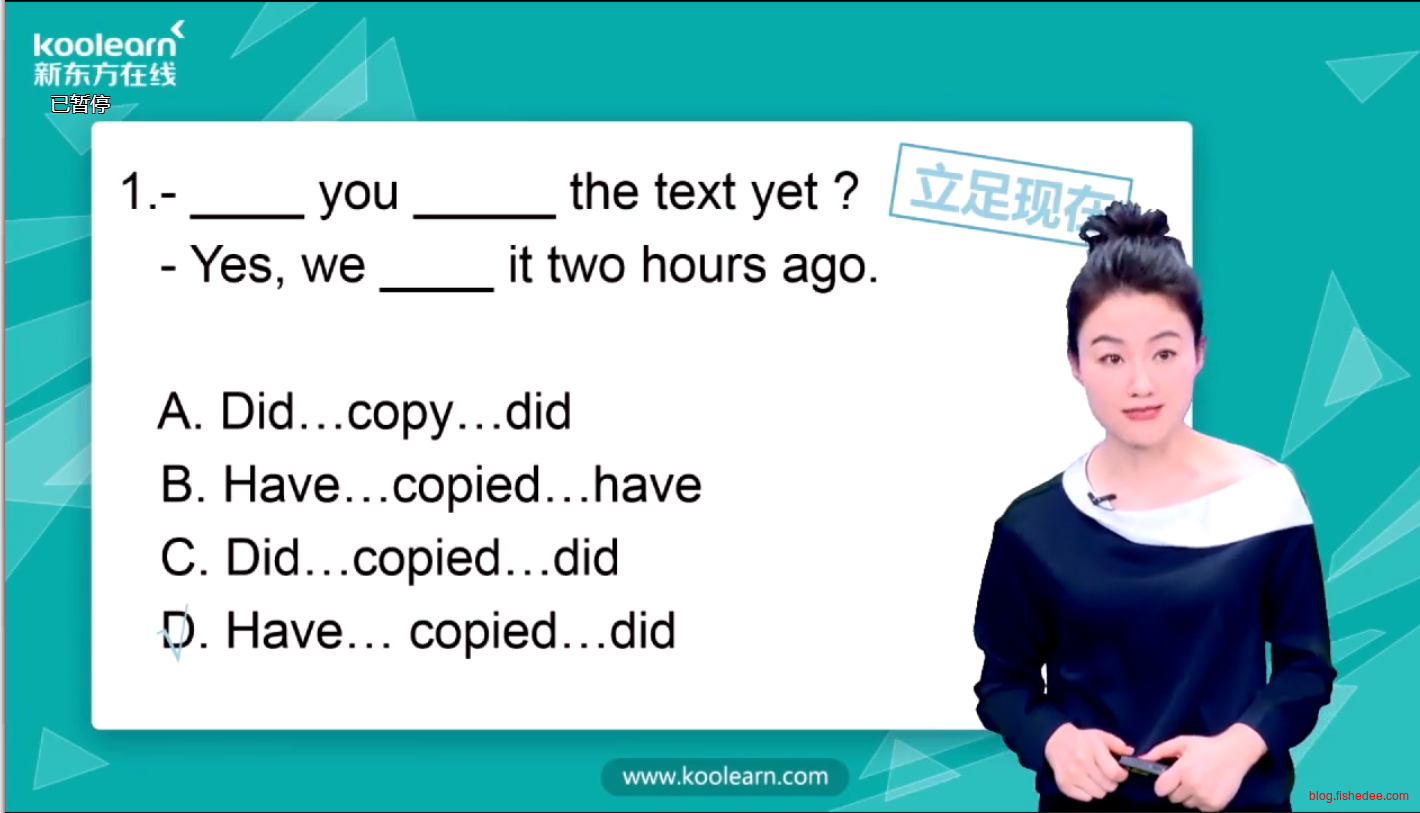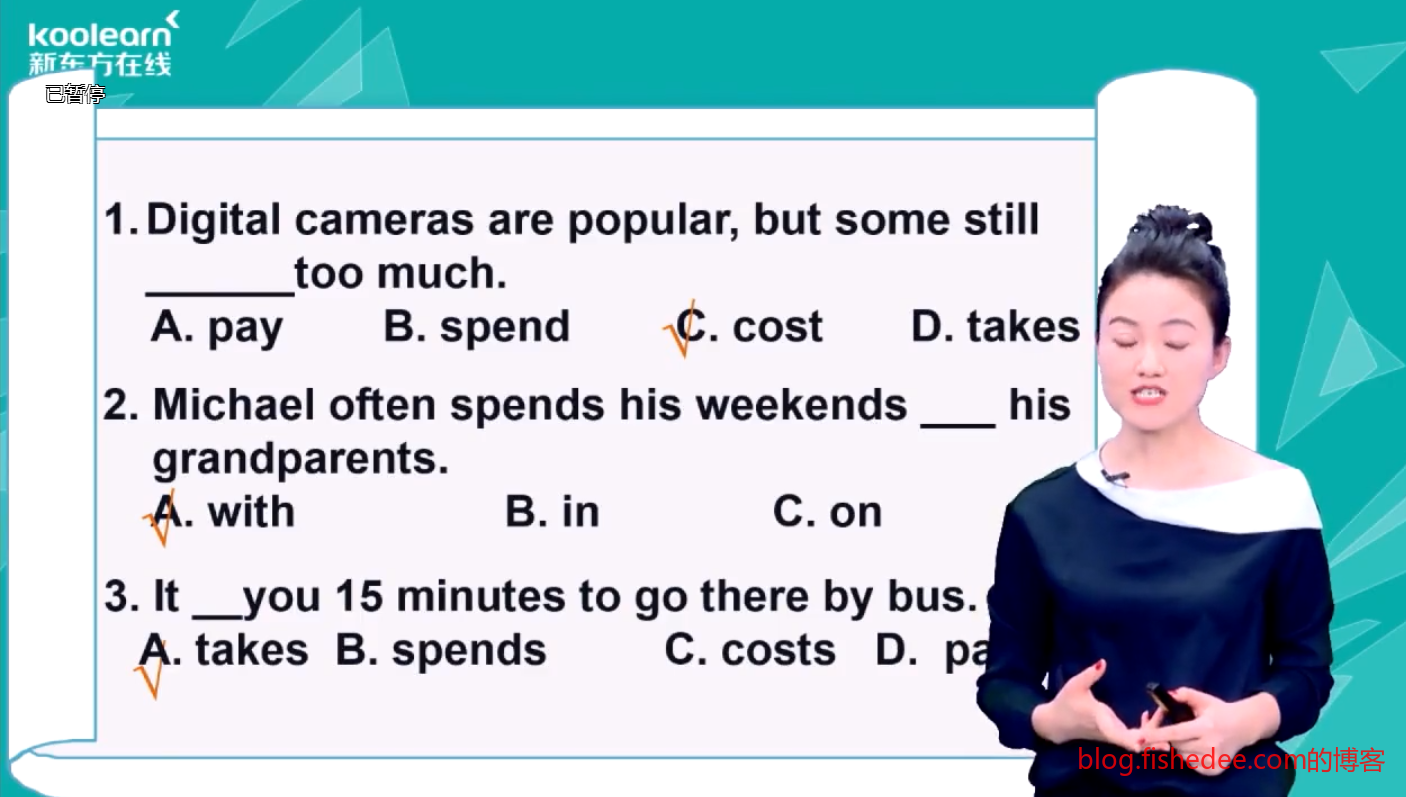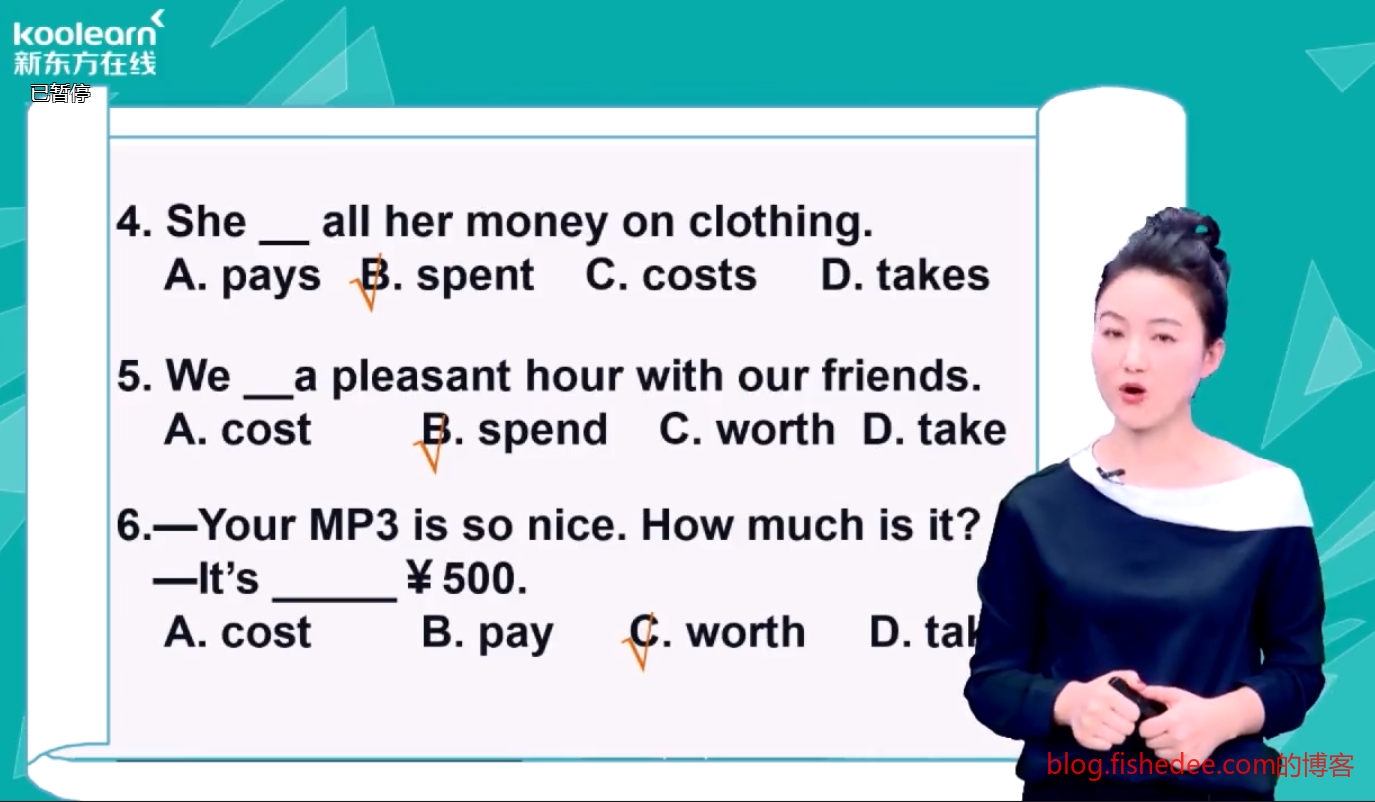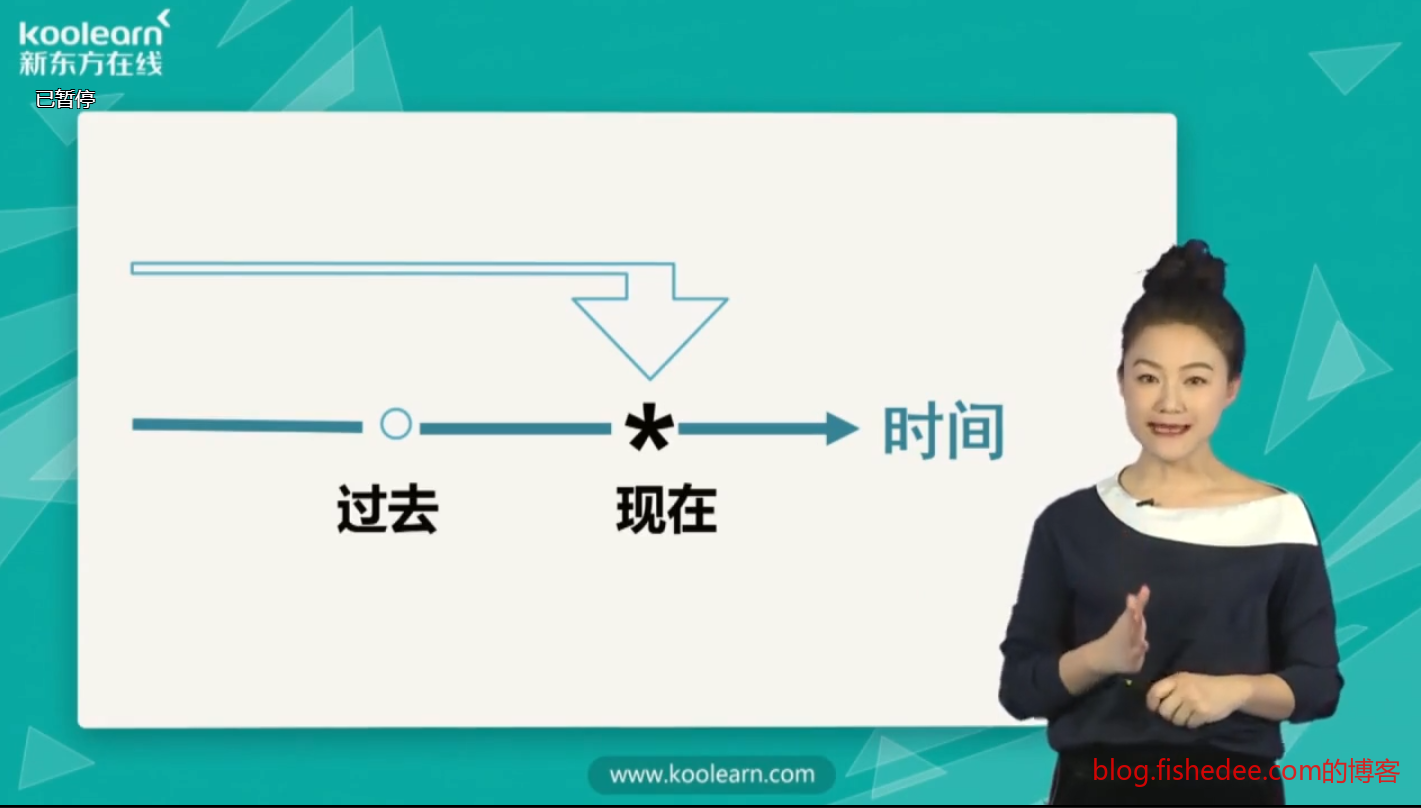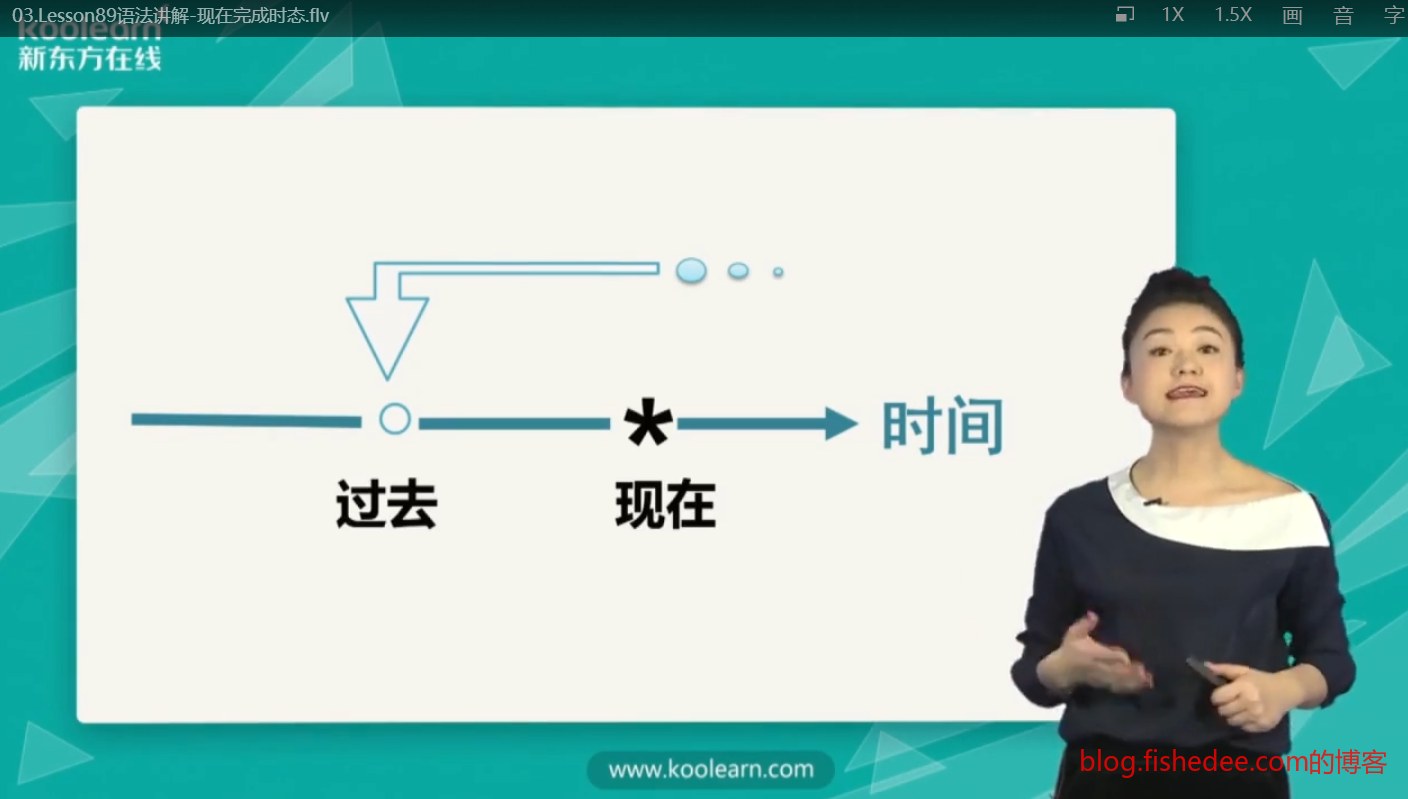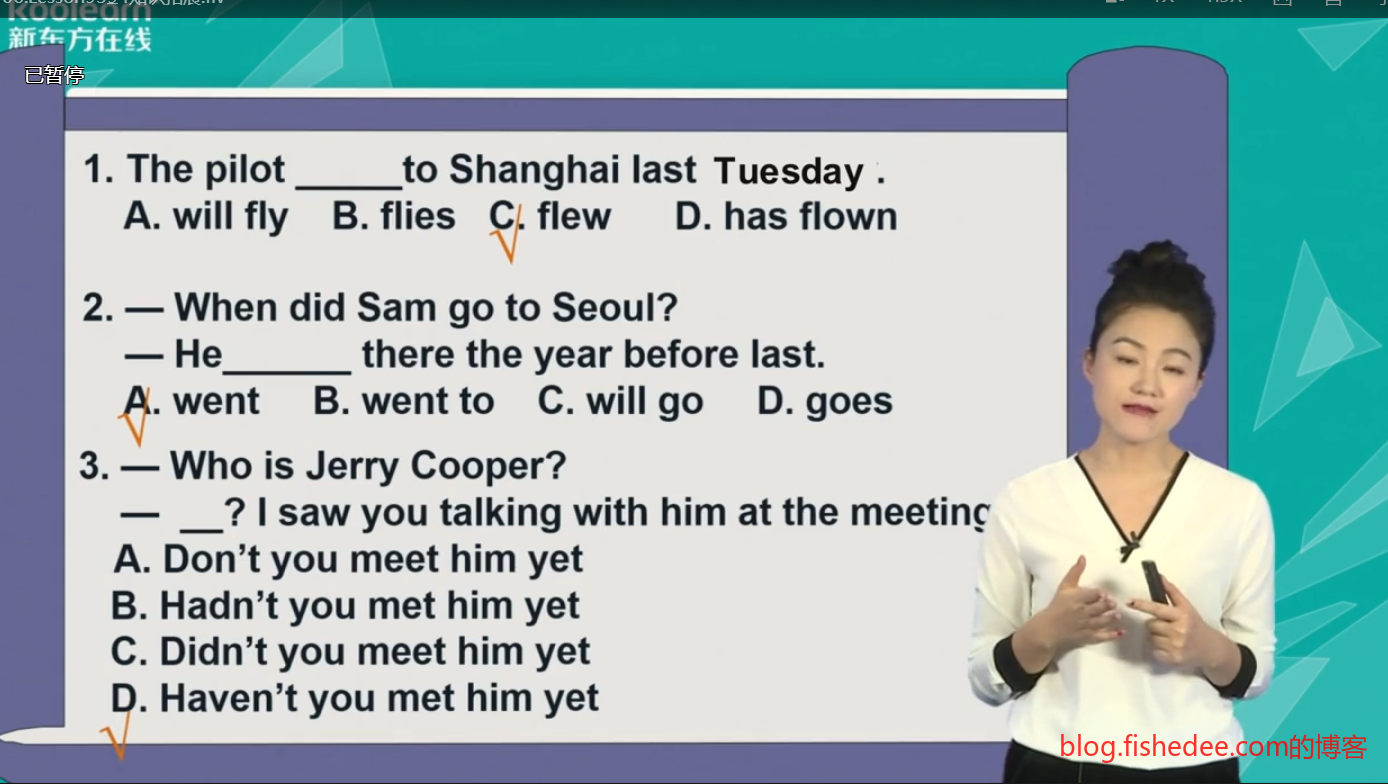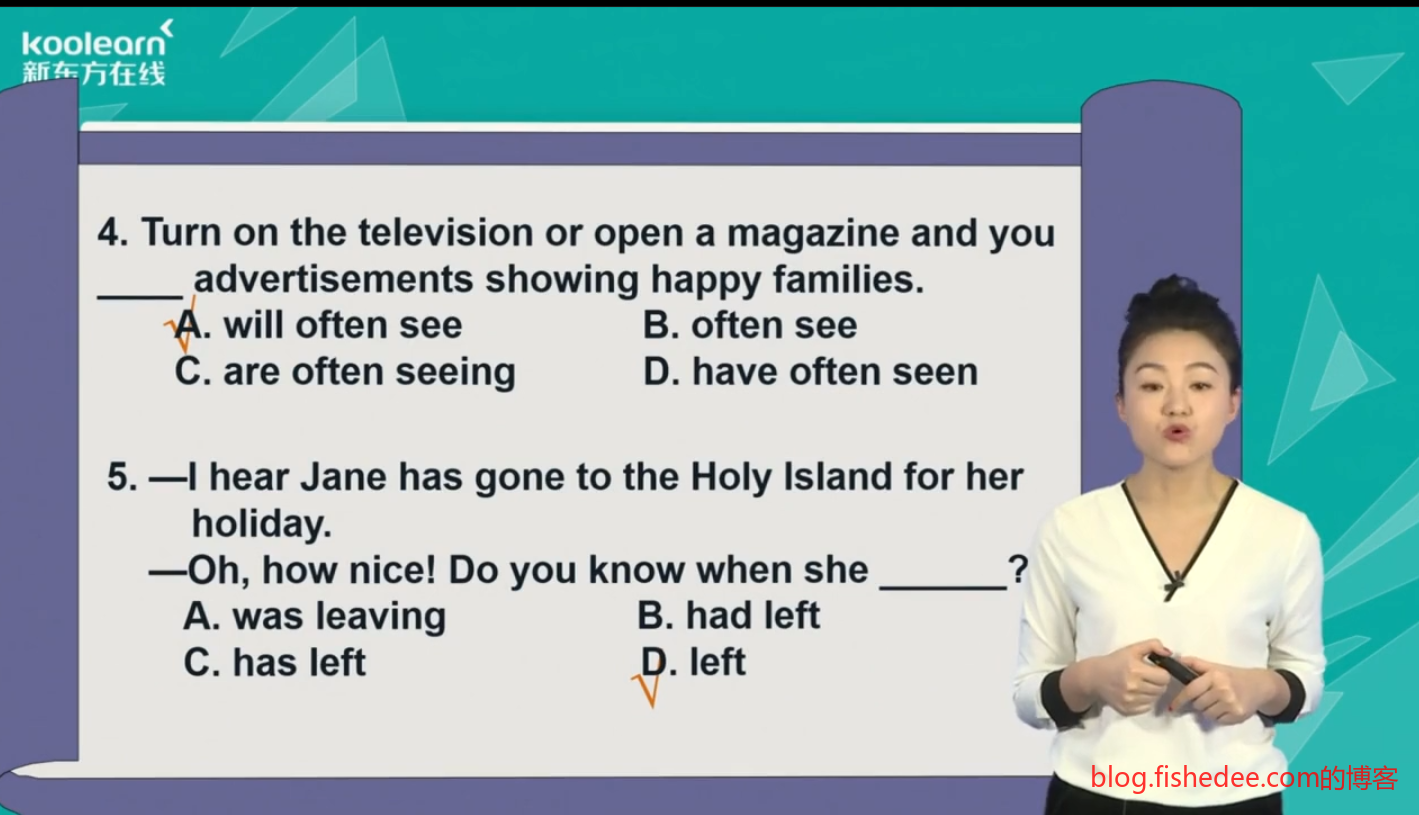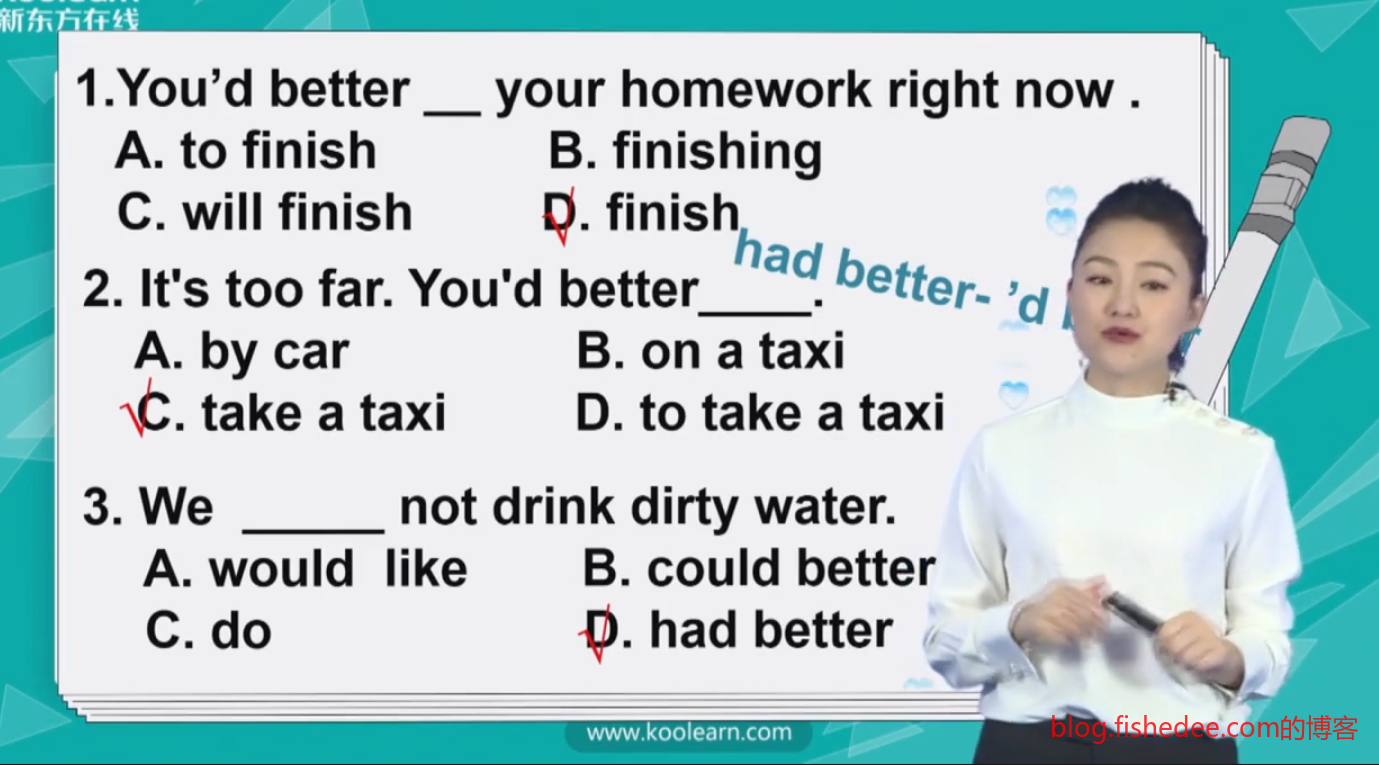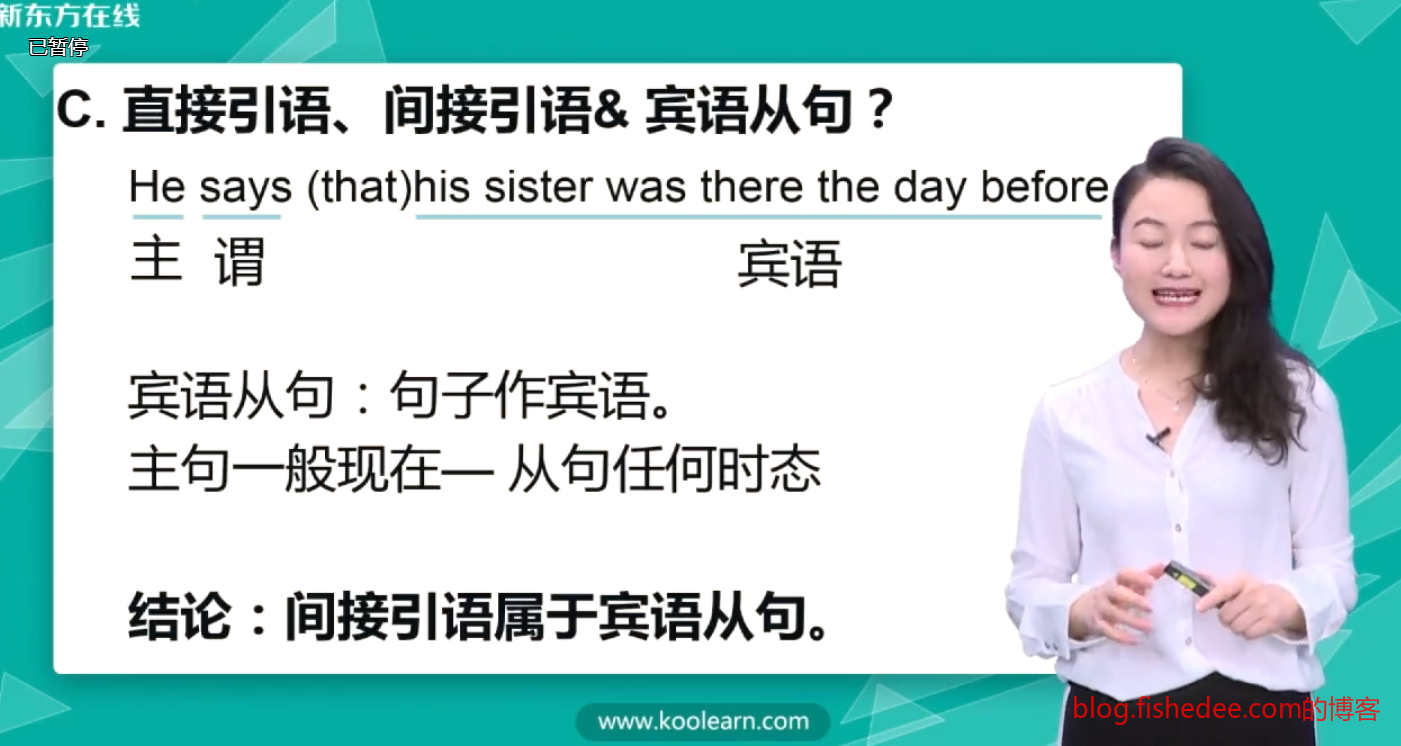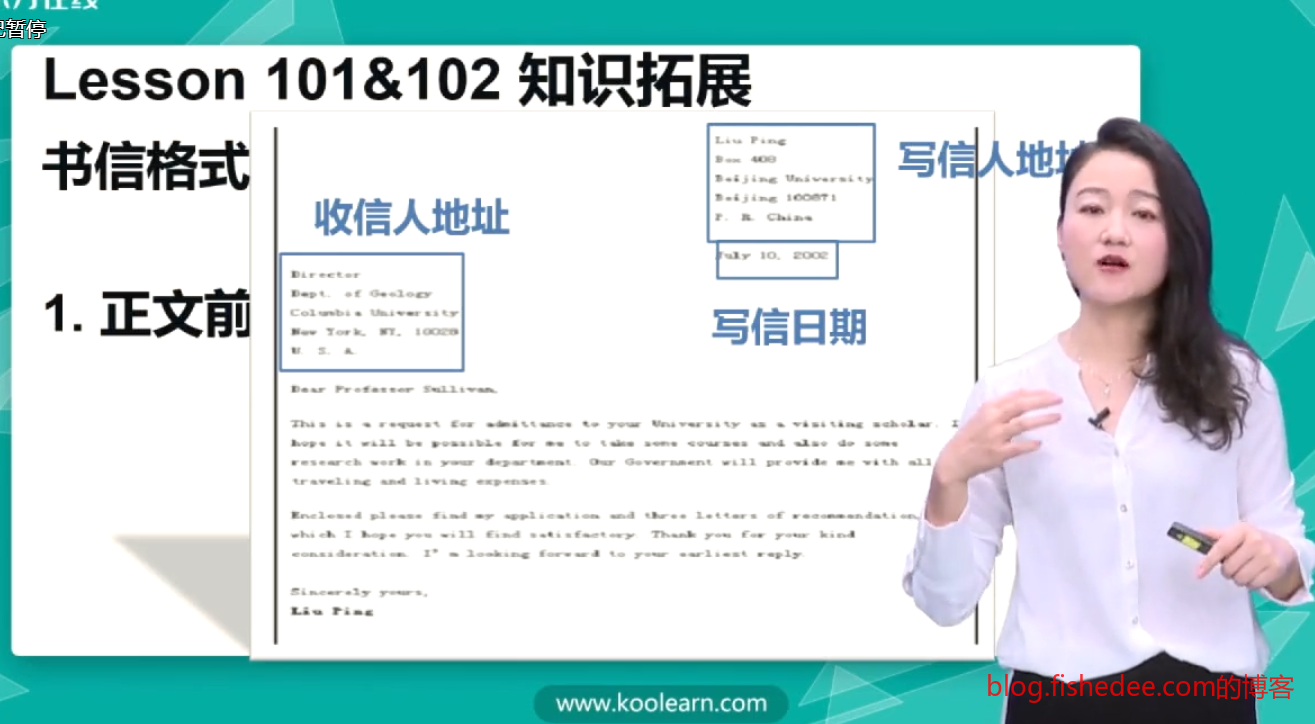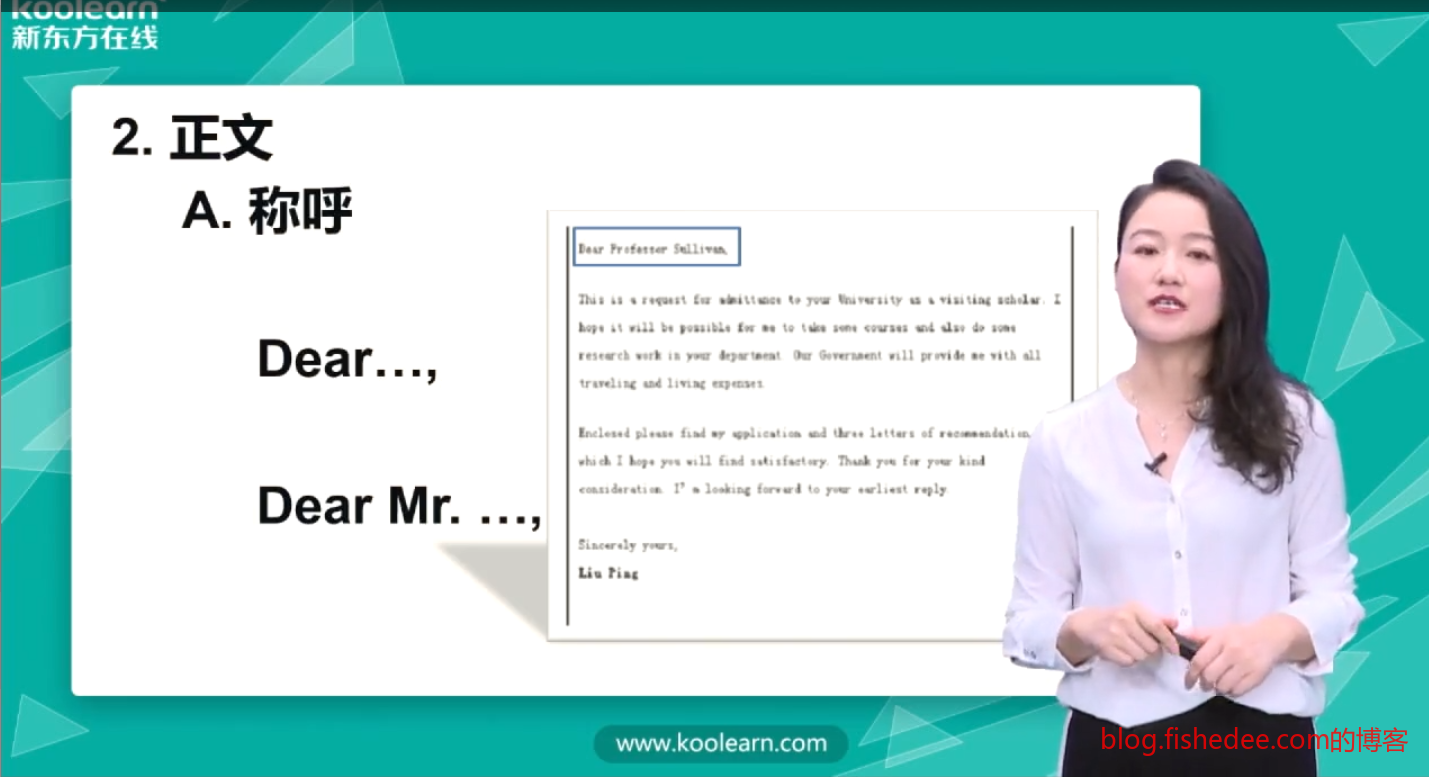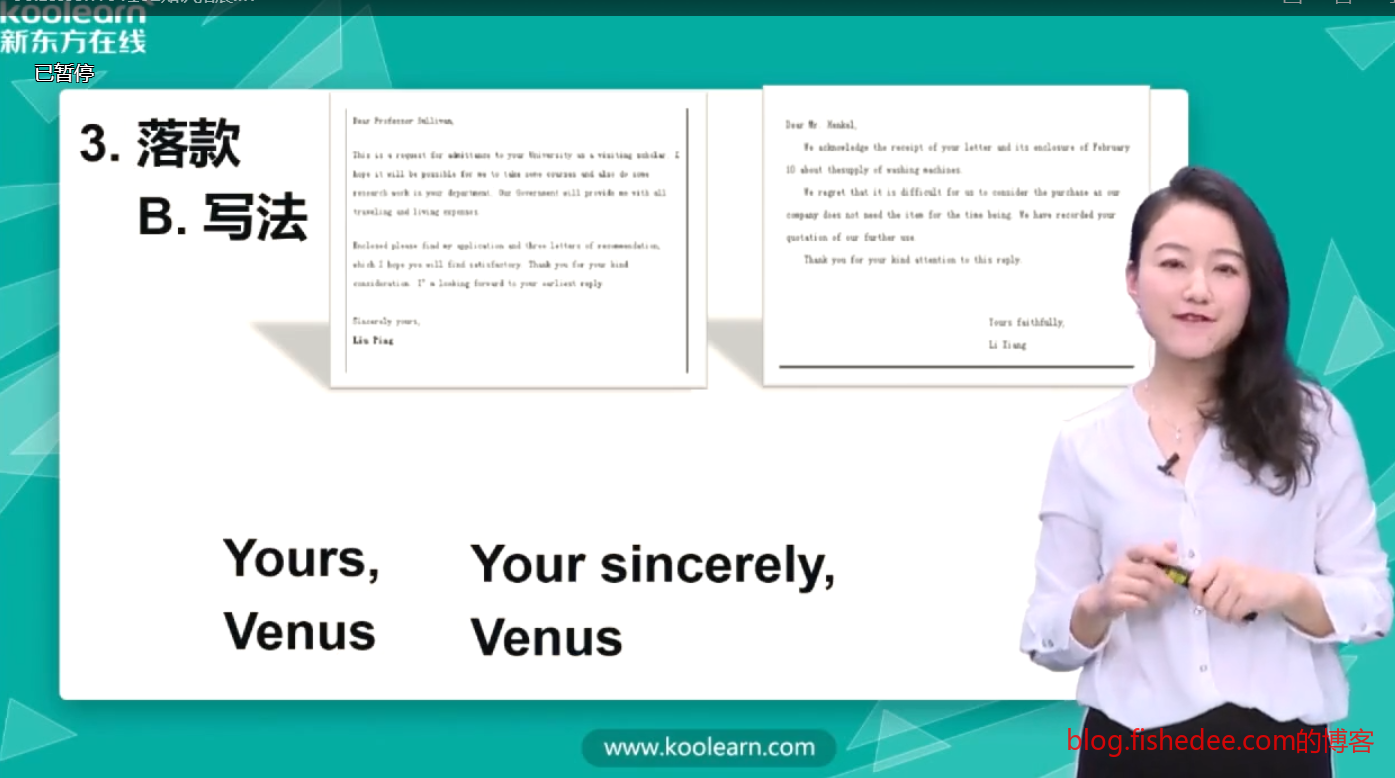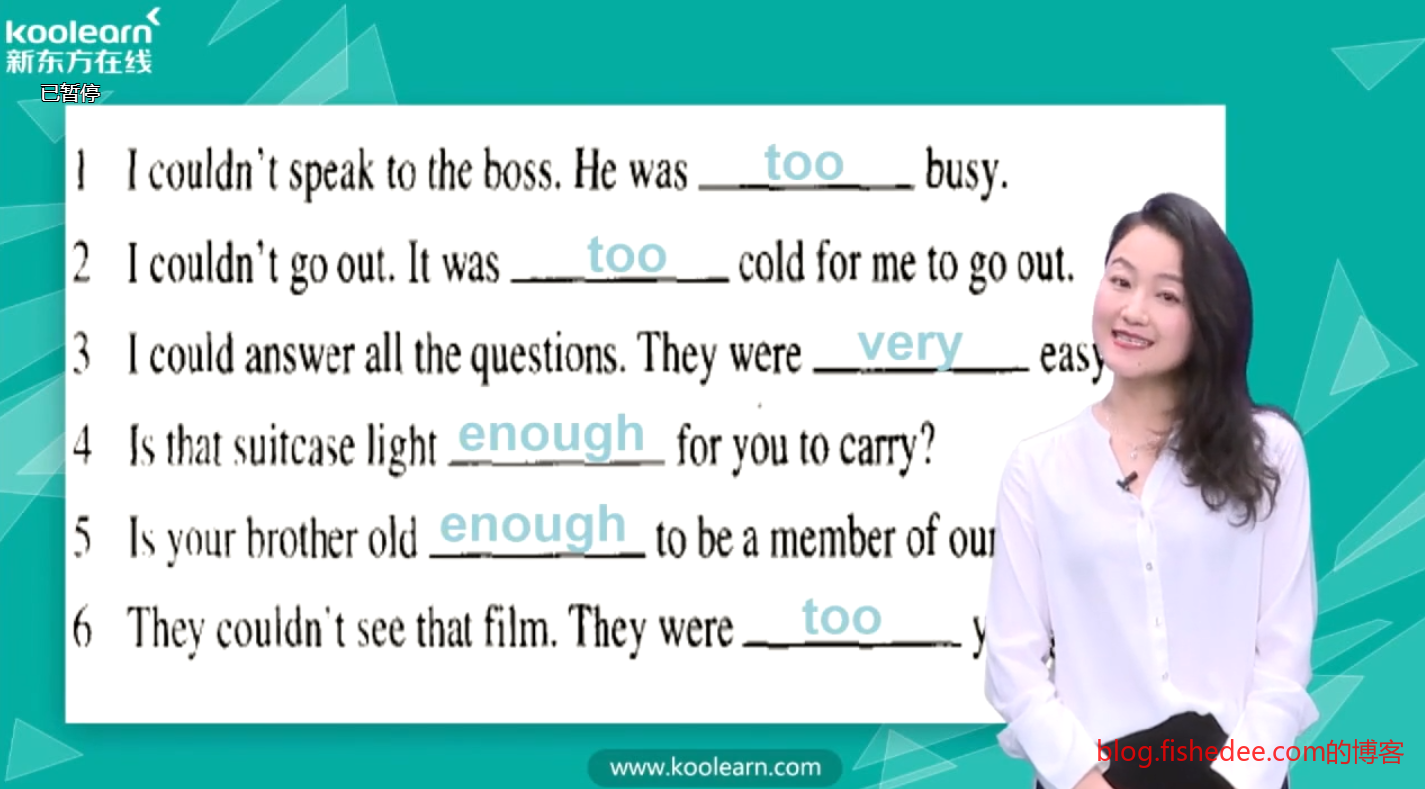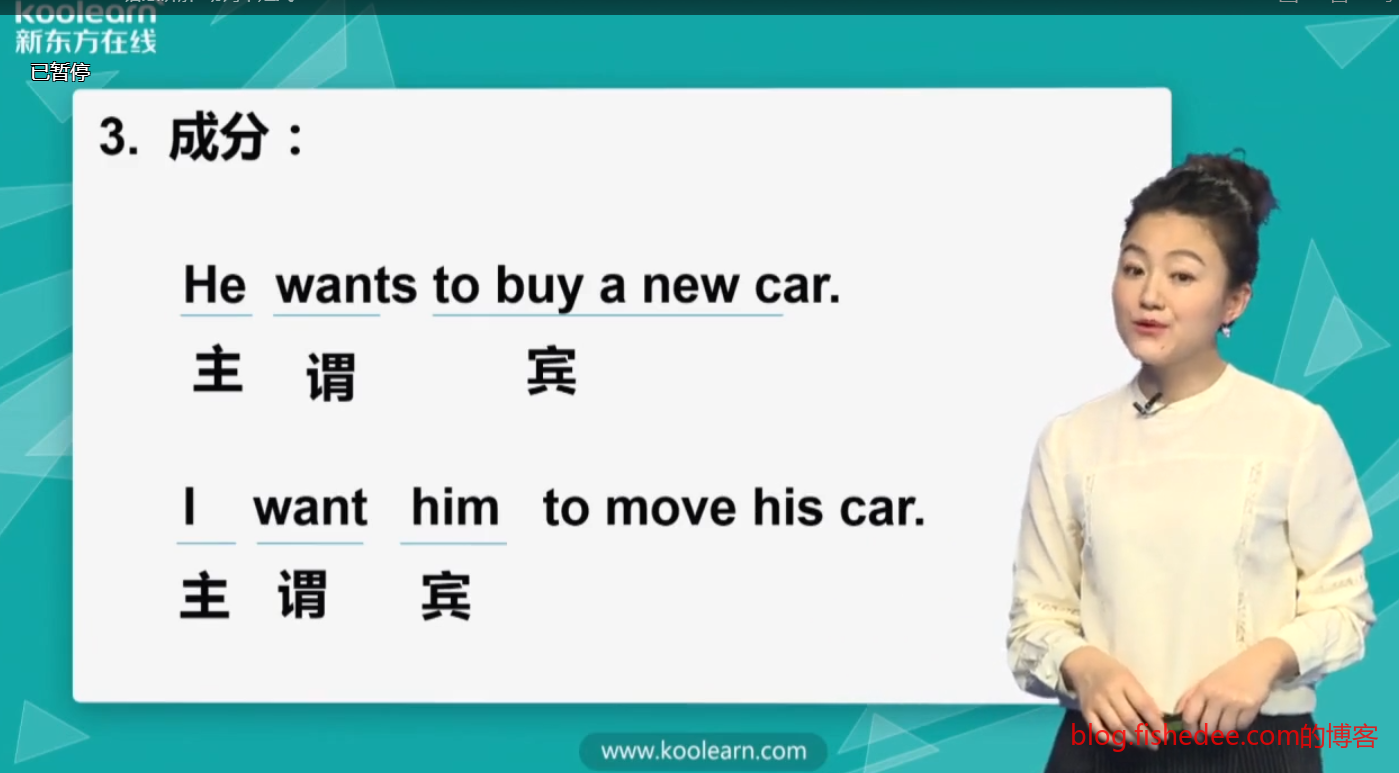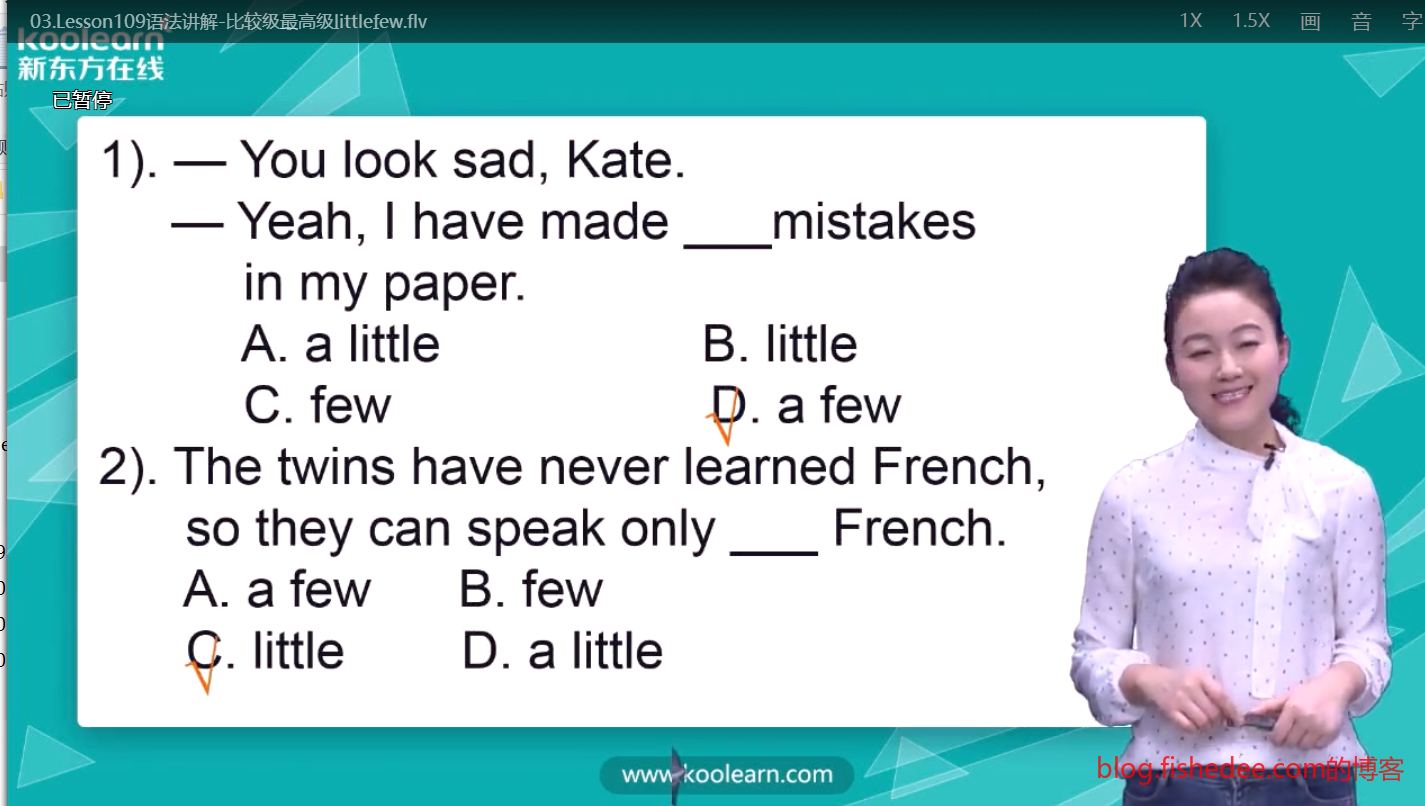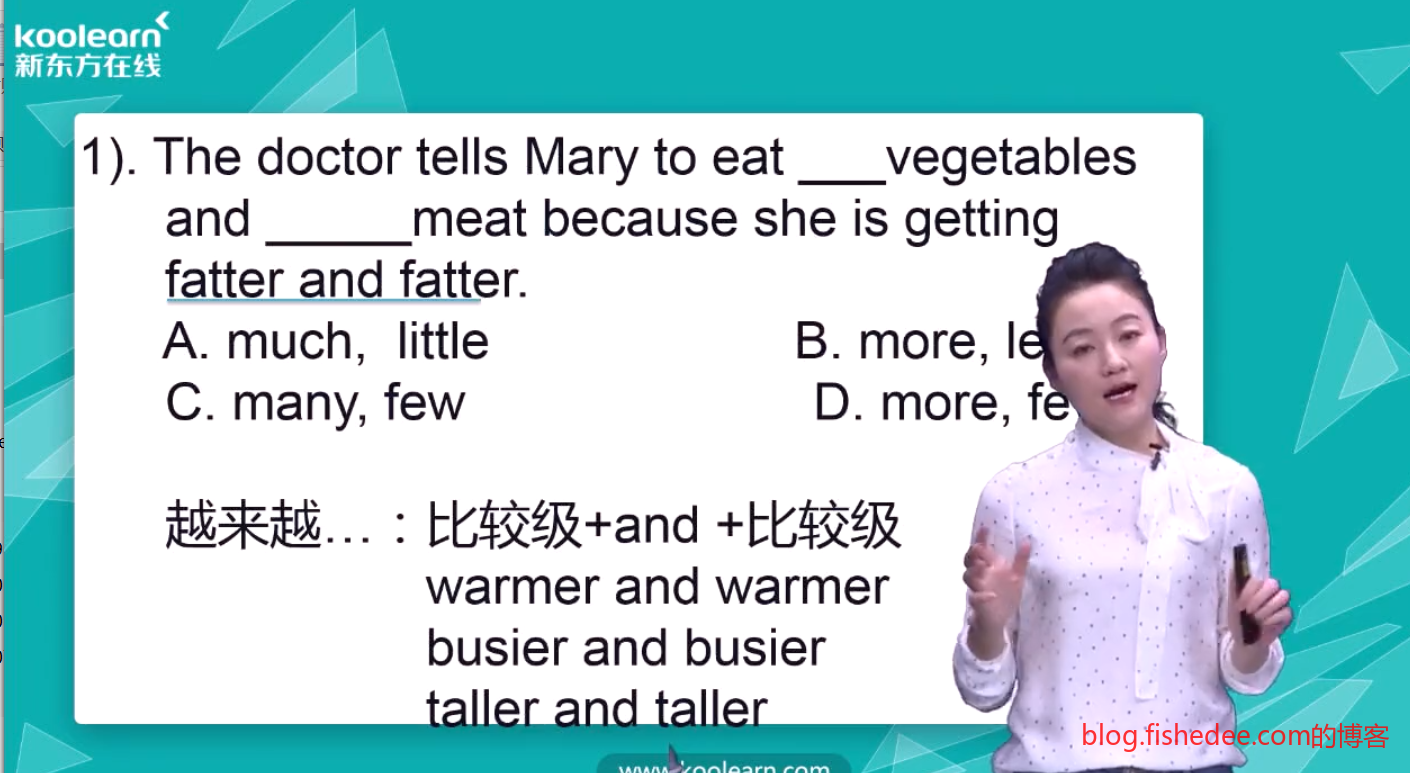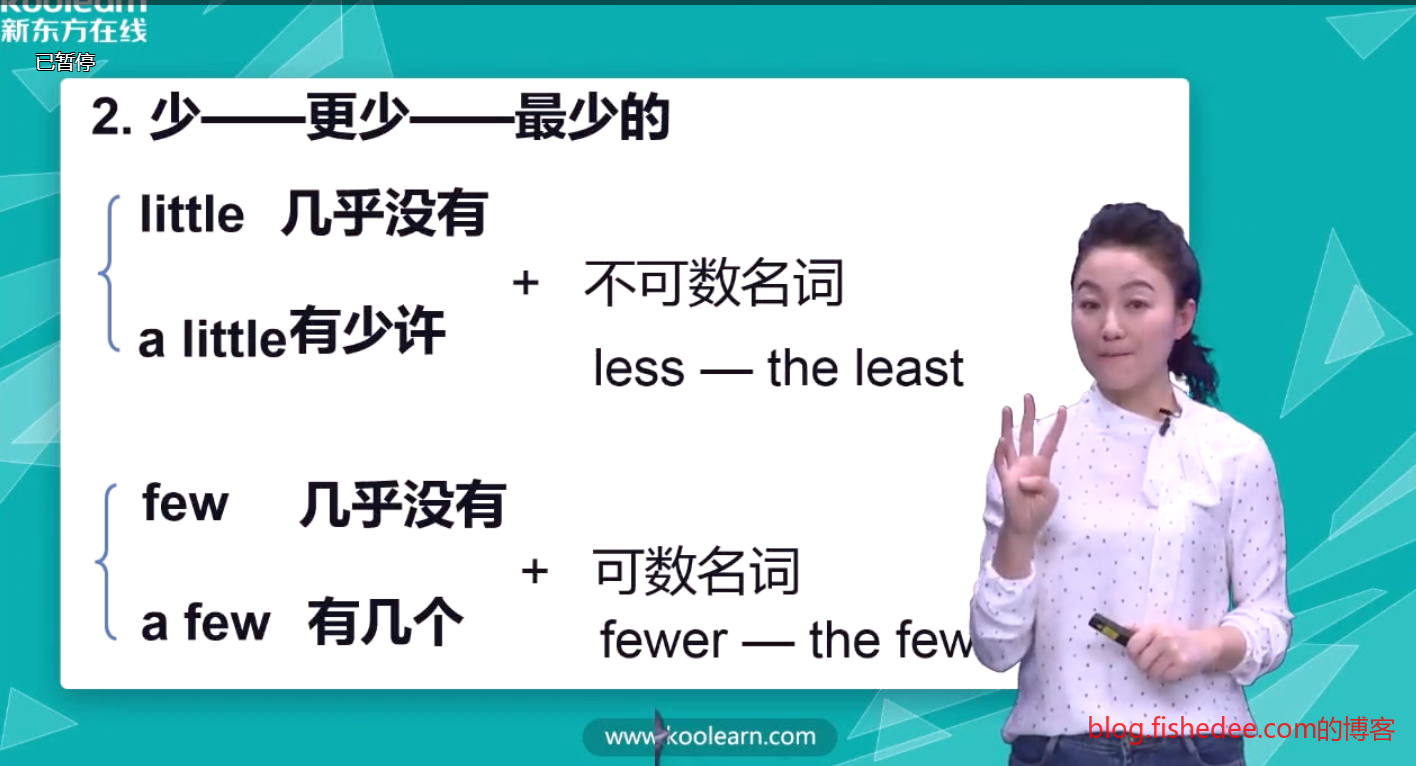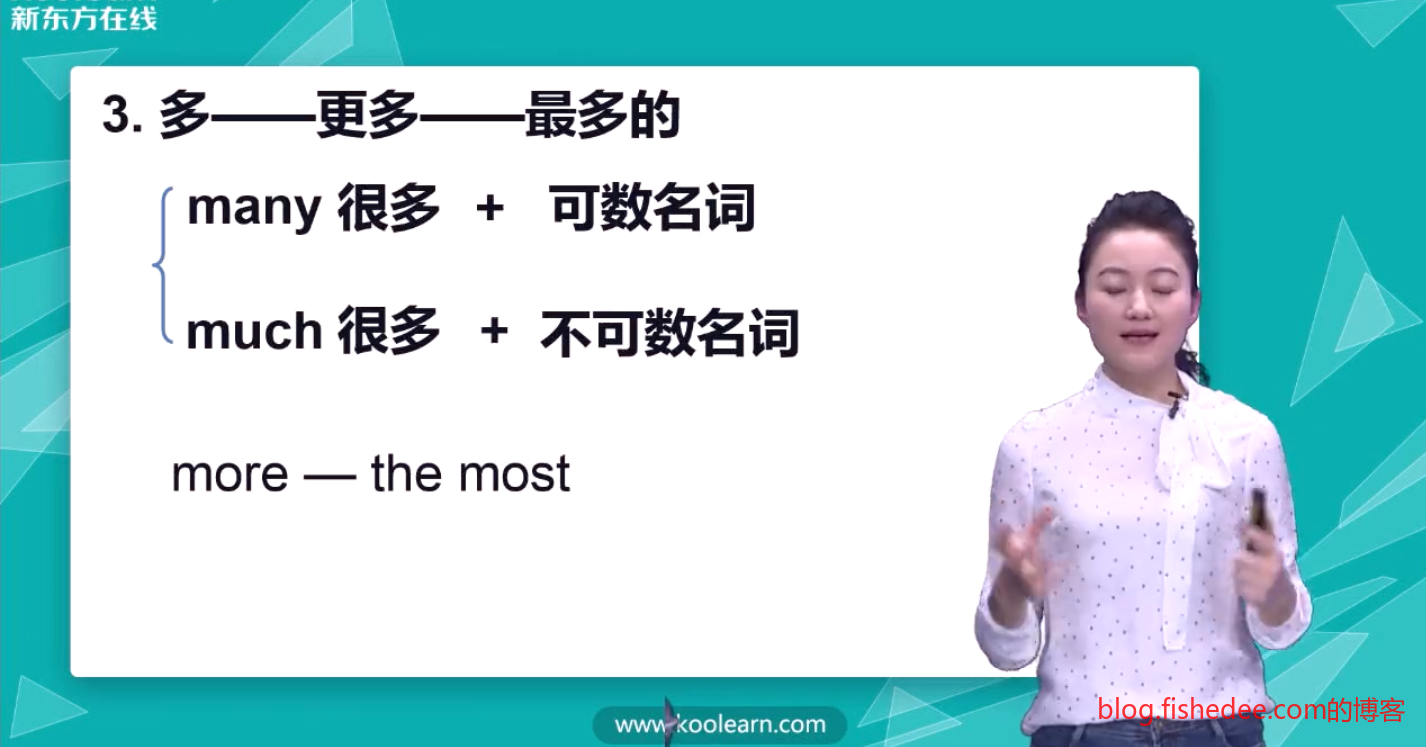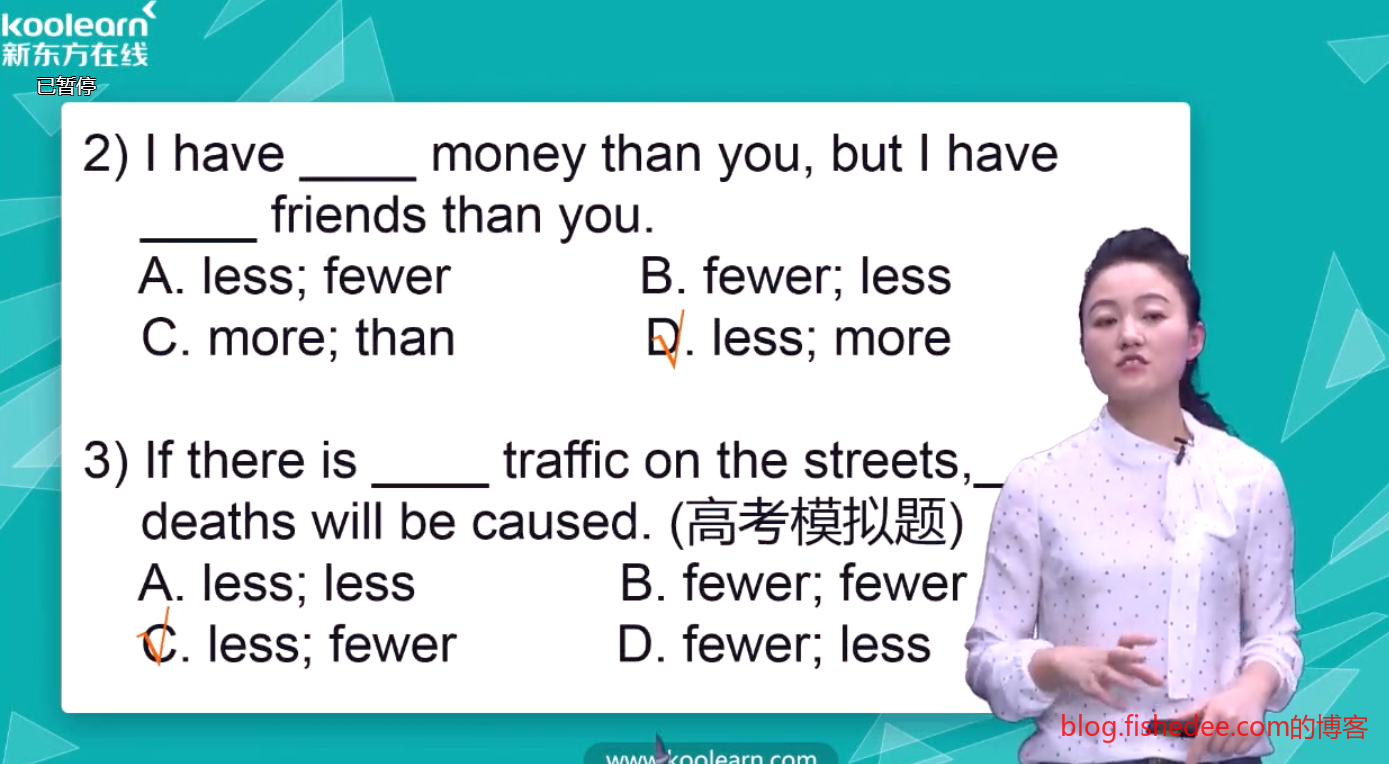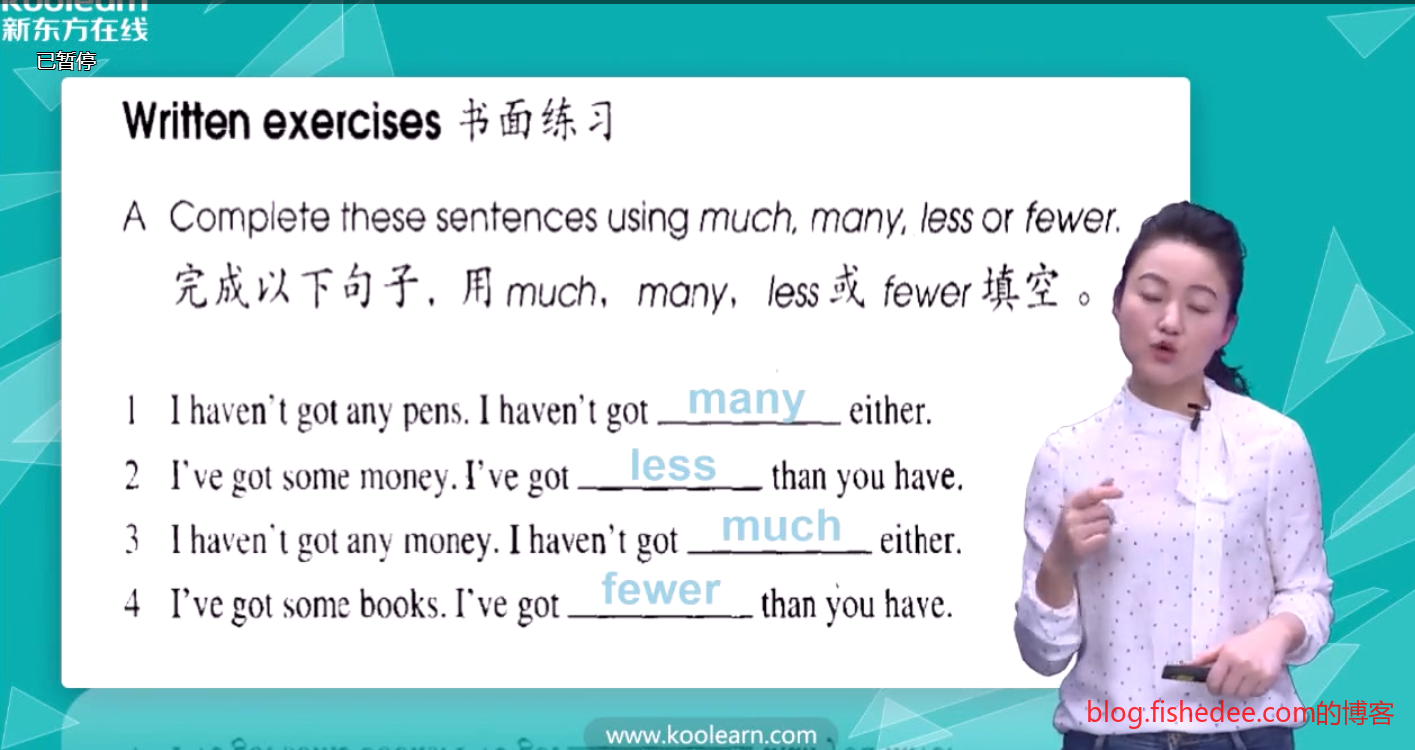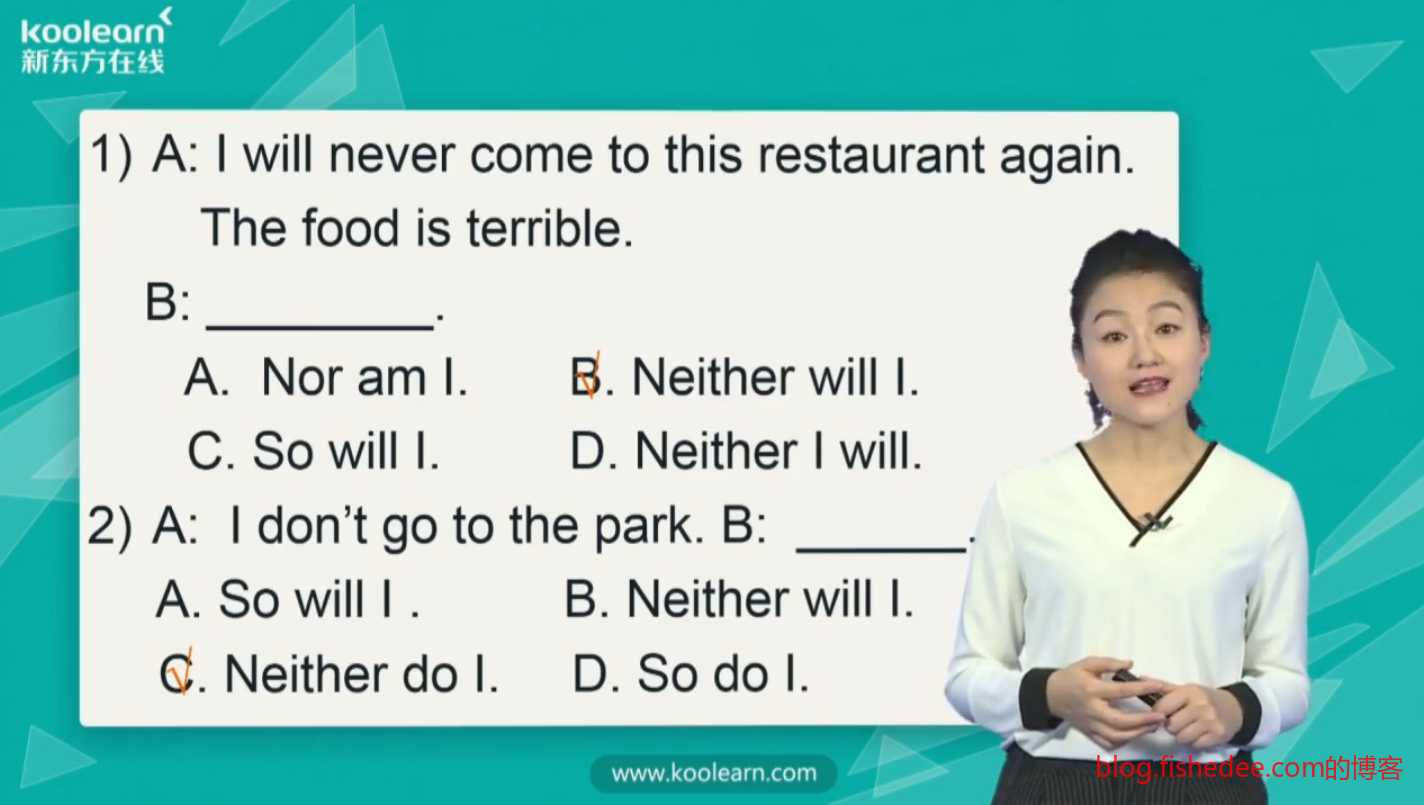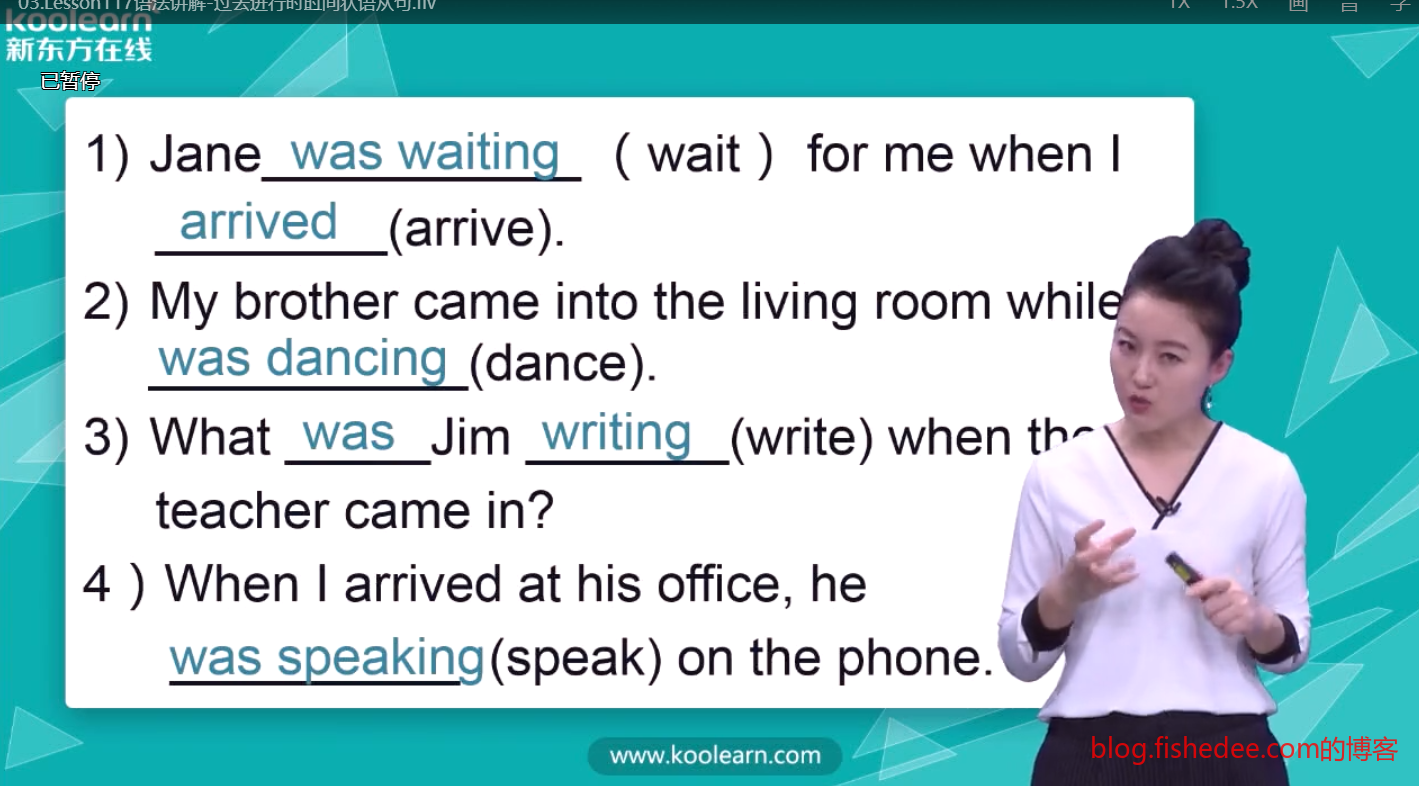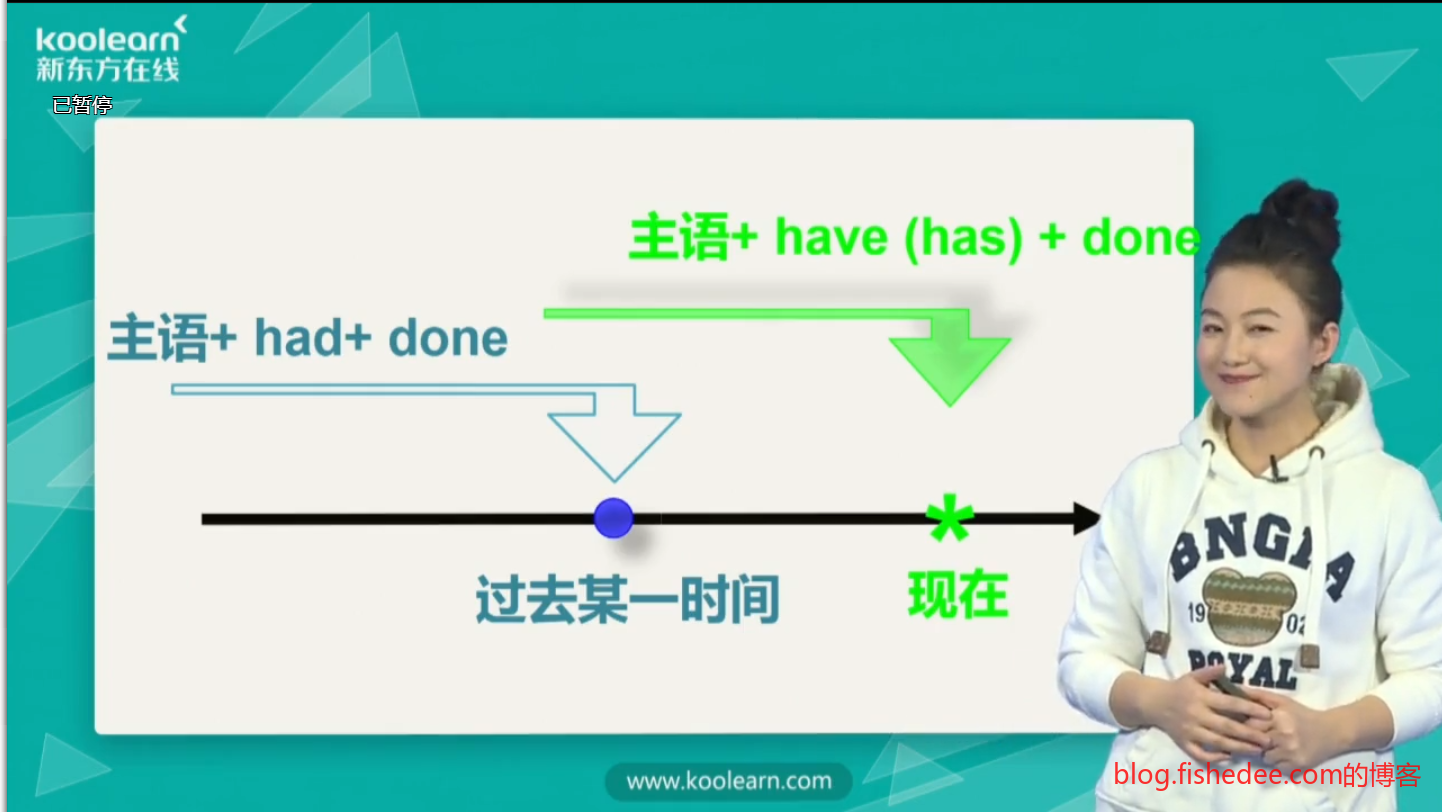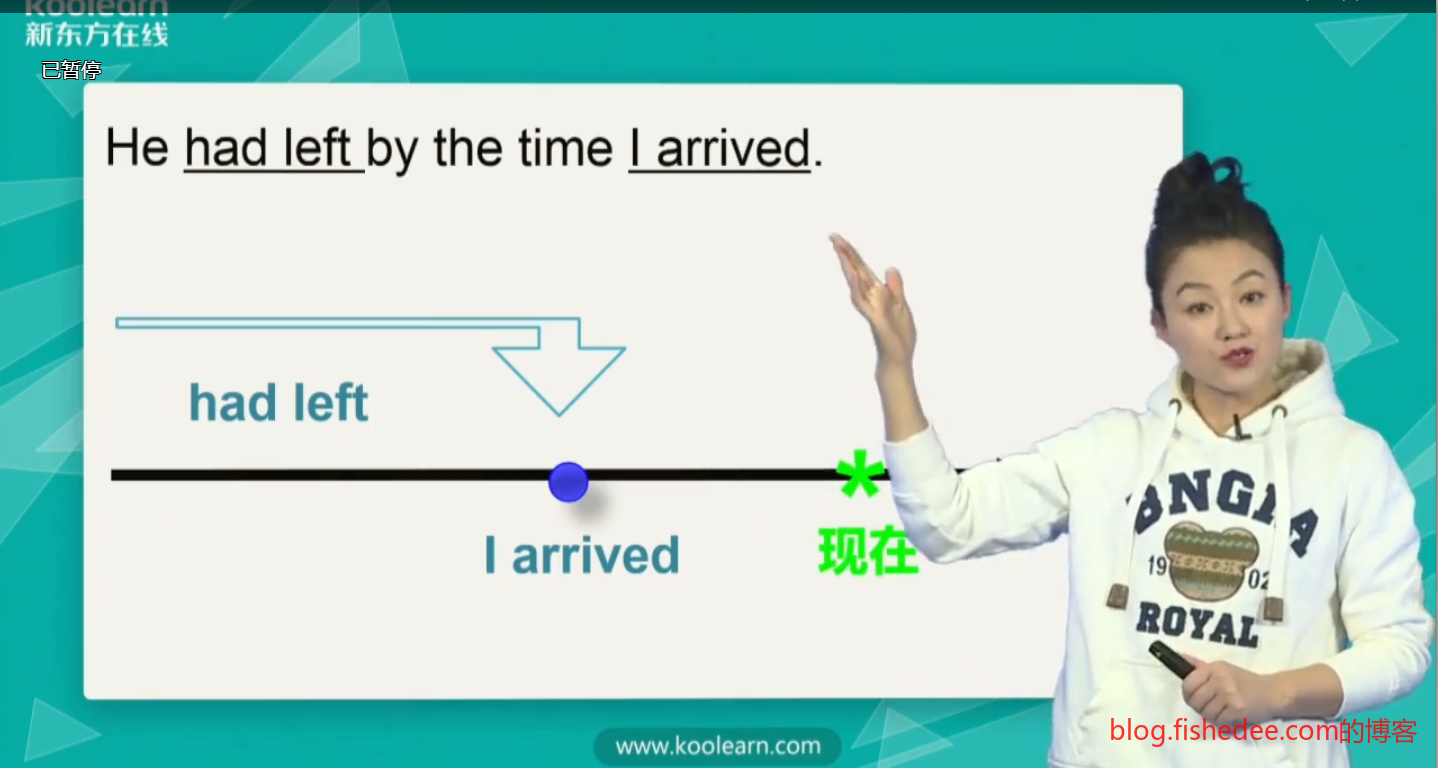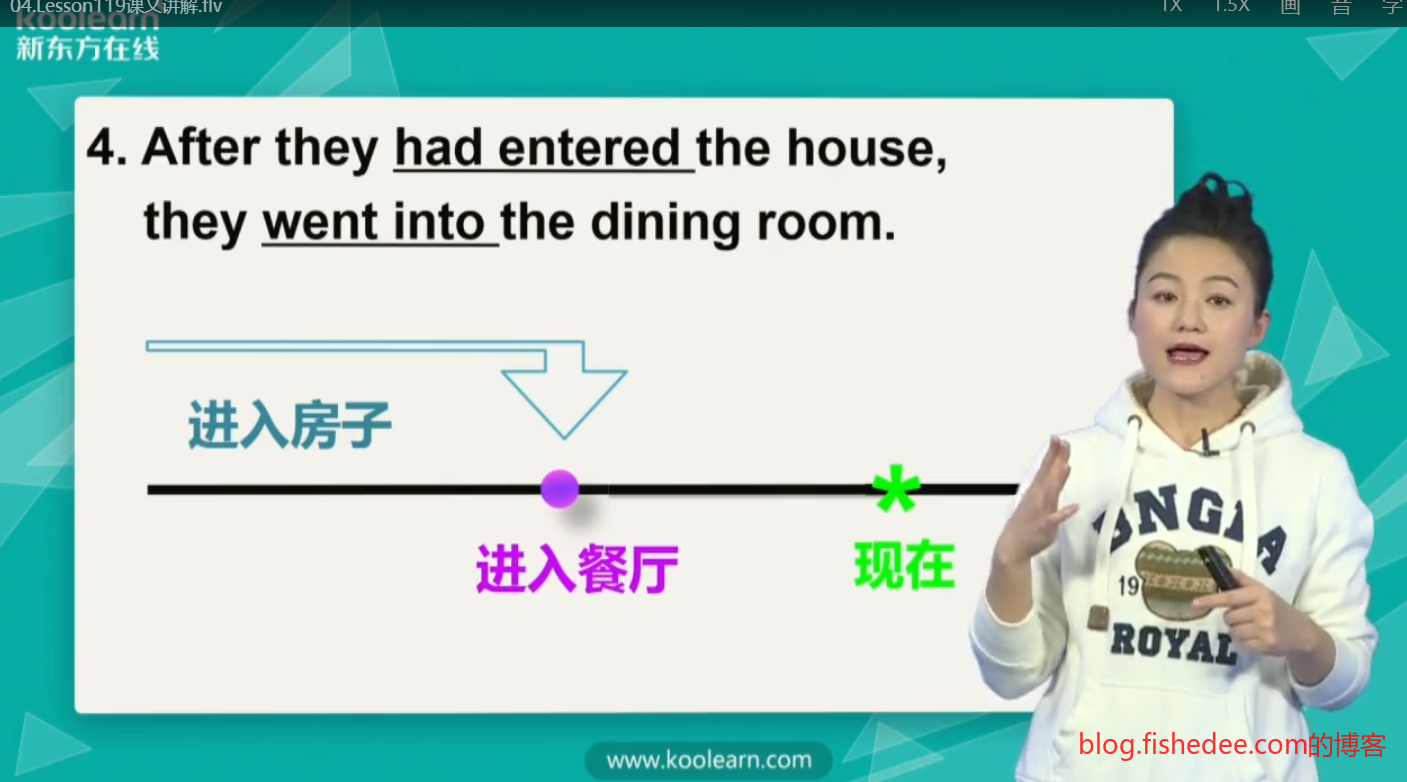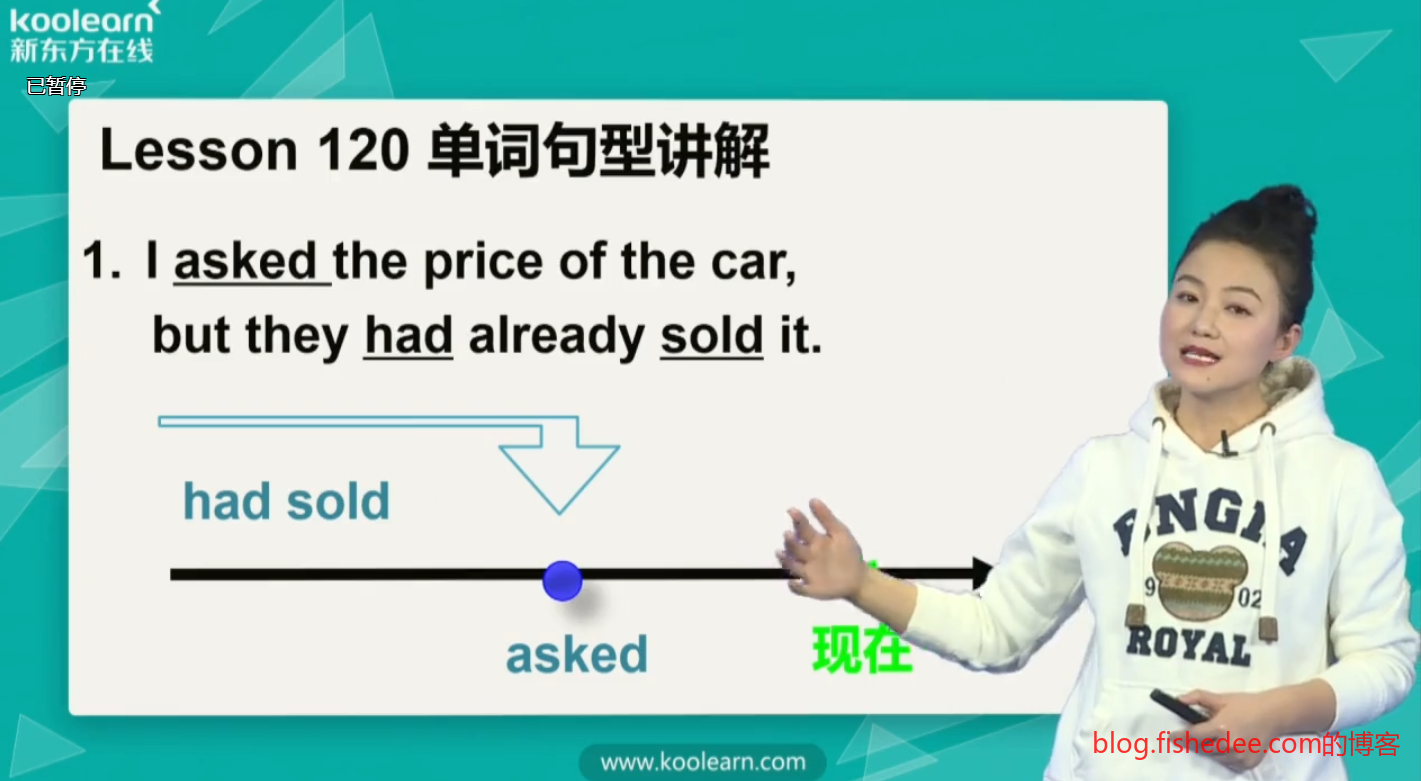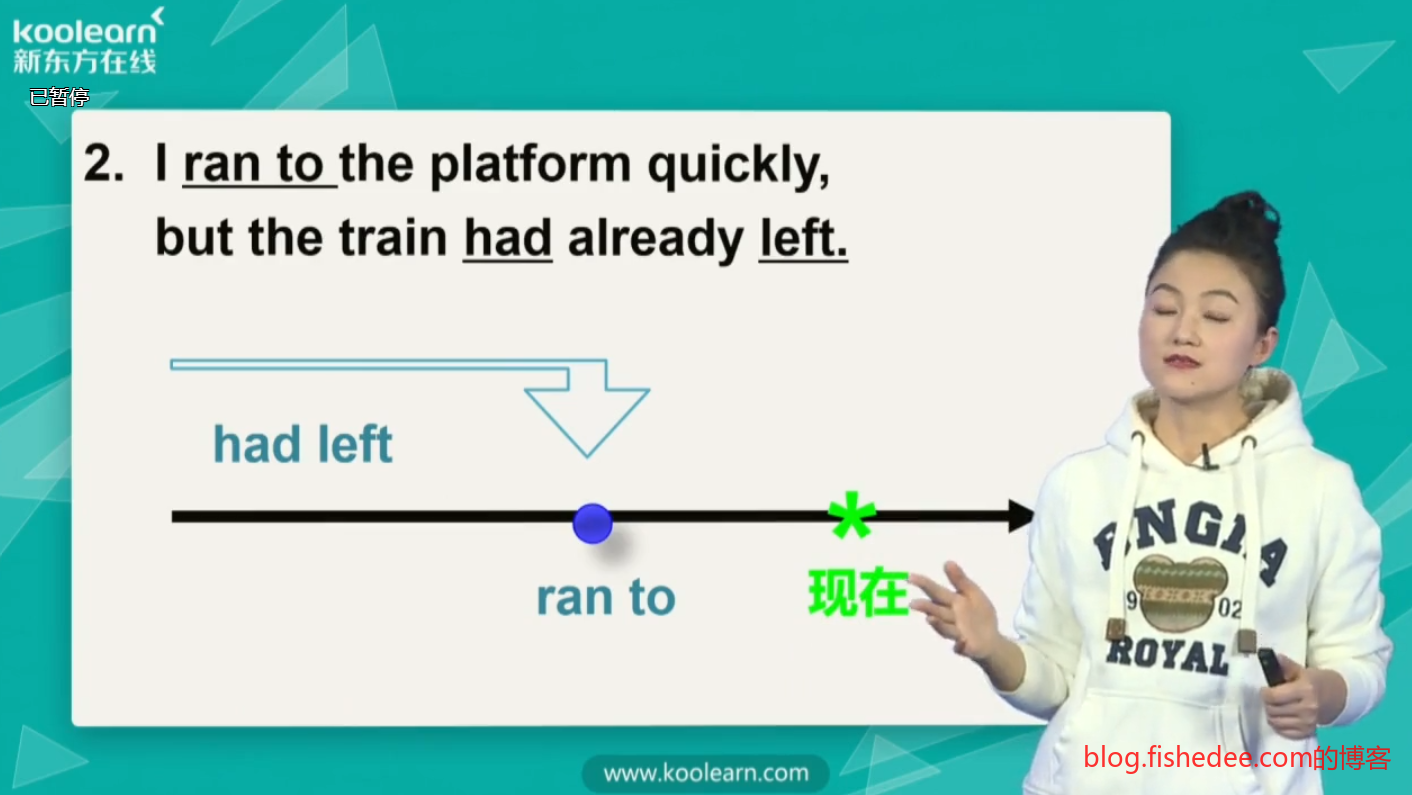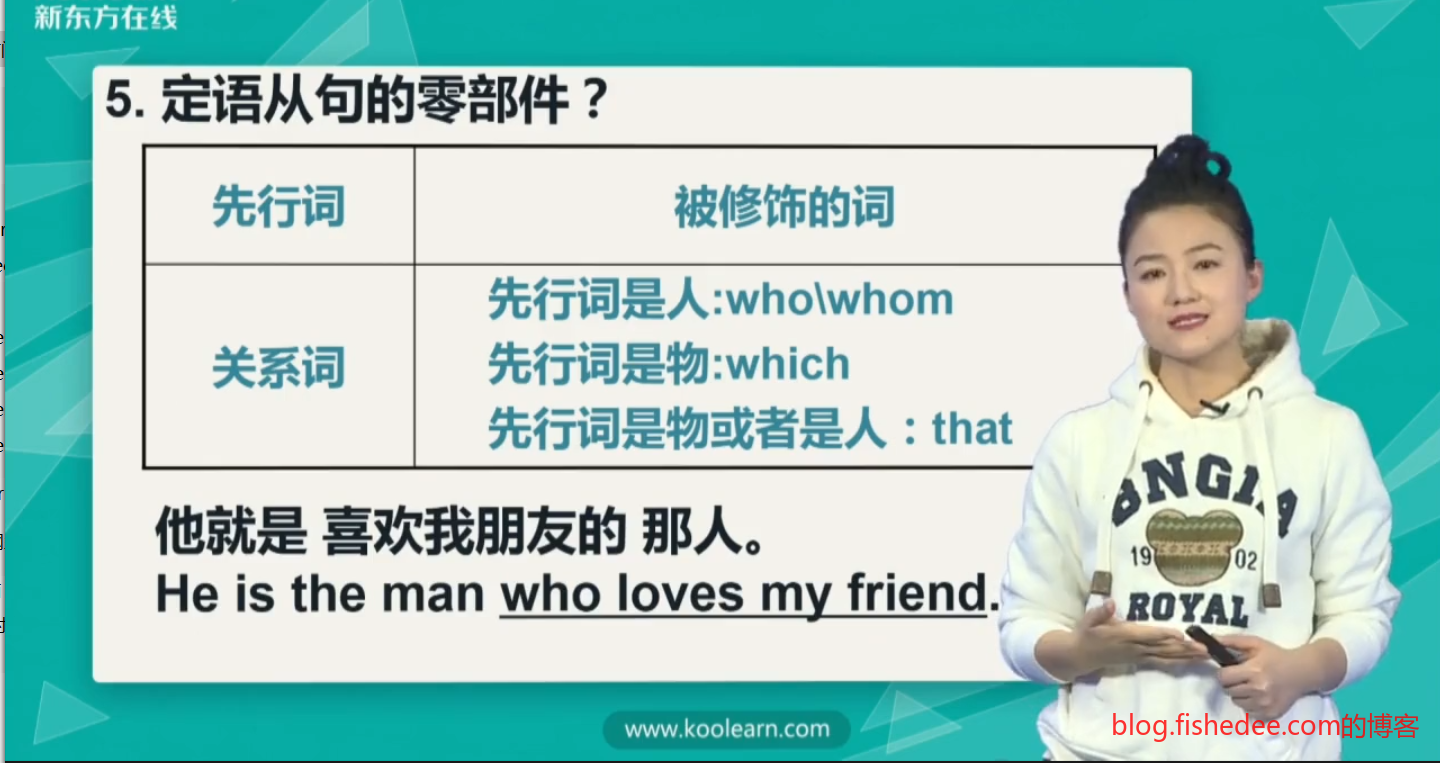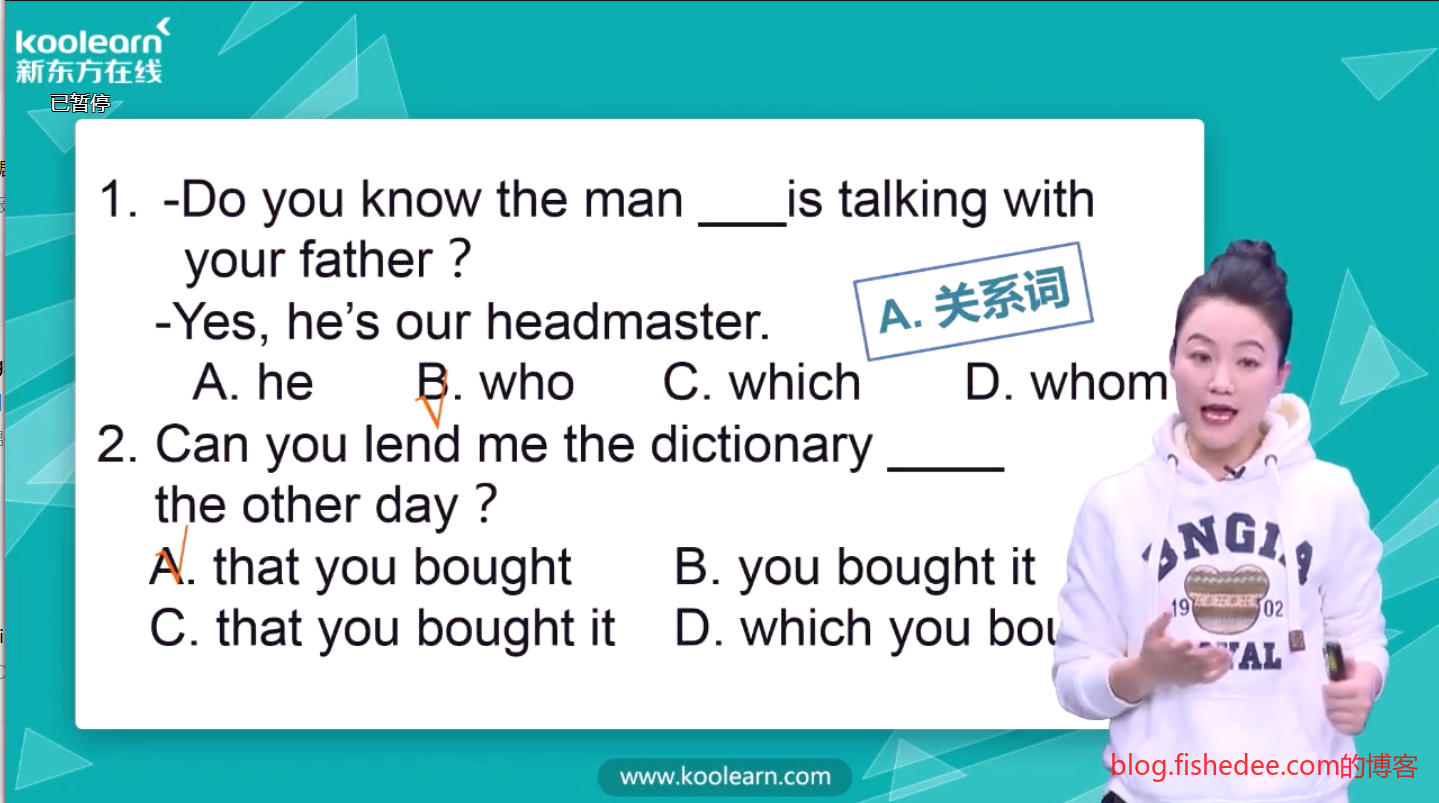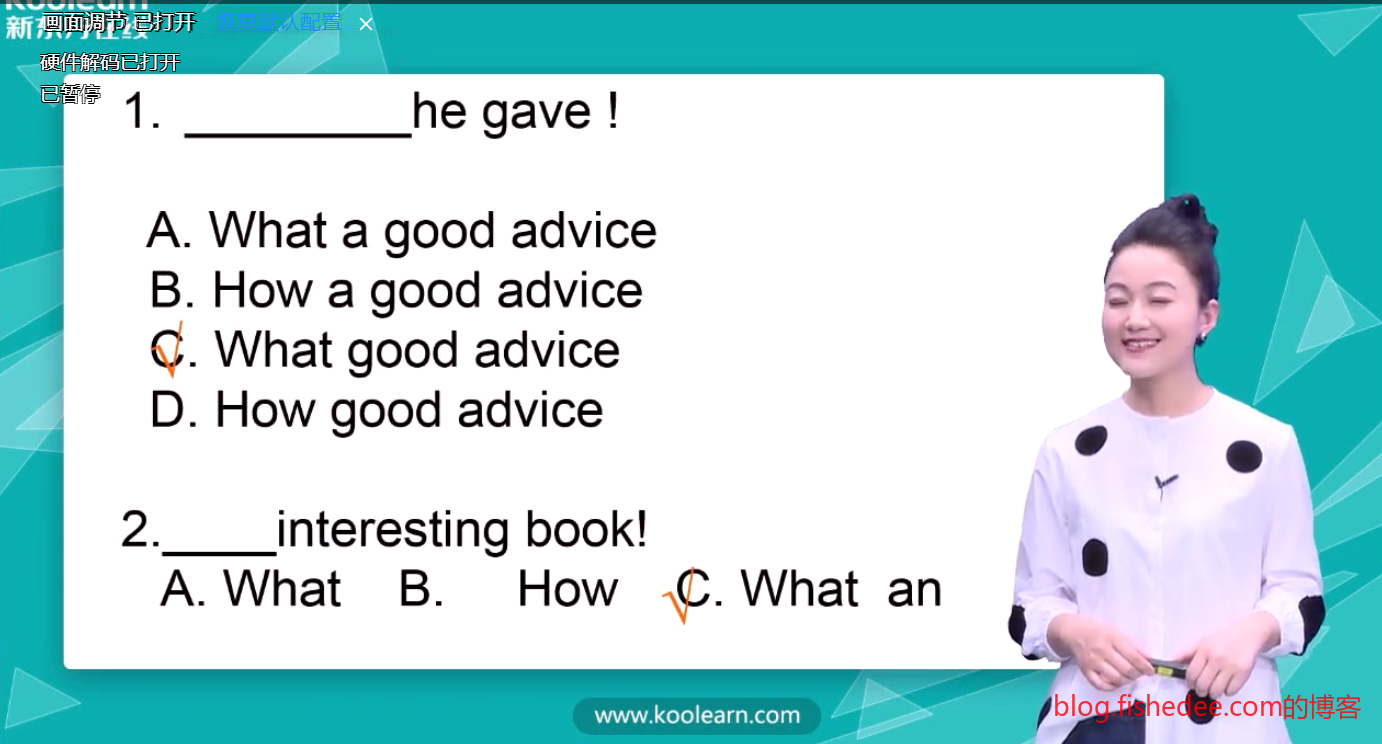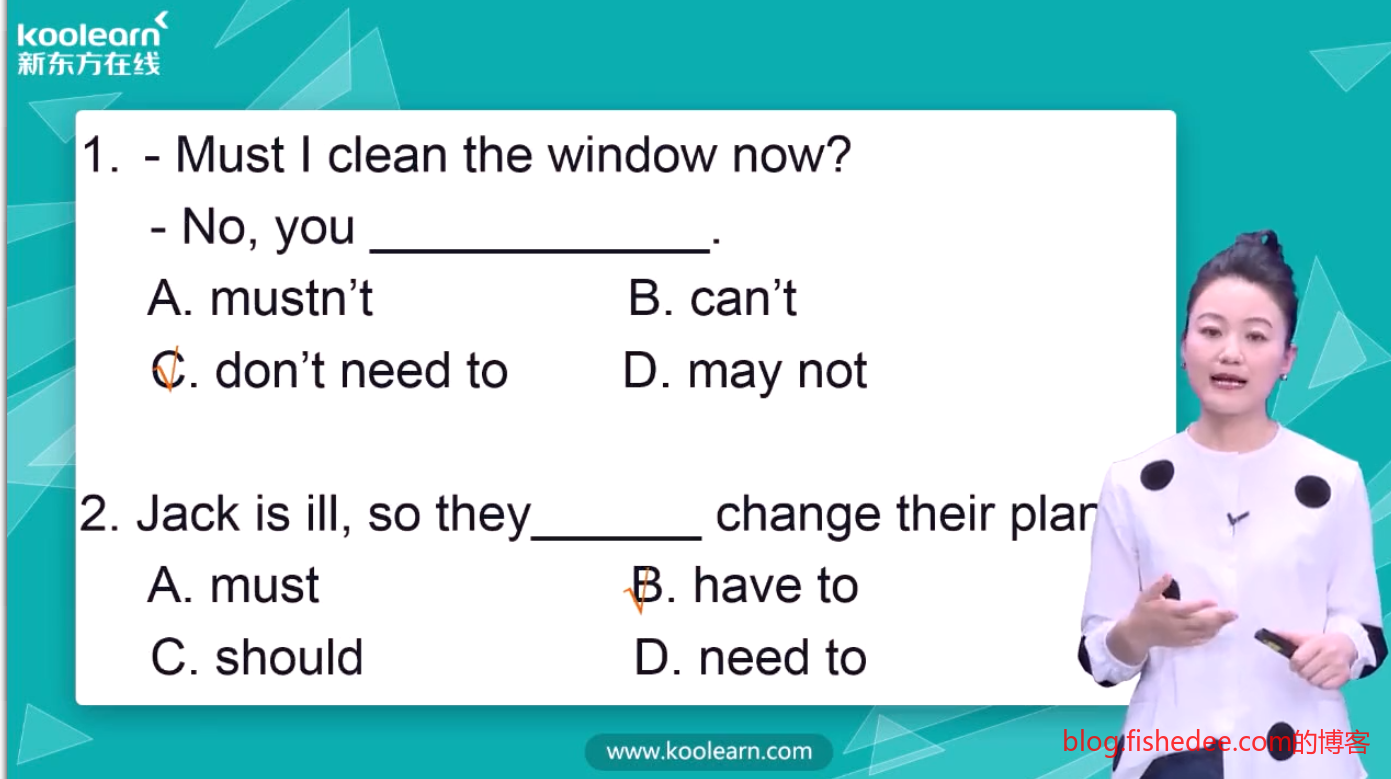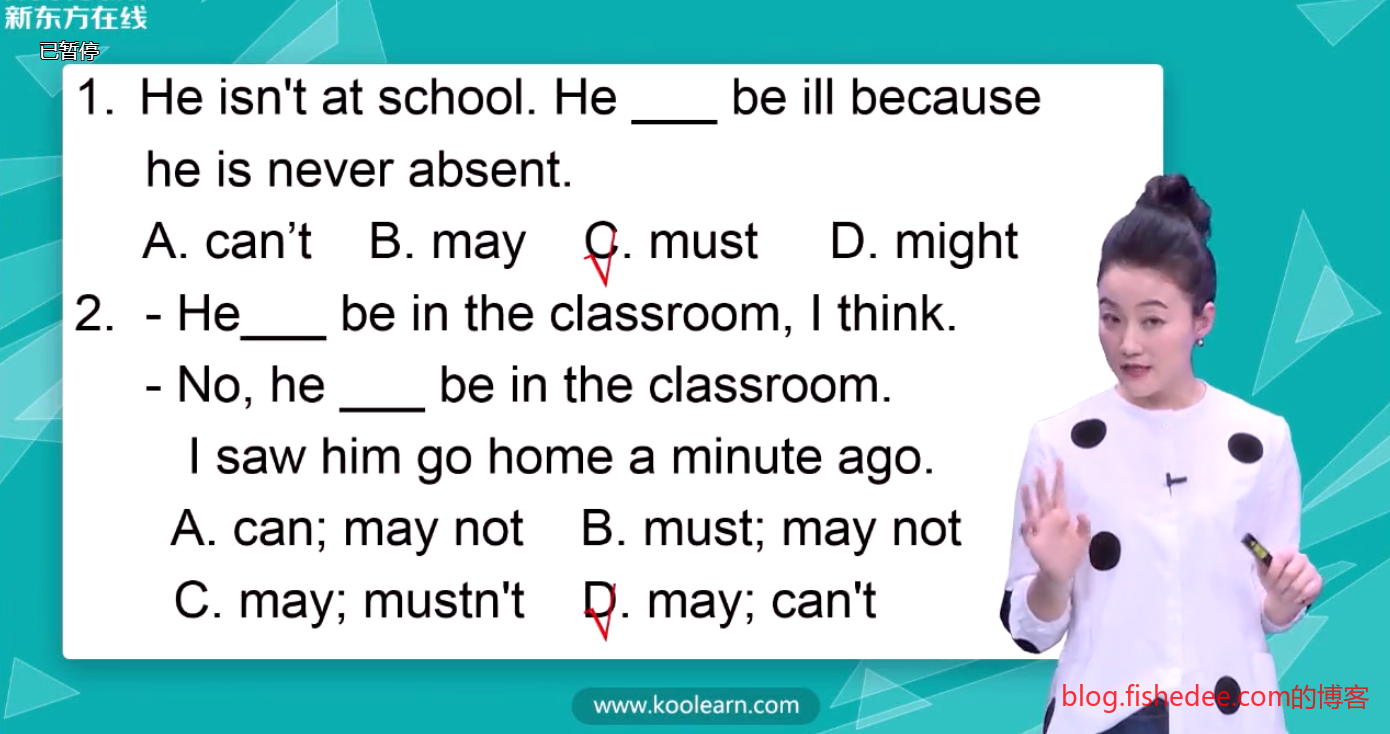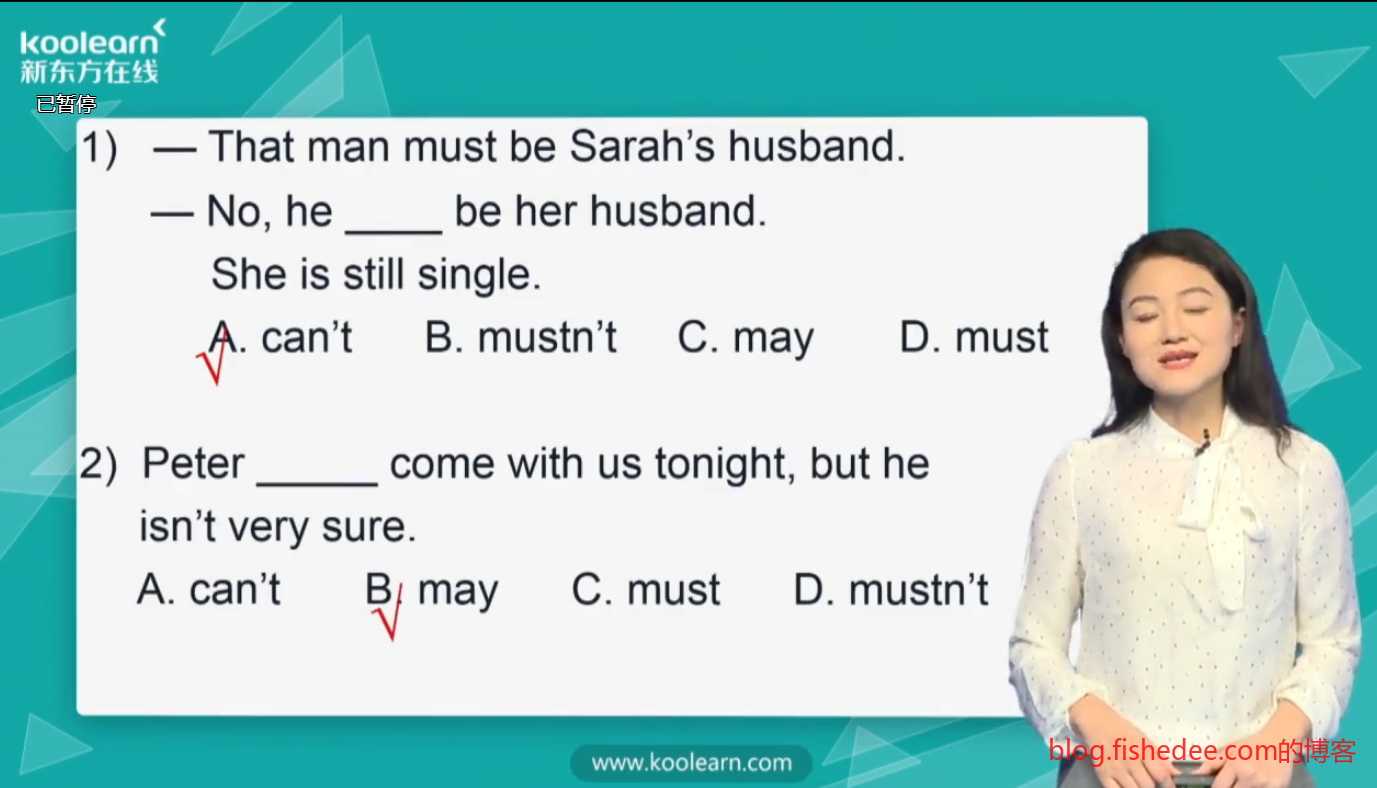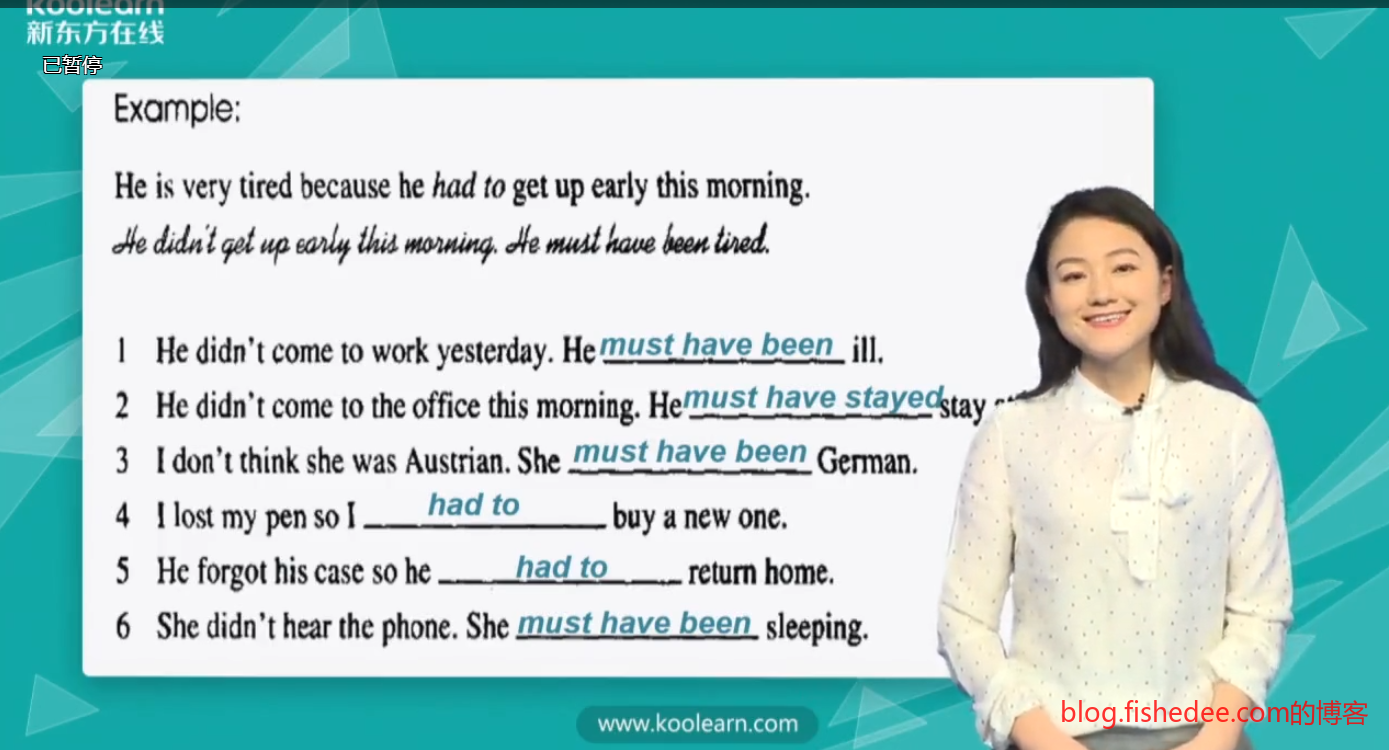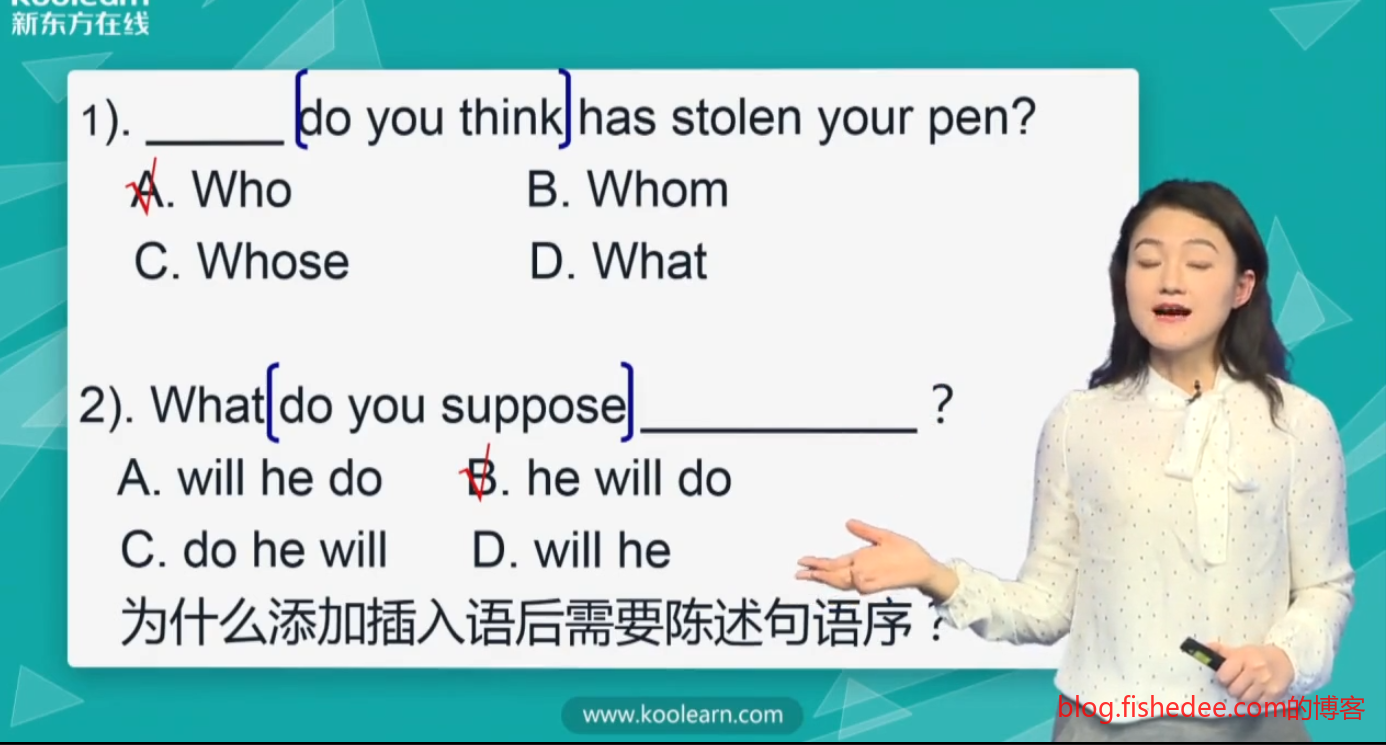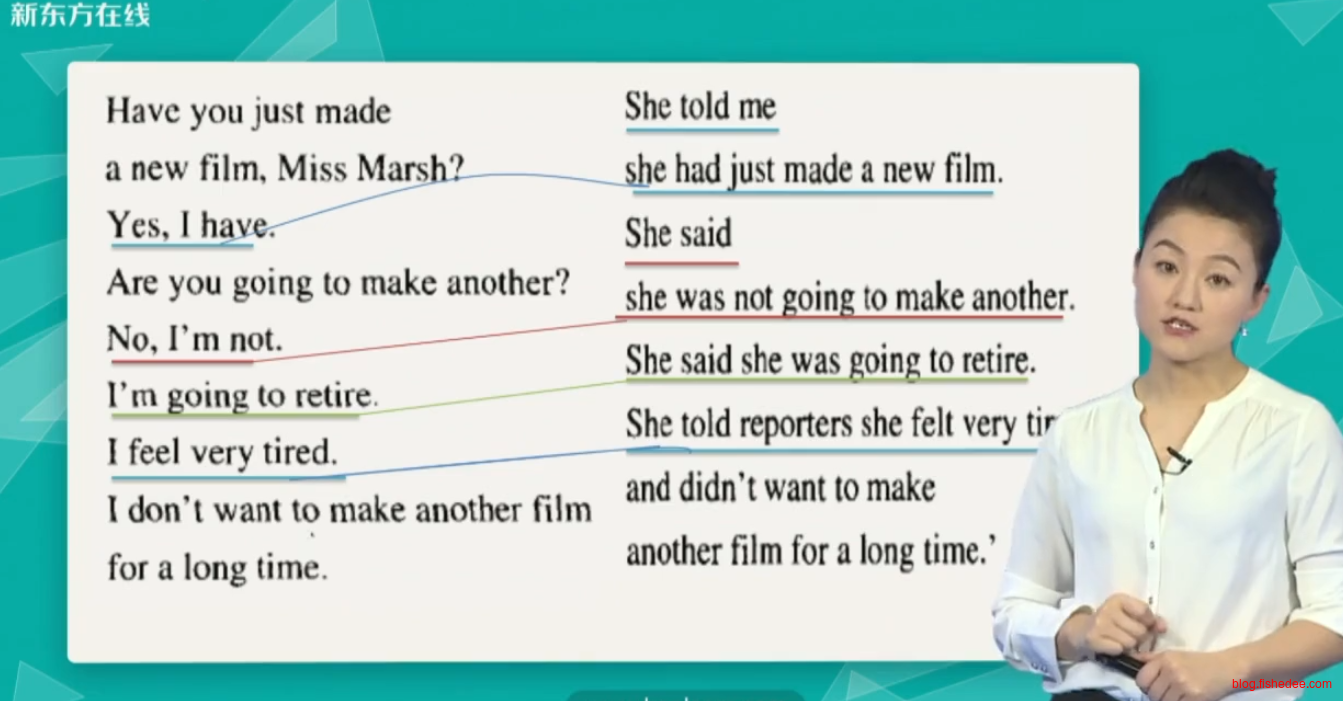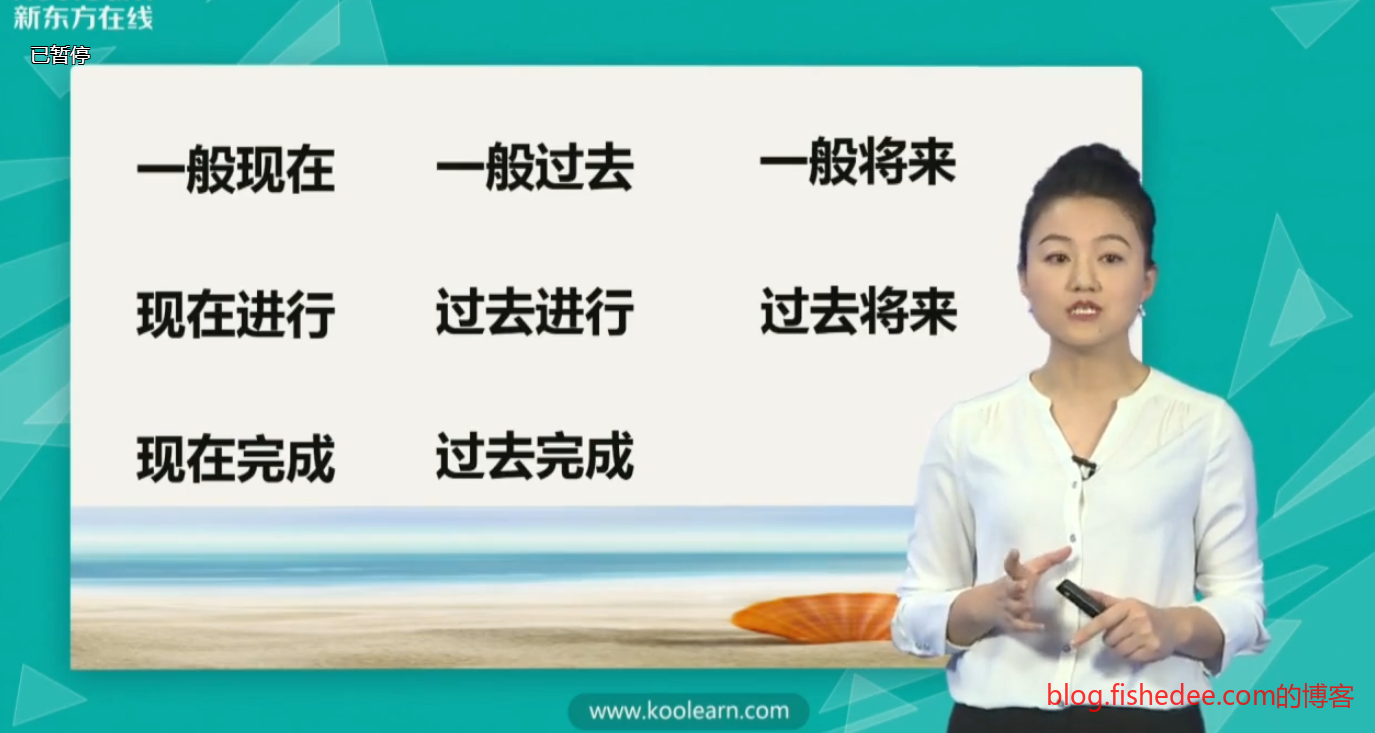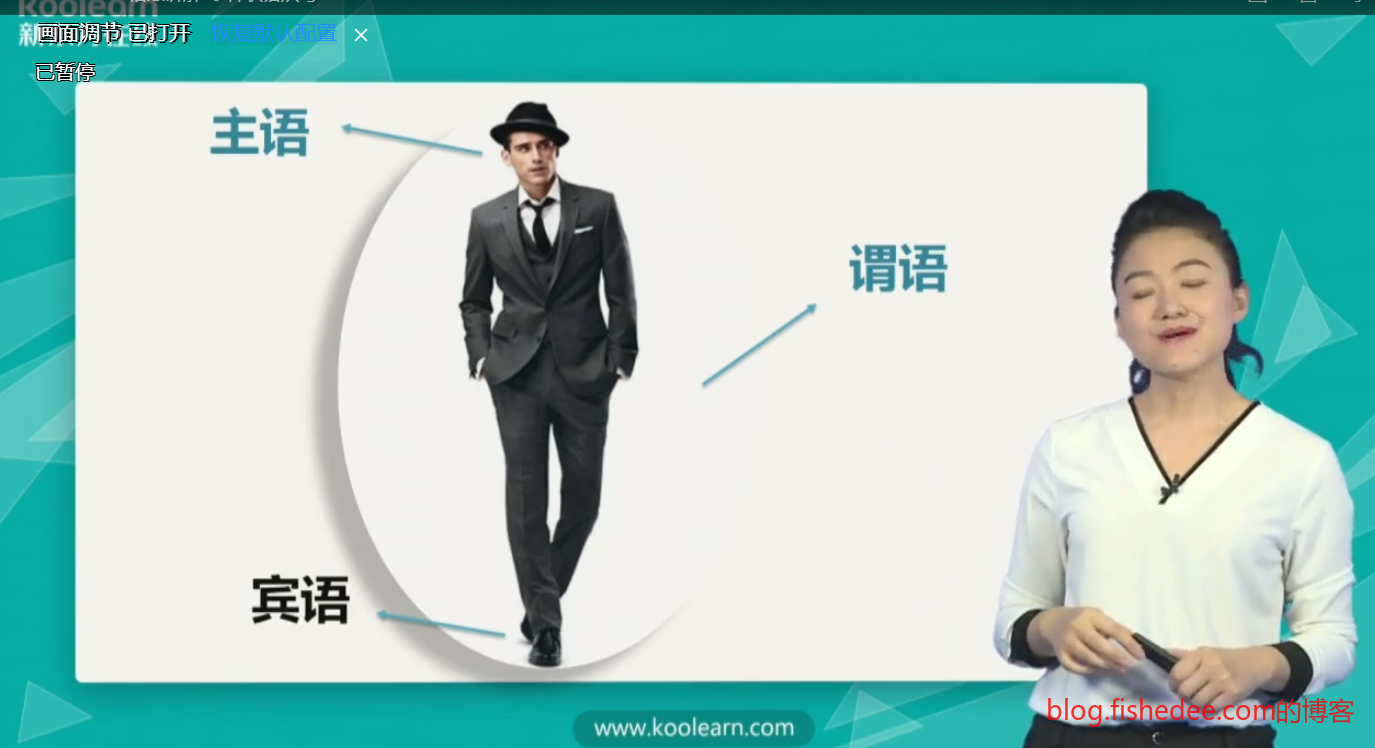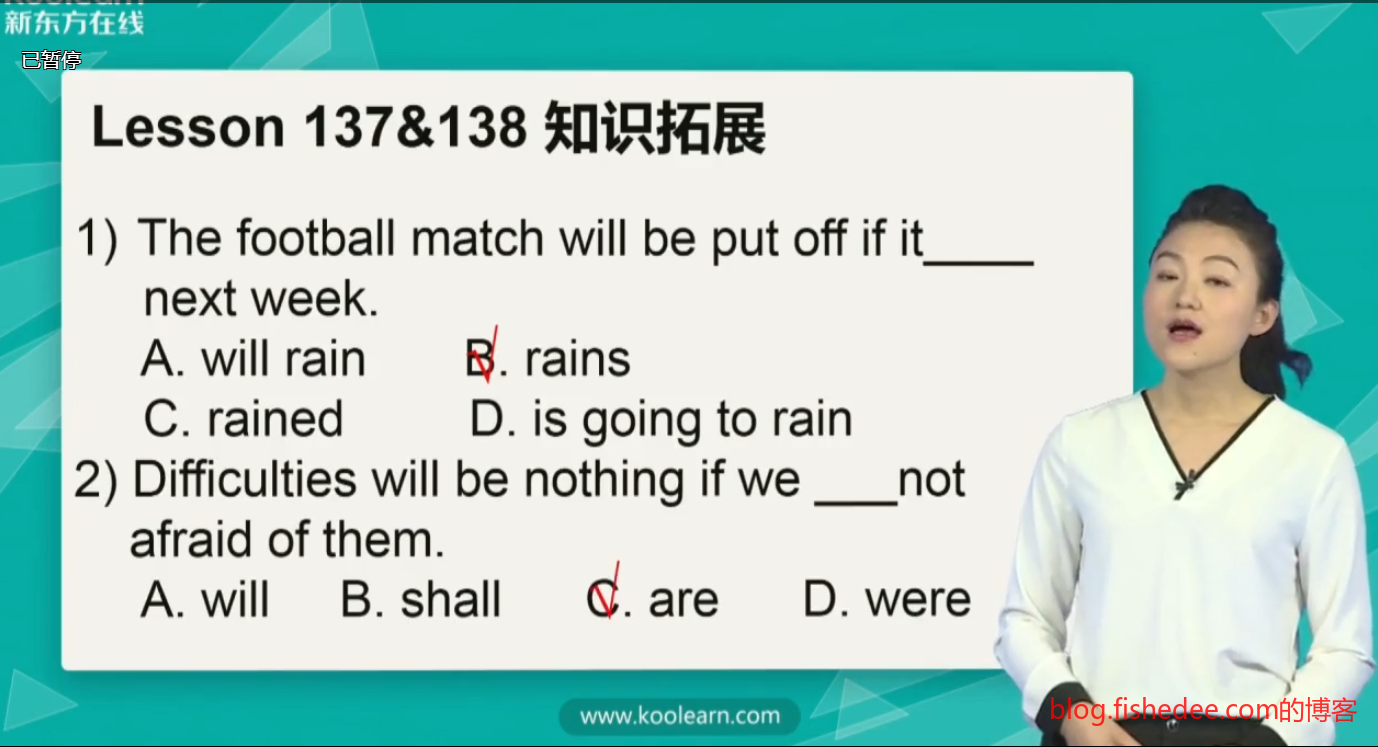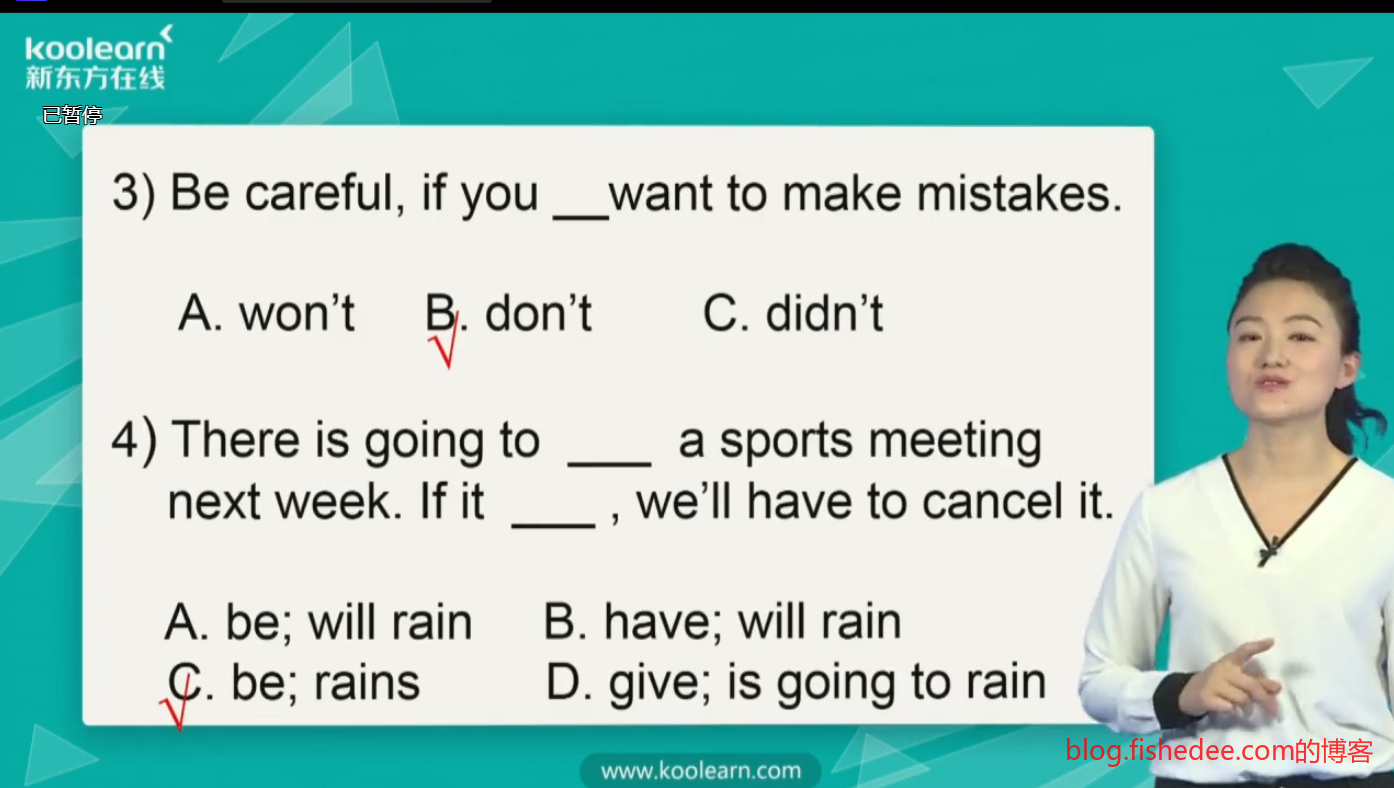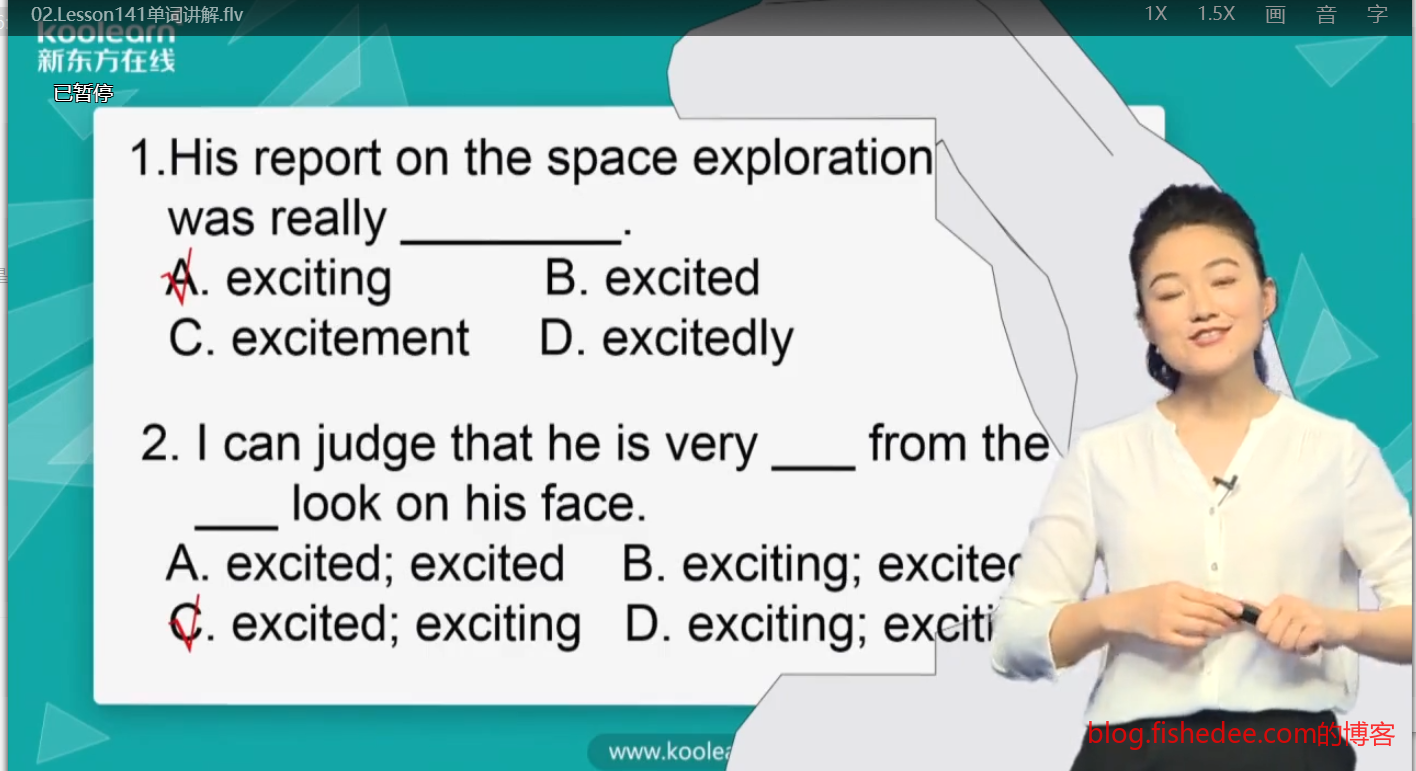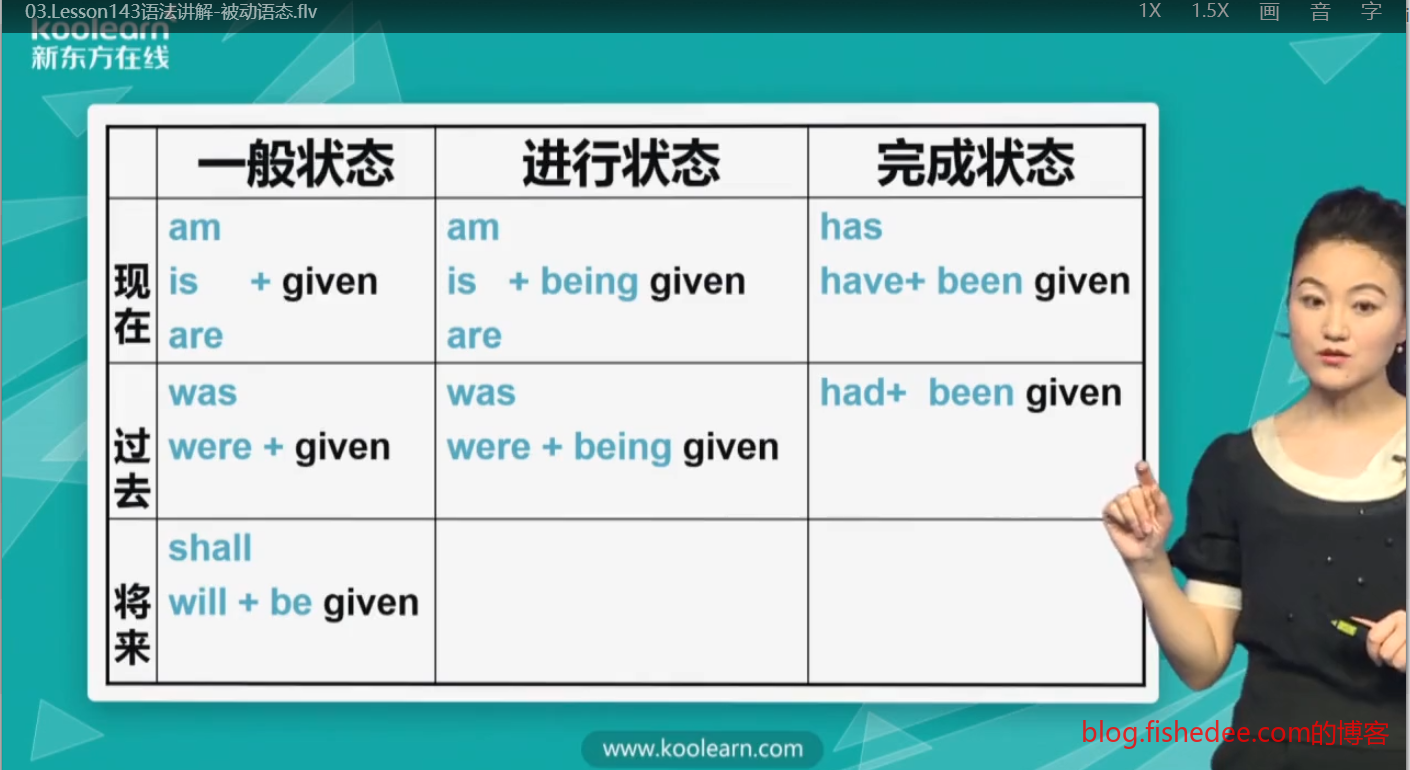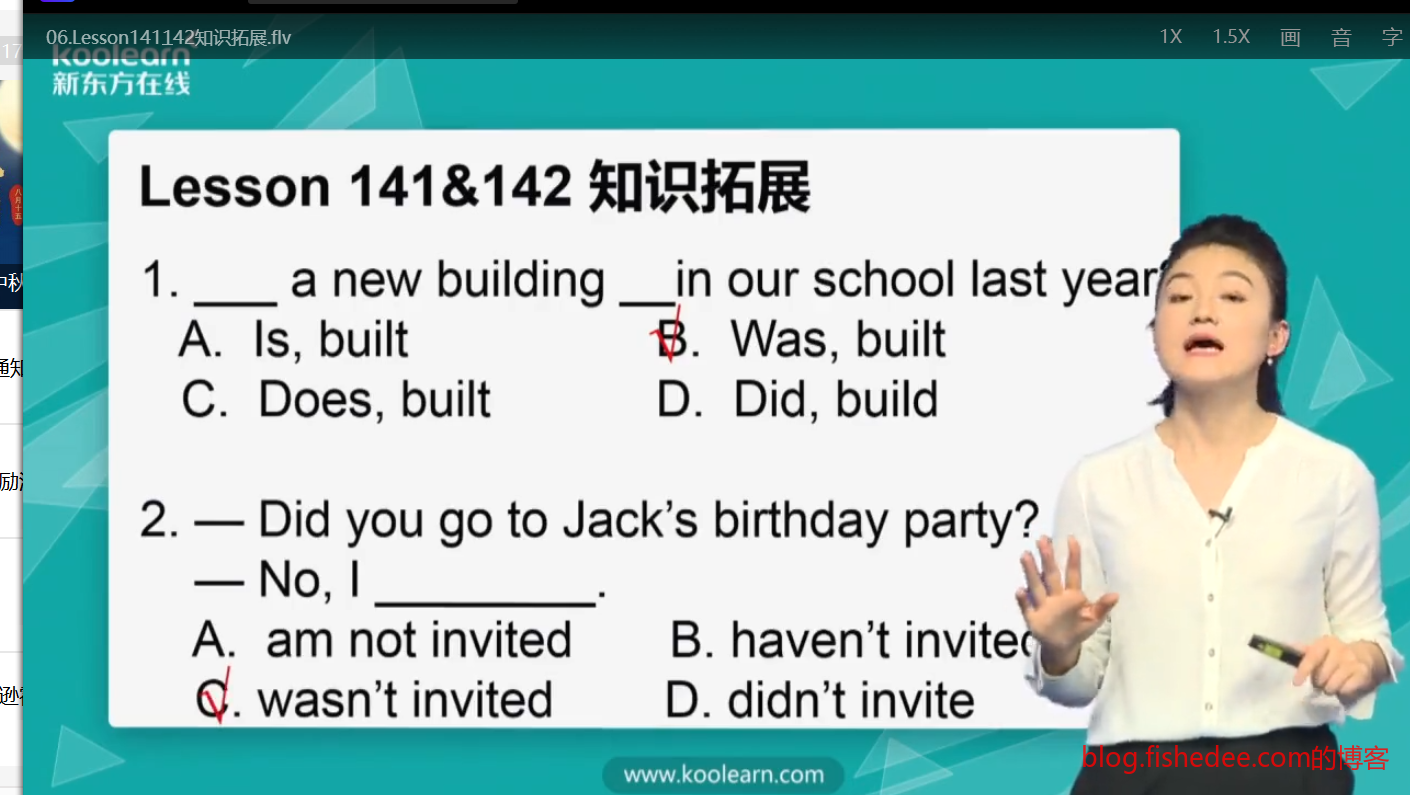0 概述
新概念一的内容还是比较基础的,教材内容主要参考新东方的内容,霍娜
内容主要包含以下几个部分:
- 发音讲解
- 单词讲解
- 语法与句型讲解
- 课外拓展
1 Lesson 1 & 2
1.1 发音
this[ðɪs],这。th注意要咬舌头发音。th有两种发音:
- 咬舌头+c音,thank[θæŋk]
- 咬舌头+z音,this[ðɪs]
very[ˈveri],非常地。v需要上牙齿贴紧下嘴唇,然后下嘴唇猛地往下而发音
excuse[ɪkˈskju:s; ɪkˈskju:z],原谅。这个单词没有g的音标,但是发出了类似g的声音,这是因为元音后面+k音标,导致了浊化发音的现象。
skirt[skɜːt],裙子。也是有浊化发音的现象,因为也是有一个k的音标。
book[bʊk],书。这个元音的oo发音是闭嘴的,不是开嘴的。舌头顶着上牙齿,从喉咙发出类似的e音。类似的,还有good的发音,准确的读音不是开口的。还有look[lʊk]的发音。
1.2 单词
skirt和dress的区别在于:
- dress[dres]是上下身都有的连衣裙,记忆点,两个s
- skirt[skɜːt]是只有下身的短裙
笔的区别:
- pen[pen],钢笔
- pencil[ˈpens(ə)l],铅笔
- felt[felt] pen[pen],水彩笔
屋的区别
- house[haʊs],大房子,就是别墅
- flat[flæt],英,公寓楼,一厅两房这种
- apartment[əˈpɑːtmənt],美,公寓楼,一厅两房这种
汽车的区别:
- bus[bʌs],公共汽车
- coach[kəʊtʃ],长途客车
this与that的区别:
- this,指代较近的东西
- that,指代较远的东西
1.3 句型
Excuse me!,用法:
- 对不起,打扰了
- 借过一下,让一让
- 失陪了
- 麻烦再说一遍
Pardon,固定用法,特指再说一遍,类似功能的句子有:
- Sorry?
- Excuse me?
- Say it again?
Yes,普通用法,声调往下,代表“是”的意思。Yes?,特殊用法,声调往上,代表“什么事?”的意思
It的用法广泛,包括有:
- 指代物体,It is good
- 指代时间,It is two
- 指代天气,It is sunny today
- 口语中指代人物,像one指代物品一样,That must be Kate.It can’t be.
1.4 语法
1.4.1 主格和宾格
代名词的语法的格,主格和宾格
- 我,I(主格),me(宾格)
- 你,you(主格),you(宾格)
- 她,she(主格),her(宾格)
- 他,he(主格),him(宾格)
- 它,it(主格),it(宾格)
主格和宾格的意义在于,在句子中发挥不同的功能。例如,一个基础句子结构是,主语+谓语+宾语,因此:
- I love you
- I love him
- I love her
- He love you
- He love me
- He love her
1.4.2 一般疑问句
常见的be动词有,is,am和are
中文的一般疑问句,通过声调和末尾加一个吗来表达:
- 陈述句,这是你的手提包
- 一般疑问句,这是你的手提包吗?
英语的一般疑问句,就是将陈述句的be动态提前到句首就可以了:
- This is your handbag.
- Is this your handbag?
- Are you a teacher?
- Is this your car?
- Is he Chinese?
1.5 扩展
1.5.1 自然拼读A-F
在英语母语的学习体系中,是没有音标这样的学习方法,他们只有字母,然后直接发音。在英语非母语的学习体系中,才有音标的学习方法。音标是为了方便国人学习英语发音的一种方法而已。
但是,音标的缺点在于,音标的表达和字母的表达是两个体系,看单词却不会发音是常事,因为我们常常习惯于看音标而发音。另外,学音标体系的人,能念出发音,但不会拼写出单词。
因此,我们也要借鉴一下英语母语的学习体系中,将字母和音标统一起来的方法,称为自然拼读法。我们力求只从单词拼写中推导出单词的发音,而不是从单词音标中推导出单词的发音。这样能发音,同时避免忘记拼写的问题。但是,自然拼读法并不是万能,大概只能总结80%左右的单词发音。
元音只有五个,a,e,i,o,u,元音一般变化较多。辅音的变化很少,一般只有一种发音。
- A[æ],hand,发音的特点是,嘴巴大,舌稍微吐出来,发音靠前
- B[b],bag,只有一种发音
- C[k]和[s],两个发音。分为,c+ e,i,y时,读[s],较少出来,city[ˈsɪti],cell[sel],cyber[ˈsaɪbə(r)]。c + 其他字母时,读[k],常见,cat[kæt]
- D[d],dig,只有一种发音
- E[e],egg,发音的特点是,嘴巴小,舌收起来,发音靠后
- F[f],fat,只有一种发音
2 Lesson 3 & 4
2.1 发音
here[hɪə(r)],这里。末尾有e音,在英式英语中有儿化音。儿化音,就是末尾卷舌发音的意思。而在美式发音中,没有儿化音。儿发音,就像中文发“儿”字的声音,我们会把舌头卷起来,喉咙会动起来的。没有儿化音的发音,就像末尾有一个“呀”音。
my[maɪ],我的。这是一个双元音,发音比较夸张,可以摸一下耳朵两边,发音的时候耳朵两边的骨头会动才是对的。类似的,还有fine[faɪn],bye[baɪ]
ticket[ˈtɪkɪt],票。ck组合的时候,只有k会发音,c不发音。
suit[sju:t; su:t],正装,[sju:t]和[sut],音标不同,但是发音都是相同的。
school[skuːl],学校,发l音的时候,上舌头顶上,闭嘴发音。
daughter[ˈdɔːtə(r)],是一个英式和美式发音差异较大的单词。英式和美式发音的区别在于:
- 美音,儿化音较多(末尾卷舌音多),发音靠前
- 英音,儿化音较少(末尾卷舌音少),发音靠后
- 无论学美音和英音,关系不大,互相之间都能听懂并交流。而国内的方言则差距过大,需要用普通话来做统一转换。
2.2 单词
伞的区别:
ticket的关联
- a train ticket,一张火车票
- a movie ticket,一张电影票
- a clocakroom ticket,一张衣帽存放号码牌
please[pliːz],词性是int,意思是指为感叹词。英文的please和中文的请有很多的区别。
- 中文的请,包括有邀请的意思,例如,可以请你吃一顿饭吗?
- 英文的please,只包含有表示礼貌,客气的意思,没有邀请的意思。英文中的邀请,用的是invite这个词。
cloakroom[ˈkləʊkruːm; ˈkləʊkrʊm],衣帽存放处,既可以指示公共存放处的衣帽存放处,也可以指示私家的衣帽间。
学校的区别:
- [primary] school,小学,表示初级的意思
- middle school,和secondary scool,初中。在美国更多使用secondary school。在英国初中和高中都统称middle school
- high school,高中
- university,大学
teacher[ˈtiːtʃə(r)],老师,这个就没啥好说的了。但是注意与中文尊称老师的不同,我们会称王老师,李老师。但是在英语中,老师是Mr Wang/Miss Wang,而不是Teacher Wang。
2.3 句型
名词 + please,都有请求拿出xx时,有以下用法:
- 点餐时,a roast duck,please。Two iceams,please。
- 购物时,This shirt,please
- 检票时,Your Id Card, please。Tickets, please. Your passports please。
- 索取寄存物时,My coat and my umbrella, please。
Here is my ticket,等价于My ticket is here。Here常常放在前面,表示强调。Here is与This is句型的区别在于:
- Here is是主动展示东西给对方
- This is是介绍对方不认识的东西看
Here’s your umbrella and your coat。这个句子的特别在于,后续有两个名词,显然为复数,但是只用了单数is,这是因为:
- Your umbrella and your coat are here。在正常陈述语句,应该使用are。
- Here’s your umbrella and your coat。其实是一种特殊的倒装句用法,这种用法的Here 用is还是are,仅仅取决于离here最近名词的性质。例如,Here are your books。
2.4 语法
2.4.1 否定句
否定句的结构很简单,就是be动词(is/am/are)加上not,例如:
- This is not my cat,缩写形式为This isn’t my car,发音的时候省略了后面的t。t的发音也特别,如果t后面只有辅音的话会省略t音。
- I am not a teacher,缩写形式为I’m not a teacher
- They are not my books,缩写形式为They’re not my books.
2.5 扩展
2.5.1 自然频度G-L
- G[g],gas,get,只有一种发音
- H[h],hat,him,只有一种发音
- I[i],city,big,常见的一种发音,有很多种
- J[dʒ],jet,jelly,只有一种发音
- K[k],kill,kiss,只有一种发音
- L[l],有两种发音,L跟随元音的时候,发出”le”的声音,例如,lot,let。当L后面没有元音,或者只有辅音的时候,发出”e”的声音,例如,girl,small
2.5.2 大写字母的场景
大写字母的场景
- 单词I,表达我
- 句首,Hi, This is my friend
- 姓&名首字母,Sam
- 国家,国籍、城市首字母,China
- 尊称的首字母,Mr. LeeLee. Lee
3 Lesson 5 & 6
3.1 发音
Mr.[ˈmɪstə(r)],先生。英式发音没有儿发音,美式发音有儿发音
morning[ˈmɔːnɪŋ],早晨。or组合发音[ɔ:]
new[njuː],新的。发音的时候,嘴唇嘟出来
student[ˈstjuːd(ə)nt],学生。s搭配k发音的时候,会有浊化发音,浊化为d音。
浊化音,我们有以下规律。通常为s ,加上一个清辅音(纯气流,无嗓子音,例如是[p],[t],[k])的时候,就会读作浊辅音。注意,浊辅音不改变音标写法,仅仅是读的时候变换一下。例如:
- sport[spɔːt],[p]会被浊化为[b]
- star[stɑː(r)], [t]会被浊化为[d]
- skirt[skɜːt],[k]会被浊化为[g]
浊化音的出发点在于,s是吐气音,清辅音也是吐气音,两个吐气音连读的时候会较为难受,所以为了简化发音,降低发音难度,变换为浊辅音而已。
另外一种浊化现象为ty[ti],读为[d],例如thirsty[ˈθɜːsti]
meet[miːt],遇见。我们称为笑音,读音像微笑一样。类似还有see[siː]。
too[tuː],也。嘴巴两端的肌肉绷紧。注意发音,末尾是类似于you[juː; jʊ]的末尾
nice[naɪs],末尾的e不发音。这是一个常见的规律,一个元音+多个辅音+一个e末尾的时候,发音的规律是这样的。元音读原本音,例如:
- i-e组合,bike[baɪk],kite[kaɪt],fine[faɪn],里面的i都是发音为[ai]
- a-e组合,take[teɪk],name[neɪm],bate[],table[ˈteɪb(ə)l],里面的a都是发音为[ei]
- o-e组合,nose[nəʊz],hope[həʊp],里面的o都是发音为[əu]
- u-e组合,cute[kjuːt],tube[tjuːb],里面的u都是发音为[u:]
- e-e组合,里面的e都是发音为[i:]
该发音规则的例外为love,o发音为[ʌ],而不是[əu]
3.2 单词
我们使用称谓的时候有几种用法:
- Mr.[ˈmɪstə(r)],先生
- Miss[],未婚女性,小姐
- Mrs.[ˈmɪsɪz],已婚女性
- Uncle[ˈʌŋk(ə)l] Li,李叔叔
- Sister[ˈsɪstə(r)] Furong,芙蓉姐姐
good与well的区别在于:
- well,通常指身体好
- good,普通意义上的好,使用范围很多
too与either的区别在于:
- too,用于肯定句和疑问句末
- either,用于否定句
国家和国籍的单词常见有:
- France[frɑːns],名词,国家。唯一的词性。French[frentʃ],法国人,名词,法语,名词,法国的,形容词。
- Germany[ˈdʒɜːməni],German[ˈdʒɜːmən]。注意这个特别的,国家有一个y,国籍反而没有y
- Japan[dʒəˈpæn],Japanese[ˌdʒæpəˈniːz]。
- Koera[],Koeran[]。
- China[ˈtʃaɪnə],Chinese[ˌtʃaɪˈniːz]。注意,这里的China是经典的末尾没有儿发音的。
- Sweden[ˈswiːdn],Swedish[ˈswiːdɪʃ]。
- England[ˈɪŋɡlənd],English[ˈɪŋɡlɪʃ]。准确来说,England仅仅是指英格兰,不能说是英国。英国包括有英格兰,苏格兰,威尔士,北爱尔兰
- America[əˈmerɪkə],American[əˈmerɪkən]。美国的全称为the United States of America
- Italy[ˈɪtəli],Italian[ɪˈtæliən]。注意这两个单词的重读位置不同。
例句有:
- I am in France
- I can speak French
英式英语和美式英语的说法:
- American[əˈmerɪkən] English
- Britain[ˈbrɪt(ə)n] English
3.3 句型
介绍与递给的区别
- This is ____,介绍不认识的人或物,注意这个句子能触发连读规则。Thi发音一个,s is组合发音一个。因为is单词是元音i开头的,上一个单词是辅音s结尾的。所以上一个单词辅音s,与下一个单词的元音i就可以连读在一起了。
- Here is _____,递给XXX
因此,我们应该用Here is my resume[rɪˈzjuːm],而不是This is my resume[rɪˈzjuːm]。
She/He is ____,可以用来表达姓名,国籍,职业等基本情况。
Nice to meet you的类似的句子有:
- Great to meet you
- Great to see you
- It’s nice to meet you
- It’s great to see you
打招呼和道别的句子有:
- Good morning,早上好,d可以不发音
- Good afternoon,中午好,d必须发音,因为afternoon是元音开头的
- Good evening,晚上好,d可以不发音。
注意,Good night是道别用的,不是打招呼用的。
询问品牌的句型有:
- What make[meɪk] is your car? My car is Toyota
- What brand[brænd] is your car? My car is Toyota
3.4 语法
3.4.1 冠词
冠词是戴在名词头上的帽子,没有特殊情况不能摘帽子,例如a nice car/a big house/a good name。
- 定冠词,the ___,确定的,知道的东西
- 不定冠词,a/an ___,不确定的,不知道的
the在发音上,有以下规律:
- [ðə],the后面接辅音发音开头的单词,the cup,the book
- [ði],the后面接元音发音开头的单词,the empty cup,the egg.
例如:
- This is a monk[mʌŋk]
- The monk[mʌŋk] is Jack
an用在元音发音开头的单词,其余的用a,例如:
- an egg/orage
- an hour,虽然是辅音字母开头,但是是元音发音开头的,h不发音。
- 用a的情况比较多,可以读[ə],或者[e]
特殊情况下可以摘帽子:
- 国家简写,China。国家全称时不能简写,The People’s Republic of China
- 国籍,Chinese
- 人名,Mike
- 城市名,Beijing
例句为:
- I am from China
- I am Chinese
3.5 扩展
3.5.1 自然拼读M-O
- M[m],这个字母有两个发音,分别在词首和词尾的不同,特点是不需要卷舌,喉咙发音。第一种是“么”,张口型发音,man[mæn],milk[mɪlk],monkey[ˈmʌŋki]。第二种是“嗯(人音)”,闭口型发音,Tim[tɪm]。
- N[n],这个字母有两个发音,分别在词首和词尾的不同,特点是需要卷舌,舌尖贴上齿,用鼻子发音。第一种是“了”,张口型发音,not[nɒt],no[nəʊ]。第二种是“嗯(牛音)”,闭口型发音,man[mæn],town[taʊn]。注意这个字母有L[l]的区别,L[l]也是相同的舌尖贴上齿的发音,但它是喉咙发音,不是鼻子发音。
- O[ɔ],这个字母是元音,有多种发音。ox[ɒks],orange[ˈɒrɪndʒ],olive[ˈɒlɪv]。
3.5.2 西方人名字
西方人名字和国人名字的区别在于:
- 顺序有异,先名后姓
- 男女有别,名字里面包含了性别的意思,几乎不会混用
- 注意发音,而不是注意意思。西方人起名字更着重发音是否好听,而不是它的意思。
- 跨辈同名,父子,母子,奶奶,都可以甚至喜爱用相同的名字。
4 Lesson 7 & 8
4.1 发音
I[aɪ],我,双元音
name[neɪm],名字,辅音+元音+辅音+不发音的e。my name/an English name/a Chinese name
what[wɒt],什么。特殊疑问词。wh组合的时候,要么是w发音,要么是h发音,没有两个一起发音的。
nationality[ˌnæʃəˈnæləti],国籍。在美式发音中,ty可以浊化为d音。同理,dirty[ˈdɜːti]也会浊化为d。tion固定词组,需要记住,例如:
keyboard[ˈkiːbɔːd],电脑键盘。key[kiː]是钥匙的意思,board[bɔːd]就是板的意思,例如blackborad[],whiteboard[ˈwaɪtbɔːd]。
operator[ˈɒpəreɪtə(r)],操作人员。tor可以浊化为d音。-or表示人的意思,例如director[dəˈrektə(r); daɪˈrektə(r)],导演,总监。
engineer[ˌendʒɪˈnɪə(r)],工程师。-er表示职业,例如teacher[ˈtiːtʃə(r)],老师。
4.2 单词
job[dʒɒb],工作(职业),用法:
- I have a good job,我有一份好工作
- Good job!,赞扬别人做得好
警察的各个说法:
出租车的两个说法,可以混用:
- taxi[ˈtæksi],出租车
- cab[kæb],的士
航空的各种说法:
- airhostess[eəhəʊstəs; eəhəʊˈstes],空姐
- air[eə(r)],空气
- airline[ˈeəlaɪn],航线,HaiNan airline,海南航空。
- [host],主人
- [hostess],女主人。
-ess:表示女性的后缀,例如:
- waiter[ˈweɪtə(r)],男服务员,waitress[ˈweɪtrəs],女服务员
- actor[ˈæktə(r)],演员(早期可以泛指男演员或者女演员),actress[ˈæktrəs],女演员
- tiger[ˈtaɪɡə(r)],老虎,[tigress]母老虎
postman[ˈpəʊstmən],邮递员,组合词
- post[pəʊst],邮政
- mailman[ˈmeɪlmæn],邮递员,和postman一致
milkman[ˈmɪlkmən],送牛奶的人。
总结,表示人的职业的后缀。
- -man,表示人的后缀,policeman,postman,milkman,mailman,superman
- -ess,表示女人的后缀,airhostess,hostess,waitress,actress
- -er,标志职业,waiter,engineer,teacher
- -or,表示职业,operator,actor,director
4.3 句型
询问名字
- What is your name?
回答名字
- My name is Robert.
询问国籍
- What nationality are you?
- What is your nationality?
回答国籍:
- 错误,My nationality is xxx,不符合惯用说法
- I’m Chinese English American.
反问的时候,用What nationality are you?,尾部声调升起来。例如:
- What nationality are you?
- I’m Chinese.What nationality are you?(升调)
- I’m English
询问工作:
- What’s your job?
回答工作:
- 错误,My job is xxx,不符合惯用说法
- I’m a teacher doctor student
- I have no job. I’m a student。student不算是职业,所以前面先说no job。
- I have no job. I’m a housewife.
4.4 语法
4.4.1 人称代词与be动词
人称代词,与be动词的搭配:
- 第一人称单数,I am = I’m
- 第二人称或者复数,You are = You’re,We are = We’re,They are = They’re
- 第三人称单数,He is = He’s,She is = She’s,It is = It’s
4.4.2 特殊疑问句What
什么?谁?谁的?哪儿?哪个?
- 中文,你的工作是什么?
- 直接翻译,错误的,Your job is what?
正确的做法是,特殊疑问句的疑问词是要提前到句首,然后be动词在疑问词后面。语序为,特殊疑问词 + be动词 + 名词。所以,正确说法是,What is your job?
- What is your name? My name is fish.
- What is your job? I am a teacher.
- What is your nationality? I am Chinese
- What is your car number? My car number is xxx.
- What is your E-mail? My E-mail is abc@qq.com
- What is your Wechat? My WeChat is Tophuona3
4.5 扩展
4.5.1 自然频度P-R
- P[p],清辅音,发音只有一种,气流音,没有嗓子音,比较简单。pig[pɪɡ],pen[pen],panda[ˈpændə],puppy[ˈpʌpi]
- Q[kw],辅音,这是一个双辅音。发音类似于“我[ə]”,先嘟嘴,嘴巴两边伸展时发音,不卷舌。合并声音时,先将w与后面的合并发音,然后将前面的k加起来。这个字母的特别在于,它总是和u在一起,不分离。例如,queen[kwiːn],question[ˈkwestʃən],quit[kwɪt]。
- R[r],辅音,先嘟嘴,卷舌发音(大概是“呜”音)后,才向两边伸展。例如,rose[rəʊz],rice[raɪs],rabbit[ˈræbɪt]。
5 Lesson 9 & 10
5.1 发音
thanks[θæŋks],感谢。th,咬舌头发音。关键在于[ŋ]音,这个音和[n]很像,只是舌头用力顶着下齿根部,而不是上齿发音,两者都是用鼻子发音。同理的,还有young[jʌŋ]
5.2 单词
打招呼:
表示感谢的用法:
- Thanks[θæŋks] a lot,对方较熟悉,粗略说法
- [Thank] you very much,对方不那么熟悉,详细说法
表示道别的用法,两个都一样:
- Good bye[]
- see[siː] you
肥胖的说法:
- fat[fæt],胖的。这个词有点直接。
- a little heavy[ˈhevi],一点重,这个词更加委婉一点,适合在口语中使用。
女人的说法:
- woman[ˈwʊmən],女人,包括已婚和未婚的,带有一点贬义的色彩
- lady[ˈleɪdi],女士,包括已婚和未婚的,带有尊重的意思。所以口语中常说an old lady,而很少说,an old woman。
瘦的说法:
- thin[θɪn],瘦。是指骨瘦如柴,营养不良的瘦,更多是贬义的意思。
- slim[slɪm],苗条的。是指身材恰当苗条,更多是褒义的意思。You are so slim。
高的说法:
- tall[tɔːl],高的。用在人,树,建筑物等。例如,He is very tall。tall buildings,a tall tree。反义词是short。
- high[haɪ],高的。用在高山上。a high mountain。反义词是low.
脏与干净:
- dirty[ˈdɜːti],脏的。美式有儿化音,而且ty浊化为d。英式没有儿化音,而且ty是普通的[ti]。
- clean[kliːn],干净的。意思简单。口语中常说,Nice and clean, now。现在干干净净的。
hot[hɒt],热的,引申的意思有:
- 天气很热,It is hot today。今天天气很热。
- 女孩性感,The girl is very hot。那女孩很性感。
- 流行。The book is hot now。那本书现在很火。
cold[kəʊld],冷的,注意发音中的[l]部分,发音的[l]需要卷舌,处于句中,不需要放下来发”了”音。引申的意思有:
- It is very cold today。今天天气很冷。
- I have a cold welcome。我受到了冷遇。
old[əʊld],老的,旧的。注意发音中的[l]部分,相当于cold[kəʊld]去掉了[k]的发音。
- It is an old story。这是一个古老的故事。
- That is my old book。那是我的旧书。
5.3 句型
见面问好的时候,用
- How[haʊ] are you? 今天怎么样
- How[haʊ] are you doing today? 今天怎么样,doing是无意义的,可以不添加的,相当于中文句子里面的,今儿做什么呢?里面的“儿”字,纯粹是无用修饰的。习惯用法而已。
见面问好的回应为:
- 表示好,Fine[faɪn],Great[ɡreɪt],Wonderful[ˈwʌndəf(ə)l],very well
- 表示还行,Not[nɒt] bad[bæd]。
- 表示不好,Very[ˈveri] bad,Terrible[ˈterəb(ə)l]
见面问好How are you的句型替换:
- How is your uncle?
- How is Lucy?
- How are your mother and your father?注意用复数,和Here’s不同,这个是正常规则的用法。
Look[lʊk] at sth,看。Look后面不能直接加东西,后面肯定加上介词at。另外,发音上,Look是辅音结尾,at是元音开头,所以构成了连读规则,读音为[lu] [kæt]。最后,oo发音为[u],类似于book[bʊk]里面的oo发音。
- Look at me…
Look at & see 的区别:
- Look at,看,强调动作,还没看到。Look at that man.He is very busy.
- see,看见,强调结果,已经看到了。I see him in the street.我在街上看见他。
that与this的区别:
- Look at that man
- Look at the man
that是指示代词,能单独使用,或者后面接名词。the是冠词,不能单独使用,必须接名词。例如:
- I like that,但不能说I like the。
5.4 语法
5.4.1 特殊疑问句How
特殊疑问词,how,意思是,如何,怎样。
口语句型:
- How are you?
- How to +动词?询问如何做什么事
How to open/use/do it?
5.5 扩展
5.5.1 自然拼读S-U
- S[s],只有一种发音。sad[],sit[sɪt],solid[ˈsɒlɪd],set[set]。
- T[t],只有一种发音。ten[],tap[tæp],tip[tɪp],top[tɒp]。
- U[ʌ],元音,不止一个发音。umbrella[ʌmˈbrelə],cup[kʌp],but[bʌt; bət]。
6 Lesson 11 & 12
6.1 发音
6.2 单词
blue[bluː],蓝色的,引申:
- 忧郁的,You are blue today
- 不健康的,It’s a blue movie。就是俗称的黄色电影。
- 贵族的,blue blood。就是中国古代称的皇家血统
perhaps[pəˈhæps],大概,句型有:
- 可能是这样吧,Perhaps it is,Perhaps so。
- 可能不是这样,Perhaps not
white[waɪt],白色,wh组合的特点是,要么发w音,要么发h音,不会两个都发音。引申有:
- the White House,白宫,有the,特指美国总统居住的地方。
- white lie,善意的慌言,white的引申为纯洁的。
父亲的说法:
- father[ˈfɑːðə(r)],父亲,较为严肃书面的说法
- Dad[dæd],[Daddy],父亲,口语的说法
母亲的说法:
- mother[ˈmʌðə(r)],母亲,较为严肃书面的说法
- Mom[mɒm],Mum[mʌm],Mummy[ˈmʌmi],母亲,口语的说法
blouse[blaʊz],女式衬衫。ou是固定组合,发[au]音,张口比较大的发音。与shirt的区别在于,shirt可以说是男式,也可以说是女式。但是blouse只能说是女式衬衫。
sister[ˈsɪstə(r)],姐姐或者妹妹,区分有:
- younger['jʌŋɡə] sister
- elder[ˈeldə(r)] sister
brother[ˈbrʌðə(r)],哥哥或者弟弟,区分有:
- younger['jʌŋɡə] brother
- elder[ˈeldə(r)] brother
6.3 句型
6.4 语法
6.4.1 特殊疑问词whose
whose[huːz]作为特殊疑问词,后面总是加名词,例如whose pen/whose shirt/whose car
特殊疑问词询问有两种公式:
- 特殊疑问词 + be动词 + 名词。例如,What is your job,What is your name,Whose is that shirt。
- 特殊疑问词 + 名词 + be动词 + …。。例如,What nationality are you,Whose shirt is that。
对于Whose疑问词来说,两种公式都是可以的,可以混合和互相转换使用,两者没有任何意思上的区别。例如:
- Whose is that shirt? Whose shirt is that?
- Whose is this car? Whose car is this?
- Whose is that bag? Whose bag is that?
对于What疑问词来说,大部分的句子都只能用公式1,少部分句子才能用公式2,只有一个句子允许互相转换。What + 名词(color,size , make,time,nationality) + be动词 + …。只有nationality可以互相转换,例如:
- What color is it?,不可转换为公式1
- What make is you car?,不可转换为公式1
- What time is it?,不可转换为公式1
- What nationality are you? 可以转换为公式1,变换为What is your nationality.
FIXME,What books have you read? 没有be动词,其中books提前
6.4.2 所有格’s与is的缩写
- My shirt’s blue。等价为My shirt is blue,’s表达“是”的意思。
- Is this shirt Tim’s。这句话不可缩写,’s表达“的”的意思。
- Tim’s shirt’s white。等价为Tim’s shirt is white,第一个’s是“的”的意思,第二个’s是“是”的意思。
6.4.3 所有格
物主代词,物主代词有形容词性和名词性两种:
形容词性的物主代词必须后面跟名词。
- 我的,my,形容词性
- 你的,your,形容词性
- 他的,his,形容词性
- 她的,her,形容词性
名词所有格,组合公式为,名词(有生命)+ ’s + 名词,例如:
- Lucy’s friend
- Sam’s book
- Mr. Wang’s bag
- Uncle Li’s watch
- the lady’s car
组合一起的例子有:
- 他的女朋友的新房子,his girlfriend’s new house
- 她的姐姐的同学,her sister’s classmate
6.4.4 所有格的一般疑问句
- Is this shirt Tim’s?
- Is this your shirt?
6.5 扩展
6.5.1 自然频度V-X
- V[v],只有一种发音。very[ˈveri],vivid[ˈvɪvɪd],voice[vɔɪs],five[faɪv],这个字母的关键在于,上牙齿咬住下嘴唇,然后张开嘴巴
- W[w],只有一种发音。wet[wet],witch[wɪtʃ],wave[weɪv],what[wɒt],先嘟嘴,嘴巴两边伸展时发音,不卷舌,在Q发音的时候的介绍过
- X[ks],只有一种发音。fox[fɒks],box[bɒks],exit[ˈeksɪt]。exit这个单词的发音特点是,元音e开头,所以它只能单独脱离后面的x,单独发音为[e]。然后xit发音为[ksit],组合起来发音就是[ˈeksɪt]
拼读规则,一辅一元,前辅后元。
6.5.2 看电影学英语
看电影学英语:
- 选片,动画片,单词简单,句型简单
- 字幕,最好是中英双语字幕
- 数量,一部电影来来回回地重复看,而不是看很多部。一个看《狮子王》162遍的故事,练听力和口语。《Little Miss Sunshine,阳光小美女》
- 方法,记笔记,记下重点的句型和结构。
7 Lesson 13 & 14
7.1 发音
upstairs[ˌʌpˈsteəz],楼上,air固定发音为[ɛə],用法有:
- Come upstairs,上楼来
- Go downstairs[ˌdaʊnˈsteəz],下楼去
smart[smɑːt],时髦的,漂亮的。有两个发音。[smɑːt]是英式发音,[smɑrt]是美式发音,音标中的r是儿化提示,不是发r音。
lovely[ˈlʌvli],可爱的,漂亮的。可爱的那种漂亮。
7.2 单词
color[ˈkʌlə(r)],颜色。这个单词特别之处在于美式和英式发音的写法不同,这种情况很少见。color[ˈkʌlə(r)],美式写法。colour[ˈkʌlə(r)],英式写法。
green[ɡriːn],绿色。引申:
- green tea,绿茶。
- a green hand,新手。因为绿色暗含新生命的意思,所以有新的意思。
帽子的区别有:
same[seɪm],相同的。same前面肯定有一个the,例如the same color/name/city。例如,They have the same name。
cuckold[ˈkʌkəʊld],外国没有绿帽子green hat的说法,对于带帽子我们用be cuckold的短语。
case[keɪs],箱子。suitcase[ˈsuːtkeɪs],手提箱。suit是衣服,case是箱子,两个组合起来就是可以刚好装衣服的箱子,就是suitcase了。
狗的说法:
- dog[dɒɡ],普通的狗
- puppy[ˈpʌpi],小狗,一般指粘人的,可爱的小狗。可简化为pup[pʌp]
a lucky dog,幸运儿。这个词说的是人,不是狗,而且这个短语没有贬义色彩,说的是幸运的人。
7.3 句型
询问颜色:
What color is you ____?
使用and连接两个动词:
- Come upstairs[ˌʌpˈsteəz] and see it.
- Come and meet my Mom.
- Come and sit down
- Come and do it
- Come and eat
- Come and drink
Here + 主语 + be,Here提前强调了“在这里”的意思,相当于中文中将“在这里”提前。
- Here you are. 相当于“给你”的意思。
- Here it is. = It is here。发音上it is,可以连读为[i] [tis],在美式发音中it is还可以浊化为[i] [ds]。指给别人,它在这儿呢
- Here I am = I am here。我在这里。别人喊了你的名字,你大声回应他,我在这里呢。
- He is here. = Here he is。他在这。
- Here we go. 咱开始吧
表示漂亮的词语有:
- beautiful,
- smart
- lovely
- nice
在强调漂亮的时候,我们可以多用相近的词来描述,例如She is beautiful,smart,lovely and nice。而不是用多个very,She is very very very beautiful,在英语中重复使用单词是忌讳的。
7.4 语法
7.4.1 特殊疑问词小总结,What,Whose,How
疑问词What:
- What + be + 名词,常见组合,What is your name? What is your job?
- What + 名词 + be + …,特殊组合,What color/size/time/make/nationality is …?
疑问词Whose
- Whose + be + 名词,标准用法,Whose is this shirt.
- Whose + 名词 + be + …,标准用法,和上一个公式可以随意互相转换。Whose shirt is this.
疑问词How
- How + be + 名词,标准用法,How are you ? How is Same ? How is the weather ?
- How + 名词 + be + …,不存在的用法,不要使用
7.5 扩展
7.5.1 自然拼读Y-Z
- Y,这是一个独特的字母,称为半元音。第一种发音为,[j],辅音音标,类似于Yeach的头部发音,一般情况下,这种音标在单词的首字母时发音。例如yes[jes],yoyo[],yellow[ˈjeləʊ],yet[jet]。第二种发音为,[i],元音音标,一般情况下,这种音标在单词的末尾字母时发音。例如happy[ˈhæpi],lovely[ˈlʌvli],cloudy[ˈklaʊdi]。
- Z,只有一种发音,[z]。发音就像触电一样,例如zip[zɪp],zero[ˈzɪərəʊ],zigzag[ˈzɪɡzæɡ],zebra[ˈzebrə]。
发音规则不同:
- [l],[m],[n],在词首和词尾发音不同
- [y],在词首和词尾发音不同,而且在词首是辅音,在词尾是元音。
- [w],与[r],注意发音相似,但不同
7.5.2 拼读规则
一辅一元,前辅后元。例如:
- ax[],元音a开头,辅音x结尾,由于是元音开头,不符合前辅后元的规则,所以要分离读,而不是拼读在一起。类似的还有egg[eɡ],elephant[ˈelɪfənt],ox[ɒks],exit[ˈeksɪt]。
- desk[desk],末尾的s和k都是辅音,不能拼读在一起,只能分离读。
- frog[frɒɡ],中间的ro满足连读规则,前辅后元。首字母f不符合连读规则,需要单独读出来。
- goat[ɡəʊt],oa为组合元音,所以g可以和oa连读在一起。
8 Lesson 15 & 16
8.1 发音
8.2 单词
custom区别:
officer[ˈɒfɪsə(r)],官员。可以组合为
- customs officer,海关官员
- chief[tʃiːf] executive[ɪɡˈzekjətɪv] officer[ˈɒfɪsə(r)],CEO
girl[ɡɜːl],女孩
- my girl,我的女朋友
- my boy,我的儿子,我的宝贝,而不是我的男朋友
国家
- Denmark[ˈdenmɑːk],丹麦。Danish[ˈdeɪnɪʃ],丹麦人,丹麦的
- Norway[ˈnɔːweɪ],挪威。[Norwegian],挪威人,挪威的
passport[ˈpɑːspɔːt],护照。美式[ˈpæspɔːrt]和英式[ˈpɑːspɔːt]音标不同。
visa[],签证。这是一个动词和名词。
brown[braʊn],棕色的,引申有:
- brown tea,红茶
- brown sugar,红糖
tourist[ˈtʊərɪst],旅游者。
- -rist是一个表示人的后缀,例如有dentist[ˈdentɪst],artist[ˈɑːtɪst],scientist[ˈsaɪəntɪst]。
- -er,teacher,worker,driver
- -or, doctor,director
cash[kæʃ],现金。
return ticket,回程机票。
the address in America,在美国的住址
What’s your purpose[ˈpɜːpəs] of visit,去干吗?
For sightseeing[ˈsaɪtsiːɪŋ] /study[ˈstʌdi],回答原因,去旅游/读书
国籍
- Russia[ˈrʌʃə],俄罗斯。Russian[ˈrʌʃn],俄罗斯人。
- Holland[ˈhɒlənd],荷兰。Netherland[],荷兰。Dutch[dʌtʃ],荷兰人。
grey[ɡreɪ],灰色的,还有一个相同拼读的,叫gray[ɡreɪ]。引申为花白的,例如grey[ɡreɪ] hair,花白的头发。
black[blæk],黑色的,引申有:
- black tea,红茶。
- black coffee,纯咖啡。
- black man,黑人,这是一个中性的说法,可以放心使用。但是使用Negro[]代表黑人的话,是带有贬义色彩的。
yellow[ˈjeləʊ],黄色的,引申有:
- yellow man,黄种人,这是带有贬义色彩,不要用这种说法。
- white man,白种人,这是中性的说法,可以放心使用。
8.3 句型
That’s fine。可以翻译为:
- 就这样吧!
- 行啦!
在文中,这句话用在了结束盘问的时候。
8.4 语法
8.4.1 名词的复数的规则变化
动词和形容词没有复数的说法,主要是针对名词和复数的说法。
- 单数,1个
- 复数,2个或以上,包括2个
单数变复数的规则:
- 一般的名词+s[s],a girl/girls,an officer/officers,a coat/coats,a boy/boys
- 以s、sh、x、ch结尾的+es[iz],a bus/buses,a box/boxes,a brush/brushes。因为结尾为s,x的本来就有[s]音,继续发[s]音的话就会很难发音,所以加es,而不是s。
- 以f、fe结尾的变f或fe为ves[vz],a wife/wives,a shelf/shelves,a knife/knives,a leaf/leaves。因为f是吐气音,s也是吐气音,连读两个吐气音比较难发音,所以改f为ves。
- 土豆,西红柿、黑人、英雄+ es[z],注意不是[iz],是[z]。a potato/potatoes,a tomato/tomatoes,a Negro/Negroes,a hero/heroes。这些都是有生命的,而且o结尾的单词。其他的没生命的,同时o结尾的单词,就普通形式加s就可以了。例如,a zoo/zoos,a radio/radios,a photo/photos
- 辅音字母 + y结尾的单词,变y为i,然后加es[z]。a baby/babies,a lady/ladies,a fly/flies。
8.4.2 通常为复数的名词
- jeans[dʒiːnz],牛仔裤,两条腿的,复数
- pants[pænts],裤子,英式说法。trousers[ˈtraʊzəz],裤子,美式说法。依然是复数。
- shorts[ʃɔːts],短裤
- shoes['ʃu:z],鞋子
- socks[sɒks],袜子
- gloves[ɡlʌvz],手套
- glasses[ˈɡlɑːsɪz],眼镜
注意,两个胳膊衣服不算是复数,但是两条腿的裤子才算复数,注意以上名词都需要匹配are这个be动词。
8.4.3 代词的复数
人称代词的复数
- I 搭配 am ,we 搭配 are
- You 搭配 are, you 搭配 are
- He 搭配 is,They 搭配 are
- She 搭配 is,They搭配 are
物主代词的复数
- my,our
- your,your
- his,their
- her,their
物主代词是复数,后面的名词 + 单数或者复数,与语境有关,例如:
- our books their cars
- our mum our school
- their teacher their house
指示代词的复数
- this(只能用于单数名词),these(只能用于复数名词)
- that(只能用于单数名词),those(只能用于复数名词)
例如:
- This is my book,复数为,These are our books
- That is her car,复数为,Those are their cars
8.5 扩展
8.5.1 自然拼读,双元音
[i:],俗称为笑音,发音的时候露出一个笑容
- ea,[i:],其中一种发音。冒号代表要长音。tea[tiː],clean[kliːn],eat[iːt],
- ee,[i:],只有一种发音。beef[biːf],feet[fiːt],sleep[sliːp],meet[miːt]。
[ə:]、[ə],可以有或者无儿化音。
- ir,[ə:],只有一种发音。sir[sɜː(r)],bird[bɜːd],firm[fɜːm],girl[ɡɜːl]。
- er,[ə]。dancer[ˈdɑːnsə(r)],cleaner[ˈkliːnə(r)],sister[ˈsɪstə(r)],summer[ˈsʌmə(r)]。
[ɑ:],可以有或者无儿化音。短音[ʌ],无儿化音。
- ar,[ɑ:],只有一种发音。hard[hɑːd],mark[mɑːk],farm[fɑːm],bar[bɑː(r)]。
9 Lesson 17 & 18
9.1 发音
9.2 单词
雇佣的几种说法:
- employee[ɪmˈplɔɪiː],雇员,名词。
- employer[ɪmˈplɔɪə(r)],雇主,名词。
- employ[ɪmˈplɔɪ],雇佣,动词。
-er, …的人。-ee,被…的人。例如:
- trainer[ˈtreɪnə(r)],培训者
- trainee[ˌtreɪˈniː],被培训的人
hard-working[ˌhɑːd ˈwɜːkɪŋ],形容词,勤奋的。构词,adj. + doing,例如:
sales[ˈseɪlz] rep[rep],名词,销售员。这是简写说法。全称为sales[ˈseɪlz] representative[ˌreprɪˈzentətɪv]。
assistant[əˈsɪstənt],助手,组合用法有:
- an office assistant
- a shop assistant
- a classroom assistant
9.3 句型
打招呼的说法有:
- Hello,Hi,Hey
- How are you?
- How are you doing?
- How do you do?,相当于中文里面,幸会,久仰。使用场合非常正式,所以很少使用。回答的时候也需要用,How do you do!
使用and连接两个动词:
- Come upstairs[ˌʌpˈsteəz] and see it.
- Come and meet our employees
- Come and meet our friend.
- Come and meet my Mom.
- Come and sit down
- Come and do it
- Come and eat
- Come and drink
- Come and have a drink.
9.4 语法
9.4.1 特殊疑问词Who
只能使用公式,特殊疑问词 + be动词 + 名词。
- 这人是谁?
- Who is this man?
- 这些人是谁?
- Who are these men?
9.4.2 名词的复数的不规则变化
- man/men ,woman/women
- foot/feet,tooth/teeth
- child/children
- 单复同形,sheep/sheep,fish/fish
9.4.3 不可数名词
不可数名词没有复数,只有单数。例如,hair
9.4.4 复数的句子搭配
复数的句子搭配,主要涉及三部分
- 名词的复数
- 动词的复数
- 代词,包括人称代词和指示代词的复数
例如:
This is my name
These are their names
That is her car
Those are our cars.
He is an assistant
They are assistants
Who is the young girl?
Who are the young girls?
What is your job?
What are their jobs?
He is a tourist
They are tourists
9.5 扩展
9.5.1 西方人的姓氏来源
西方人先有名字,后有姓氏。姓氏的出现是为了解决名字容易重复的问题。
西方人的姓氏来源:
- 职业:Taylor['teɪlə],裁缝,Baker[ˈbeɪkə(r)],面包师。
- 颜色:White[waɪt],白色,Brown[braʊn],棕色,Grey[ɡreɪ],灰色
- 生活:Bird[bɜːd],鸟,Rice[raɪs],大米
- 住址:Bridge[brɪdʒ],桥,Hill[hɪl],山
- 名字 + son:Peterson[],Johnson[ˈdʒɒnsn],Jackson[ˈdʒæksən]
9.5.2 自然拼读,字母组合
- aw,[ɔ:],只有一种发音,law[lɔː],raw[rɔː],paw[pɔː],saw[sɔː]。
- au,[ɔ:],只有一种发音,daughter[ˈdɔːtə(r)],saucer[ˈsɔːsə(r)]。
- ght,[t],只有一种发音,bought[bɔːt],fight[faɪt],brought[brɔːt],right[raɪt]。
- oo,[u],短音。嘴唇不动,舌头不动,发音。look[lʊk],book[bʊk],good[ɡʊd],wood[wʊd]。
- oo,[u:],长音。tooth[tuːθ],boot[buːt],shoot[ʃuːt],loot[luːt]。发音的时候,用舌头挡住气流,发出类似[you]的声音。
- ea,[e],ea可以发[i:]音,也可以发[e]音。没有具体规则说发哪个音。例如head[hed],bread[bred],weather[ˈweðə(r)],dead[ded]。
10 Lesson 19 &20
10.1 发音
boy[bɔɪ],男孩,oy有固定的发音[ɔi]。
10.2 单词
matter[ˈmætə(r)],事情,句型有:
- What’s the matter?matter是名词,前面要有冠词the,名词前都需要帽子。
孩子的说法:
- child[tʃaɪld]/children
- kid[kɪd]/kids
right[raɪt],好,可以。说法有:
- All right,可以,相当于OK。
ice[aɪs] cream[kriːm],冰激凌。这个单词是有复数形式的,称为ice creams。
cream[kriːm],霜,糕的东西,例如:
- eye cream,眼霜
- face cream,面霜
- body cream,身体乳
man的单词有:
- ice cream man,卖冰激凌的人
- mailman,快递员
- milkman,送牛奶的人
- fisherman,渔夫
- snowman,雪人
大的说法有:
- 风大,雨大,雪大,heavy[ˈhevi]
- 声音大,loud[laʊd]
- 年级大,old[əʊld]
- 面积大,large[lɑːdʒ],例如衣服,房间
- 其他大,big[bɪɡ],例如背包大
小的说法有:
- 风小,雨小,雪小,light[laɪt]
- 声音小,quiet[ˈkwaɪət]
- 年纪小,young[jʌŋ]
- 面积小,small[smɔːl],例如衣服,房间
- 其他小,small[smɔːl],例如背包大
开着的,关着的,说法:
- 开着的,open[ˈəʊpən]
- 关着的,shut[ʃʌt],closed[kləʊzd],两个单词都可以混着使用
long[lɒŋ],长的,可以指时间长,或者东西长,例如:
a long time
a long table
grandfather[ˈɡrænfɑːðə(r)],祖父、外祖父。
grandmother[ˈɡrænmʌðə(r)],祖母,外祖母。
granddaughter[ˈɡrændɔːtə(r)],孙女,外孙女。
grandson[ˈɡrænsʌn],孙子,外孙子。
grand[ɡrænd]与[great]的意思很相似,就是很厉害,很棒的意思。例如,grand openning,盛大开业。
结婚后的亲属关系,in-law[],例如:
- mother in-law,婆婆,岳母,转述才会带上in-law,面对面向对方叫都会省略in-law,以表达亲密关系
- father in-law,公公,岳父
- sister in-law,大姨子,小姨子,大嫂,小姑
- brother in-law,姐夫,妹夫
前任,ex[eks],例如:
- ex-grilfriend[],前女友
- ex-boyfriend[],前男友
- ex-wife[ˌeks ˈwaɪf],前妻
- ex-husband[],前夫
后的,继的,step[step],例如:
- step mother,继母
- step father,继父
- step sister,继姐姐,继妹妹,同母异父的姐姐妹妹
- step brother,继哥哥,继弟弟,同母异父的哥哥妹妹
10.3 句型
坐下的说法:
- Sit[sɪt] down, please
- Have a seat[siːt]
adj. + and + adj. 翻译为又xx又xxx,例如:
- Tired and thirsty,又累又渴
- beautiful and kind,又美丽又善良
- tall and handsome,又高又帅
- young and rich,又年轻又富有
- tall, rich and handsome,高富帅
询问怎么了的句型:
- What’s the matter? 你怎么了?
- What’s up? 这句话的’s 与up连读在一起。这句话使用频次较多,甚至成为了打招呼的用语
- What’s wrong? 你怎么了。这句话的意思按着场景表达的,可以表达为询问别人怎么了,可以表达为质问别人什么情况。
- What’s wrong with you? 和What’s wrong? 一样。
All right与Ok的用法:
- 询问好点没有,Are you all right now? = Are you ok now?
- 表达认同同意。Let’s go and buy some ice creams。 All right = OK
10.4 语法
10.4.1 复数的句子搭配
- Achild is tired
- Thechildren are tired
以上用法都可以,注意the的范围,可以表示这,那,这些,那些,同时适用于单数和复数的场景。
10.5 扩展
10.5.1 自然拼读,字母组合
- a-e,[ei],例如,take[teɪk],name[neɪm],late[leɪt],face[feɪs],table[ˈteɪb(ə)l],plane[pleɪn],shave[ʃeɪv]
- ay,[ei],例如,day[deɪ],way[weɪ],pray[preɪ],say[seɪ]
- ey,[ei],例如,grey[ɡreɪ],they[ðeɪ],hey[heɪ],ley[],例如情况,key[kiː],monkey[ˈmʌŋki]
- i-e,[ai],例如,bike[baɪk],nice[naɪs],kite[kaɪt],fine[faɪn],例外,white[waɪt],smile[smaɪl],slide[slaɪd],crime[kraɪm]。
- ie,[ai],例如,tie[taɪ],lie[laɪ],pie[],die[]。
- o-e,[əu],例如,note[nəʊt],hope[həʊp],wrote[rəʊt],phone[fəʊn]
- oa,[əu],例如,boat[bəʊt],goat[ɡəʊt],coat[kəʊt],float[fləʊt]
- ow,[əu],例如,yellow[ˈjeləʊ],follow[ˈfɒləʊ],slow[sləʊ],window[ˈwɪndəʊ],还有可能发音为[au]
字母ge,固定发音为[dʒ],例如page[peɪdʒ],fridge[frɪdʒ],stage[steɪdʒ],juge[]。
字母wh,要么发[w]音,要么发[h]音,不会两个都发音,例如,what[wɒt],why[waɪ],who[huː],whole[həʊl]。
字母ph,固定发音为[f],例如photo[ˈfəʊtəʊ],phrase[freɪz],graph[ɡrɑːf],physical[ˈfɪzɪk(ə)l]。
11 Lesson 21 & 22
11.1 发音
kn,组合只发[n]音,不发[k]音,例如knife[naɪf]。
11.2 单词
give[ɡɪv],给,用法:
- give + sb(宾格),例如give me/her/him/them/us…
- give me the book,翻译为把那本书给我,注意在翻译中,需要插入“把”字,同时将“那本书”提前。我们要注意的是,give后面直接加宾格
one[wʌn],一个。这个单词不仅是数词,还是代词,指代上下文中的名词,指代对象必须是单数形式的。例如:
- the blue one = the blue coat/dress …
- the short one = the short girl/pencil …
- I like the cheap one ,我喜欢便宜的那个
empty[ˈempti],空的,引申有:
- An empty street,寂静的街
- An empty house,空荡的房子
full[fʊl],满的,引申有:
- I’m full,我饱了。I’m hungry,我饿了。
- a full stop,句号。
- a full time job,一份全职工作。a part time job,一份兼职工作。
large[lɑːdʒ],大的,强调面积,例如:
- China is a large country。中国是一个幅员辽阔的国家。
- This room is large。这房间很大。
- The coat is large. 这个外衣很大件
little[ˈlɪt(ə)l],小的(程度上的小),或者是数量少,美式发音上,[tl]可以浊化为[d],引申有:
- a little heavy,一点重
- a little afraid of …,一点害怕
- a little girl,一个(可爱的)小女孩
- a small girl,一个体型很小的女孩,记忆上,将两个l看成真的很小。
small[smɔːl],小的(体积小),常用句型:
- Small world,世界真小,又见面了
sharp[ʃɑːp],锋利的。包括刀,和爪子,例如:
- The knife is sharp.
- Cats have sharp claws.
blunt[blʌnt],钝的,包括刀,和铅笔,例如:
- The knife is blunt.
- My pencil is blunt.
杯子的各种说法:
- 玻璃杯子,glass[ɡlɑːs]
- 茶杯,有抓手的,cup[kʌp]
- 瓶子,玻璃瓶,或者塑料瓶。bottle[ˈbɒt(ə)l]
家庭餐具有:
- knife[naɪf],刀子
- fork[fɔːk],叉子
- spoon[spuːn],勺子
- chopsticks[ˈtʃɒpstɪks],筷子
- bowl[bəʊl],碗
一般是右手刀(更有力),左手叉
11.3 句型
11.4 语法
11.4.1 简单句
- I(主语) meet(谓语) him(宾语)。主+谓+宾的结构
- You(主语) give(谓语) me(宾语) (a book)(宾语)。主+谓+宾+宾的结构,这是一个双宾语的结构。
简单句的五种结构:
- 主 + 谓,亚当 + 夏娃
- 主 + 谓 + 宾,亚当 + 夏娃 + 他们的孩子
- 主 + 谓 + 宾 + 宾,亚当 + 夏娃 + 他们的孩子 + 他们的另外一个孩子
- 主 + 谓 + 宾 + 宾补,亚当 + 夏娃 + 他们的孩子 + 他们的孩子的孩子
- 主 + 系 + 表,亚当重组了另外一个家庭
11.4.2 特殊疑问词,Which
[which],哪一个,哪一些。既可以用来询问单数的,也可以用来询问复数的,例如:
- Which book? 哪本书?
- Which books? 哪些书?
- Which tourist? 哪位游客?
- Which tourists? 哪些游客?
例句有:
- Which book is good? 哪本书好?
- Which tourists are from Beijing? 哪些游客来自于北京?
Which作为疑问词,同时符合两种形式,两种形式均等价:
- 特殊疑问词 + be动词 + 名词
- 特殊疑问词 + 名词 + be动词 + 所有格
例如:
- Which is your car? 哪一辆是你的车?
- Which car is yours? 哪一辆车是你的?
- Which is your book? 哪一本是你的书?
- Which book is yours? 那一本书是你的?
11.5 扩展
11.5.1 自然拼读,字母组合
- ow,[au],例如,cow[kaʊ],now[naʊ],how[haʊ],allow[əˈlaʊ]
- ou,[au],只有一种发音,例如,house[haʊs],blouse[blaʊz]
- oy,[ɔi],只有一种发音。例如,toy[tɔɪ],boy[bɔɪ],joy[dʒɔɪ],oyster[ˈɔɪstə(r)]
- oi,[ɔi],例如,oil[ɔɪl],coin[kɔɪn],moist[mɔɪst]
- ear,[iə]或者[ir],例如,dear[dɪə(r)],near[nɪə(r)],fear[fɪə(r)],hear[hɪə(r)],例如,early[ˈɜːli],earth[ɜːθ],earn[ɜːn]
- eer,[iə]或者[ir],例如,deer[dɪə(r)],beer[bɪə(r)],steer[stɪə(r)],jeer[]
12 Lesson 23 & 24
12.1 发音
cupboard[ˈkʌbəd],食厨,b经常在发音是忽略了
12.2 单词
shelf[ʃelf],架子、隔板,通常指挂在墙上的隔板,或者放在地面上的架子。复数为shelves。
table[ˈteɪb(ə)l],桌子,组合词有:
- a bed table,床头柜
- a tea table,茶桌
television[ˈtelɪvɪʒ(ə)n],电视机。tele,用来表达无线的意思,例如telephone[ˈtelɪfəʊn]
[floor],地板,常用句型有:
- It’s on the floor,它在地板上,可以引申为,(离合)已经踩到底了
12.3 句型
The ones on the shelf。one作为代词,也是有复数形式的,复数形式为ones。例如:
- I like the red coat.
- I like the red one.
- I like the red coats.
- I like the red ones.
架子上的那些,站在中文的角度上,“架子上的”是定语,用来修饰“那些”。定语在前,被修饰词在后。但是,在英文语境中,地方,位置的定语,通常用介词短语来表达,介词短语需要作为后置定语放在被修饰词的后面。例如:
- the book on the shelf。书桌上的那本书
- the cup on the table。桌子上的那个杯子
- the knife in the box。盒子里的那把刀
- the man in the room。房间里的那人
12.4 语法
12.4.1 介词
prep,就是介词词性。意义,媒婆,连接两个词或词与句子,例如:
- on,在…上面
- in,在…里面
句子中使用介词时,别忘了动词!
- The book is on the desk,动词是is,动词+介词
- I sit on the floor,动词是sit,动词 + 介词
- There is a shoe on the floor,动词是is,动词不跟介词
有动词时是一个句子,没有动词是一个短语,注意意思的不同:
- The glass is on the table,那个玻璃杯在桌上
- The glass on the table,桌上的那个玻璃杯
- The spoon is on the plate,那把勺子在盘子上
- The spoon on the plate,盘子上那把勺子
- The bottle is on the box,那个瓶子在盒子上
- The bottle on the box,盒子上的那个瓶子
12.5 扩展
12.5.1 自然拼读,字母组合
该三个音标都是等价的
- air,[eə],例如,air[eə(r)],fair[feə(r)],hair[heə(r)],pair[peə(r)]
- ear,[eə],例如,wear[weə(r)],rear[rɪə(r)],pear[peə(r)]
12.5.2 自然拼读小结
- 长元音,[i:],[ə:],[ɔ:],[u:],[ɑ:]
- 短元音,[i],[ə],[ɔ],[u],[æ],[e],[ʌ]
- 双元音,[ai],[ei],[ɔi],[iə],[ɛə],[əu],[uə],[au]
字母组合的发音:
- [i:],ee,ea
- [ə:],ir
- [ɑ:], ar
- [ə],er
- [ɔ:],aw,au
- [u],oo
- [u:],oo
- [e],ea
- [ei],a-e,ay,ey
- [ai],i-e,ie
- [əu],ow,oa
- [au],ow,ou
- [iə],ear,eer
- [ɔi],oy,oi
- [ɛə],air,ear
练习:
13 Lesson 25 & 26
13.1 发音
13.2 单词
refrigerator[rɪˈfrɪdʒəreɪtə(r)],电冰箱,缩写形式为,fridge[frɪdʒ],注意缩写多一个d。缩写形式流行程度更高。
right[raɪt],右边。left[left],左边。middle[ˈmɪd(ə)l],中间。这三个词最特别的地方在于,它们都是名词,不是介词,因此都需要一个定冠词the作为帽子。同时,在表达方位的时候,他们作为名词无法单独出现,需要以固定的其他介词配合才能表达方位。例如:
- on the right,词组,在右边。The desk is on the right。
- on the left,词组,在左边。The bed is on the left。
- in the middle of,词组,在…的中间。The table is in the middle of the room。
cooker[ˈkʊkə(r)],炉子,炊具。这是表达厨具的意思,燃气灶,电饭煲都可以。而且,这个词比较特别,虽然是er结尾,但是表达的不是人,而是物品。而厨师的单词则是没有er的,是cook[kʊk]。
electric[ɪˈlektrɪk],带电的,可通电的。词组有:
- an electric cooker,电磁炉,电饭煲
- an electric shaver,电剃须刀
of[ɒv; əv],属于。这个词的特点是,它是一个介词,prep。
房间区分有:
- living room,客厅,起居室
- dinning room,饭厅
- bedroom,卧室
- bathroom,洗手间
13.3 句型
13.3.1 总分结构
在英语表达思维上:
- 先总体概括,给出结论
- 然后逐步逐点描述
13.3.2 描述物体的套路
- 所在位置: There be 句型
- 颜色:It is + 颜色
- 具体位置:on the right/left , in the middle of
- 状态:It is clean/empty/big/small
两个例子,使用And避免了句型的重复
13.3.3 冠词的使用
冠词使用:
- 初次出现,不确定,用不定冠词,a/an
- 再次出现,确定了,用定冠词,the
例子
13.4 语法
13.4.1 There be 句型
构成: There be (is或者are,没有am) + 地点
用法:有,中文的“有”,有两个意思:
- 拥有,我拥有一个手袋,英文对应的是have,I have a handbag,This suitcase has a zip.
- 存在,树上有一只小鸟,英文对应的是there be,There is a bird on the tree。
注意,区别不是在于有生命,还是无生命。而是存在,还是拥有。
分类:
- There is … + 单数名词
- There are … + 复数名词
翻译,注意翻译的时候There be的名词应该放在后面,而不是前面:
- There is one in my heart
- 我心中有一个人。注意,不是,有一个人在我心中
就近原则,和Here be就近原则是类似的,例如:
- There is a table and four chairs.
- There are four chairs and a table.
- There are some students and a teacher.
- There is a teacher and some students.
- There is a pair of shoes on the floor。虽然shoes是复数,但是加了量词pair以后变为单数,所以用is。
13.4.2 Where句型
where 句型,只适用于:特殊疑问词 + be动词 + 名词,的句型。不适用于,特殊疑问词 + 名词 + be动词,的句型。
- Where are you
- Where is/are + 名词
13.5 扩展
13.5.1 介词in
用法有:
- 恋爱,in love。 He is in love。
- 三合一,three in one。
- 综合能力部,All in one。
- in + 语言,用….语言。Please speak in English。
- in + 颜色,穿着…颜色的衣服。The girl is in red。
- in cash,使用现金。pay in cash。
- in the rain,冒雨。They walk in the rain。
13.5.2 自然拼读,字母组合
- sh,[ʃ],例如,English[ˈɪŋɡlɪʃ],she[ʃiː; ʃi],brush[brʌʃ],shoe[ʃuː]
- su,[ʒ],类似“日”的音,例如,measure[ˈmeʒə(r)],leisure[ˈleʒə(r)]
- th,[θ],例如,three[θriː],thank[θæŋk],thin[θɪn],beneath[bɪˈniːθ]
- th,[ð],咬着舌头读“滴”音,例如,that[ðæt],these[ðiːz],they[ðeɪ],thus[ðʌs]
14 Lesson 27 & 28
14.1 发音
picture[ˈpɪktʃə(r)],图画,照片。注意ture有固定的发音,[tʃə]
14.2 单词
near[nɪə(r)],prep,介词,靠近,旁边。
- the television near the table,桌子旁边的电视。介词短语。
- The television is near the table,电视靠近桌子。句子。
14.3 句型
14.4 语法
14.4.1 介词四个,on,in,of,near
prep,就是介词词性。意义,媒婆,连接两个词或词与句子,例如:
- on,在…上面
- in,在…里面
- of,属于
- near,靠近,旁边
例句有:
- The money is in the bag。钱在包里。
- The money in the bag。包里的那些钱。
- The bank is near the school。那银行在学校附近。
- The bank near the school。学校附近的那银行。
14.5 扩展
14.5.1 有始有终
翻译为:
There is a beginning, a middle and an end.
14.5.2 自然拼读,字母组合
这一节的发音颇有难度,需要多练习
- ch,[tʃ],清音,只有一种发音,发音的时候嘴唇不用动,类似普通话的“去”,但是喉咙不需要动,例如,cheese[tʃiːz],French[frentʃ],China[ˈtʃaɪnə],lunch[lʌntʃ]
- tch,[tʃ],清音,只有一种发音,例如,match[mætʃ],batch[bætʃ],catch[kætʃ],bitch[bɪtʃ]
- -ge,[dʒ],浊音,注意在单词结尾或者中间比较多,例如,orange[ˈɒrɪndʒ],page[peɪdʒ],bridge[brɪdʒ],judge[dʒʌdʒ]
- tr,[tr],清音,发音的时候嘴唇要动,类似粤语的“灼”,但是喉咙不需要动,例如,tree[triː],trip[trɪp],travel[ˈtræv(ə)l],troy[trɔɪ]
- dr,[dr],浊音,和[tr]类似,只是需要卷舌,例如,drop[drɒp],drive[draɪv],dry[draɪ],dream[driːm]
- -ts,[ts],清音,发音上和[s]类似,一般在名词变复数形式后才会出现,例如,shirts[],skirt[skɜːt],boots[buːts],tickets[ˈtɪkɪts]
- -ds,[dz],浊音,发音上和[z]类似,一般在名词变复数形式后才会出现,例如,birds[bɝdz],lands[lændz],hands[hændz],goods[ɡʊdz]
音标的学习:
- 对着镜子,看口型,对比视频发音是否正确
- 不要直接背,而是有意识地遇到每个单词都,不看音标,尝试直接拼读,用使用来代替学习
15 Lesson 28 & 29
15.1 发音
15.2 单词
shut[ʃʌt],关着的,关。两种词性,形容词和动词,例句有:
- The door is shut,门是关着的
- Shut the door,关门
open[ˈəʊpən],开着的,打开。两种词性,形容词和动词,例句有:
- The window is open,窗户是开着的。
- Open the window,打开窗户
empty[ˈempti],空的,使空的。两种词性,形容词和动词,例句有:
- My mind is empty. 我的大脑一片空白
- Empty the bottle please. 请把瓶子倒空
air[eə(r)],空气,使空气流通,名词和动词。例句有:
- The air is fresh,空气清新。
- Open the window and air the kitchen。打开窗户,让厨房通下气。
color[ˈkʌlə(r)],颜色,上色,名词和动词。例句有:
- What is the color? 什么颜色的?
- Color the picture。给图片上色
milk[mɪlk],牛奶,挤奶,名词和动词。例句有:
- I like milk。我喜欢牛奶
- Milk it。给奶牛挤奶
book[bʊk],书本,预订,名词和动词。例句有:
- This is my book。这是我的书。
- Book a ticket。预定一张票。
water[ˈwɔːtə(r)],水,浇水,名词和动词。例句有:
- There is some water in the glass。杯子里有水。
- Water the flower。给花浇水。
dust[dʌst],灰尘,清扫灰尘,名词和动词。例句有:
- There is some dust。那有灰尘。
- Dust the table。把桌上的灰尘清扫掉
untidy[ʌnˈtaɪdi],不整齐的。形容词。un-前缀表示否定,不,例如:
- clean - unclean[ˌʌnˈkliːn]
- happy - unhappy[ʌnˈhæpi]
must[mʌst; məst],必须,情态动词,modal词性。情态动词也是动词的一种,它是表达情感和态度一种动词。例如:
- You must go out,带有要求情感
- Can you go out please? 带有请求情感
单复数通型的单词,注意依然是可数名词,可以有is和are,只是复数不再变化而已:
- clothes[kləʊðz],衣服
- people[ˈpiːp(ə)l],人
- hair[heə(r)],头发
- fish[fɪʃ],鱼儿
- sheep[ʃiːp],绵羊
衣柜的说法:
- wardrobe[ˈwɔːdrəʊb],大衣柜
- closet[ˈklɒzɪt],衣橱,衣帽间
read[riːd],读,看,主要是指有文字的东西。例如:
- read a book,看书。
- read a newspaper,看报纸。
- read a magazine,看杂志。
- 非文字型的,用look。look at him。Look at the dog.
sharpen[ˈʃɑːpən],使锋利。它的组合为,将adj. + en组合为动词,例如还有:
put[pʊt] on,穿上,戴上。take[teɪk] off,脱下,卸下。例句有:
- put on/take off clothes,衣服
- put on/take off glass,眼镜
- put on/take off tie,领带
- put on/take off jewel,珠宝
turn[tɜːn] on,打开。turn[tɜːn] off,关掉。打开和关掉主要是指带电的设备,例如:
- turn on/turn off the television
- turn on/turn off the radio
- turn on/turn off the light
- turn on/turn off the tap,这个特别一点,水龙头没有电,但是用turn on/turn off。
- 对于其他没带电的设备,打开或者关闭用open/close,例如,open/close the window,open/close the door。
15.3 句型
15.3.1 must相关特殊疑问句
- What must I say/read/clean/do … ?
- Where must I go/live/stay … ?
- Who must I meet/love/invite … ?
- Which must I like/take/find ?
15.3.2 打理房间的短语
- make the bed,整理床铺
- sweep the floor,清扫地板
- dust the table,清扫桌子
15.3.3 然后
First … Then/and … And Then …
15.4 语法
15.4.1 祈使句
祈使句:
- 表示命令,动词原型 + …,Shut the door。
- 表示请求,please + 动词原型 + …,Please give it to me。
- 表示建议,Let’s + 动词原型 + …,Let’s go,ok?
特点:
- 没有主语,因为都是直接向对方说的,没有主语。
- 动词打头的,Come in/Shut the door/Open the window/Air the room.
15.5 扩展
15.5.1 洗手间的说法
洗手间的说法:
- bathroom[ˈbɑːθruːm; ˈbɑːθrʊm],美式说法的洗手间
- restroom[ˈrestruːm; ˈrestrʊm],看样子是休息室,其实是指洗手间,特指那些公共洗手间
- washroom[ˈwɒʃruːm; ˈwɒʃrʊm],加拿大式说法的洗手间
- toilet[ˈtɔɪlət],英式说法的洗手间,也可以说是马桶
- loo[],口语说法的洗手间,刚开始是婉转地说第100个房间,后来引申为这个单词。
- lavatory[ˈlævətri],常用在飞机,高铁上的洗手间
- ladies’ room,女洗手间
- men’s room,男洗手间
冲厕所用flush toilet。toilet有马桶的说法
15.5.2 自然拼读,元音与辅音组合
- -all,[ɔ:l],例如,wall[wɔːl],ball[bɔːl],fall[fɔːl],small[smɔːl]
- -ary,[əri],例如,January[ˈdʒænjuəri],ordinary[ˈɔːdnri]
- -ew,[ju:],这个发音比较特别,难拼读一起,可以直接记忆为you的发音,例如,new[njuː],few[fjuː],knew[njuː],view[vjuː]
- -ight,[ait],例如,fight[faɪt],night[naɪt],light[laɪt],bright[braɪt]
- -ire,[aiə],例如,fire[ˈfaɪə(r)],tired[ˈtaɪəd],hire[ˈhaɪə(r)],wire[ˈwaɪə(r)]
- -ought,[ɔ:t],例如,bought[bɔːt],thought[θɔːt],brought[brɔːt],sought[sɔːt]
16 Lesson 31 & 32
16.1 发音
16.2 单词
garden[ˈɡɑːdn],花园,常用有:
- in the garden,在花园里
- a gardener,园艺师
under[ˈʌndə(r)],介词,在…的之下,常用有:
- under the sun,阳光下
- under the sear,海底
- under the tree,树下
- a family tree,家谱
run[rʌn],跑,常用有:
- run after,追赶。I run after the bus。我追赶公交车
- a runner,跑步运动员
after[ˈɑːftə(r)],介词,在…之后,常用有:
- after 3:00,3点之后
- After you! 您先请
across[əˈkrɒs],介词,穿过,常用有:
- go across the street
- walk across the street
- run across the street
16.3 句型
- She is sitting under the tree.
- 直接翻译为,她正在坐在树下,这样是不对的。
- 正确翻译为,她正坐在树下。
Pardon,固定用法,特指再说一遍,类似功能的句子有:
- Sorry?
- Excuse me?
- Say it again?
- I beg your pardon?,这是一个极为客气的说法,一般很少使用。
What about …?…怎么样?用法如下:
- 反问,I am a teacher. What about you? I am learning English. What about you?
- 提议,I want rice. What about you?
It’s running after a cat.
- 错误翻译为,它正在一只猫后面跑
- 正确翻译为,它正在追赶一只猫。run after可以看成一个固定的动词短语。
tooth[tuːθ],牙齿,复数形式为,teeth[tiːθ]。牙刷作为组合词,它的形式为toothbrush[ˈtuːθbrʌʃ],在组合词的时候很少使用复数形式,虽然它指的是刷多个牙齿,其复数形式为toothbrushes[]。
水龙头的多个说法:
- tap[tæp],水龙头,英式说法。注意用的是turn on/turn off,不是open/close。
- water[ˈwɔːtə(r)] faucet[ˈfɔːsɪt],水龙头,美式说法。
16.4 语法
16.4.1 时态,现在进行时
时态包含两层意思:
- 时间:过去,现在,将来。
- 状态:一般,进行,完成。
现在进行时,就是此时此刻正在做的动作。
16.4.2 现在分词
现在进行时的时候,动词需要更改为现在分词(doing)的形式:
- 一般+ing,例如,reading,eating,drinking,sleeping,playing,singing。
- 以不发音的e结尾,去e + ing,例如,taking,writing,typing
- 辅+元+辅(汉堡结构),双写辅音字母+ing,除opening,sharpening,listening,例如,swimming,running。
16.4.3 现在进行时的陈述句
主语 + is/am/are + doing陈述句的方式比较简单,就是be动词 + 现在分词。在这里,be动词不能称为be动词,而是称为助动词。因为句子结构中只有一个动词,这个动词是doing,is/am/are仅仅是在于辅助的作用而已,所以它不能称为be动词,而是作为“助动词”。
助动词的意义在于:
- 帮助现在分词的形式
- 自身没有语义
- 不能省略,必须存在,是语法结构的必须成分
最后,谓语是 is/am/are + doing,两者结合为谓语成分。例句有:
- He is reading
- He is eating
- He is playing
- They are singing
- He is running
- She is writing
16.4.4 现在进行时的一般疑问句
Is/am/are + 主语 + doing一般疑问句的方法很简单,将助动词提前就可以了。
- Is she eating?
- Is she swimming?
- Is she teaching?
- Are they walking?
16.4.5 现在进行时的特殊疑问句
特殊疑问词 + is/am/are + 主语 + doing特殊疑问句的方法也很简单,在一般疑问句的基础上,在前面添加一个特殊疑问词就可以了。例句有:
- What is she doing? She is teaching.
- Where is she teaching? She is teaching in the classroom
- What is she teaching? She is teaching math.
16.5 扩展
16.5.1 动词中心说
动词是灵魂
- 动词是句子的灵魂
- 所有的时态都通过改变动词来实现
- 动词短语
16.5.2 句子连读规则
规则1:辅音 + 元音的连读。发音较难集中在She wa sin na no ffice,还有isn’t的t是不发音的,所以发音为isn ni t
规则2:辅音 + 半元音
句子连读规则可以看成是
- 保留原来的单词划分方式
- 对于单词开头是元音字母的,就合并前一个单词末尾的辅音字母来发音。
17 Lesson 33 & 34
17.1 发音
17.2 单词
shine[ʃaɪn],照耀。一个常用的说法是:
- The sun is shinning,阳光灿烂。
sky[skaɪ],天空,组合说法,in the sky。sky只能搭配in来使用。
sun[sʌn],太阳,组合词有:
- sunhat[ˈsʌnhæt],太阳帽
- sunglasses[ˈsʌnɡlɑːsɪz],太阳镜
- sunblock[ˈsʌnblɒk],防晒霜
with[wɪð],和…在一起,介词:
- 人与人,He is with his new girlfriend。他和他的新女朋友在一起。
- 人与物,I am with my new sunglasses。我戴着我的新墨镜。
- 物与物,The house is with a garden。这栋房子带着一个花园。
family[ˈfæməli],家庭,这个词其实包含了中文的多个意思:
- 家庭,a family meeting,家庭会议
- 家人,We are a family,我们是一家人
- 家属,Are you the family of …? 你们是…的家属吗?
over[ˈəʊvə(r)],跨过,上方。这是一个介词,例句有:
- 跨过,He is walking over the bridge。他正走着跨过那座桥。
- 上方,The bird is flying over the river。那只鸟正飞在河上飞过
对应的穿过是across[əˈkrɒs],例句有:
- go/walk/run across the street。
over与on的区别在于,on是上面,贴着的。over是上方,不是贴着的,有离开的。
over有另外一个意思是,跨过,常用于bridge。
bridge[brɪdʒ],桥,用法有:
- overbridge[],footbridge[ˈfʊtbrɪdʒ],天桥
- over the bridge,过桥
- He is going/walking/running over the bridge,他正在跨过桥
船的说法有:
- boat[bəʊt],小船
- ship[ʃɪp],轮船
飞机的说法有:
- aeroplane[ˈeərəpleɪn],飞机
- plane[pleɪn],飞机,两者都可以用
shave[ʃeɪv],刮胡子,引申有:
- shaving,现在分词,去掉e
- shaver[ˈʃeɪvə(r)],刮胡刀
wash[wɒʃ],洗,有很多和水有关的词语都和w有关的,例如:
- water[ˈwɔːtə(r)],水
- wash[wɒʃ],洗
- wave[weɪv],波浪
- wine[waɪn],果酒
- well[wel],水井
- wet[wet],潮湿的
wait[weɪt],等待。动词与介词合并的动词短语有:
- wait for me,等等我
- look at me,看着我
- listen to me,听听我
这些动词短语都很重要,后面接宾语的话,必须要带上固定的介词。
17.3 句型
17.3.1 It做天气的主语
It做天气的主语,例如:
- It is a fine day today,或者It is fine today. 今天天气很好。
- It is bad in Spring. 春天天气很糟糕
- It is nice in Summer. 夏天天气很好
描述天气的句型结构:It is + adj. + 时间
17.3.2 with介词
with作为介词,与动词一起的时候可以组合为句子,没有动词的时候是一个短语。例如:
- the house with a swimming pool,带着游泳池的房子
- The house is with a swimming pool,这个房子带着游泳池。
- the girl with her friends. 和她的朋友在一起的那个女孩
- The girl is with her friends. 那个女孩和她的朋友在一起
17.3.3 日记体仿写
It is fine today.
There are some clouds in the sky.
But the sun is shinning
I am with my boyfriend
My boyfriend is driving
I am reading an interesting book
A bird is flying in the sky
Some people are walking over the bridge
They are very busy没啥好说的
17.4 语法
17.4.1 现在进行时的例句
现在进行时的例句:
- What are you doing? 你正在干什么?
- I am eating? 我正在吃饭。
- Where are you eating? 你正在哪吃饭?
- I am eating at home. 我正在家吃饭
- What are you eating? 你在吃什么?
- I am eating noodles. 我在吃面条
- Who are you eating with? 你在和谁一起吃?
- I am eating with my sister. 我和我妹妹一起吃。
17.5 扩展
17.5.1 英语学习技巧
学英语技巧
- 超过7岁的人,有了母语以后学习英语,都需要学习语法,没有语法规则是学不好语言的
- 多仿写,对着课文的句型,仿写其他的内容
17.5.2 句子省读规则
爆破音有:[t],[d],[k],[g],[p],[b],这些爆破音后面加上辅音开头的词时候,就会省读爆破音。
17.5.3 句子结构
句子结构:
- 主 + 谓
- 主 + 谓 + 宾
- 主 + 谓 + 宾 + 宾
- 主 + 谓 + 宾 + 宾补
- 主 + 系 + 表
几个结构中最为简单的结构是,主+系+表,例句有:
- She is beautiful,主系表
- I was my hands,主谓宾
- They are bush,主系表
- He is running,主谓,is running组合起来是谓语
- She is reading a book,主谓宾,is reading组合起来是谓语
区分系动词和谓语动词的关键在于:
- 系动词:is,am,are
- 谓语,总是包含实义动词,例如wash,run,walk。一个常见的误区是将助动词看成是系动词,例如,He is running,is是助动词,辅助实义动词run的。
动词的分类:
- 连系动词,She is beautiful
- 情态动词,You must do it.
- 实义动词,I wash my hands.
- 助动词,She is running
18 Lesson 35 & 36
18.1 发音
18.2 单词
village[ˈvɪlɪdʒ],村庄。搭配介词,in。in the village。
valley[ˈvæli],山谷。搭配介词,in。in a valley。这里有连读[in] [na] valley[ˈvæli]
between[bɪˈtwiːn],在(两者)…之间,介词。例句有:
- It is between two hills.它在两座小山之间
- The lady is between her daughter and her friend。那个女人在她女儿和她朋友之间
- Come between 9:00 and 10:00,在9:00至10:00来吧。
- Just between you and me。Don’t tell others。这句话的意思是,天知我知,你知我知。Don’t tell others,可以被省略。
山的说法:
- hill[hɪl],小山,或者山丘
- mountain[ˈmaʊntən],大山
another[əˈnʌðə(r)],另一个,这是一个限定词,例如:
- Here is another photo of my school.
along[əˈlɒŋ],沿着,介词。例如:
- We are driving along the main road. 我们沿着主路行驶。
bank[bæŋk],河岸。也可以表示银行。
- the bank of the river。河岸。这个短语和单独一个bank是一样的意思,但在实际生活中,短语形式出现更多一点。
- Bank of China。中国银行
park[pɑːk],公园。搭配介词,in。in the park。还有意思是,动词,停车,例句有:
- I’m parking my car,我正在停车
into[ˈɪntuː],介词,进入。例句有:
- I come into the bedroom.
- I jump into the water.
18.3 句型
18.3.1 人称顺序
在英文中,人称顺序为:
- 第二人称优先
- 第三人称次之
- 第一人称最后
例如:
- 我和我的妻子正沿着河岸走。中文里面,第一人称放在前面
- My wife and I are walking along the banks of river。在英文里面,第三人称放在前面。
- 我和我的同学。。。My classmate and I …
- 我和我的爸爸。。。My father and I …
- 我,他们和你。。。You,they and I …
18.3.2 another表示总是不少于3个
Here is another photograph,
- another,另一个(总数大于等于3)
- the other,另一个(总是等于2)
例如:
- I have two best friends. One is a teacher,the other is a doctor.
- I have tree best friends. One is a teacher,another is a policeman, another is a doctor.
18.3.3 出来与进去,动词短语
出来的表达有:
- come out of,从…出来,没有表示用什么动作
- walk out of,从…走出来,必须是步行的
- run out of,从…跑出来,必须是跑步的
进去的表达有:
- go into,进入…,没有表示用什么动作
- walk into,走进去…,必须是步行的
- run into,跑进去…,必须是跑步的
18.3.4 some的场景
some的场景有:
- some + 名词
- some + of + them/us
例句有:
- Some children are coming out of the building.
- Some of them are going into the park.
18.3.5 动词短语
动词短语,说的是不及物动词与介词的搭配,表达一个及物动词,后面接宾语。
- wait for me,等等我
- look at me,看着我
- listen to me,听听我
18.3.6 方位短语
方位短语,说的是不及物动词与介词的搭配,表达一个方位,后面接方位状语。因此,介词更多需要考虑与地点的搭配,而不仅是动词搭配。
out of:
- go out of,从…出去,没有表示用什么动作
- come out of,从…出来,没有表示用什么动作
- walk out of,从…走出来,必须是步行的
- run out of,从…跑出来,必须是跑步的
into:
- 几乎没有come into
- go into,进入…,没有表示用什么动作
- walk into,走进去…,必须是步行的
- run into,跑进去…,必须是跑步的
off,离开
- turn off,关掉
- take off,脱掉
- drive off,开走
- jump off,跳离
- The boy is jumping off the branch.
near,靠近,(较远的附近)
- She is sitting near the tree.
beside,靠近(较近的附近)
- He is sitting beside his mother.
- There is a bed table beside the bed.
on,靠近(特指在小河旁边)
- The villiage is on a river.
- My home is on a river.
across,穿过(与路垂直方向)
- They are going/walking/running across the street.
- He is swimming across the river.
over,跨过(与路相同方向)
- She is going/walking/running over the bridge.
- The plane is flying over the mountain.
over,上方(不贴近的上方)
- The brid is flying over the river.
- The plane is flying over the bridge.
on,上面(贴近的上方)
- They are sitting on the grass.
- The brid is on the wire.
- He is reading on the chair.
- The boat is on the river,在小河上
under,下面或者下方(包括贴近和不贴近的下方)
- She is reading under the tree.
- The plane is flying under the bridge.
along,沿着
- The cat is running along the wall.
- We are walking along the banks of the river.
between,之间
- He is walking between two policemen
in,很多固定用法:
- The bird is flying in the sky.
- He is living in the village.
- Our villiage is in a valley.
- They are reading in the living room.
- He is swimming in the river,在小河里游泳
18.4 语法
18.4.1 谁谁谁“的”
物主代词:
- 我的,my
- 你的,your
- 她的,her
- 他的,his
- 我们的,our
- 你们的,your
- 他们的,their
名词所有格,有生命的对象,使用’s:
- Lucy的朋友,Lucy’s friend
- Lily的书,Lily’s book
- 我妈妈的包,my mother’s bag
- 我爸爸的手表,my father’s watch
名词所有格,无生命的对象,使用of,倒着说:
- 我学校的照片,the photo of my school
- 这首歌的名字,the name of the song
- 我的车的颜色,the color of my car
- 这房间的窗户,the window of the room
例句:
- 那只小狗的名字,the dog’s name
- 那本书的颜色,the color of the book
- 我妈妈的手提包,my mother’s handbag
- 那位男士的妻子,the man’s wife
- 他们的教师,their classroom
- 世界地图,the map of the world
- 我们的老师,our teacher
- 那部电影的名字,the name of the movie
- 我老板的办公室,my boss’s office
18.5 扩展
18.5.1 名词所有格与and
- Jim的房间,Jim’s room
- Jack的房间,Jack’s room
- Jim与Jack的房间,共同所有的,Jim and Jack’s room
- Jim与Jack的房间,各自拥有,Jim’s and Jack’s room
例如:
- Lucy and Sara’s boyfriend,暗示她们的男朋友是同一个
- Lucy’s and Sara’s boyfriend,她们各自的男朋友
19 Lesson 37 & 38
19.1 发音
19.2 单词
hard[hɑːd],词性有两个,形容词adj.和副词adv.,例如:
- hard work。艰苦的工作
- work hard。努力地工作
make[meɪk],的几个用法:
- 牌子。What make is it? 这是什么牌子?
- 整理。make the bed,整理床铺
- 制作。make a bookcase,制作一个书架
书架的说法有:
paint[peɪnt],v,涂色,上色,画。画的说法有:
- draw[drɔː],画,铅笔画,画笔画
- paint[peɪnt],刷子画,例如中国画
painting[ˈpeɪntɪŋ],n. 画。Chinese painting,中国国画
favourite[ˈfeɪvərɪt],最喜欢的,英式,或者favorite[ˈfeɪvərɪt],美式的,少了一个u。常用搭配有,favorite color…
- What’s your favorite color?
- Who’s your favorite star?
- Which’s your favorite city?
dish[dɪʃ],盘子,和菜系。例如:
- wash the dishes,洗碗
- Sichuan dish,四川菜系
19.3 句型
19.3.1 work hard
You are working hard…
- 错误翻译,你正在努力工作
- 正确翻译,你正忙着呢!
19.3.2 for的用法
for的功能有以下几点:
- 为了…某人而…,It’s for you
- 对于某人来说…,Math is so difficult for me.
- 表原因…,What are you sorry/sad/happy for?
- 长达…,I study Yoga for two years.
19.4 语法
19.4.1 副词的功能与位置
形容词的功能是,修饰名词。例如:
- a busy day
- a pretty girl
副词的功能有两个,修饰形容词,和修饰动词,副词的意义在于表示行为或者状态特征,例如:
- 修饰形容词:
- I am tired
- I am very tired
- I am so tired
- I am too tired
- I am awfully tired
程度不断提高
- 修饰动词:
- I love you
- I love you very much
- I love you deeply
程度不断提高
副词的位置:通常情况下,形前动后
- I am very tired,very是副词,在形容词tired前面
- I swim well。我游泳很好,副词,在动词swim的后面
- I love you very much。我非常爱你,副词,在动词love的后面
- 错误的例子是,I very love you。love是动词,very不能在动词前面做修饰
19.4.2 一般将来时的陈述句
- 使用场景:预先计划和打算要做的事情
- 固定结构:主 + is/am/are + going to,is/am/are是助动词,going to是固定结构,
句式:
- 主 + is/am/are + going to + 动词原型,
- 主 + is/am/are + going to + 地点名词,其实这个句子的原来句式为主 + is/am/are + going to + go to + 地点名词。只是两个go to比较重复,所以省略了第二个go to。这个句式也属于一般将来时
- 主 + is/am/are + going to + be + 非动词,这个句式其实是从第一个句式衍伸过来的,going to后面只能加动词,对于副词adv.,形容词adj.,介词prep.等词性,只能加be形式。
例如:
- 我打算周末去游泳
- I am going to swim this weekend.
- 他打算买辆新的
- He is going to buy a new car
- 我们打算去上海
- We are going to Shanghai
- 我打算2点去那
- I am going to be there at two.注意,there是副词
- 他打算成为一名医生
- He is going to be a doctor.
- 我打算下周开始忙起来
- I am going to be busy next week.
- 我计划这周末呆家里
- He is going to be at home this weekend
- 他们打算以后在北京
- They are going to be in Beijing
口语表达 going to = gonna,gonna仅仅是口语表达,不能用在书面语上
- I am going to be happy this year.
- I am gonna be happy this year.
19.4.3 一般将来时的疑问句和否定句
固定结构:主 + is/am/are + going to,is/am/are是助动词,going to是固定结构。
- 疑问句的方式很简单,助动词(is/am/are)提前。
- 否定句的方式也很简单,助动词(is/am/are)+ not。
例句有:
- 她打算周末去游泳吗?
- Is she going to swim this weekend?
- 她不打算周末去游泳。
- She is not going to swim this weekend.
19.4.4 主+谓+宾+宾补,句型
宾补,是对宾语的补充和说明,使句子更加简洁,例如:I’m going to paint it pink.
- I是主语
- am going to paint是谓语
- it是宾语
- pink是宾补
宾补是对宾语的补充,如pink是对it的补充说明
递进:
我发现那屋子是黑的
- I find the room is dark.(无宾语从句时这句话是错的),因为两个谓语,find与is都是谓语
- I find the room dark。dark是宾补,是对room的补充说明。同时避免了两个谓语的问题,也避免了需要写两个句子。
其他例句有:
- 我们必须让这屋子暖和点
- We must keep the room warm.
- 大家务必保持教室的干净
- We must keep the classroom clean and tidy
- It makes me very sad.
19.4.5 时间状语的位置
在英语中,时间状语可以放在最前面,也可以放在后面
- Now I am shaving
- I am shaving now.
19.5 扩展
19.5.1 一般将来时的小作文
- 大家好!我是一名银行职员。我在北京工作。
- Hi. I am a clerk in a bank. I work in Beijing.
- 下月我计划去厦门出差
- I’m going to Xiamen on business next month.
- 我将在厦门呆两周
- I’m going to stay in Xiamen for two weeks.
- 我一定会享受那里清新的空气和灿烂的阳光
- I am going to enjoy the fresh air and sunshine there.
- 当然也一定会见见我的老同学
- And I’m going to see my old classmates.
- 我打算4号坐火车回来
- I am going to come back by train on 4th.
20 Lesson 39 & 40
20.1 发音
20.2 单词
front[frʌnt],n,名词,前面,短语有:
- in front of,在…前面,指两者是独立区分的前面
- in the front of,在…前面,指一个是另外一个里面的前面
- in the middle of,在…中间。
in front of
in the front of
vase[vɑːz],花瓶。[vɑ:z],英式发音,[veis],美式发音。复数为vases。
掉下的说法有:
- drop[drɒp],掉下。是指物体自己掉下,而不是主动扔掉物体。
- throw[θrəʊ],扔。是指主动扔掉物体。
句型有:
- Don’t drop it,小心点,别把东西摔了
- Don’t throw it,别扔掉它,它还有用处的
20.3 句型
20.3.1 with,针对于
What are you going to do with …? 针对于xxx事情,你打算怎么处理… ?
还有What are you going to do with the old books?
20.3.2 There we are
There we are是一个倒装句,等同于We are there.这个句型可以用的场景很多,意思也很灵活,例如:
- 就这么着吧。两个人搬东西搬来搬去,最后达成一致妥协后,确定。
- 就到这儿吧。打个出租车,到了目的地,跟司机说,就到这儿吧。
- 就到这里吧。一群人在开会,最后散会的时候,老板和大家说,就到这里吧。
20.4 语法
20.4.1 说不
说不有两种方法:
- 助动词或者系动词(is/am/are) + not
- 无助动词且无系动词的时候,且有实义动词的话,在前面加Don’t
- No + 名词
- is not/am not/are not
- It is my name - It is not my name.
- She is pretty - She is not pretty.
- You are busy - You are not busy.
- I am listening - I am not listening.
- Don’t( Do not ) + v.(动词)
- 肯定句,Do it!,没有is/am/are
- 否定句,Don’t do it!,在前面直接加Don’t
- 肯定句,Come in!,没有is/am/are
- 否定句,Don’t come in!,在前面直接加Don’t
常见例子:
- Don’t litter,不要乱扔垃圾
- Don’t fall,别摔倒了
- Don’t enter,不要进入
- Don’t copy,不要拷贝(抄袭)
- Don’t drink this water,不要喝水
- Don’t drop it!,别摔了
- Don’t do that!,别这么做
- Don’t put it there!,别放那儿
- Don’t work,不要工作啦
例句有:
- 不要开车啦
- Don’t drive
- 不要在这游泳
- Don’t swim here
- 不要做饭啦
- Don’t cook
- 我不在那儿
- I am not there
- 我不会这么做
- I am not going to do that
- 不要开窗
- Don’t open the window
- No + n.(名词)
常用于交通法规,例如:
- 不能吸烟,Don’t smoke. = No smoking.
- 不能左转,Don’t turn left = No left turn。注意turn作为名词或者动词时,left的位置
- 不能右转,Don’t turn right = No right turn。
- 不能调头,No U turn。没有Don’t的说法
- 不能停车,Don’t park = No parking.
总体而言,Don’t + 动词会稍微强烈一点
20.4.2 祈使句
祈使句:
- 表示命令,动词原型 + …,Shut the door。
- 表示请求,please + 动词原型 + …,Please give it to me。
- 表示建议,Let’s + 动词原型 + …,Let’s go,ok?
另外一种句型是 be + 非动词(adj./prep./n./adv.),例如:
- Be happy! 叮嘱你要开心哦
- Be good! 要乖哦(一般对小孩说的)
- Be early! 要早点哦(一般你迟到了,老师对你说的)
- Be here! 就在这里,哪里别走。here是副词
- Be home! 就在这里,哪里别去。home是副词,表示方位。
- Be a good boy! 要做个好孩子啊。a good boy组合为一个名词。
20.4.3 主+谓+宾+宾,句型
结构:
- You(主语)give(谓语) the vase(宾语) [to me](宾语)
- You(主语)give(谓语) me(宾语) the vase(宾语)
结构中 give sth. to sb. = give sb. sth. 两个句型都是相同的,没有区别
例句有:
- I give some money to him.
- I give him some money.
- I give a flower to my mother.
- I give my mother a flower.
- I give some new books to them
- I give them some new books
- I give her a candy
- I give a candy to her
可以使用双宾语的动词很少,包括有give/show/take/teach/send/offer/charge/buy/ask
例句有:
- 我向他展示了我的新车
- I show my new car to him.
- I show him my new car.
- 我带给了他生日礼物
- I take the birthday present to him.
- I take him the birthday present
- 我教她英语
- I teach English to her.
- I teach her English
- 我寄给他一封信
- I send a letter to him.
- I send him a letter
- 我提供他一份工作
- I offer him a job.
- I offer a job to him.
- 那个警察罚款他$100
- The police charged him $100.
- 我给你买件貂皮大衣
- I will buy you a mink coat.
- 我妈妈问我理由
- My mother ask me the reason.
- 汤姆请求她的宽恕
- Tom ask her pardon.
send与give是相似的,不同在于:
- give是直接的面对面给
- send是通过第三者递给别人,包括寄送,派遣等。
20.5 扩展
20.5.1 交通法规
在20.4.1已经说过了
21 Lesson 41 & 42
21.1 发音
21.2 单词
cheese[tʃiːz],奶酪。拍照的时候,提示别人微笑一下,我们可以说,say cheese!
soap[səʊp],肥皂。容易混淆的单词是,soup[suːp],汤。
chocolate[ˈtʃɒklət],巧克力。注意a发音是[ə]
sugar[ˈʃʊɡə(r)],糖,特指那些散装的白砂糖。对于成品糖,零食,我们会用candy[ˈkændi],糖果。sugar coat,委婉。
- Can you sugar coat a little? 你可以稍微委婉一点吗?
tobacco[təˈbækəʊ],烟草,是指那些没做成品的,散装的烟草。对于成品的,成条状的香烟,我们会用cigarette[ˌsɪɡəˈret]
面包有两种说法:
- bread[bred],面包,不可数名词。
- loaf[ləʊf],面包,可数名词,特指一条条的面包。loaf既可以是名词,也可以是量词。复数形式为loaves
21.3 句型
21.3.1 Not very
- Not very,不是非常…,这是一个简写形式
- It is not very heavy[ˈhevi],完整形式如上
可以搭配的句子有:
- Are you bush?
- Not very
- Is it expensive?
- Not very.
21.3.2 What’s in it?
- What’s in it? 里面是什么?
- What’s on it? 上面是什么?
- What’s under it? 下面是什么?
- What’s over it? 上方是什么?
- What’s behind it? 后面是什么?
21.3.3 pound
pound[paʊnd]有两种用法,货币,和重量。
pound,英镑£
- one pound / two pounds.
- one-pound / two-pound,有连字符的时候,pound就没有复数变化
- penny,便士。one penny/ two pence。pence是penny的复数形式
- 五角 = fifty pence.
注意,one hundred/two hundred的时候,是没有复数形式的
dollar[ˈdɒlə(r)],美元$
- one dollar / two dollars
- one-dollar / two-dollar,有连字符的时候,dollar就没有复数变化
- cent,美分。one cent/ two cents。cents是cent的复数形式
- 五角 = fifty cent.
euro[],欧元€
- one euro /two euro,注意,euro与yuan都是没有复数形式的
- euro cent,美分。one euro cent/ two euro cents。cents是cent的复数形式
- 五角 = fifty euro cents
pound,一磅。可以作为量词和重量描述。one pound 约等于0.454 kilogram[ˈkɪləɡræm]
- a pound of apples,一磅苹果
- Her weight is ninety pounds。她的体重是90磅。
- 半磅,half a pound of
- 四分之一磅,a quarter[ˈkwɔːtə(r)] of a pound of
21.4 语法
21.4.1 不可数名词
概念: 不可以数的,不可以计算的名词。
分类有:
- 液体状的东西,water,tea,coffee,milk,bear
- 物质名词(材料很复杂的),soap,gold,chocolate,tobacco。
- 抽象名词,love,friendship,anger
- 无法计算(数量很多,数不完的),work,homework,rice,rain
用法:
- 前面不可以加one,two,three …
- 前面不可以加a/an,可以使用the,可以用some,any等
- 后面不可以加s,永远是单数,搭配的be动词要用is,而不是are。只有可数名词才有复数形式。
例子有:
- a water,错误,不可数名词water不能用a/an
- two tea,错误,不可数名词tea不能用one,two
- some milks,错误,不可数名词milk不能加s,some可以用来修饰不可数名词
- breads,错误,不可数名词bread不能加s
- the beer,正确
- the cheese,正确
- some rice,正确
21.4.2 量词搭配
因为不可数名词难以衡量,所以我们想办法用量词来搭配描述不可数名词的数量。通过量词搭配以后,量词本身可以带复数形式,搭配的be动词也可以使用are。
- a piece of bread,一片面包
- a loaf of bread,一个面包。loaf通常用来描述面包的量词。
- a bar of soap/chocolate,一条肥皂/巧克力
- a bottle of cola,一瓶可乐,通常指塑料瓶
- a pound of …,一磅的…
- a tin of cola,一罐可乐,通常指易拉罐
- a cup of coffee,一杯咖啡
- a spoon of sugar,一勺糖
- a box of apples,一箱苹果。量词后面也可以跟可数名词,或者不可数名词。
真题如上
例句有:
- two bars of chocolate
- two tins of cola
- four cups of tea
21.4.3 some与any
三个点:
- some+ 复数或不可数名词时表“一些”,some用在肯定句中,any用在否定、疑问句中中。
- 但在表达请求,建议的疑问句中用some。 Would you like some milk?
- some + 单数可数名词,“某一”。any + 单数可数名词,“任一” Is there any milk in that bottle? Do you want any milk?
第一点:
- 一些学生,some students/ any students
- 一些水,some water/any water
注意,some/any与这个名词是可数,还是不可数名词,没有任何关系。
例句有:
- Is there any bread in the kitchen?
- There’s a loaf on the table.
- There’s some coffee on the table too.
- There isn’t any chocolate on the table.
- There is a spoon on that dish.
- Is there any soap on the dressing table.
第二点:
例句有:
- Can you lend me some money?
- 你可以借我点钱吗?
- Would you like to drink some tea?
- 你想喝点茶吗?
第三点:
例句有:
- Some day, he can be some one.
- 某一天,他可能成为个人物
- You can buy it in any supermarket.
- 你可以在任何一个超市买到
21.5 扩展
21.5.1 货币
例子有:
- £3,three pounds
- €5,five dollars.
- $7,seven euro.
- £0.9,ninety pence.
- $0.3,thirty cents.
- €0.6,sixty euro cents.
- £10.5,ten pounds fifty cents.
- €24.69,twenty-four euro sixty euro cents.或者 twenty-four sixty euro.
- £120,one hundred and twenty pounds,或者one twenty pounds.
22 Lesson 43 & 44
22.1 发音
22.2 单词
of course[kɔːs],当然。说法有:
- certainly[ˈsɜːt(ə)nli],当然。这是更加正式的说法。
- of course[kɔːs] not。当然没有。
kettle[ˈket(ə)l],水壶。盛放开水,热水的水壶。在美式发音中,tl会浊化为d。
behind[bɪˈhaɪnd],介词,在…后面。例句有:
- The boy is standing behind the tree。指定以站的方式在树后面。
- The boy is behind the tree。没有指定以什么方式在树后面。
teapot[ˈtiːpɒt],茶壶。这个词是一个组合词,以tea[tiː],和pot[pɒt],组合起来。pot的意思是锅,壶。说法有:
- hot pot,火锅。
- double flavor[ˈfleɪvə(r)] pot,双口味火锅。在中国也可以说,Yuanyang Pot。
now[naʊ],现在,此刻,例句有:
- What are you doing now?
- I am learning English.
- What are you going to do now?
- I am going to swim.
now可以用在现在进行时,这个很直观。也可以用在一般将来时,代表现在计划做什么事情。
找的说法有:
- find[faɪnd],动词,找到,强调结果。
- look for,寻找,强调过程。
看以下的句子有:
- Look! Can you see it? Look是过程,see是结果
- Listen! Can you hear it? Listen是过程,hear是结果
- Look for it! Can you find it? Look for是过程,find是结果
又例如:
- Can you see it? 你能看得见吗?
- Can you look at it? 你能看一下吗?
boil[bɔɪl],沸腾,开。例句有:
- The water is boiling.
- Let’s boil and egg.
boiled[bɔɪld],烧开的,煮熟的。词组有
- boiled water,开水。water是不可数名词,不能用a/an来修饰
- a boiled egg,煮鸡蛋。
22.3 句型
22.3.1 Hurry up
快点的两种说法:
- Hurry up!
- Be quick
22.3.2 情态动词Can的语气
在英语环境中,Can you make the tea?,以疑问的说法来表示请求,是一种客气的说法。相对不客气的说法是,Make the tea, Sam! 沏茶去。祈使句的说法就相对没那么客气。
在中国环境中,祈使句更多是表达亲密关系的,疑问句反而是表达过分客气,略带亲疏的说法。例如“走,今晚一起吃饭去。”,对好朋友说的。“今晚赏脸吃个饭吗?”,对刚认识的人说的。
22.3.3 make的用法
make的意思很灵活,例如有:
- make the tea,沏茶
- make the coffee,冲咖啡
- make the bed,整理床铺
- make a bookcase,做个书架
- What make is it? 这个是什么牌子的
22.3.4 here与there
习俗用法:
- It’s over there。就在那儿。
- It’s right here。就在这儿。
over there中的over,right here的right都是搭配的固定用法,没有特别的含义,是一个纯粹的语气词而已。
- There it is = It is there. 告诉别人,东西在那里呢。
- 他在那呢。There he is。场景是,大家都到齐了,就剩下一个人,刚好那个人到门口了,我们会指着他这么说。
- There we are = We are there. 内容比较丰富
There we are是一个倒装句,等同于We are there.这个句型可以用的场景很多,意思也很灵活,例如:
- 就这么着吧。两个人搬东西搬来搬去,最后达成一致妥协后,确定。
- 就到这儿吧。打个出租车,到了目的地,跟司机说,就到这儿吧。
- 就到这里吧。一群人在开会,最后散会的时候,老板和大家说,就到这里吧。
在英语环境中,here与there是经常被使用,和经常被放在句首的。
附录一下之前的内容有:
Here + 主语 + be,Here提前强调了“在这里”的意思,相当于中文中将“在这里”提前。
- Here you are. 相当于“给你”的意思。
- Here it is. = It is here。发音上it is,可以连读为[i] [tis],在美式发音中it is还可以浊化为[i] [ds]。告诉别人,它在这儿呢
- Here I am = I am here。我在这里。或者我到了。别人喊了你的名字,你大声回应他,我在这里呢。
- He is here. = Here he is。他在这。
- Here they are = They are here.终于找到东西了,表达一下,他们原来在这里呢。
- Here we go. 咱开始吧
22.4 语法
22.4.1 情态动词Can的变形
can的特点有两个:
- 不选人称,不选单复数
- 后面跟动词原型。
第一点:
- Can you …?
- Can she …?
- Can he …?
- Can we …?
- Can they …?
对应的一般疑问句,Be动词需要考虑人称和单复数的。
- Are you …?
- Is she …?
- Is he …?
- Are we …?
- Are they …?
第二点:
例句有:
- 你可以帮我吗?
- Can you help me?
- 他可以做这事吗?
- Can he do it?
- 我们可以一起游泳吗?
- Can we swim together?
- Can you make the tea?
- Can you see it?
- Can you find them?
22.4.2 Is/Are there
这一语法是将之前的组合起来:
- Are there any + 可数名词复数
- Is there a/an + 可数名词单数
- Is there any + 不可数名词
例如:
- Is there any bread on the table?
- Are there any hammers behind that box?
- Is there any milk in front of the door?
- Is there any soap on the cupboard?
- Are there any newspapers behind that vase? newspaper是可数名词,news是不可数名词,paper表达纸张的时候也是不可数名词。
- Is there any water in those glasses?
22.5 扩展
22.5.1 数词
数词简单,但要注意发音,还有熟练。可以尝试将街上的车牌号码用英语念数字出来,作为训练。
- one[wʌn]
- two[tuː],[u:]发音的时候注意用舌头挡住气流
- three[θriː],th发音都需要咬舌头的
- four[fɔː(r)]
- five[faɪv]
- six[sɪks]
- seven[ˈsev(ə)n]
- eight[eɪt]
- nine[naɪn]
- ten[]
- eleven[ɪˈlev(ə)n]
- twelve[twelv]
- thirteen[ˌθɜːˈtiːn]
- fourteen[ˌfɔːˈtiːn]
- fifteen[ˌfɪfˈtiːn]
- sixteen[ˌsɪksˈtiːn]
- seventeen[ˌsev(ə)nˈtiːn]
- eighteen[ˌeɪˈtiːn]
- nineteen[ˌnaɪnˈtiːn]
- twenty[ˈtwenti]
23 Lesson 45 & 46
23.1 发音
23.2 单词
boss[bɒs],老板。经理叫manager[ˈmænɪdʒə(r)]。
minute[ˈmɪnɪt],分钟,引申有:
稍等片刻:
- Wait a minute
- Wait a second,等待那么一下下,注意,等待别人是wait for sb.,而等一阵子是wait a minute/second,没有for的。
ask[ɑːsk],请求,问。例句有:
- ask sb. sth. 例如,Can I ask you a question?
- ask sth. 例如,ask the way,问路
- ask sth. about sth. 例如,She sat near the window and asked question about everything she saw.
handwriting[ˈhændraɪtɪŋ],书写。例句有:
- 他的字写得很好
- His handwriting is very nice.
terrible[ˈterəb(ə)l],糟糕的。例句有:
- It’s terrible today,天气很糟糕
- He is terrible,他很讨厌
lift[lɪft],v.举起。n.电梯。例句有:
- Can you lift this heavy case?
电梯的说法有:
英式,lift[lɪft]
There are thirteen people in this lift, it’s overweight.
电梯里有13人,超重啦
可数与不可数的记忆:
- cake[keɪk],蛋糕,可数名词。
- biscuit[ˈbɪskɪt],饼干,可数名词。
- bread[bred],面包,不可数名词,注意这个。
23.3 句型
23.3.1 名词所有格boss’s
The boss’s letter,老板的信。注意,boss’s的音标为[bɔsis]。
23.3.2 home作为副词
Can you come here a minute please?
come是一个不及物动词,因此后面的here不可能是做宾语成分的名词,而是副词。表达状态和行为特征。同理,home可以做副词,因此我们可以说come home。而school只能是名词,因此我们会说,come to school,而不能说come school。
a minute也可以换成a second.
23.3.3 next door
next door大部分情况下都是副词,而不是名词,和home是类似的。
She is next door。她在隔壁。next door表达的是地点位置成分,所以它是一个副词,在句子中做表语成分。next door如果作为名词成分的话,意思是,隔壁邻居的人。所以翻译为,她是隔壁邻居的人。
名词和副词的区别更多是以语义区分的。副词的语义是表达行为和状态特征。名词的语义是表示人、动物、地点、物品以及抽象概念的词。
- The flat next door was empty,隔壁的公寓是空的。显然next door是表达地点特征的,而不是表达一个事物,是副词。
- I grew a little afraid of the guy next door,我对隔壁的男孩有点害怕。显然,next door是表达地点特征的,而不是表达一个事物,是副词。
- Next door may be poor。隔壁的人可能很穷。显然,next door是表达一个事物,隔壁的人,而不是表达地点特征,是名词。
next door to sb。与…相邻的
- She is next door to us
- 她与我们相邻
- There is a school next door to the park.
- 公园的隔壁有所学校
next-door[ˌnekst ˈdɔː(r)],adj. 隔壁的,这是一个形容词。
- The next-door girl is very beautiful。
- 隔壁的女孩很漂亮
- The old man next-door is going to leave.
- 隔壁的老人就要离开人世了。这里可以用next-door,或者next door都行。
23.3.4 handwriting翻译
The boss’s handwriting is terrible.
直接翻译,老板的字迹真糟糕
语义翻译,老板写的字真难看。翻译的时候,需要将动词“写”加进去,才能符合中文的习惯。
我妈写的字很好看。
My mother’s handwriting is beautiful.
23.4 语法
23.4.1 情态动词的否定句与疑问句
情态动词:
- 概念:表示情感、态度。
- 包括:can, must , may…
- 用法: + 动词,且原形。
- 没有人称和单复数的变化
疑问句:情态动词提前就可以了
- He can read it.
- Can he read it?
- He can do it.
- Can he do it?
否定句:
- can - can’t或cannnot,注意,不可以使用can not。因为can本来就有婉转语气的句子,can not分开的话会有强调not语气的感觉,这跟强调婉转语气的can不相搭配。因此cannot中的not总是连读而且写法不分开的。
- must - mustn’t(禁止),don’t need to表示不必。站在语义的角度,must的反义词是don’t need to。例如,你必须做某件事,和你不必要做某件事。而mustn’t的意思是完全反转的,它不是must的反义词,而是must的另外一个极端,完全禁止。感觉一下句子,你必须禁止做某件事。
- may - may not。may是可能的意思。
例句:
- Tom can swim well。变为一般疑问句
- Can Tom swim well?
- The students must finish their homework tonight。变为否定句
- The students don’t need to finish their homework tonight.
- I can stay with you. 变为否定句
- I cannot/can’t stay with you.
- She can drive to school。变为疑问句
- Can she drive to school?
23.5 扩展
23.5.1 Can的口语
- Can I help you?
- Yes,please 或者No, thank you
Can’t wait,等不及
I can’t help!没法子!
Can you give me a hand? 可以搭把手帮个忙吗?
23.5.2 数字
- thirteen[ˌθɜːˈtiːn]
- fourteen[ˌfɔːˈtiːn]
- fifteen[ˌfɪfˈtiːn]
- sixteen[ˌsɪksˈtiːn]
- seventeen[ˌsev(ə)nˈtiːn]
- eighteen[ˌeɪˈtiːn]
- nineteen[ˌnaɪnˈtiːn]
- twenty[ˈtwenti]
重音在后面的teen
ty可以浊化为d音,重音在前面的thir-,for-等等,注意fourteen和forty的拼写差异。
零散数字有:
- 23,twenty-three
- 36,thirty-six
- 42,forty-two
- 57,fifty-seven
- 64,sixty-four
- 78,seventy-eight
- 85,eighty-five
- 91,ninety-one
24 Lesson 47 & 48
24.1 发音
24.2 单词
like[laɪk],v. 喜欢,想要。
- like是动词,用副词修饰的话,根据“形前动后”的规则,副词要在like的后面。
- like是动词,后面一般只能加名词作宾语。如果后面接的是动词的话,动词要转换为ing形式。
第一点:
- 我喜欢足球。
- I like football
- 我非常喜欢足球。
- I very like football。错误,因为very是副词,要在like后面。
- I like football very much。正确,very much是副词,在like后面。
第二点:
- 我喜欢踢足球。(play football)
- I like playing football.
- 我喜欢开车。(drive)
- I like driving
- 我喜欢游泳。(swim)
- I like swimming.
want[wɒnt],v. 想(希望得到或者希望做的那种想)。think[θɪŋk],考虑,认为(思考问题的那种想)。
- want是动词,副词要在want后面。
- want是动词,后面接动词的话,动词要转换为to do形式。
第一点:
- 我想要一辆新车。
- I want a new car。
- 我特别想要一辆新车。
- I very want a new car。错误!very是副词,要在want后面。
- I want a new car very much。正确!。very much是副词,在want后面。
第二点:
- 我想买一辆新车。(buy)
- I want to buy a new car.
- 我想开车。(drive)
- I want to drive.
- 我想游泳去。(swim)
- I want to swim.
fresh[freʃ],新鲜的,词语有:
- the fresh air,新鲜空气
- the fresh fruit,新鲜水果
butter[ˈbʌtə(r)],黄油,不可数名词。
honey[ˈhʌni],蜂蜜,不可数名词。
jam[],果酱,不可数名词,衍生有:
- traffic jam,交通堵塞
wine[waɪn],果酒,不可数名词
beer[bɪə(r)],啤酒,不可数名词
成熟有:
- ripe[raɪp],(水果)成熟,有ripe banana.
- mature[məˈtʃʊə(r)],(人)成熟
sweet[swiːt],既可以说水果,也可以说人甜的。例如:
- sweet orange.
- her sweet voice.
- her sweet smile.
choice[tʃɔɪs],adj.上等的,精选的。n.选择,例句有:
- some choice apples,一些上等的苹果
- He can make a wise choice,他可以做出个明智的选择
24.3 句型
24.3.1 具体名词的泛指
可数名词:
- Do you like books? 泛指book的时候要用复数形式,你喜欢书本吗,什么书都可以。
- Do you like a book? 指面前的其中一本书。
- Do you like the book? 指面前的特定一本书。
- Do you like book? 错误,没有这种说法
不可数名词:
- Do you like coffee? 这个coffee是泛指的意思,由于coffee是不可数名词,所以没有复数形式。这个句型看起来像打破了名词前面必须要有冠词的规则。
- Do you like a coffee? 错误,不可数名词coffee前面不能加a/an。
- Do you like the coffee? 指面前的特定的咖啡。
24.3.2 Yes与no的英语环境
在中式环境中,我们回答,是,或者否,就能礼貌回答了。但是在英语环境中,yes,或者no,都需要搭配其他词语,才能表达出礼貌的意思。
- Do you want any sugar?
- Yes, please.
- Do you want any milk?
- No, thank you
Yes,please与No, thank you应该看成一个固定组合。
24.3.3 不喜欢xxx加xx
- I don’t like milk in my coffee.
- 我不喜欢咖啡里面加牛奶。注意,英文句子中没有使用动词“加”,而是用sth in sth的方式来表达。
- I don’t like English in Chinese.
- 我不喜欢中文里夹杂着英文。
24.4 语法
24.4.1 实义动词的疑问
一般疑问句:
- be动词 + 形容词/名词/介词/副词…
- do + 实义动词,如果实义动词有助动词的话,将助动词提前。
第一种:
- Are they happy?
- Are they students?
- Are they on the subway?
第二种:
Do you like coffee?
Do you want any sugar?
Do you speak English? 你说英语吗?
Do you often eat breakfast? 你经常吃早饭吗?
You are eating breakfast.你正在吃早饭。助动词为are
Are you eating breakfast?
24.4.2 实义动词的否定
否定句:
- be not + 形容词/名词/介词/副词…
- do not/don’t + 实义动词,
第一种:
- They are not happy.
- They are not students.
- They are not on the subway.
第二种:
- I don’t like milk in my coffee.
- I don’t speak English. 我不说英语
- You don’t often eat breakfast. 你不经常吃早饭
24.5 扩展
24.5.1 苹果的引申
- the apple of one’s eyes ,某人眼里的掌上明珠。one’s可以用物主代词来代替,例如,his,her,my等等
- the big apple,纽约市
- Adam’s apple,男性的喉结
24.5.2 数词100~1000
one hundred
- 236,two hundred and thirty-six
- 542,five hundred and forty-two
- 807,eight hundred and seven
- 978,nine hundred and seventy-eight
- 685,six hundred and eighty-five
- 491,four hundred and ninety-one
25 Lesson 49 & 50
25.1 发音
25.2 单词
butcher[ˈbʊtʃə(r)],卖肉的。组合词有:
- at the butcher’s,在肉店
- at the doctor’s,在诊所
- at the hairdresser’s,在理发店
- at the baker’s,在面包店
meat[miːt],肉,不可数名词。泛指各种各类的肉。
beef[biːf],牛肉,不可数名词。
羊肉说法有:
- lamb[læm],羔羊肉。一般指12个月以下的羊肉。mb组合的b不发音,类似的还有climb[klaɪm]。
- mutton[ˈmʌtn],羊肉。一般指12个月以上的羊肉。
涮羊肉的说法:
- instant[ˈɪnstənt]-boiled mutton,涮羊肉
- mutton hotpot,羊肉火锅,也可以称为涮羊肉
- instant noodle,方便面
steak[steɪk],牛排,不可数名词。常见有:
- a piece of steak,一块牛排
mince[],肉馅,不可数名词。
chicken[ˈtʃɪkɪn],鸡肉。分情况,特指鸡的一个个部位的肉,不可数名词。指整只鸡的鸡肉,可数名词。
pork[pɔːk],猪肉,不可数名词。
tell[tel],告诉,用法有:
- tell sb. 告诉某人。例如Tell me/him/her/us/them…
truth[truːθ],n.,实情、事实。true,adj. 真实的。
either[ˈaɪðə(r)],也,否定句。too[tuː],也,肯定句,疑问句。例句:
- I don’t know either,我也不知道
- Do you love English, too? 你也喜欢英语吗?
一般否定与疑问用法组合一起的,either是例外。
25.3 句型
25.3.1 一般现在时疑问句的两种句型练习
一般现在时的两种句型
- 主语+ is/am/are + 非动词。疑问形式为,Is/am/are + 主语 + 非动词?
- 主语+ v. (动词)。疑问形式为,Do/Does + 主语 + 动词?
例子有,选Are you还是Do you :
- Are you bush?
- Are you a teacher?
- Are you at home?
- Do you sleep well?
- Do you make the bed?
- Do you have breakfast?
- Are you tall?
- Are you a boss?
- Are you in Beijing?
- Do you swim well?
- Do you wash your hands?
- Do you walk to school?
一般现在时疑问句组织句子的时候,有两点,先看词性,再看人称。
- 词性为非动词,非三单用Are you …? 三单用 Is she
- 词性为动词,非三单用Do you …? 三单用Does she
例如,翻译训练:
- 她是你的女朋友吗?
- Is she your girlfriend?
- 你经常睡得很晚吗?
- Do you get to bed late?
- 他在北京学习吗?
- Does he study in Beijing?
- 你经常在家吃饭吗?
- Do you eat at home?
25.3.2 一般现在时否定句的两种句型练习
一般现在时否定句组织句子的时候,有两点,先看词性,再看人称。
- 词性为非动词,aren’t/isn’t/am not + 非动词
- 词性为动词,非三单用don’t + 动词, 三单用doesn’t + 动词。
例如,翻译训练:
- 他们不在北京。
- They aren’t in Beijing.
- 她不喜欢肉。
- She doesn’t like meat.
- 我不忙。
- I am not busy.
25.3.3 没有意义但地道的话
没有意义但是地道的话有:
- To tell you truth …, 说句老实话吧…
- Well …
- Yeach …
- To be honest …,说句老实话吧 …
- That is to say …,换句话说…
25.3.4 礼貌
- Do you want any meat today, Mrs. Bird?
- Yes, please.
- Do you want beef or lamb?
- Beef, please.
要点有:
- 问句选择的时候可以不需要冠词the
- Yes,please,或者名词,please,中的please不能丢掉,是礼貌用法。
25.4 语法
25.4.1 一般现在时态
何时使用:
- 经常的状态,美,忙,闲,挺好的。This is my handbag.
- 习惯的动作,起床,唱歌,跳舞,下班。I usually get up at six o’clock
- 真理,客观事实。
注意状态与动作的区别,动作通常是实义动词,状态通常是形容词,名词,副词等。
结构:
- 经常的状态;主语+ is/am/are + 非动词。
- 习惯的动作;主语+ v. (动词)
- 真理。两种都有。主语 + is/am/are + 非动词。 主语 + v. (动词)The earth is round. The sun rises in the east.
在第二种结构: 主语+ v. (动词) ,我们常常搭配实义动词。而实义动词,在一般现在时中是需要变化的,变化的规则有:
- 主语为非三单 + 动词原形。
- 主语为三单 + 动词s/es。动词末端加s,还是es的规则和名词变复数的规则一致,看8.4.1节
非三单和三单的意思是:
- 非三单,包括有第一,第二,第三人称复数,例如I,we,you,they,Lucy and Lily
- 三单,包括有第三人称单数,例如,she,he,it
三单:第三人称单数,she/he/it,包括有:
- Lucy,Sam,Mr.Lee,his sister,
- this book,that student,Beijing,
- my uncle, her dog,
- Persident Trump
- the teacher, her husband
- the moon
例句有:
- He loves his grilfriend very much.
- Jim and Lily walk to school every day.
- They drink beer every night.
- My dog watches TV at night.
- THe student goes to school on foot.
- Sam and I eat together.
巩固题目如上
25.4.2 一般现在时态的疑问和否定
一般现在时的疑问句规则:
- Do + 非三单 + 实义动词原形
- Does + 三单 + 实义动词原形
例如:
- They drink beer every night.
- Do they drink beer every night?
- He loves his girlfriend very much.
- Does he love his girlfriend very much?
一般现在时的否定句规则:
- 非三单 + don’t + 实义动词原形
- 三单 + doesn’t + 实义动词原形
例如:
- They drink beer every night.
- They don’t drink beer every night.
- He loves his girlfriend very much.
- He doesn’t love his grilfriend very much.
巩固题目如上
25.5 扩展
25.5.1 数词1000以上
- 1423,one thousand four hundred and twenty-three
- 5736,five thousand seven hundred and thirty-six
- 4042,four thousand forty two。没有百,所以不用and
- 7009,seven thousand nine。没有十,所以不用and
26 Lesson 51 & 52
26.1 发音
26.2 单词
希腊,说法有:
- Greece[ɡriːs],希腊
- Greek[ɡriːk],希腊人
- Athens[ˈæθɪnz],雅典,首都
天气的说法有:
- climate[ˈklaɪmət],气候,较长时间内的气候,例如,干燥,湿润等等。
- weather[ˈweðə(r)],天气,每天的天气,例如,下雨,晴天。
例句有:
- How is the climate in Beijing?
- How is the weather today?
- The weather is find/pleasant/terrible.
pleasant[ˈpleznt],adj.宜人的,令人开心,愉快的。
- The weather is very pleasant,天气宜人
- a pleasant dream,美梦
- a pleasant manner,随和的态度
季节有:
- spring[sprɪŋ],春季
- summer[ˈsʌmə(r)],夏天
- autumn[ˈɔːtəm],秋天,英式说法。fall[fɔːl],秋天,美式说法。
- winter[ˈwɪntə(r)],冬天
天气的说法有,都是形容词:
- warm[wɔːm],温暖的
- cool[kuːl],凉爽的
- hot[hɒt],炎热的
- cold[kəʊld],寒冷的
- snowy[ˈsnəʊi],下雪的
- rainy[ˈreɪni],下雨的
- windy[ˈwɪndi],刮风的
rain[reɪn],v. 下雨
- 这里经常下雨
- It is often rain here。错误,rain是动词。
- It often rain here。错误,三单需要动词变形
- It often rains here。正确
月份有:
- Jan[dʒæn],1月
- Feb[],2月
- Mar[],3月
- Apr[ˌeɪ piː ˈɑː(r)],4月
- May[meɪ],5月
- June[dʒuːn],6月
- July[dʒʊˈlaɪ],7月
- Aug[ˈɔːɡ],8月
- Sept[],9月
- Oct[],10月
- Nov[],11月
- Dec[],12月
26.3 句型
26.3.1 Where do you come from?
提问来自哪里:
- Where do you come from? 搭配实义动词用do,回答用I come from …
- Where are you from? 搭配介词from用are,回答用I am from …
What nationality are you? 问国籍的。Where are you from? 可以是问地区或者国籍的
26.3.2 What’s the climate like?
What’s the climate like? like是介词prep.意思是像…一样。
有两种句型,两种句型是等价的:
- What’s sth./sb. like?
- How’s sth./sb.
例句有:
- What’s her boyfriend like?
- What’s your boss like?
- How’s the climate?
- How’s the weather?
- How’s her boyfriend?
- How’s your boss?
这种句型也可以在末尾加入in + 国家/城市/季节/月份/年,例如:
- What’s the climate like in Japan?
- How’s the climate in Japan?
- What’s the climate like in fall?
- How’s the climate in fall?
26.3.3 描述天气
描述天气有两种说法:
- It’s + 天气形容词 + in + 时间/地点
- It + 天气动词 + in + 时间/地点
例如:
- 三月经常是风天
- It’s often windy in March.
- 四月很暖和
- It’s warm in April.
- 六七八月很炎热
- It’s hot in June July and August.
- 这里夏天很凉快
- It’s cool here in summer.
- 这里冬天很暖和
- It’s warm here in winter.
- 四月和五月会下雨
- It’s rainy in April and May.
- It rains in April and May.
26.4 语法
26.4.1 一般现在时的复习
何时使用:
- 经常的状态,美,忙,闲,挺好的。This is my handbag.
- 习惯的动作,起床,唱歌,跳舞,下班。I usually get up at six o’clock
- 真理,客观事实。
例句:
这里冬天经常是雪天
It’s often snowy in winter here.
这里冬天经常下雪
It often snows in winter here.
It’s often snows in winter here.错误,因为snow是动词,不能使用系动词is
这工作很简单
The work is easy.
他在北京工作。
He is works in Beijing.
26.4.2 地点/时间介词
介词,分两种:
- 可翻译的介词,on,在…上面。behind,在…后面。under,在…下方/下面
- 无需翻译,介词 + 时间/地点。例如,It’s cold in winter。冬天非常冷
in + 时间/地点的两种用法:
in + 月/季/年
- in April.
- in summer.
- in 2019
in + 地点(相对较大)
- in Beijing
- in China
例如:
- 三月很暖和
- It’s very warm in March.
- 夏天经常是雨天
- It is often rainy in summer.
- 我打算2026年去南极旅行。
- I am going to travel in the South Pole in 2026。FIXME,为什么不用travel to
- 北京冬天很冷。
- It is cold in Beijing in winter.
注意,时间与地点同时出现的时候,先说地点,后说时间
26.5 扩展
26.5.1 sometimes的说法
- sometimes,有时,频率副词。He is sometimes late,等价于He is late sometimes.
- sometime,某时,副词。I hope to see you again sometime.
- some time,一段时间。It takes me some time to get there.
26.5.2 数词1万
- 10,000:ten thousand.
- 20,000: twenty thousand.
- 50,000: fifty thousand
- 80,000: eighty thousand
- 21,423: twenty-one thousand four hundred and twenty-three
- 54,216: fifty-four thousand two hundred and sixteen.
- 82,691: eighty-two thousand six hundred and ninety-one
- 69,130: sixty-nine thousand one hundred and thirty
27 Lession 53 & 54
27.1 发音
27.2 单词
mild[maɪld],温和的,温暖的,例句有:
- It is mild in fall。 秋天天气很温和。
- mild food. 清淡的食物
- spicy[ˈspaɪsi] food. 辛辣的食物
- He is a mild man。他是一个性格温和的人。可以用来形容人。
表达方位的词语有:
- north[nɔːθ],北方
- east[iːst],东方
- west[west],西方
- south[saʊθ],南方
使用有:
- in the north… 在北方
- in the north of… 在…的北方。Beijing is in the north of China.
news[njuːz],消息,新闻。n代表north,e代表east,w代表west,s代表south,代表四面八方来的消息。例句有:
- East,west,home is best.
- 金窝银窝,不如自己的草窝
season[ˈsiːzn],季节,例句有:
- 一年有四季。
- There are four seasons in a year.
- “有”代表存在,所以用there be句型。
best[best],adv. 最,adj. 最好的。这个句子有两个词性,例句有:
- Green is my favourite color.
- I like green best。best是副词,代表程度。
- Beijing is my favorite city.
- I like Beijing best.
- Spring is his favorite seasson.
- I like Spring best.
- Chinese is her favorite language.
- She like Chinese best.
- Little Prince is my favorite book.
- I like Little Prince best.
best是形容词:
- She is best.
- It’s my best book.
晚上的区别:
- night[naɪt],夜晚、深夜
- evening[ˈiːvnɪŋ],傍晚
rise[raɪz],升起。set[set],落下。例句有:
- 太阳每天上午6点升起,7点落下。
- The sun rises at 6:00 in the morning and sets at 7:00 in the evening.
例句关键点有
- 时间先小后大。先说at 6:00,后说in the morning.
- 数词是名词,需要介词at,才能组合为副词作用。
early[ˈɜːli],adj./adv. 早的。late[leɪt],adj./adv. 晚的。例句有:
- I am late today. adj.
- 我今天很晚
- I come late today. adv.
- 我今天来得很晚
interesting[ˈɪntrəstɪŋ],有趣的,发音注意点在[trə],而不是[tri]
subject[ˈsʌbdʒɪkt; ˈsʌbdʒekt],话题,科目,例句有:
- What’s the subject we are going to talk about today?
- We have nine subjects this term. term[tɜːm]的意思是学期。
谈话的说法有:
- conversation[ˌkɒnvəˈseɪʃ(ə)n],谈话,比较轻松的谈话。
- talk[tɔːk],对话,比较正式的谈话。
27.3 句型
27.3.1 climate可数
climate是可数名词,文章的标题为An interesting climate,有a/an,意味着这个单词是可数名词。
27.3.2 which特殊疑问句+实义动词
Which seasons do you like best? 要点有:
- season是复数形式,意味着提问者允许回答者回复多个喜欢的季节,而不是只有一个
- do you like best,实义动词
对应的其他问法有:
Which are your favorite seasons?
Which is your favorite seasons?
Which + 单数名词:哪一个
Which + 复数名词:哪一些
回忆,Which作为疑问词,同时符合两种形式,两种形式均等价:
- 特殊疑问词 + be动词 + 名词
- 特殊疑问词 + 名词 + be动词 + 所有格
27.4 语法
27.4.1 频率副词
频率副词的排序有:
- never[ˈnevə(r)],从不
- seldom[ˈseldəm],偶尔,极少。
- sometimes[ˈsʌmtaɪmz],有时
- often[ˈɒf(ə)n],经常
- usually[ˈjuːʒuəli],通常
- always[ˈɔːlweɪz],总是
频率副词的位置,通常为情(情态动词)、系(系动词)后,实义前。例如:
- He can never sleep.
- She is seldom ill.
- He always loves her.
- 他老是迟到
- He is always late.
- 他经常吃肉
- He often eats meat.
但是,频率副词的位置,在语法上并不是确定。严格意义上来说,频率副词在句子中任意位置也问题不大。例如:
- It snows sometimes.
- It’s often wet in the West and sometimes warm in the South.
位置的不同,表达了说话人意图强调的部分不同。
- I can never remember. 强调can
- I never can remember. 强调never
27.5 扩展
27.5.1 天气
常见天气
- 晴朗,sunny[ˈsʌni] clear[klɪə(r)]
- 阵雨,rain[reɪn] showers
- 小雪,light snow
- 冰冻,freeze[friːz]
- 大部多云,mostly cloudy[ˈklaʊdi]
- 局部有风,partly windy[ˈwɪndi]
- 飓风,hurricane[ˈhʌrɪkən]
- 雾霾,smoggy[ˈsmɒɡi],/haze[heɪz]。smoggy是工业时代诞生的单词,由smoke[sməʊk]和fog[fɒɡ]合并起来smog[smɒɡ],意思是烟与雾混合起来,一般是指工业烟雾。haze[heɪz]指的是自然的粉尘现象
- 暴雨洪灾,rain and flood[flʌd]
- 沙尘暴,sandstorm[ˈsændstɔːm]
抱怨天气
- The weather is bad
- I’m feeling a bit under the weather.
喜欢某种天气
- I like …
- I love …
- I’m crazy about …
27.5.2 点钟的表达
点钟的表达有:
- 5:00,five
- 11:00, eleven
- 9:00, nine
- 7:06, seven o six, o发音为[əu]
- 12:08, twelve o eight
- 7:05,seven o five
- 3:10, three ten
- 10:20, ten twenty
- 6:15, six fifteen
- 5:42, five forty-two
- 11:25, eleven twenty-five
- 12:55, twelve fifty-five
27.5.3 年份的表达
年份的表达有:
- 1983,nineteen eighty-three.
- 1912, nineteen twelve.
- 1995, nineteen ninety-five
- 2000, two thousand
- 2003, two thousand three
- 2008, two thousand eight
- 2012, two thousand twelve
- 2015, two thousand fifteen
- 2023, two thousand twenty-three
28 Lesson 55 & 56
28.1 发音
28.2 单词
live[lɪv],v.,住,生活(长期居住),组合有:
- live + at,较小的地点
- live + in,较大的地点,城市或者国家
例句:
- She lives at 23 Haidian Street.
- I live in Beijing
stay[steɪ],v.,呆在,停留(短暂停留),组合有:
- stay + at,较小的地点
- stay + in,较大的地点,城市或者国家
例句有:
- stay at home
- stay at the hotel
- stay in New York
arrive[əˈraɪv],v.,到达,组合有:
- arrive + at,较小的地点
- arrive + in,较大的地点,城市或者国家
例句有:
- He arrives at the classroom early
- I arrive in Shanghai late
housework[ˈhaʊswɜːk],n.,家务。homework[ˈhəʊmwɜːk],n.,家庭作业。这两个词都是不可数名词,组合有:
- do some housework/homework. 做家务/做家庭作业
- She never does the housework. 她从不做家务。注意,never不影响动词形态,后面的do依然需要改为does。
各种饭的说法有:
- breakfast[ˈbrekfəst],n. 早饭
- lunch[lʌntʃ],n. 午饭
- dinner[ˈdɪnə(r)],n. 晚饭
吃饭的说法是:
eatbreakfast,注意,动词可以用eat,也可以用have
早中晚的说法是:
- morning[ˈmɔːnɪŋ],n. 早晨
- noon[nuːn],n. 中午
- afternoon[ˌɑːftəˈnuːn],n. 中午
- evening[ˈiːvnɪŋ],n. 傍晚
- night[naɪt],n. 夜晚
早中晚搭配介词,组成时间副词的说法是:
- in the morning
- in the afternoon
- in the evening
- at night,注意,用at,不是in
- at noon,注意,用at,不是in
其他要点有:
- an evening dress,晚礼服
- Good evening,晚上好,问好的说法
- Good night,晚安,道别的说法
together[təˈɡeðə(r)],adv. 一起,副词。
- 他们通常一起喝咖啡
- They usually drink coffee together.
- 咱一起干吧
- Let’s do it together.
28.3 句型
28.3.1 一家人
一家人有两种说法:
- the + 姓氏 + family
- the + 姓氏 + s
例如:
- the Sawyer family
- the Sawyers
- the Lee family
- the Lees
- the Smith family
- the Smiths
28.3.2 地址从小到大
The Sawyer family live at 87 King Street. 住在国王街87号。
地址,从小到大来描述,例如:
- 海淀路9号
- 9 Haidian Road
- 海淀区海淀路9号
- 9 Haidian Road, Haidian District[ˈdɪstrɪkt]
- 北京市海淀区海淀路9号
- 9 Haidian Road, Haidian District[ˈdɪstrɪkt], Beijing
- 北京市朝阳区幸福街4号
- 4 Xingfu Street, Chaoyang District,Beijing
28.3.4 动词短语
- go to work, 去上班
- go to school, 去学校
- take sb. to .. 送某人去xxx地方
- stay at home,呆在家里
- see her friends. 见朋友
- come home from work, 下班回家
- come home from school, 放学回家
- go to bed, 去睡觉
- read a newspaper, 看报纸
- watch television, 看电视。
动词短语中,最容易混淆的是:
- take sb. to …,送某人去xxx地方
- take sb. sth. 带东西给某人
- take sth. to sb. 带东西给某人
例如:
- 我送妹妹去火车站
- I take my sister to the train station.
- 我带给了他生日礼物
- I take the birthday present to him.
- I take him the birthday present
其他例句有:
- 我七点上学
- I go to school at 7:00
- 他每天都去上班
- He goes to work every day
- 我送妹妹去火车站
- I take my sister to the train station.
- 他每天都看报纸
- He reads newspapers every day.
- 她经常下班回家很早
- She often comes home from work early.
- 我通常晚上11点睡觉
- I usually go to be at 11:00 at night
注意,例句中的at 7:00,every day,这些表达时间的短语,要么放在句子开头,要么放在句子末尾,语法上是不能放在句子中间的。
28.4 语法
28.4.1 home副词
先看一些正常用法:
- 去学校,go to school
- 去上班,go to work
- 去睡觉,go to bed
- 去上海,go to Shanghai.
以上词语,都是to + 地点,表达一个动作的方向。表达动作的行为和状态特征的词语称为副词,显然表达动作的方向,也是一个副词作用了。但是,school,bed,Shanghai都是名词,自身无法作为副词来使用,因此需要在前面加上一个to来表达。
home[həʊm],n. 家, adv. 在家,到家。home同时包含了名词和副词两种词性。例如:
- go home,home是副词,所以不需要to
- arrive home,home是副词,所以不需要to
- come home,home是副词,所以不需要to
home大部分情况都是以副词出现的,偶尔会以名词词性出现,例如:
- 这是我的家
- This is my home.
- 欢迎来我家做客。
- Welcome to my home.
- 呆在家里
- Stay at home。注意,这里需要介词at,因为与stay搭配的时候,home只能是个名词。
28.4.2 地点副词
表达地点的副词有:
- home,
- there
- here
- upstairs
- downstairs
组合有:
- stay here
- go there
- come upstairs
- go downstairs
- go home
28.4.3 三单动词变化
三单动词变化与名词复数变化的规则是一致的。例如:
- 默认情况+s
- a book - books.
- a cat - cats
- a bottle - bottles.
- come - comes
- dust - dusts
- make - makes
My mother dusts the table every day.
- 辅音+ y,将y变为i,加es
- a lady - ladies
- a baby - babies
- study - studies
- try - tries
- stay - stays. 注意y前面是元音,不需要改y为i,只需要普通的+s
My sister studies hard every day.
- s/sh/ch/x + es
- a watch - watches
- a bus - buses
- a dish - dishes
- watch - watches
- pass - passes
- wish - wishes
My dog watches TV every night.
- 有生命的o + es,无生命的o + s,三单动词以o结尾都是+es
- a potato - potatoes
- a hero - heroes
- go - goes
- do - does
My father does the housework every day.
28.5 扩展
28.5.1 强调主语
- She always eats her lunch.
- The children always do their homework.
- Mr. Sawyer usually reads his newspaper.
在上述句子中,her,their与his,站在语法的角度上都是可以去掉的,不影响句子语法的正确性。但是站在地道的英语语境中,他们常常会重复主语来强调句子是包含主语的,这是一种奇怪但是地道的做法。
29 Lesson 57 & 58
29.1 发音
29.2 单词
o’clock,点钟,整点,例如:
- 3点整,three o’clock
- 5点整,five o’clock
- 12点整,twelve o’clock
商店有两种说法:
- shop[ʃɒp],商店,规模较小,出售同一类商品
- store[stɔː(r)],商店,规模较大,出售不同种类商品
例如:
- 书店,a book shop
- 免税店,a duty-free shop
- 服装店,a dress shop
- 玩具店,a toy shop
- 百货商店,department shop
moment[ˈməʊmənt],n.片刻,瞬间,说法有:
- at the moment,此刻。相当于now,比now更强调当前的这一刻
- She is learning English at the moment
- Wait a moment = wait a minute,稍等片刻。wait for sb. 等待某人,不能缺少了for
29.3 句型
29.3.1 It is 用法
It is除了指代物体以外,还有以下用法:
- 天气,It is terrible in spring,春天天气很糟糕
- 点钟,It is eight now. 现在是8点整
- 电话,It’s me , Venus。 是我,Venus.
29.3.2 交通工具
The children go to school by car every day.
交通工具有:
- on foot
- by bike
- by bus
- by car
- by train
- by air
例句有:
- 你是怎么去学校的?
- How do you go to school?
- 我坐公交车去。
- I go to school by bus.
29.3.3 going to的进行时与将来时
They are going to school,要点:
- 正在进行时,他们正在去学校
- 一般将来时,他们打算去学校
在语法中,这句话均可以代表现在进行时,或者一般将来时。具体指哪一个,要看语境。
But today, they are going to school on foot. 有了today,这句话更多是指正在进行时。
29.3.4 询问时间
询问时间的两种方式:
- What’s the time?
- What time is it?
29.4 语法
29.4.1 一般现在时 & 现在进行时
一般现在时 & 现在进行时,功能不同:
- 一般现在时,习惯的状态,经常的动作,真理。
- 现在进行,此时此刻正在做,一段时间内做
注意,现在进行时,可以包含“一段时间内做”的事情。这个很重要,例如:
- 他通常7点画画,但今天现在在画
- He usually draws at 7:00. But he is drawing now today。
He is drawing并不是此时此刻在做的事,而是相对于平时,他最近一天在做的事情。其他的词还有:
- today
- this morning
- this afternoon
- this evening
- tonight
- at the moment
结构不同:
- 一般现在时,主语+ is(系动词) + 非动词,主语 + v.(实义动词)
- 现在进行时,主语+ is(助动词) + doing.
时间状语不同:
- 一般现在时,every… always, usually, often, sometimes…
- 现在进行时,now, at the moment.
例句有:
- 我通常12点吃饭,但今天都这会了,2点才吃呢!
- I usually have lunch at 12:00. But I am having lunch now at 2:00
- 他通常7点画画,但今天现在在画
- He usually draws at 7:00. But he is drawing now today。
29.5 扩展
29.5.1 英式和美式英语
American English和British English的不同点在于:
- 发音
- 书写
- 表达
- 发音:
- 书写:
- color[ˈkʌlə(r)] ,colour[ˈkʌlə(r)]
- favorite[ˈfeɪvərɪt], favourite[ˈfeɪvərɪt]
- chili[ˈtʃɪli], chilli[ˈtʃɪli]
- traveling[ˈtræv(ə)lɪŋ], travelling[ˈtrævəlɪŋ]
左美式,右英式。书写上注意不要混用,要么全部英式,要么全部美式,不要混用。
- 表达:
- garbage[ˈɡɑːbɪdʒ], rubbish[ˈrʌbɪʃ],垃圾桶
- flashlight[ˈflæʃlaɪt] , torch[tɔːtʃ],手电筒
- mail[meɪl],post[pəʊst],邮筒
- can[kæn; kən],tin[tɪn],罐子
- fall[fɔːl],autumn[ˈɔːtəm],秋天
- faucet[ˈfɔːsɪt],tap[tæp],水龙头
- apartment[əˈpɑːtmənt],flat[flæt],公寓
- cab[kæb],taxi[ˈtæksi],出租车
- closet[ˈklɒzɪt],wardrobe[ˈwɔːdrəʊb],衣柜
- elevator[ˈelɪveɪtə(r)],lift[lɪft],电梯
- cookie[ˈkʊki],biscuit[ˈbɪskɪt],饼干
30 Lesson 59 & 60
30.1 发音
30.2 单词
writing paper,n. 信纸,不可数名词。
- a piece of writing paper,piece做量词
- two pieces of writing paper,复数的时候在量词位置变复数
size[saɪz],n. 尺寸,尺码,大小。S
- S -small
- M - medium[ˈmiːdiəm]
- L - large
- XS - extra small
- size 6 size 7 ,6码 7码
- size 6 and half,6.5码
glue[ɡluː],n. 胶水,不可数名词。
- a bottle of glue ,一瓶胶水
chalk[tʃɔːk],n. 粉笔,不可数名词。
change[tʃeɪndʒ],n. 零钱,找给的钱
- 零钱,small change。DO you have any small change? 你有零钱吗
- 不用找了,keep the change。常用于餐厅的地方,结账的时候给了大钞,然后说keep the change,意思是不用找了,零钱都给你做小费。
30.3 句型
30.3.1 买卖东西询问
买东西询问的句型:
- I want some …
- I want a/an …
- Do you have any …? 跟可数名词复数,或不可数名词
- Do you have a/an …? 跟可数名词单数
- please
卖东西询问的句型
- Do you want any meat today, Mrs. Bird?
- Do you want a pad?
- Do you want beef or lamb?
- Do you want the large size or the small size?
30.3.2 不可数名词
不可数名词的量词修饰
- 一盒粉笔, a box of chalk
- 一大盒粉笔,a large box of chalk.
- 一小盒粉笔,a small box of chalk. 不要用little,little是程度小的意思,small是体积小的意思。
- 一瓶可乐,a bottle of cola
- 一大瓶可乐,a large bottle of cola.
- 一小瓶可乐,a small bottle of cola
- 一杯水,a glass of water
- 一大杯水,a large glass of water
- 一小杯水,a small glass of water
30.3.3 副词only
only, adv. 仅仅,只有
- I have two watches.
- I only have two watches.
- I have only two watches.
以上句子都是对的,only作为副词的位置比较特别,不需要限制在“形前动后”的原则里面。
30.3.4 That’s all
That’s all的用法比较多,场景有:
- 发言完毕时,That’s all, thank you for your listening.
- 讲课结束时
- 购物结束时,That’s all, thank you
30.3.5 特殊疑问词 + else
else,adj. adv. 既可以做形容词,也可以做副词。一个常用的用法是,特殊疑问词 + else,还有其他的xxx吗,这时候,else的词性为副词。例如:
- What else ?
- Who else ?
- Which else ?
- Where else ?
- What else do you want? 相当于What else?
- Who else do you like?
- Which else is your favorite?
- Where else do you want to go?
30.4 语法
30.4.1 实义动词have
have,有多种词性,其中一个基础的词性,是作为一个实义动词,意思是“拥有,有”。这种实义动词并没有真正的动作发生了,更多是表达一种状态,所以它也被称为,静态性的实义动词。
人称变化:
- 非三单,have,I/You/We have …
- 三单,has,He/She/It has …
那么,既然have作为实义动词,既可以套入实义动词的句型中。
疑问句:
- Do you have … ?
- Does she/he/it have …?
否定句:
- don’t have …
- doesn’t have …
例句:
- 你有女朋友吗?
- Do you have a girlfriend?
- 没有。
- No, I don’t have a grilfriend.
- 她有男朋友吗?
- Does she have a boyfriend?
- 没有。
- No, She doesn’t have a boyfriend.
30.5 扩展
30.5.1 购物场景句型
购物场景句型
- 请问您这卖短裤吗?
- Do you have any shorts?
- I want some shorts, please.
- 有的,您要什么尺码的?
- Yes. What size do you want/like?
- 我要中码
- I want medium size.
- 我可以试穿吗?
- Can I have a try?
- 当然了
- Yes, of course.
- 没问题,我要了
- OK, this pair please.
30.5.2 序数词
平时的One,two,three,称为基数词。而序数词是:
- 第一,first[fɜːst] , 1st
- 第二,second[ˈsekənd],2nd
- 第三,third[θɜːd],3rd
- 第四,fourth[fɔːθ],4th
- 第五,fifth[fɪfθ],5th
- 第六,sixth[sɪksθ],6th
- 第七,seventh[ˈsev(ə)nθ], 7th
- 第八,eighth[eɪtθ],8th
- 第九,ninth[naɪnθ],9th
- 第十,tenth[tenθ],10th
- 第十一,eleventh[ɪˈlev(ə)nθ],11th
- 第十二,twelfth[twelfθ],12th
- 第十三,thirteenth,13th
- 第十四,fourteenth,14th
- 第十五,fifteenth,15th
- 第十六,sixteenth,16th
- 第十七,seventeenth,17th
- 第十八,eighteenth,18th
- 第十九,nineteenth,19th
- 第二十,twentieth,20th
- 第二十一,twenty-first,21st
- 第二十二,twenty-second,22nd
- 第二十三,twenty-third,23rd
- 第二十四,twenty-fourth,24th
- 第二十五,twenty-fifth,25th
- 第二十六,twenty-sixth,26th
- 第二十七,twenty-seventh,27th
- 第二十八,twenty-eighth,28th
- 第二十九,twenty-ninth,29th
- 第三十,thirtieth,30th
- 第三十一,thirty-first,31st
- 第三十二,thirty-second,32nd
- 第三十三,thirty-third,33rd
要点在于:
- 拼写,fourth[fɔːθ],twelfth[twelfθ],twentieth[ˈtwentiəθ],thirtieth[ˈθɜːtiəθ]
- 缩写,在作文中都是允许使用缩写的。但是要注意1st,2nd,3rd,11th,12th,13th,21st,22nd,23rd,31st,32nd,33rd,缩写的末尾是什么
31 Lesson 61 & 62
31.1 发音
31.2 单词
feel[fiːl],v. 感觉
- I feel cold. 我感觉很冷
- She feels hot. 我感觉很热
look[lʊk],v. 看(起来)
- She looks pretty. 她看起来很美
call[kɔːl],v. 叫、请
- Please call the teacher. 请叫一下老师
打电话给某人的说法有:
- call sb.
- phone sb.
- give sb. a call
- give sb. a phone
例句有:
- 明天我来看你,万一我来不了,我会打电话的
- I’m going to see you tomorrow, but in any event, I’ll phone/I’ll call/I’ll give you a call.
- 注意,万一xxx,的说法是but in any event.
remember[rɪˈmembə(r)],v. 记得、记住
- Do you remember?
- Oh,yeah, I remember. 哦,对,我想起来了。
tongue[tʌŋ],n. 舌头
- tongue twister[ˈtwɪstə(r)],绕口令。twister的意思是绕。
bad[bæd],有两个意思,adj. 严重的,和,坏的
- The weather is bad. 天气很坏
- a bad cold. 严重的感冒
news[njuːz],n. 消息,不可数名词。需要用量词piece,
- a piece of news
ache[eɪk],n. 疼痛,v. 疼。
- backache[ˈbækeɪk],背疼
- My head ache,我头疼。
疾病的描述有:
以上单词都是名词,都是以ache结尾的,注意胃疼是分开的两个单词。在表达患有疾病的时候,需要用have。例如:
- I have a headache。相当于My head ache。
- I have a toothache。
- I have a stomach ache。
吃药则用take,或者have,绝对不能用eat。因为吃药是按需吃药,吃饭是喜欢就吃,两种吃是不一样的。例如:
- take an aspirin
- take some medicine
flu[fluː],流感,引申有:
- 禽流感,bird flu
- 猪流感,swine[swaɪn] flu。注意,pig是好的猪,swine是邪恶的猪。
measles[ˈmiːz(ə)lz],麻疹。have measles.
mumps[mʌmps],腮腺炎。have mumps.
ist常见与职业的后缀,例如有:
- dentist[ˈdentɪst],牙医。注意泛指医生是doctor。
- scientist[ˈsaɪəntɪst],科学家
- tourist[ˈtʊərɪst],旅行的人
- typist[ˈtaɪpɪst],打字员
medicine[ˈmedsn; ˈmedɪsn],药,不可数名词。
temperature[ˈtemprətʃə(r)],温度。发烧的说法有:
- have a temperature
- have a fever
31.3 句型
31.3.1 生病在床
注意以下的不同说法:
- He is in bed. 他是生病卧床,没有the。He was reading in bed. 这个时候的in bed没有生病卧床的意思。
- She is in the bed. 她是躺在床上(非生病,可能是看书等),有the
- The man is in hospital. 他生病住院了,没有the
- The nurse is in the hospital. 护士在医院里(非生病,可能是工作等),有the
31.3.2 有啥问题
他怎么啦?说法有:
- What’s the matter with him?
- What’s wrong with him?
- What’s up
31.3.3 for的用法
for的功能有以下几点:
- 为了…某人而…,It’s for you
- 对于某人来说…,Math is so difficult for me.
- 表原因…,What are you sorry/sad/happy for?
- 长达…,I study Yoga for two years. 表达一段时间
例句:
- 我今天上了8小时的课
- I have classes for eight hours today.
- 他必须在北京呆10年
- He must stay in Beijing for ten years.
- 对于Jimmy来说是好消息
- That’s good news for Jimmy
- 英语对他来说很简单
- English is very easy for him.
- 北京的气候对她来说太干燥了
- It is too dry for her to stay in Beijing.
31.3.4 短语
短语有:
- take an aspirin[ˈæsprɪn]
- see a doctor,见私人医生,可以用see the doctor
- take some medicine. medicine是不可数名词,不能用a/an
- have a temperature
- have flu
- stay in bed
31.4 语法
31.4.1 感官动词
感官动词有:
- 看起来,look[lʊk],其他词性有,Look at,看一下,see,看到。
- 听起来,sound[saʊnd],其他词性有,Listen to,听一下,hear,听到。
- 闻起来,smell[smel]
- 尝起来,taste[teɪst]
- 感觉起来(触摸起来),feel[fiːl]
感官动词的特点是,半系动词,既有实义动词,又有系动词的
31.4.2 感官动词的实义动词性质
人称& 时态的变化
- do - does
- look - looks,sound - sounds
- feel - feels,smell - smells
例如:
- 他看起来很忙
- He looks very busy,look遇到三单变为looks
- 面包闻起来很香
- The bread smells yummy,smell遇到三单变为smells
疑问句:
- 你做饭吗?
- Do you cook?
- 你感觉热吗?
- Do you feel hot?
- 音乐听起来美吗?
- Does the music sound beautiful? ,do 遇到三单变为does
感觉动词的疑问词形式,依然是Do/Does打头
否定句:
- 我不做饭
- I don’t cook
- 我感觉不热
- I don’t feel hot.
- 音乐听起来不美
- The music doesn’t sound beautiful,do 遇到三单变为does
- 面包闻起来不香
- The bread doesn’t smell yummy
感觉动词的否定句形式,依然是don’t 或者doesn’t + 动词原形
31.4.3 感官动词的系动词性质
实义动词后面加副词,而系动词后面加形容词(也包括副词,名词等其他词性),例如:
- She is listening to music carefully。carefully是副词,跟在listen实义动词后面。
- I eat my breakfast quickly。quickly是副词,跟在eat实义动词后面。
- It is beautiful。beautiful是形容词,跟在系动词is后面。
- The girl is pretty。pretty是形容词,跟在系动词is后面。
感官东西的系动词性质在于,它后面直接加形容词,而不是副词,就像系动词的性质一样,例如:
- You look good。good是形容词,跟在感官动词look后面。
- It tastes good。good是形容词,跟在感官动词taste后面。
其他例句有:
- 你像是很热。
- You look very hot。
- 我觉得不舒服
- I feel ill/sick.
31.4.4 练习题
前两题比较简单。第三题的关键在于:
- good,只有一个词性,形容词,意思是好的。
- well,有两个词性,形容词的时候意思是“身体好的”,副词的时候意思是“很好”。
31.5 扩展
31.5.1 生病场景
场景:
He has a headache.
What must he do?
He must take an aspirin.
The baby has a temperature
What must he do?
He must see the doctor.
常见病症的表达:
- He is under the weather。他不舒服。这个来自于以前出海的时候,天气不好导致晕船的不舒服症状。
- He has a runny[ˈrʌni] nose。他流鼻涕
- He sneeze[sniːz]s。他打喷嚏
- He has a scratchy[ˈskrætʃi] throat. 他喉咙沙哑。
- He has an allergy[ˈælədʒi]。他过敏了
感冒如何解决:
- stay in bed,躺在床上
- eat mild food,吃清淡的食物
- drink more boiled water. 多喝水
- keep warm,别着凉
- have some medicine。吃药
- see a doctor。看医生
常用患病的词语
- have/has …,烂大街了,常用说法
- take/catch …,Mary take/catch a cold easily。多指感冒
- get …, I think she gets flu。我想她得流感了
- suffer from …,I think she suffers from flu。我想她得流感了
32 Lesson 63 & 64
32.1 发音
32.2 单词
better[ˈbetə(r)],是good与well的比较级,adj. 形容词。
get[ɡet] up,起床。对应的睡觉后,go to bedto sleep.
三单形式为:
- gets up
- goes to bed
- goes to sleep
yet[jet],adv. 还,仍,用在否定句,和疑问句末,例句有:
- 你还不能去上班呢
- You can’t go to work yet.
- 他还不会开车呢
- He can’t drive yet.
rich[rɪtʃ],adj. 富有的,引申意思有:
- 富有的,a rich man.
- 油腻的,rich food
- 华丽的,rich silk
- 肥沃的,rich land
food[fuːd],n. 食物,说法有:
- rich food,油腻的食物
- mild food,清淡的食物
- spicy[ˈspaɪsi] food,辛辣的食物
- green food,绿色食物
- fast food,快餐
remain[rɪˈmeɪn],保持,继续。用法与stay类似,它们都表示的是短暂停留。live是更长时间的停留。
- I am going to remain/stay a long time in the city.
- 我打算在这个城市呆很长时间
- I live in Beijing
- 我在北京生活(较长时间)
play[pleɪ],v. 玩,说法有:
- play games,玩游戏
- play the piano[],violin[ˌvaɪəˈlɪn],flute[fluːt],弹钢琴,大提琴,吹笛子,都用play,注意有the
- play football,踢球,注意没有the
talk[tɔːk],v. 谈话,短语有talk to sb. 与…谈话
- Don’t talk to me like that!
- Don’t talk to strangers.
so[səʊ],adv. 如此地,这个词与very类似,都是副词,有:
- so beautiful/very beautiful
- so much/very much
lean[liːn],倾斜,偏向,弯斜,短语有lean out of。
break[breɪk],v. 动词,打破
- Don’t break it
32.3 句型
32.3.1 look 感官动词
You look very well。
look是感官动词,所以后面肯定要接形容词,well作为形容词的时候,意思是“身体好的”,所以这句话的意思是,你看起来身体很好。
其他例句有:
- 你看起来很开心啊
- You look very happy.
- 他看起来很忙啊
- He looks very busy.
32.3.2 mustn’t的禁止例句
- 你现在好多了,但还不能去上学呢。
- You are better now, but you mustn’t go to school yet.
在这里,mustn’t用在了医生对病人说的话,表达了医生的权威性,你必须怎么怎么样。在日常生活中,我们更加常用can’t,表示建议
32.3.3 再(时间上的)
- 你必须再卧床两天。
- 错误翻译,You must stay in bed two days again.
翻译是错误的,注意点有:
again指的是动作次数的重复,another指的是动作时间的重复,虽然两者在中文中都是指“再”,例如:
- Try again,再尝试一次(次数)
- Say it again,再说一次(次数)
- another two days,再两天(时间)
- another two weeks,再两周(时间)
显然,这个句子应该用another,而不是again。
two days前面应该要有for,以表达“时间段”,长达的意思。这是中文与英文的差异,卧床两周是动作的状态和行为的时间特征,它不能单独出现,而应该搭配介词出现。例如:
- for a week.
- for two months.
- for three years.
因此,这句话的正确翻译是,You must stay in bed for another two days.
其他例句有:
- 我必须在北京再呆三个月
- I must stay in BJ for another three months.
- 我必须再学两年英语
- I must study English for another two years.
- 我必须再休息10分钟
- I must take a rest for another ten minutes.
32.3.4 卧床
stay/remain in bed,卧床,用stay或者remain都可以
32.3.5 长达for
- 他每天可以起床大约2小时
- 错误翻译,He every day can get up about two hours.
背景,在国外医学背景中,人们生病总是避免吃药,尽量以多休息多喝水的方式来缓解和治疗疾病。因此医生会叮嘱病人多休息,每天只能起床2小时。
要点有:
- 主体是,He can get up
- 时间需要介词for,He can get up for about two hours.
- 时间Every day,要么在句首,要么在句末,不能在中间。Every day, He can get up for about two hours.
32.3.6 Every与each
- every,强调整体
- each,强调个体
例如:
- Hi,every one!
- 大家好
- Each man has his own name.
- 每个人都有自己的名字
32.3.7 主+谓+宾+宾补
主+谓+宾+宾补句型有:
- You must keep the room warm.
- I’m going to paint it pink
- I find the room dark
- It makes me very sad.
32.4 语法
32.4.1 must的否定
must的疑问形式:
- 我必须清扫屋子吗?
- Must I clean the room?
must的否定形式:
- 我不必清扫屋子
- I don’t need to clean the room.
must的否定形式:
- mustn’t,禁止,绝对不可以。带有强烈的语气,意思是绝对禁止。从must的一个极端,走到了mustn’t的另外一个极端。
- don’t need to,不必要。可以看成是must的真正否定形式
例如:
- 你绝对不可以在这大吵
- You mustn’t make noise here.
- 你绝对不可以在这吸烟
- You mustn’t smoke here.
- 我不必清扫屋子
- I don’t need to clean the room.
- 你不必谢我
- You don’t need to say thanks to me.
32.5 扩展
32.5.1 break
give me a break,拜托/放过我吧/行行好吧/不要强求我
- Give me a break! I am nervous enough.
- 行行好吧,我已经够紧张了
- Give me a break! Is she blind or what?
- 拜托,她眼睛瞎了吗?
break up,终止/结束/分手
- They break up the partnership
- 他们终止了合作关系
- She breaks up with her boyfriend.
- 她和她男朋友分手了
33 Lesson 65 & 66
33.1 发音
33.2 单词
key[kiː],钥匙。….的钥匙,用的是to,不是of,例如:
- 门的钥匙,the key to the door.
- 车的钥匙,the key to the car.
- 书的颜色,the color of the book.
- 张艺谋的电影,ZhangYimou’s movie
小孩的几个说法:
- baby[ˈbeɪbi],婴儿,宝贝。需要用手抱的那种小孩
- kid[kɪd],或者child[tʃaɪld],小孩,会走路的小孩
- teenager[ˈtiːneɪdʒə(r)],青少年。
口语化表达有:
enjoy[ɪnˈdʒɔɪ],玩得开心。有两种意思:
- 过的愉快,玩的开心。I enjoy my holiday.
- 喜欢。I enjoy the song every day.
en-前缀表达“使得”的意思,包括有:
- enlarge[ɪnˈlɑːdʒ],使得大的,扩大,变大。
- endanger[ɪnˈdeɪndʒə(r)],使得危险的,危害,危及
- enslave[ɪnˈsleɪv],使得变为奴隶,奴役,制服
- enjoy[ɪnˈdʒɔɪ],使得开心的,玩得开心
33.3 句型
33.3.1 情态动词句式
情态动词的句式有:
- 情态动词 + 实义动词原形
- 情态动词 + be + 非动词(副词,形容词,介词等)
一般将来时的句式:
- 主 + is/am/are + going to + 动词原型,
- 主 + is/am/are + going to + 地点名词,其实这个句子的原来句式为主 + is/am/are + going to + go to + 地点名词。只是两个go to比较重复,所以省略了第二个go to。这个句式也属于一般将来时
- 主 + is/am/are + going to + be + 非动词,这个句式其实是从第一个句式衍伸过来的,going to后面只能加动词,对于副词adv.,形容词adj.,介词prep.等词性,只能加be形式。
情态动词的句式和一般将来时的句式是很类似的,例如:
- You must be home at half past ten. home是副词
- 他能够在这呆很久
- He can be here for a long time. here是副词
- He can stay here for a long time.
- 他们必须9点到这
- They must be here at 9:00. here是副词
- They must arrive here at 9:00.
33.3.2 回家
回家的说法有:
- be home
- get home
- come home
- arrive home
33.3.3 to作为“的”
有生命的“的”用名词所有格’s,没有生命的“的”用介词of,但是有一类的“的”用的是to,数量很少,需要记忆
- the key to the front door. 前门的钥匙
- the answer to the question,问题的答案
- the exit to the building, 大楼的出口
- the ticket to the movie,电影票
33.3.4 年龄的表达
年龄的表达有两种:
- years old
- year-old
例如:
19岁
- nineteen years old
- nineteen year-old
33.3.4 好好享受Enjoy
Enjoy的用法有:
- Enjoy yourself,玩的开心啊
- Enjoy your holiday,享受假期啊
- Enjoy your class,好好上课啊
- Enjoy your dinner party,好好享受聚餐
- Have a nice day,过得开心愉快,与Enjoy yourself类似
33.3.5 时间的表达
时间的问法有:
- What’s the time?
- What time is it?
表达时间的单词有:
- past,过
- to,差。past与to的使用场景都是一样的,可以互相转换
- half,半小时
- a quarter,一刻钟,就是15分钟。
例句:
3:00
three o’clock
7:30
seven thirty
thirty past seven
half past seven
half to eight
4:20
four twenty
twenty past four
forty to five
11:40
eleven forty
forty past eleven
twenty to tweleve
10:15
ten fifteen
fifteen past ten
a quarter past ten
2:45
two forty-five
forty-five past two
three quarters past two
fifteen to three
a quarter to three
2:55
two fifty-five
five to three
fifty-five past two
7:30
seven thirty
thirty past seven
half past seven
half to eight
two quarters past seven
11:50
eleven fifty
ten to twelve
fifty past eleven
33.4 语法
33.4.1 反身代词
反身代词有:
- 我(们)自己,myself, ourselves.
- 你(们)自己,yourself,yourselves
- 他(们)自己,himself, herself,itself, themselves.
反身代词:强调和折射句子中的一个人。
怎样使用:
- 强调主语 & 宾语
- 不言而喻的主语
强调主语 & 宾语,反身代词本身可以省略,加入句子的目的是为了强调。
- He himself sent me a gift.
- 他亲自送我一件礼物。(强调主语)
- I see Obama himself.
- 我见了奥巴马本人。(强调宾语)
不言而喻的主语,多用于向对方说的,我们一般会省略宾语you,当我们需要加上的时候,需要用yourself,而不是you。
- Take good care of yourself.
- Enjoy yourself.
用法:
- 介词 + 反身代词
- 动词 + 反身代词
介词 + 反身代词:
by oneself,独自、依靠自己
- I’m going to swim by myself.
- He’s going to learn English by himself.
between oneself,私下
- It’s just between ourselves.
- Just between you and me。Don’t tell others。这句话的意思是,天知我知,你知我知。Don’t tell others,可以被省略。
动词 + 反身代词:
enjoy oneself,玩的开心、过的愉快
- They always enjoy themselves.
help oneself,随意
- Help yourselves, please
33.5 扩展
33.5.1 时间与介词
时间与介词的关系是:
- 需加介词的时候,时间是名词
- 不需加介词的时候,时间是副词
需加介词的情况,时间是一个名词:
- at + 点
- on + 天
- in + 月、季、年
例如:
- I often meet him at ten o’clock
- They come back in May
- It’s cold in winter and hot in summer
- His birthday is on May 1st
- She must get up early on Monday
- I’m going to arrive at 10:00 on Friday
不需加介词的情况,时间是一个副词
- today
- tomorrow
- yesterday
- this …/that …/next …/last …
例如:
- It’s sunny today
- I’m going to meet some friends tomorrow
- He is going to go abroad next year
34 Lesson 67 & 68
34.1 发音
34.2 单词
greengrocer[ˈɡriːnɡrəʊsə(r)],n. 蔬菜水果零售商。这是一个组合词,green是水果,grocer[ˈɡrəʊsə(r)]是零售商,其他说法有:
- at the greengrocer’s,在蔬菜水果零售店
- at the butcher’s,在肉店
- at the doctor’s,在诊所
- at the grocer’s,在零售店
absent[ˈæbsənt],adj. 缺席的
- He is absent today.
absent常常与from介词搭配,be absent from,后面可以用
- be absent from the meeting. 缺席会议
- be absent from the school,缺席上学
- be absent from the work,缺席工作
- be absent from the class,缺席上课
例句:
- She is not absent from the meeting
- 她没有缺席会议
spend[spend],v. 度过,句式有:
- spend + 时间 + 地点,句式比较特别,在其他句子中时间要么在句首,要么在句末。但是在spend中,时间可以直接跟在spend后面。
- spend + 时间 + with sb.
例句有:
- He spends two days in Beijing.
- He stays in Beijing for two days.
- He spends two weeks with his girlfriend.
country[ˈkʌntri],n. 乡村,国家
- in the country,在乡下
- in the city,在城里
- in the villiage,在村里。村里与乡下相似,乡下是更大的范围,包括村里,田野,山川。村里更多只是人居住聚集的地方。
- in my country,国家
lucky[ˈlʌki],adj. 幸运的,例如:
- You are so lucky!
- You are a lucky dog. 说别人是幸运狗,没有贬义的意思
星期的说法有:
- Sunday,n. 星期日,又称为太阳日。缩写为Sun
- Monday,n. 星期一,又称为月亮日。缩写为Mon
- Tuesday,n. 星期二。缩写为Tue
- Wednesday,n. 星期三。缩写为Wed
- Thursday,n. 星期四。缩写为Thur
- Friday,n. 星期五。缩写为Fri
- Saturday,n. 星期六。缩写为Sat
church[tʃɜːtʃ],n. 教堂,常指基督教教堂。组合有,at church,在教堂,不需要定冠词the。
dairy[ˈdeəri],n. 乳品店。女王乳品店,Dairy Queen,缩写为DQ。at the dairy,在乳品店。
baker[ˈbeɪkə(r)],n. 面包师傅。at the baker’s,在面包店,需要the。
34.3 句型
34.3.1 ’s的缩写
’s的缩写有几种形式
- is,How’s Jimmy today?
- has,
- 所有格,This is Tom’s handbag.
34.3.2 all keeping的委婉
How are you all keeping相当于How are you。all keeping只是一种啰嗦的,不带有实际意思的委婉说法而已。
34.3.3 感叹句
- Aren’t you lucky!
- 你们可真幸运啊!
34.3.4 星期与日期并排
- Where were you on Sunday, Jan. 1st?
- I was at church.
- When were you at the butcher’s?
- I was at the butcher’s on Wed, Apr. 4th
当星期和日期并排的时候,星期要排在前面。
34.4 语法
34.4.1 一般过去时
一般过去时的用处有:
- 过去经常的状态,主语 + was/were + 非动词
- 过去习惯的动作,主语 + v. (实义动词)
- 真理是没有过去时的说法,真理只有现在时
- am/is/are,be动词的现在式
- be,be动词的原形
- was/were,be动词的过去式
例如:
- She is beautiful
- She was beautiful
- He is a boy
- He was a boy
- You are at home
- You were at home
描述过去的一个例子:
- 当时我上小学
- I was in the primary school
- 当时我穿着红色衣服
- I was in red
- 当时我在最前面
- I was in front
- 当时我左手托着腮帮
- My chin was in my left hand
中文中用“当时”表达过去式,英文用“was”或者“were”来表达过去式。
34.4.2 定冠词可以省略的情况
冠词是戴在名词上面的帽子,通常情况是不能摘掉的。摘掉的情况有:
- 不可数名词,Do you like coffee,对于可数名词来说,需要用复数形式,或者用冠词。Do you like books,或者Do you like a/an/the book?
- 特定的地点介词,in front,in front of,in bed,in the bed,in hospital,in the hospital,有the和没有the是两个不同的意思。
- 约定的泛指位置上。at church,at school,at home
注意,当泛指的时候,我们能用at church,at school,at home。但是,当物体在面前的时候,我们也能用the,例如at the church,at the school,at the home。但是,at the office,就没有泛指的说法,它不能使用at office的,必须是特指的,必须带有定冠词the的。
34.5 扩展
34.5.1 我也是
我也是,有多种说法:
- Me,too
- Me,either
- Mine,too
- Mine,either
场景有:
- I love Beijing. What about you?
- Me too.
- I don’t love Beijing. What about you?
- Me either. 否定形式,用either,而不是too。
- My keys are in the car. What about your keys?
- Mine too. 说的不是“我”,是“我的钥匙”,因此用Mine,而不是Me
- My favorite sport is swimming. What about you?
- Mine too. 不要被What about you中的you迷惑了,说的依然是“我喜欢的运动”,不是“我”,因此用Mine,而不是Me.
35 Lesson 69 & 70
35.1 发音
35.2 单词
year[jɪə(r)],年。说法有:
- 1998年,in 1998,注意后面不需要year。
- 2019年,in 2019,注意后面不需要year。
- 蛇年,the year of the snake.
- 猪年,the year of the pig.
- 猴年,the year of the monkey.
还有:
- 今年,this year.
- 去年,last year
- 今年是猪年,去年是狗年。
- It is the year of the pig and it was the year of the dog. 正确,末尾可以加,可以不加last year。
- 不地道的翻译,This year is the year of the pig and Last year was the year of the dog. 时间我们通常用It is来表达,而很少用this year,last year来表达。this year,last year更多是放在句末表达时间范围的。
比赛有:
- race[reɪs],比速度的比赛。例如,汽车比赛、划船比赛,赛跑
- match[mætʃ],球类比赛。例如,篮球,足球。
例句有:
- a car race
- a boat race
- a running race
- a football match
- a basketball match
村镇的说法有:
- villiage,村庄
- town,城镇
- city,城市
crowd[kraʊd],人群,说法有:
- in the crowd,在人群当中
- a crowd of people,crowd作为量词,表达一大群人,或者是很多人的意思。
finish[ˈfɪnɪʃ],两个词性,v. 和n. 完成结尾
- I must finish it on time.
- 相当于ending。It is a good finish(ending) of the movie.
获胜者的说法有:
- the winner[ˈwɪnə(r)]
- the first
- the champion[ˈtʃæmpiən]
way[weɪ],路途
- on the way …,在去学校的路上,on the way to school。去回家的路上,on the way home。注意home是副词,不需要加to。
- No way! ,没门
- By the way, ….,顺便
stationer[],n. 文具商
- at the stationer’s,在文具店
- at the butcher’s,在肉店
- at the doctor’s,在诊所
- at the hairdresser’s,在理发店
- at the baker’s,在面包店
- at the greengrocer’s,在蔬菜水果店
Denmark[ˈdenmɑːk],丹麦。Danish[ˈdeɪnɪʃ],丹麦人。
35.3 句型
35.3.1 hundreds of
hundred作为数词的时候,不需要复数,例如one hundred,two hundred,three hundred。hundred只有表达数量很多,与of搭配一起的时候,才用复数形式。例如:
- hundreds of …,成百上千的
- thousands of …,成千上万的
- millions of …,不计其数的
- There were hundreds of people there.
35.3.2 at/in the race.
- at the race,在比赛现场
- in the race,参加比赛
例如:
- My wife and I were at the race.
- There were twenty cars in the race.
35.3.3 15号车
- 15号车,car number 15( car 15 ),number可以加可以不加
- 10号线,Line 10
- 601室,Room 601
- 19站台,Platform 19
可以看到,阿拉伯数字总是放在后面,而名词先说
- He was in car number 15
- 他在15号车里
35.3.4 其他5辆车
- 其他5辆车
- 错误翻译,other five cars.
- 正确翻译,five other cars.
因为other总是靠近名词多一点的,other man,other people。
- 其他两位老师
- two other teachers.
35.4 语法
35.4.1 There be的过去式
- 构成,There be (was,were) + 地点
- 用法,存在用There be句型,拥有用have句型。
- 分类,There was + 单数名词,There were + 复数名词
例句有:
- 酒店昨天有很多客人
- There were hundreds of guests in the hotel yesterday.
- 奥运会时北京的老外特别的多
- There were many foreigners in Beijing during the Olympic Games.奥运会时,用during this Olympic Games.
- 从前这里有一条河
- There was a river here before.从前用before
疑问句,将was/were提前就可以了,例句:
- 从前这里有一条河
- There was a river here before.
- 从前这里有一条河吗?
- Was there a river here before?
- 以往北京也有这么多地铁线吗?
- Were there so many subway lines in Beijing?
- 人行道上昨天也有垃圾吗?
- Was there litter on pavement[ˈpeɪvmənt] yesterday?
否定句,was/were + not
- 从前这里有一条河
- There was a river here before.
- 从前这里没有河
- There was not a river here before.
35.5 扩展
35.5.1 There be道理
- Where there is a will, there is a way
- 有志者,事竟成
- Where there is great love, there are always miracle[ˈmɪrəkl]s.
- 哪里有真爱存在,哪里就有奇迹。great love是真爱。
- Without ideal[aɪˈdiːəl],there is no secure[sɪˈkjʊə(r)] direction. Without direction, there is no life.
- 没有理想,就没有坚定的方向;没有方向,就没有生活。secure是坚定的。
36 Lesson 71 & 72
36.1 发音
36.2 单词
awful[ˈɔːfl],adj. 让人讨厌的,坏的。
- He is awful. 他真讨厌
telephone[ˈtelɪfəʊn],v. & n. 打电话。既是动词,也是名词。phone[fəʊn],这个词与telephone[ˈtelɪfəʊn],是一样的用法。
- telephone sb. vt. 打电话给某人.
- Please don’t telephone my daughter again. 请不要再给我女儿打电话了
- telephone. vi. 打电话
- He telephoned at nine o’clock. 他在9点钟又打来了电话
time[taɪm],n. 次数
- one time = once
- two times = twice
- three times
answer[ˈɑːnsə(r)],v. 接(电话),注意,有两个意思
- answer the phone,接电话
- answer the question,回答问题
last[lɑːst],adj. 最后的,前一次的
- last time,上次
- last week,上周
- last month,上个月
- last year,去年
- say hello to sb. 问好
- say good-bye to sb. 道别
- say sth. to sb. 和某人说什么。
- What did your boss say to him? 你的老板是怎么对他说的?
- He said good-bye to me yesterday.
- 他昨天向我道别了
36.3 句型
36.3.1 What’s 人名 like
What’s the weather like? = How’s the weather?
天气怎么样
What’s the man like?
那个男人怎么样? (人品,礼貌等)
How’s the man?
那个男人怎么样? (问候的说法,身体怎么样)
36.3.2 次数
他昨天给我打了四个电话
错误翻译,He phoned me four telephones yesterday,英文中没有phone sb. telephone的说法,而且phone与telephone也是重复的
正确翻译,He phoned me four times yesterday.
我昨天接了6个电话
错误翻译,I answered the six phones yesterday.只有answer phone,没有answer + 数词 + phones的说法
正确翻译,I answered phone six times yesterday.
36.3.3 过去日期说法
过去日期的说法:
- 昨天,yesterday
- 前天,the day before yesterday.
- 昨天早晨,yesterday morning.
- 前天早晨,the day before yesterday in the morning.
- 昨天下午,yesterday afternoon
- 前天下午,the day before yesterday in the afternoon
- 昨天傍晚,yesterday evening.
- 前天傍晚,the day before yesterday in the evening
- 昨天夜里,last night,注意不同点
- 前天夜里,the night before last (night),第二个night可以加,可以不加
36.4 语法
36.4.1 实义动词的过去式变化
实义动词的过去式变化
- 一般情况+ed,call-called,air-aired
- 以字母e结尾+ed,live-lived,love-loved
- 以辅音字母+y结尾,变y为i+ed,try-tried,study-studied
- 辅+元+辅(汉堡包结构),将辅音字母双写,stop-stopped
不规则的变化
- go-went
- make-made
- say-said
36.4.2 一般过去时的实义动词句型
一般过去时态
- 过去(经常的)状态,主语 + was/were + 非动词
- 过去(习惯的)动作,主语 + v.(did)
例句有:
Michelle visited China in 2014
I watched Toy Story 3 last month.
I cleaned my room this morning.时间状语this xxx多是过去时态
She helped me yesterday.
They enjoyed themselves last weekend.
我2010年在美国学习
I studied in the US in 2010
公车刚刚停下来了
The bus stopped just now。刚刚用just now.
他们两年前居住在纽约
THey lived in New York two years ago.
我上午给房间通风了
I aired the room this morning.
一般过去时态的变形:
- 疑问句,Did + 动词原形? 不需要区分人称三单还是非三单
- 否定句,Didn’t + 动词原形
疑问形式的例句:
- Michelle visited China in 2014
- Did Michelle visit China in 2014?
- I watched Toy Story 3 last month.
- Did you watch Toy Story 3 last month?
- I cleaned my room this morning.
- Did you clean your room this morning?
- She helped me yesterday.
- Did she help you yesterday?
- They enjoyed themselves last weekend.
- Did they enjoy themselves last weekend?
否定形式的例句:
- Michelle visited China in 2014
- Michelle didn’t visit China in 2014
- I watched Toy Story 3 last month.
- I didn’t watch Toy Story 3 last month.
- I cleaned my room this morning.
- I didn’t clean my room this morning.
- She helped me yesterday.
- She didn’t help me yesterday.
- They enjoyed themselves last weekend.
- They didn’t enjoy themselves last weekend.
特殊形式的例句:
- I go to Hollywood nine years ago.
- I went to Hollywood nine years ago.
- I make a snow man last winter.
- I made a snow man last winter.
36.5 扩展
36.5.1 电话用语
电话用语的注意点是:
- 不能使用I am,而是使用It’s,This is
- 不能使用Are you,而是使用Who is that? Who is calling?
例句有:
- 你好!我是Venus.
- Hello. It’s Venus,/ This is Venus
- 请问李先生在吗?
- Is Mr. Lee in?
- 请问您是哪位?
- Who is calling please?
- 我是他的朋友,Venus
- It’s his friend, Venus
- 请稍等
- Please hold on.
- 对不起,他去开会了
- Sorry, he is in a meeting。注意,开会的说法in a meeting,参加比赛用in the race
- 那好吧,那请让他一会给我打过来好吗?
- OK, tell him to call me later.
- 好的
- OK, Bye.
37 Lesson 73 & 74
37.1 发音
37.2 单词
London[ˈlʌndən],n. 伦敦,
- London is the capital city of Britain
巴士站的说法有:
- bus stop,n. 公共汽车停靠站
- bus station, n. 公共汽车总站,(晚上公交汽车聚集一起停放的地方)
笑的说法有:
- smile[smaɪl],微笑,n./v.
- laugh[lɑːf],大笑,n./v.
例句有:
- He said and smiled.
- They are talking and laughing. 他们有说有笑
- She is telling me a story with a smile.
- She is telling me a story with a laugh.
说的说法有:
- speak[spiːk],v. 讲话,说话。过去式为spoke。意思有,说话的能力,或者语言。短语有speak to sb.
- say[seɪ],v. 说话的内容。过去式为said。短语有say to sb. / say sth. to sb.
- tell[tel],v. 说话的对象,让某人做某事。短语有tell sb. /tell sb. sth/tell sb. about sth./ tell sb. to do sth./tell a story.
例句有:
- 这孩子很小,还不会说话。
- The baby is too young, he can’t speak。强调的是说话的能力,用speak
- 他说这是对的
- He said,“It’s right”。强调的是说话的内容,用say
- 我会说法语
- I can speak French。强调的是说话的语言,用speak
- 她正在打新,不能和你讲话
- She is typing letters. She can’t speak to you now!。强调的是说话的能力,用speak
- 他和你说了什么?
- What did he say to you. 强调的是说话的内容,用say
- 学会说话
- To lean how to say. 强调的是说话的内容,用say
- 那好吧,那请让他一会给我打过来好吗?
- OK, tell him to call me later. 强调的是让某人做某事,用tell sb. to do sth.
- 天知地知,你知我知
- Just between you and me。Don’t tell others。强调的是说话的对象。用tell sb.
- 你能告诉我到国王街的路吗?
- Can you tell me the way to King Street. 强调的是说话的对象。用tell sb. sth.
- 他昨天告诉了我那个故事
- He told me that story yesterday. 强调的是说话的对象。用tell sb. sth.
- He told me about the man yesterday. 强调的是说话的对象。用tell sb. about sth.一般about后面的不是story,不是way,不是it,而是模糊的关于某物的事情。
练习如上
hand[hænd],n. 手。a green hand,新手。
pocket[ˈpɒkɪt],n. 衣袋。
- pocket money,零用钱
- He put his hands into his pockets
phrase[freɪz],n. 短语
hurriedly[ˈhʌrɪdli],adv. 匆忙地
thirstily[ˈθɜːstɪli],adv. 口渴地
badly[ˈbædli],adv. 严重地
greet[ɡriːt],v. 问候、打招呼。过去式greeted
- greet sb. 向某人打招呼
37.3 句型
37.3.1 动词过去式记录
- go to - went too
- lost her way - lost her way
- see - saw
- say - said
- smile - smiled
- do not - did not
- speak - spoke
- is - was
- put - put,过去式的拼写和读音都不变
- take - took
- open - opened
- find - found
- read -read,过去式的拼写不变,但是读音变为[red]
37.3.2 短语
对…不是很了解,do not know sth. very well.
- 她对伦敦不是很了解
- She does not know London very well.
- 他对北京不是很了解
- He does not know Beijing very well.
- 我对上海非常了解
- I know Shanghai very well.
迷路,lose one’s way. one’s 可以是my,his,her,our,their等等
她迷路了
She lost her way.
他们对伦敦不了解,所以他们迷路了。
They don’t know New York,so they lost their way.注意,这里用了两个时态,don’t know是一般现在时,表示经常的动作。lost their way是指过去经常的动作。在并列句中可以使用多个时态,简单句中只有一个谓语,所以只有一个时态。
她想。She said to herself.
放入和拿出的说法是:
- put … into,放入
- take out … from,拿出,from可以省略
例句有:
- 她把书放进了包
- She put the book into the bag.
- Sam从钱包里拿出了一些钱
- Sam take out some money from his wallet.
37.3.3 do not与cannot
- I do not speak English. 是指我不习惯于说英语。例如,在中文的环境下,一个会说英语的人也会很少说英语,这是习惯的问题,不是能力的问题。
- I cannot speak English. 是指我没有能力说英语,不懂如何说英语。这是一个能力问题,不是习惯问题。
因此,询问外国人是否会说英语的时候,更礼貌的说法是,Do you speak English? 而不是Can you speak English。因为Can you暗示别人可能没有能力说英语。
37.3.4 仿写
- 上个月我去了上海。我对上海不是很熟悉,所以迷路了。
- Last month I went to Shanghai. I don’t know Shanghai very well, so I lost my way.
- 突然,我在地铁站附近看见一位老太太,“我可以向她问路”,我想。
- Suddenly, I saw an old lady near a subway station. “I can ask her the way”, I said to myself.
- “打扰一下,您能告诉我南京路怎么走么?”
- “Excuse me, Can you tell me the way to Nanjing Road”
- “Excuse me, Can you tell me how to get to Nanjing Road”
- 老太太友好地笑了笑。她不懂普通话。她讲的是上海话。
- The old lady smiled friendly(或者pleasantly). She doesn’t know mandarine[] very well. She speaks Shanghai dialect[ˈdaɪəlekt].
- 然后她把手伸进了衣袋,掏出了一张地图。
- Then she put her hand into her pocket and took out a map.
- 她翻开地图找到了南京路
- She opened the map and found Nanjing Road
37.4 语法
37.4.1 副词
副词
功能,作为表达行为和动作的特征。
位置,通常为形前动后 种类有:
- 地点副词,here,there,home
- 频率副词,always,often,sometimes,频率副词的位置比较特别,情系后实义前
- 时间副词,today,yesterday,时间的位置比较特别,要么句首要么句尾
- 方式副词,slowly,suddenly,quickly,要么动后,要么句首
37.4.2 形容词变副词
adj. 变为adv. 的一般方法有:
- 一般直接+ly,例如,quickly
- 辅音 + y结尾,变y为i + ly,例如,lazy-lazily,happy-happily
- 以ll结尾,直接+y,例如,fully
- 辅音+le,e变y,例如,able-ably,single-singly
- 元音+e结尾,去e+ly,例如,true-truly
注意,有一些ly结尾的单词,其实是形容词,不是副词,例如:
- lovely[ˈlʌvli],可爱的
- deadly[ˈdedli],致命的
- friendly[ˈfrendli],友好的
例题如上
37.4.2 句子组织
英语句子的基本组织形式为:
- 谁?主语
- 干了什么? 谓语 + 宾语
- 如何干的? 方式状语
- 在哪干的? 地点状语
- 何时干的? 时间状语
其他补充为
- 定语就是主语,或者宾语的前后加上去的,因为只有主语和谓语才有可能是名词
- 频率副词是谓语的前后加上去的,因为频率副词是情系后,实义前
- 方式状语,可以在上面的位置,也可以在句首
例句有:
他每天开心地在家等她
- 谁?He
- 干什么? waits for her
- 如何干的? happily
- 在哪干的? at home
- 何时干的? every day.
我昨天忙碌地在商场买了很多鞋
- 谁?I
- 干什么?bought many shoes.
- 如何干的? busily
- 在哪干的? in the mall
- 何时干的? yesterday
我今天上午突然在教室里发现了一个不认识的人
- 谁?I
- 干什么?bought a stranger
- 如何干的?suddenly
- 在哪干的?in the classroom
- 何时干的?this morning
他上周匆忙地离开了
- 谁?He
- 干什么? left
- 如何干的?hurriedly
- 在哪干的?…
- 何时干的?last week
37.5 扩展
37.5.1 问路与指路
问路的方式
- Excuse me. Can you tell me the way to …?
- Excuse me. Do you know the way to …?
- Excuse me. How can I get to …?
- Excuse me. Where is … please?
指路的关键字
- 左转,turn left
- 右转,turn right
- 直行,go straight, go down
- 交叉路口,crossing, intersection[ˌɪntəˈsekʃn]
avenue[ˈævənjuː],街道,缩写为ave。
假设我现在在蓝色箭头,要到g点的post office。
- Excuse me, Can you tell me the way to the post office.
- Go straight fifth avenue. Turn right at the first crossing. Then you can see the post office.
38 Lesson 75 & 76
38.1 发音
38.2 单词
ago[əˈɡəʊ],adv. 副词,以前。
- a week/a month/a year … ago.
- 她以前很苗条
- She was slim ago。错误,ago不能单独使用,必须与时间在一起。
- She was slim before. 正确,before可以单独使用
- ago只能放在一般过去时态中
buy[baɪ],v. 买。过去式,bought[bɔːt]
- 我昨天买了一件新外套
- I bought a new coat yesterday.
- 他去年买了一辆新车。
- He bought a new car last year.
pair[peə(r)],n. 双,对。a pair of + 复数名词,因为一对的东西多是复数的。
- a pair of shoes.
- a pair of socks.
- a pair of chopsticks.
- a pair of glasses。一副眼镜,眼镜一副也要用pair。
- a pair of jeans。一条牛仔裤,裤一条也要用pair
多对的说法有:
- 六双鞋
- six pairs of shoes
- 两双袜子
- two pairs of socks.
- 两条牛仔裤
- two pairs of jeans.
There be的就近原则与量词pair
- 地板上有一双鞋
- There is a pair of shoes on the floor.
- 床上有两双袜子
- There are two pairs of socks.
fashion[ˈfæʃ(ə)n],n. (服装的)流行式样
- in fashion,流行中的
- out of fashion,过时的
例句有:
- Short skirts are in fashion now.
- These shoes are out of fashion.
uncomfortable[ʌnˈkʌmftəb(ə)l],adj. 不舒服的
- The shoes are very uncomfortable.
- 这鞋非常不舒服
- I have an uncomfortable feeling in my throat.
- 我喉咙有不舒服的感觉
- 对比一下,I am under the weather,这种方式不能接位置
- 我不太舒服
wear[weə(r)],v. 穿着,戴着。注意,这个单词有两个意思,穿和戴(领带,帽子,手表)
- She wears a dress.
- 她穿着一件裙子。
- He wears a black tie.
- 他戴着一条黑色的领带。
- He wears a cool hat
- 他戴着一顶很酷的帽子
- He wears a watch.
- 他戴着手表
put on 与wear的区别在于,put on强调动作,wear强调结果。类似于Look at与see的区别。
- Put on your dress.
- Put on your watch.
38.3 句型
38.3.1 介词短语做定语
- Do you like any shoes like these?
- like是介词,prep,意思是像…
以介词短语作为后置定语,修饰名词的方式有很多种,例如:
- any shoes [like these] 像这样的一些鞋
- the ones [on the shelf] 架子上的那些
- the book [on the desk] 书桌上的那本书
- the cup [on the table] 桌子上的那个杯子
例句有:
- 桌上的那本书
- the book on the desk
- 桌上的那个杯子
- the cup on the table
- 盒子里的那把刀
- the knife in the box
- 你有像这样的书吗?
- Do you have any books like this? 可以用this,也可以用these。可以用any books,也可以用a book
- 你喜欢像她这样的女孩吗?
- Do you like girls like her?
- 你相信像这样的事吗?
- Do you believe things like it?
38.3.2 调货
- Can you get a pair for me?
- get,v. 得到、调货
38.3.3 我抱歉xxx
- I’m afraid that I can’t。
- that是没有意义的,I’m afraid 和I’m sorry是一样的意思,而不是翻译为害怕,这是表达歉意的一种常用方式。
38.3.4 强调句
强调句有两种
- 原句的谓语是be动词的,通过读音,长读和重读be动词来做强调。注意,这个时候be动词不能被连读。
- 原句的谓语是实义动词的,通过加上do/did来做强调。
强调句在翻译的时候,需要加上“确实”两个字
例如:
他们确实不舒服
They are very uncomfortable.
今天确实是晴天
It is sunny today.
你确实挺漂亮的
You are pretty.
昨天确实是10号
It was 10th yesterday
我爱你
I love you
我确实爱你
I do love you
他昨天告诉了我这事
He told me that yesterday.
他昨天确实告诉了我这事
He did tell me that yesterday.
38.3.5 “总是”或“从不”的真理
- 女人总是喜欢穿不舒服的鞋
- Women always wear uncomfortable shoes.
- Men always like beautiful girls.
- Children always like toys.
- Students never like homework.
38.4 语法
38.4.1 动词过去式的不规则变化
第一组,过去式不变:
- cut[kʌt] - cut,切,割
- let[let] - let,让
- put[pʊt] - put,放
- cost[kɒst] - cost,花费,值
- hurt[hɜːt] - hurt,使…伤痛
- read[riːd] - read,读。注意,过去式的读音不同了,读为[red]
第二组,过去式是ew结尾
- fly[flaɪ] - flew[fluː],飞
- blow[bləʊ] - blew[bluː],吹
- draw[drɔː] - drew[druː],画
- grow[ɡrəʊ] - grew[ɡruː],生长
- know[nəʊ] - knew[njuː],知道
第三组,过去式是变i为a的
- begin[bɪˈɡɪn] - began[bɪˈɡæn],开始
- drink[drɪŋk] - drank[dræŋk],喝
- sing[sɪŋ] - sang[],唱
- swim[swɪm] - swam[swæm],游泳
第四组,过去式是t结尾的
- feel[fiːl] - felt[felt],感到
- keep[kiːp] - kept[kept],保持
- leave[liːv] - left[left],离开
- sleep[sliːp] - slept[slept],睡
- sweep[swiːp] - swept[swept],扫
第五组,过去式是ht结尾
第六组,过去式是变e或变i
第七组,过去式是t结尾的
- build[bɪld] - built[bɪlt],建造
- send[send] - sent[sent],送,寄
- spend[spend] - spent[spent],花费
- make[meɪk] - made[meɪd],制造
- hear[hɪə(r)] - heard[hɜːd],听见
情态动词的过去式
- can[kæn; kən] - could[kʊd; kəd],能
- may[meɪ] - might[maɪt],也许
- must[mʌst; məst] - must[mʌst; məst],必须
- will[wɪl] - would[wʊd; wəd],会
38.5 扩展
38.5.1 un的否定
un可以放在单词前面,表达否定的意思。
形容词前:
- happy[ˈhæpi] - unhappy[ʌnˈhæpi]
- clean[kliːn] - unclean[ˌʌnˈkliːn]
- easy[ˈiːzi] - uneasy[ʌnˈiːzi]
- tidy[ˈtaɪdi] - untidy[ʌnˈtaɪdi]
- certain[ˈsɜːt(ə)n] - uncertain[ʌnˈsɜːtn]
- comfortable[ˈkʌmftəbl; ˈkʌmfətəbl] - uncomfortable[ʌnˈkʌmftəb(ə)l]
名词前:
动词前:
- cut[kʌt] - uncut[ˌʌnˈkʌt],adj.形容词
- lock[lɒk] - unlock[ˌʌnˈlɒk],v.
- dress[dres] - undress[ʌnˈdres],v.
39 Lesson 77 & 78
39.1 发音
39.2 单词
约会的说法有:
- appointment[əˈpɔɪntmənt],n. 约会,预约。是指商业上的约会,看房子的预约等等。
- date[deɪt],n. 男女之间的约会
词组有:
- have an appointment
- have a date
- have an appointment with … 和…有有约
例句:
- I have an appointment with the doctor at 10:30
urgent[ˈɜːdʒənt],adj. 紧急的,紧迫的。urgency[ˈɜːdʒənsi],n. 急事。
- In case of urgency, call the police.
- 一旦发生紧急情况,打电话给警察
till[],prep. 直到…为止。用法是常常在后面在时间的名词。
- I waited for you till 10:00 last night.
- Can you wait till this afternoon.
39.3 句型
39.3.1 不可思议的可数名词
- An interesting climate,climate是可数名词
- A terrible/bad toothache. toothache是可数名词
- A vegetable,一个蔬菜
- instalment,分期付款
- note,纸币
- story,故事
- beard,胡子,一个人的所有胡子,单数。几个人的胡子,复数。
39.3.2 want与非谓语动词
want[wɒnt]的用法有
- want + n. I want a new car.
- want + to do. I want to buy a new car.
want + to do 的形式让一个句子中允许带有两个动词,其中want是谓语动词,to do里面的do是非谓语动词,例如:
- I want to see the dentist, please.
- want是谓语动词,to see是非谓语动词,to see the dentist是宾语
39.3.3 have的用法
- Do you have an appointment?
- have a headache,头疼
- Do you have a headache?
- have a cold,感冒
- Do you have a cold?
- have a blind date,相亲
- Do you have a blind date?
39.3.4 时间的顺序与12小时制
Can you come at 10 a.m. on Monday April 24th.
- a.m. = in the morning, p.m. = in the afternoon
- 凌晨5点,5 a.m.
- 深夜11点,11 p.m.
- 4月24日,星期一,上午10点
- at 10 a.m. on Monday on April 24th.
- 注意时间顺序是,从小到大,先钟点,然后星期,最后日期。
39.4 语法
39.4.1 否定疑问句
构成,一般疑问句的疑问句 + not的缩略式
- Are you ok? - Aren’t you ok?
- Do you know that? - Don’t you know that?
- Can you wait? - Can’t you wait?
何时用:
- 表达强调,Aren’t you lucky! 你真的很幸运!
- 表达情绪,Don’t you love me? 你难道不爱我吗?
翻译,难道,难道不
组织方式有两种:
- 先组织一般疑问句,然后加not缩略式
- 直接说,先看词性,再看人称。
例如:
难道她不漂亮吗?
Is she beautiful?
Isn’t she beautiful?
难道她没有男朋友吗?
Does she have a boyfriend?
Doesn’t she have a boyfriend?
难道你昨天没去约会吗?
Did you have a date yesterday?
Didn’t you have a date yesterday?
难道你就不能温柔一点吗?
Can you be tender[ˈtendə(r)]?
Can’t you be tender?
难道你不懂吗?
Don’t you understand?
难道她没做饭?
Didn’t she cook?
难道他不帅?
Isn’t he cool?
难道他没迟到?
Wasn’t he late?
难道你没睡着?
Didn’t you sleep?
难道你不幸运?
Aren’t you lucky?
39.5 扩展
39.5.1 英式和美式英语
- 电影,美式,movie[ˈmuːvi],英式,film[fɪlm]
- 长裤,美式,pants[pænts],英式,trousers[ˈtraʊzəz]
- 足球,美式,soccer[ˈsɒkə(r)],英式,football[ˈfʊtbɔːl]
- 假期,美式,vacation[veɪˈkeɪʃn; vəˈkeɪʃn],英式,holiday[ˈhɒlədeɪ]
- 地铁,美式,subway[ˈsʌbweɪ],英式,underground[ˌʌndəˈɡraʊnd]
- 拉链,美式,zipper[ˈzɪpə(r)],英式,zip[zɪp]
- 卡车,美式,trunk[trʌŋk],英式,lorry[ˈlɒri]
- 燃气灶,美式,stove[stəʊv],英式,cooker[ˈkʊkə(r)]
- 运动鞋,美式,sneakers[ˈsniːkəz],英式,trainers['treɪnəz]
- 橡皮擦,美式,erasers[ɪ'reɪzəz],英式,rubber[ˈrʌbə(r)]
- 人行道,美式,sidewalk[ˈsaɪdwɔːk],英式,pavement[ˈpeɪvmənt]
- 薯条,美式,fries[fraɪz],英式,chips[tʃɪps]
40 Lesson 79 & 80
40.1 发音
40.2 单词
shopping[ˈʃɒpɪŋ],n. 购物
- 去购物,go shopping,shopping是名词,需要与go组合一起作为动词短语。
- 购物商场,a shopping mall
- 看橱窗,window shopping,I really enjoy window shopping.
list[lɪst],n. 单子
- 名单,a name list
- 购物清单,a shopping list
vegetable[ˈvedʒtəb(ə)l],n. 蔬菜。veget- 前缀,和草,植物有关的。
- vegetarian[ˌvedʒəˈteəriən],素食主义者
- I love vegetables。 我喜欢蔬菜,注意有复数,可数名词。
need[niːd],v. 需要
- need + n. I need some money.
- need + to do. I need to borrow some money.
hope[həʊp],v. 希望。I hope so. 希望如此
money[ˈmʌni],n. 钱,不可数名词。
- 很多钱,a lot of money
- 挣钱,make money
greengrocer[ˈɡriːnɡrəʊsə(r)],n. 蔬菜水果零售商。这是一个组合词,green是水果,grocer[ˈɡrəʊsə(r)]是零售商。grocery[ˈɡrəʊsəri],n. 杂货,可数名词。复数形式为是groceries[ˈɡrəʊsəriz]
- a grocery store. n. 杂货店
- It’s a small grocery store. And there are many groceries.
fruit[fruːt],n. 水果,不可数名词
stationery[ˈsteɪʃənri],n. 文具,不可数名词
newsagent[ˈnjuːzeɪdʒənt],n. 报刊零售人。组合词,news[njuːz],新闻。agent[ˈeɪdʒənt],代理人,中介,经纪人,可数名词。
chemist[ˈkemɪst],n. 药剂师,化学家,可数名词。
40.3 句型
40.3.1 make的用法
make的意思很灵活,例如有:
- make the tea,沏茶
- make the coffee,冲咖啡
- make the bed,整理床铺
- make a bookcase,做个书架
- What make is it? 这个是什么牌子的
- I’m making a shopping list. 我在写购物清单,在这里,用write也是可以的
40.3.2 许多的用法
许多有三个词
- a lot of,不限定可数还是不可数名词,但是只能用在肯定句
- many,可数名词
- much,不可数名词
We need a lot of things this week.
40.3.3 at all
at all,一点也不,根本,用在否定句。
- We haven’t got any meat at all.
- 我们一点肉也没了
例如:
- I don’t love you at all.
- 我一点也不爱你
- It doesn’t matter at all.
- 这根本没什么关系
- I didn’t know him at all.
- 我根本不认识他
- I’m not sure at all.
- 我根本不确定
40.3.4 hope宾语从句
hope that后面可以加一个完整的从句
- I hope that you’ve got some money.
- 我希望你还有钱。
40.3.5 可数与不可数名词归类
I must go to the grocer’s to get some groceries. 可数名词,groceries
- cheese[tʃiːz],不可数名词
- eggs[eɡz],可数名词
- butter[ˈbʌtə(r)],不可数名词
- honey[ˈhʌni],不可数名词
- jam[],不可数名词
- biscuits[ˈbɪskɪts],可数名词
I must go to the butcher’s to get some meat. 不可数名词,meat
- lamb[læm],不可数名词。对应的动物有sheep[ʃiːp],goat[ɡəʊt]
- mutton[ˈmʌtn],不可数名词
- beef[biːf],不可数名词。对应的动物有cow[kaʊ]
- steak[steɪk],不可数名词。
- mince[],不可数名词。对应的动物有pig[pɪɡ]。
- chicken[ˈtʃɪkɪn],不可数名词。对应的动物有chicken[ˈtʃɪkɪn],动物的时候是可数的
I must go to the newsagent’s to get some stationery,不可数名词,stationery.
- glue[ɡluː],不可数名词
- envelopes[],可数名词
- writing[ˈraɪtɪŋ] paper[ˈpeɪpə(r)],不可数名词
- newspapers[ˈnjuːzˌpeɪpəz],可数名词。纸张不可数,但是报纸是可数的
- magazines['mæɡəzi:nz],可数名词。纸张不可数,但是杂志是可数的
I must go to the baker’s to get some
- bread[bred],不可数名词
- cakes[keɪks],可数名词,面包不可数,但是蛋糕是可数的。
I must go to the chemist’s to get some。chemist可以指药剂师
- aspirins[],可数名词。
- medicine[ˈmedsn; ˈmedɪsn],不可数名词
40.4 语法
40.4.1 have got的用法
have got与has got仅仅是实义动词have/has的一种等价形式而已,在使用上,注意也有had got的用法,语法上是没问题上,只是实际使用中较少。另外,注意否定句和疑问句的等价变化。
陈述句:
- have = have got
- has = has got
例如:
- I have two sisters. = I have got two sisters.
- She has a new boyfriend. = She has got a new boyfriend.
否定句:
- don’t have = haven’t got = have no
- doesn’t have = hasn’t got = has no
例如:
- I don’t have any time. = I haven’t got any time.
- She doesn’t have a good friend. = She hasn’t got a good friend.
疑问句:
- Do you have …? = Have you got …?
- Does she has …? = Has she got …?
例如:
- Do you have any money? = Have you got any money?
- Does she have a boyfriend? = Has she got a boyfriend?
课文中的等价说法有:
- We have a new house = We have got a new house.
- We haven’t got much tea or coffee = We don’t have much tea or coffee. 翻译为,我们的茶和咖啡不多了
- We haven’t got many tomatoes. = We don’t have many tomatoes.
- We’ve got a lot of potatoes. = We have a lot of potatoes. 单独的have不能缩写,have got的have可以缩写为’ve
- We haven’t got any meat at all = We don’t have any meat at all.
- Have we got any beer and wine? = Do we have any beer and wine?
- I haven’t got much. = I don’t have much.
- I haven’t got much either. = I don’t have much either.
40.5 扩展
40.5.1 蔬菜的说法
蔬菜,vegetable[ˈvedʒtəb(ə)l],注意,他是可数名词:
- lettuce[ˈletɪs],生菜
- onion[ˈʌnjən],洋葱
- peas[ˈpiːz],豌豆
- cucumber[ˈkjuːkʌmbə(r)],黄瓜
- eggplant[ˈeɡplɑːnt],茄子。茄子就是像鸡蛋一样的植物
- garlic[ˈɡɑːlɪk],大蒜
- cabbage[ˈkæbɪdʒ],卷心菜,或者大白菜
- carrot[ˈkærət],萝卜
- corn[kɔːn],玉米
41 Lesson 81 & 82
41.1 发音
41.2 单词
洗澡的说法有:
- bath[bɑːθ],n. 洗澡,指泡澡,盆浴
- shower[ˈʃaʊə(r)],n. 沐浴,指花洒沐浴
两个单词都是名词,需要与have组合为动词词组
- He had a bath at 11 p.m. last night.
- He had a shower at 9 a.m. this morning.
nearly[ˈnɪəli],adv. 几乎、接近。这个单词的位置与频率副词的位置相似,也就是情系后,实义前
- I’m nearly ready
- I nearly die.
ready[ˈredi],adj. 准备好的
- Dinner is ready. 饭好了
dinner[ˈdɪnə(r)],n. 正餐和晚餐。晚餐既可以说supper[ˈsʌpə(r)],也可以说dinner[ˈdɪnə(r)]
restaurant[ˈrestrɒnt],n. 餐馆。注意au不发音
- at the restaurant,在餐馆
roast[rəʊst],adj. 烤的。形容词,不是动词。
- a roast duck. 烤鸭
haircut[ˈheəkʌt],n. 理发
- have a haircut,理发。
party[ˈpɑːti],n. 聚会
- a birthday party,生日聚会
- a dinner party,宴会
41.3 句型
41.3.1 老张来了
- 老张来了
- 错误翻译,Lao Zhang coms.
- 正确翻译,Lao Zhang is here.
- Sam is here.
- 我回来了
- I’m home 或者 I’m here.
41.3.2 then的用法
then用两种用法:
- 然后,Turn right at the first crossing. Then you can see the post office.
- 那么,Have a glass of whisky then.
Then no。那么就算了吧。
41.4 语法
41.4.1 have的用法
have的用法主要分两种:
- 实义动词
- 助动词,主语 + have(has) + done
have的实义动词的用法要三种:
- 拥有,I have a close friend in Beijing。我在北京有一个亲密的朋友。这个时候的have等价于have got。
- 生病,have a cold,have a headache,have a toothache,have a fever,have a toothache。
- 吃、喝、玩、乐、做….
吃、喝、玩、乐、做….的例子有:
- have breakfast/lunch/supper/dinner,吃饭。或者用eat。
- have tea,喝茶,没有a。
- have a biscuit。吃块饼干吧。或者用take,eat。
- have a meal,吃大餐。或者用eat。
- have a drink,喝饮料
- have a glass of whisky,喝杯威士忌吧。或者用drink。
- have a medicine,吃药。或者用take。
- have a cigarette,吸烟
- have a bath,洗澡
- have a swim,游泳
- have a haircut,理发
- have a party,聚会
- have a holiday,度假(英式)。或者用go for。
- have a vacation,度假(美式)
- have a good time,玩的开心
- have a lesson,上课(学生)。教师上课,用give a lesson.
- have a seat,坐下
- have an appointment,约会
- have a blind date,相亲
- have a rest,休息一下吧
41.5 扩展
41.5.1 烹饪
烹饪大法有:
- fry[fraɪ],v. 油炸,煎炒
- roast[rəʊst],v. 烘烤,烧烤
- bake[beɪk],v. 烘焙
- grill[ɡrɪl],v. 用(烤架)烤
- simmer[ˈsɪmə(r)],v. 炖
- steam[stiːm],v. 蒸
- mash[],v. 捣碎
- boil[bɔɪl],v. 煮熟
- mince[],v. 绞碎。n. 肉碎
- shell[ʃel],v. 剥皮
- slice[slaɪs],v. 切成薄片,削
中国特色食品有:
- a boiled egg,水煮蛋
- a fried egg,煎蛋
- a tea egg,茶叶蛋
- fried sticks,油炸棍子,就是指油条
- sliced noodles,刀削面
- steamed bread,蒸包子,就是指馒头
42 Lesson 83 & 84
42.1 发音
42.2 单词
mess[mes],n. 杂乱,凌乱。messy[ˈmesi],adj. 杂乱的,凌乱的
- It’s very untidy.
- Excuse the mess. 原谅这种杂乱。一般用于客人到来自己家的时候,向客人说的
pack[pæk],v. 包装,打包,装箱
- pack the books into the case.
suitcase[ˈsuːtkeɪs],n. 手提箱。刚好放一件suit的case。
leave[liːv],v. 离开。过去式left,过去分词,left
- He left yesterday.
already[ɔːlˈredi],adv. 已经,这是用在完成时的一个标记词
42.3 句型
42.3.1 一般过去时与现在完成时
- I’ve already had lunch. 现在完成时
- I had lunch at half past twelve. 一般过去时,有具体的时间,at half past twelve
- I’ve just had a cup. 现在完成时
- I had one after my lunch. 一般过去时,有具体的时间,after my lunch.
already,已经,放在肯定句,疑问句中,它是完成时的标记。位置上,它通常放在助动词后面,实义动词的前面。例如:
- 他已经洗完澡了
- He has already had a bath.
- 我已经上完课了
- I have already had my lesson.
- 你已经完成作业了吗?
- Have you already done your homework?
- 他已经游完泳了吗?
- Has he already had a swim?
just,刚刚,放在肯定句中。位置上,它通常放在助动词has/have的后面。just now则是一般过去时的标记
- 他刚刚洗澡
- He has just had a bath.
- 我刚刚上完课
- I have just had my lesson.
42.3.2 代词
不可数名词,用some做代词
可数名词,可以用one或者ones来做代词
Have a glass of water
I’ve already had a glass.
我们也可以用量词a glass,也可以some
42.4 语法
42.4.1 过去分词
动词变为过去分词的规则,其实与变为过去式的规则是相同的,只是具体到某些单词上稍有不同而已。
- 一般情况+ed,call-called,air-aired
- 以字母e结尾+d,live-lived,love-loved
- 以元音字母+y结尾,变y为i+ed,try-tried,study-studied
- 辅+元+辅(汉堡包结构),将辅音字母双写+ed,stop-stopped
看规则与36.4.1的是完全一致的。
42.4.2 现在完成时
现在完成时的含义是:
- 以前做的事情
- 对现在产生影响的
现在完成时与一般过去时的区别在于:
- 一般过去时强调的是时间,它强调是过去的某个时间执行动作,句子中有具体时刻或者时间的肯定是一般过去时
- 现在完成时强调的是完成,它强调的是动作完成了,在过去完成了的,但不强调在过去哪个时间完成的,具体是过去哪个时间做得
结构为:主语 + has+ done。三单用has,非三单用have。在这里,has/have是一个助动词,没有实际含义,纯粹是辅助完成时语法需要的单词。因为,我们会说has/have有两个作用,实义动词和助动词。
动词中心说:
- 动词原形,do
- 现在分词,doing
- 三单形式,does
- 过去式,did
- 过去分词,done
现在完成时,需要使用过去分词,为什么现在完成时借用的是过去分词,因为完成时包含了过去完成的时候,对现在产生了影响,动作肯定是过去完成的。
例句有:
- 我已经给房间通过风了
- I have aired the room.
- 他已经看完这部电影了
- He has watched the movie.
- 我们已经到达北京了
- We have arrived in Beijing.注意,arrive搭配at或者in,不能在后面直接加地点,除非是副词home,here这种
复杂一点的:
- 我已经吃过早饭了
- I have had breakfast. 第一个have是助动词,第二个had是实义动词,吃。
- 他已经度过假了
- He has had his holiday. 第一个has是助动词,第二个had是实义动词,度假
- 她已经理过发了
- She has had a haircut. 第一个has是助动词,第二个had是实义动词,理发
42.4.3 疑问句和否定句
疑问句的方式有两种:
- 提前,be动词,助动词,情态动词提前
- 借用,借用Do,Does,Did来做提前
否定句的方式也是两种
- 直接加not,be动词,助动词,情态动词直接+not
- 借用后加not,借用do,does,did以后+not
在现在完成时句子中,has/have是助动词,因此方法也比较简单就是:
- 疑问句,将has/have提前
- 否定词,在has/have之后加not
例如:
你已经给房间通过风了吗?
Have you aired the room?
他已经看完这部电影了吗?
Has he watched the movie?
我们已经到达北京了吗?
Have we arrived in Beijing?
你已经吃过早饭了吗?
Have you had breakfast?
他已经度过假了吗?
Has he had his holiday?
她已经理过发了吗?
Has she had a haircut?
你没有给房间通过风.
You have not aired the room.
他没有看完这部电影
He has not watched the movie.
我们没有到达北京
We have not arrived in Beijing.
42.5 扩展
42.5.1 西方的节假日
- New Year’s Day,新年。
- Valentine[ˈvæləntaɪn]’s Day,情人节。(Feb. 14th)。在过去的英国地区,贵族要求所有男女结婚前,女方要先到贵族家初夜,而Valentine是一个牧师,偷偷地帮助很多青年男女主持婚礼而不需要去贵族家过初夜。但是Valentine后来被贵族赐死了,大家为了纪念情人节,所以用了他的名字。
- Easter[ˈiːstə(r)] Day,复活节
- April Fool’s Day,愚人节(Apr. 1st)
- Halloween[ˌhæləʊˈiːn],万圣节,(Nov. 1st)
- Thanksgiving Day,感恩节,(the last Thursday of Nov.)
- Christmas Day,圣诞节,(Dec. 25th)
43 Lesson 85 & 86
43.1 发音
43.2 单词
cinema[ˈsɪnəmə],n. 电影院
film[fɪlm],n. 电影,英式说法。movie[ˈmuːvi],n. 电影,美式说法。
- go to the cinema
- watch/see a film/movie,watch或者see都可以
表示漂亮的词语有:
- beautiful[ˈbjuːtɪf(ə)l],漂亮的
- nice[naɪs],人善良的,易相处的
- smart[smɑːt],时尚的
- lovely[ˈlʌvli],可爱的
- good-looking[ˌɡʊd ˈlʊkɪŋ],好看的
- gorgeous[ˈɡɔːdʒəs],非常高贵漂亮的。这是对女士赞美的最高级词语
beauty[ˈbjuːti],n. 美丽,美女。
city[ˈsɪti],n. 城市
- New York city
- Beijing city
never[ˈnevə(r)],从来没有
- 一般现在时,He never gets up early. She is never late.
- 现在完成时,I have never left. 我从未离开。have never = have not,相当于现在完成时的否定形式
- 一些短语中。Never give up! 不要放弃!Never fear! 不要害怕!Never mind! 没关系!
ever[ˈevə(r)],在任何时候
- 相当于always,Honesty ever pays. 诚实永远有回报。
- 一般过去(疑问句中):Did you ever see such a man? 表示强调
- 现在完成时(疑问句自中):Have you ever … ? 表示完成时,曾经
- 口语中,Don’t ever do it! = Never do it!
43.3 句型
43.3.1 巴黎之春
巴黎之春的翻译
- the spring of Paris,语法没错,不太地道
- Paris’s spring,错误,有生命的才能用’s
- Paris in the spring,春天里的巴黎,语法没错,说法地道
相似的句子有:
- 北京的冬,Beijing in the winter
- 纽约的夏天,New York in the summer
43.3.2 上映了什么?
- What’s on?
- 上映了什么?
类似说法有:
- What’s on the cinema?
- What’s on the radio?
- What’s on the television?
43.3.3 一直
- It rained all the time.
- all the time,一直
43.4 语法
43.4.1 现在完成时 & 一般过去时
结构:
- 现在完成时:主语 + have/has + done
- 一般过去时:主语 + was/were/did
用法:
- 现在完成时:过去发生,影响现在
- 一般过去时:过去发生,与现在无关
时间状语:
- 现在完成时:时间状语是含糊的,just, already, before, never, ever, yet
- 一般过去时:时间状语是具体的,yesterday, last .., … ago, just now…
注意,just是模糊的时间,刚才。just now是具体的时间,刚刚。
语用功能:
- 现在完成时:引起具体,例如你考过雅思吗?你去过纽约吗?
- Lesson91. 现在完成时:阶段性的总结
- 一般过去时,具体谈论,例如你什么时候考的雅思,怎么考的,在哪里考的?
例如:
Have you ever had a girlfriend?
Yes.
When did you have you girlfriend?
Where did you meet her?
How did you meet her?
Have you ever made a foreign friend/ cheated on exams…?
No, I have never. / Yes, I have.
Where did you …?
When did you …?
What did you …?
How did you …?
阶段性的总结用现在完成时:
- 他一直是个好邻居
- He has always been a good neighbour
- 她一直以来都很漂亮
- She has always been pretty.
- 他一直以来都很丑
- He has always been ugly.
- 他们一直是一对儿
- They have always been a couple
翻译:
- 我去年去了英国
- I went to Britain last year. 具体时间,用一般过去时
- 我已经去过英国啦
- I have been to Britain. 模糊的时间,用现在完成时
- 他上个月写了一本书
- He wrote a book last month. 具体时间,用一般过去时
- 他到现在为止写了五本书了!
- He has written five books. 模糊的时间,用现在完成时
习题
43.4.2 现在完成时的两种结构
be动词的形态有:
- be,原形
- am/is/are,一般现在时
- was/were,过去式
- been,过去分词
因此,现在完成时的两种结构为:
- has/have + done(实义动词的过去分词)
- has/have + been + 非动词
例如:
- 他已经在那了
- He has been there.
- 他一直以来都是个好学生
- He has always been a good student.
- 我一直都很忙
- I have been busy.
疑问句:
- Have you just been to the ciema?
- 你刚刚去过电影院了吗?
43.4.3 have been to与have gone to
现在完成时的去有两种说法:
- has/have been to,去过,现在人回来了
- has/have gone to,去了,现在人还没回来
例如:
Where is Jim?
He has gone to England. 去了,人还没回来
Have you ever been to Japan.
Yes, I have been to Japan twice. 去过,人回来了(回来了才能面对面说话)
I heard the Great Wall is a very exciting place.
But I have never been there. 去过,人从未去过那里
另外,要注意的是,there是副词,所以不需要to,可以直接用been there。Japan不是副词,是名词,所以用been to Japan.
口语句型有:
- Have you ever been to ….?
习题
43.5 扩展
43.5.1 电影相关的术语
- 电影,movie/film
- 电影院,cinema[ˈsɪnəmə]
- 售票处,box office/ticket box
- 大屏幕,screen[skriːn]
- 爆米花,popcorn[ˈpɒpkɔːn]
- 背景音乐,background music.
- 广告,advertisement[ədˈvɜːtɪsmənt]
- 奥黛丽赫本,Audrey[ˈɔːdri] Hepburn[ˈhepbɜːn]
- 1953年的最佳女主角,Best Actress in the year of 1953
- 安妮海瑟薇,Anne[] Hathaway[ˈhæθəˌweɪ]
- 2013年的最佳女配角,Best Actress in a Supporting Role in the year of 2013
44 Lesson 87 & 88
44.1 发音
44.2 单词
attendent[],n. 接待员
带来,带走,说法有:
bring[brɪŋ],v. 带来、送来。带来…到本地
take[teɪk],v. 带走。从本地带去…
fetch[fetʃ],v. 走过去带回来。从本地离开,带回…
bring sth./sb. to somebody.
take sth./sb. to somebody.
把你的新女朋友带来。
Bring you new girlfriend to me. to sb带来某人的地方,或者带给某人看看
他把这个戒指带给了他老婆
He took this ring to his wife.
bring sb. sth.
take sb. sth.
但你们必须为我的退休带来一件礼物。
But you must bring me a gift for my retirement.
我带给了他生日礼物
I take him the birthday present
bring sb. to somewhere.
take sb. to somewhere.
我忘记带几个朋友来聚会
I forget to bring some friends to the party.
我送妹妹去火车站
I take my sister to the train station.
习题,注意有here的话一般用bring
garage[ˈgærɑ:ʒ, ˈgærɪdʒ;],n. 车库,汽车修理厂。注意有两个意思
crash[kræʃ],n. 碰撞
- a car crash
- an air crash
lamp-post[ˈlæmp pəʊst],n. 灯杆
repair[rɪˈpeə(r)],v. 修理
- repair my car.
try[traɪ],v. 努力,设法
- try to …努力去做… I try to finish it.
- try not to …努力不去做… I try not to miss him.
- try one’s best to …尽某人最大的努力… He tried his best to study English. I tried my best to forget him.
44.3 句型
44.3.1 yet
- Is my car ready yet?
- 也可以用,Has my car repaired yet?也行
yet的用法有两种。
- 到现在为止。用在否定和疑问句,一般现在时 & 现在完成时。Have your mechanics finished yet?
- 还,仍。用在否定和疑问句,一般现在时 & 现在完成时。He is not ready yet. I haven’t really got into my new job yet.
- No,Not yet,还没呢。
get into的意思是熟悉。
44.3.2 车牌号
询问车牌号的方式有:
- What’s the number of your car?
- What’s your car number?
44.3.3 想起来了
- I remember now.
- 我想起来了
44.3.4 working on it
working on it是一个相当灵活的说法,它表达一种正在进行的意思,不一定是修理工作,也可以是学习,也可以是追求女生等过程中。介词on是与work搭配的
They are still working on it.
他们正在修车呢
Have you finished Book 1?
Not yet. I’m still working on it.
没,正学着呢
Have you had a girlfriend?
Not yet. I’m still working on it.
没,正努力着呢
43.3.5 看一看
- 看一看,have a look,千万不要直接翻译为look one look.
- 试一试,have a try,后面很少接名词了
- 尝一尝,have a taste.
例句有:
- 我想看一看你的新车
- I want to have a look at your new car. 注意,用have a look,接上介词at,才能加名词。
- 我可以尝一尝你的奶酪吗?
- Can I have a taste of your cheese? 注意,用have a taste,接上介词of,才能加名词。
43.3.6 撞车
撞车,可以用drive on,或者drive into,into的话意思是进入,表达很严重的一种车祸了。
I drove it into a lamp-post.
44.4 语法
44.4.1 现在完成时与一般过去时
- 现在完成时:过去发生,影响现在
- 一般过去时:过去发生,无关现在
现在完成时强调的是完成,对现在有所影响或者关联,它暗含了一种言下之意,或者因果推论。一般完成时强调的是动作,对现在没有影响和关联,没有言下之意。
例如:
He has got married.
他已经结婚了。言下之意可能是,不用再介绍他女朋友了。
He got married in 2010.
他2010年结的婚。没有言下之意,他2010年结的婚和现在没有关联,他可能已经离婚了,介绍女朋友给他也是可以的,也是不可以的。
I have graduated.
我已经毕业了。言下之意可能是,我早就工作了,别说我还是个孩子。
I graduated in 2006.
我2006年毕业的。没有言下之意,只是说了毕业的动作而已。
I have finished Book 1.
我已经学完一册了。言下之意是,我已经完成了,所以不希望还重复学习一册。
I finished Book 1 last week.
我上周学完一册的。没有言下之意,我可能还希望重新学习,也可能不希望。
I have been to New York.
我去过纽约。言下之意是,我去过纽约,所以我了解纽约的风土人情等等。
I went to New York in 2010.
我2010年去了纽约。没有言下之意。
习题如上,要点有:
- 可以用现在完成时来提问,用一般过去时来回答,这是没有问题的。因为问者与答者强调的事情不一样,问者强调的是完成的状态,答者强调的是时间。
- yesterday是具体的时间,所以用一般过去时。It fits me well.是一种结果,I have tried it on.是原因,使用现在完成时能更好地表达因果关系。
44.4.2 动词的过去式和过去分词的不规则变化
第一组,过去式不变:
- cut[kʌt] - cut - cut,切,割
- let[let] - let - let,让
- put[pʊt] - put - put ,放
- cost[kɒst] - cost - cost,花费,值
- hurt[hɜːt] - hurt - hurt,使…伤痛
- read[riːd] - read - read,读。注意,过去式和过去分词的读音不同了,读为[red]
- set[set] - set - set,落下,安置
第二组,过去式是ew结尾
- fly[flaɪ] - flew[fluː] - flown[fləʊn],飞
- blow[bləʊ] - blew[bluː] - blown[bləʊn],吹
- draw[drɔː] - drew[druː] - drawn[drɔːn],画
- grow[ɡrəʊ] - grew[ɡruː] - grown[ɡrəʊn],生长
- know[nəʊ] - knew[njuː] - known[nəʊn],知道
第三组,过去式是变i为a的
- begin[bɪˈɡɪn] - began[bɪˈɡæn] - begun[bɪˈɡʌn],开始
- drink[drɪŋk] - drank[dræŋk] - drunk[drʌŋk],喝
- sing[sɪŋ] - sang[] - sung[],唱
- swim[swɪm] - swam[swæm] - swum[swʌm],游泳
- ring[rɪŋ] - rang[] - rung[],打电话
第四组,过去式是t结尾的
- feel[fiːl] - felt[felt] - felt[felt],感到
- keep[kiːp] - kept[kept] - kept[kept],保持
- leave[liːv] - left[left] - left[left],离开
- sleep[sliːp] - slept[slept] - slept[slept],睡
- sweep[swiːp] - swept[swept] - swept[swept],扫
第五组,过去式是ht结尾
第六组,过去式是变e或变i
- meet[miːt] - met[] - met[],遇见
- get[ɡet] - got[ɡɒt] - got[ɡɒt],得到
- sit[sɪt] - sat[sæt] - sat[sæt],坐
- win[wɪn] - won[wʌn] - won[wʌn],赢
- hold[həʊld] - held[held] - held[held],举行
第七组,过去式是t结尾的
- build[bɪld] - built[bɪlt],建造
- send[send] - sent[sent],送,寄
- spend[spend] - spent[spent],花费
- make[meɪk] - made[meɪd],制造
- hear[hɪə(r)] - heard[hɜːd],听见
44.5 扩展
44.5.1 have been与have gone
现在完成时的去有两种说法:
- has/have been to,去过,现在人回来了
- has/have gone to,去了,现在人还没回来
例如:
Sally and Tim are on holiday, aren’t they? Where are they gone? 问的是去了哪里,他们现在还没回来,用gone to
To Florida,again.
How many times have they been there? 问的是去过那里多少次,历史上的去过,肯定是回来了,用been to
There is their third visit.
I saw you in Annabel’s Restaurant last night.
No,I wasn’t me. I have never been there. 说的是历史上没去过,所以用been to
Where’s Tony?
He’s got a headache. So he has gone to bed. 说的是此时此刻去了床上,还没醒呢,所以用gone to
Can I speak to Jill,please?
She’s out, I’m afraid. She has gone to the cinema this evening.说的是此时此刻去了电影院,还没回来呢,所以用gone to.
45 Lesson 89 & 90
45.1 发音
45.2 单词
认为,相信,说法有:
- think,
- believe,相信,认为
- feel,感觉,认为
- hold,握住,坚持认为
- consider,考虑,认为
may[meɪ],(用于请求许可),可以,比Can更加婉转
- May I …?
- Can I …?
How long,多久
- How long have you lived in Beijing? 现在完成时
- How long are you going to stay here? 一般将来时
- How long does this train stop here? 一般现在时
since[sɪns],自从,用法:
- since + 时间点,She has been in Beijing since 2004.注意,2014年也可以看成一个时间点
- since + 名词,She hasn’t been out since the accident.
since的特点在于,它只用于现在完成时
售卖的说法有:
- sell[sel],v. 卖。过去式,sold[səʊld],过去分词,sold[səʊld]
- sale[seɪl],n. 卖
例如:
- a big sale,大甩卖
- for sale,出售
because[bɪˈkəz, bɪˈkɒz],conj. 连接词,因为
because of + n.(名词).(代词)。
例句有:
- Because of you, I try my hardest just to forget everything.
- Because of the smog, everyone wears mask.
because + 句子
例句有:
- I bought the house because it faced to the south.
- I said sorry because I hurt him.
retire[rɪˈtaɪə(r)],v. 退休、息影、退役。注意,运动员和演员的息影和退役都称为retire.
- My grandpa has retired.
45.3 句型
45.3.1 花费的说法
花费的说法有:
- take[teɪk],v.
- cost[kɒst],v.
- spend[spend],v.
- worth[wɜːθ],prep.
注意,worth是介词,其他的都是动词。动词的区别比较复杂:
结论1:
- 主语是人,用spend
- 主语是物,用cost或者take。
例如:
- 这件T恤衫花了我300元
- This shirt costs me ¥300.
- 我花300元买了这件T恤衫
- I spend ¥300 on this shirt.
结论2:
- sth. costs (sb.) + 金钱
- sth. takes (sb.) + 时间
例如:
- 这段旅程得用两小时
- This journey takes me two hours.
- 这双鞋30磅
- This pair of shoes costs me 30 pounds.
结论3:
- spend + 时间 + 地点
- spend + 时间 + with sb.
- spend + 金钱 + on …,只有这个关于“金钱”的用法,另外两个是关于“时间”的
例如:
他在纽约度过了两周的时间
He spent two weeks in New York.
他在北京度过了20年的时光
He spend twenty years in Beijing.
他和他的女朋友一起度假
He spent his holiday with his girlfriend. 度假也可以说是spend one’s holiday.
她和她男朋友一起度过了周末
She spent her weekend with her boyfriend.
她把所有的钱都花在买化脏品上了。
She spent all her money on cosmetics[kɒzˈmetɪks].
他把所有的钱都用来买书了
He spent all his money on books.
结论4:
- be + worth.
例如:
- 这套房子现在值300万
- This apartment is worth three million now.
- 你的车值多少钱啊?
- How much is your car worth?
- 就值这个钱
- It’s worth the money.
习题,都很直接
习题,最后一题,有be动词,用的是worth.
过去式与过去分词
- cost - cost - cost
- take - took - taken
- spend - spent - spent
45.3.2 销售与不销售
- for sale,售品
- not for sale,非售品
45.3.3 询问价格
询问价格的方式
- How much do you spend on this house?
- How much does the house cost?
- How much is the house worth?
- How much is the house?
45.3.4 一分价钱一分货
- 一分价钱一分货
- It’s worth every penny of it.
- 第一个It是商品,第二个it是68,500 pounds
45.3.5 最后说了算
- have the last word
- 说了算,最后拍板
- Women always have the last word.
- 女人总是最后说了算
- My mom has the last word in my family.
- 我们家我妈说了算
- I have the last word now.
- 现在我说了算
45.4 语法
45.4.1 现在完成时的两个语义
现在完成时的两个语义(或用法)
- 用法1,到目前为止已经完成(过去发生,影响现在)。主要强调对现在的影响。例如,I have finished Book 1.过去开始并完成了,到目前影响是,言下之意是,有资格看第二册,第三册等等。
- 用法2,表持续(未完成)。主要强调过去发生了,到现在仍在持续。She has lived in Beijing for ten years. 过去开始了,目前还没完成,到现在还在持续。
用法1的图示,空心点是指动作发生在过去,箭头是指动作的时间段,只知道结束点是现在而已。
用法2的图示,空心点是指动作发生在过去,箭头是指动作的时间段,只知道起始点在过去,结束点是跨过现在的,未知道什么时候结束。
时间状语上的区别:
- 用法1,just, already, before, never, ever, yet…
- 用法2,since,for …
用法2的时间状语
- since + 时间点,自从…
- for + 时间段,长达…
例如:
自从2010年他就在这了
He has lived here since 2010
她学英语已经长达10年之久了
She has studied English for ten years.
他们在一起已经两年了
They have been together for two years.在这里,together是副词。
你们结婚多久了?
How long have you been married?
一个月了
For a month 或者Since a month ago.
I’ve lived here for twenty years.
I have been here since 1976
学英语的诀窍是:
- 坚持,非母语的学习关键问题在于,缺少日常锻炼,所以久了没用重新拿起来就觉得都忘了。
- 将英语当为工具,将英语看成工具,日常都能运用的话,就会不容易忘掉。
45.5 扩展
45.5.1 购物场景
必备词汇
- 去购物,go shopping,有目的性的,有购物清单,或者没有目的性的购物。
- 逛街,window shopping,没有目的性的购物,就是四处逛逛,看看店铺橱窗卖什么
- 网购,online shopping
- 商场,a department store
- 购物中心,a shopping mall
- 打折,discount
- 刷卡,use my card.
问与答:
- 问:Can I help you?
- 答:I want a … please。或者A … please.
- 问:May I have a try? 或者Can I have a try?
- 答:Sure
- 问:Is that ok?
- 答:Do you have a small/large size? 或者It’s too small/large for me.
- 问:How much is it?
- 答:It’s …
- 问:Is there any discount?
- 答:Yes. No.
- 答:Buy two get one free. 买二送一
- 问:Can I use my credit card?
- 答:Sure.或者Cash only please.
46 Lesson 91 & 92
46.1 发音
46.2 单词
still[stɪl],adv. 还,仍。位置为,情系后,实义前。
- He is still there.
- I still stay in Beijing.
- She still loves you.
move[muːv],v. 搬家。
- move to,搬迁的方向,大概的方向,一般是相对大的地方。She moved to Mars last year.
- move into,搬进的地点,一般是相对具体的地点。She moved into the new house.
- move in,动作,没有方向和地点。They will move in the day after tomorrow.
miss[],v. 想念,思念,错过。核心语义是错过,因为错过了所以想念。
neighbour[ˈneɪbə(r)],n. 邻居。美式写法,neighbor['neɪbə]
person[ˈpɜːs(ə)n],n. 人。特指人的那种。
- 有复数形式,one person,two persons
- We have two persons with that name.
- 我们这里有两位叫这个名儿的。
- VIP - a very important person.
people[ˈpiːp(ə)l],n. 人们。泛指人们,没有特指的概念。
- 单复数同型,谓语动词既可以用单数,也可以用复数。We are one people, with one will. 我们是一个民族,拥有一个意志。注意,这里的people是民族,一个民族当然是很多人用的是are,因此会出现既有谓语动词are,也有数词one的情况。
- 泛指人们,多用在真理上。People do not know the value of heath till they lose it. 直到失去健康,人们才直到健康的可贵
- 人民,the people。My duty is to serve the people。我的责任是为人民服务。
poor[pɔː(r); pʊə(r)],ad. 可怜的
- 客观上的穷,贫穷
- 情感上的穷,不公正的待遇,可怜的。
46.3 句型
46.3.1 现在完成时的引起话题
- Has he sold his house yet? 引起话题
- 他的房子卖掉没?
- Yes,he has. 直接回答,用Yes, he has.
- 已经卖了
- He sold it last week. 叙述过去
- 他上周卖的
现在完成时的否定回答,可以用Not Yet,还没呢。也可以用,I have never.
- Have you get married?
- No, Not yet.或者No, I have never. 或者No, I haven’t
- Have you finished your work?
- No, Not yet.或者No, I have never. 或者No, I haven’t
46.3.2 一般将来时的时间状语
一般将来时的时间状语有:
- 明天早晨,tomorrow morning.
- 明天下午,tomorrow afternoon.
- 明天晚上,tomorrow evening.
- 明天夜里,tomorrow night.
- 后天,the day after tomorrow.
- 后天早晨,the day after tomorrow in the morning.
- 后天中午,the day after tomorrow in the afternoon
- 后天晚上,the day after tomorrow in the evening.
- 后天夜里,the night after next
46.3.3 致以问候
致以问候
- give sb. my regards.
- send sb. my regards.
例如:
- Please give him my regards.
- Please send him my regards.
- Please give your mother my regards.
46.3.4 表达同意或者否定
在英语中,表达同意可能用Yes,也可能用No,关键在于后面句子的形式是肯定句,还是否定句。肯定句用Yes,否定句用No。
- He didn’t want to leave this house.
- No, he didn’t want to leave, but his wife did.
- 是啊!可不是嘛!
在这个句子中,用No来表达同意,因为后面的句子是否定形式的。
- 中文:主观,表意
- 英文:客观,形式
46.4 语法
46.4.1 一般将来时
之前一般将来时的结构为:
- 主语 + is+ going to + 实义动词原形
- 主语 + is+ going to + be + 非动词
今天新增的一般将来时的结构为:
- 主语 + will + 实义动词原形
- 主语 + will + be + 非动词
其中,will是助动词,帮助合成语法的,will是不区分人称的,都能使用。在部分场景下,我们也能用shall,但是shall只能在第一人称中使用,例如I或者We。
例句有:
- He will come on time.
- 他会准时来的
- The woman will talk for hours about nothing.
- 那个女人就会哇啦哇啦一连胡说上几个小时
- He will show his true colors someday.
- 他总有一天会现出原形的
- The speaker will be our old friend, John.
- 演讲者将是我们的老朋友约翰
46.4.2 一般将来时的疑问句和否定句
今天新增的一般将来时的结构为:
- 主语 + will + 实义动词原形
- 主语 + will + be + 非动词
改为疑问句和否定句:
- 疑问句,will提前
- 否定句,will + not
例句有:
He will come on time.
Will he come on time?
The woman will talk for hours about nothing.
Will the woman talk for hours about nothing?
He will show his true colors someday.
Will he show his true colors someday?
The speaker will be our old friend, John.
The speaker will not be our old friend, John.
Her sublimate[ˈsʌblɪmeɪt] future husband will not be tall, dark and handsome.
46.4.3 一般将来时两种结构的用法
一般将来时的两个结构:
- am/is/are going to + …
- will + …
两种结构在口语,语法和语义都是可以相互转换使用的。
除了,当你想特别强调“客观”,“马上”或者“预先计划”的时候,你就只能使用am/is/are going to的方式来表达一般将来时
- Look at the black clouds! It’s going to rain. 客观与马上
- Look! Jim is going to fall into the river! 客观与马上
- They are going to get married next month. 预先计划
46.4.4 一般将来时的特殊疑问句
- 你们何时去度假呢?
- When will you have a holiday?
- 你们去哪度假呢?
- Where will you have a holiday?
- 你们如何去呢?
- How will you go?
46.5 扩展
46.5.1 一般将来时的其他结构
一般将来时的其他结构有:
- be about to,即将,表示马上要发生的
- be to do,指按计划或安排将要发生某事
例如:
We are about to leave.
我们要走了
He is about to finish his study.
他即将完成学业
We are to meet at the zoo.
我们约定在动物园见面
The football match is to play at 8:00 today.
今天足球比赛将在8点举行
47 Lesson 93 & 94
47.1 发音
47.2 单词
pilot[ˈpaɪlət],n. 飞行员
return[rɪˈtɜːn],n. & v. 返回。有三个意思,
- go back,
- send back
- give in exchange
go back,相当于return,后面可以加from,从…返回,返回到…
- He will go back from New York next month.
- He will return from New York next week.
- She will go back to China next week.
- She will return to China next week.
send back,还(借了以后还回去),退货
- I am going to return the books. 还(借了以后还回去)
- I am goint to send back the books.
- He will return the coat. 退货
- He will send back the coat.
give in exchange,作为回应的给,或者是礼尚往来的给,例如:
- She is only one, but she is clever to return goodbye
- 她才一岁,但已经聪明到懂得给人回应招呼了。return goodbye是指别人向她打招呼,作为回应的打招呼。
- They are going to return the visit next week.
- 他们准备下周去回访。return the visit是指别人到访过了,作为回应的回访
re-前缀的,表达的意思,do sth. again,例如:
- redo[],重做
- rewrite[ˈriːraɪt],重写
- remarry[ˌriːˈmæri],再婚
- review[rɪˈvjuː],复习
New York, 纽约
Tokyo[ˈtəʊkiəʊ],n. 东京
Madrid[],n. 马德里,Spain[speɪn],西班牙的首都
fly[flaɪ],飞行。过去式为flew[fluː] - flown[fləʊn],
- fly from,从…飞回。下周他将从纽约飞回来,He will fly from New York next week.
- fly to,飞到…。下个月她将飞回中国,She will fly to China next month.
- 可以合并使用fly from…to,She will fly to China from New York next month.
国家与城市
- Athens[ˈæθɪnz],雅典。Greece[ɡriːs],希腊。
- Beijing[ˌbeɪˈdʒɪŋ],北京。China[ˈtʃaɪnə],中国。
- Berlin[bɜːˈlɪn],柏林。Germany[ˈdʒɜːməni],德国。
- Bombay[bɒmˈbeɪ],孟买。India[ˈɪndiə],印度。
- Geneva[dʒɪˈniːvə],日内瓦。Switzerland[ˈswɪtsələnd],瑞士。
- London[ˈlʌndən],伦敦。England[ˈɪŋɡlənd],英国。
- Madrid[],马德里。Spain[speɪn],西班牙。
- Moscow[ˈmɒskəʊ],莫斯科。Russia[ˈrʌʃə],俄罗斯。
- New York[],纽约。America[əˈmerɪkə],美国。
- Paris[],巴黎。France[frɑːns],法国。
- Rome[rəʊm],罗马。Italy[ˈɪtəli],意大利。
- Seoul[səʊl],首尔。Korea[kəˈriə],韩国。
- Stockholm[],斯德哥尔摩。Sweden[ˈswiːdn],瑞典。
- Sydney[ˈsɪdni],悉尼。Australia[ɒˈstreɪliə],澳大利亚。
- Tokyo[ˈtəʊkiəʊ],东京。Japan[dʒəˈpæn],日本。
47.3 句型
47.3.1 重点句型
He’s only forty-one years old, and he has already been to nearly every country in the world.
年龄的表达
41岁
forty-one years old
forty-one year-old
全世界几乎每个国家
nearly every country in the world。注意,先将国家放在前面,全世界放在后面
全国几乎每个城市
nearly every city in China.
全北京几乎每个的地方
nearly every place in Beijing.
47.3.2 多时态练习
你去过雅典吗?
没有
Have you ever been to Athens?
No, I have never.
打算去吗?
打算去
打算什么时候去?
打算明年去。
Will you go there?
Yes.可以加上I’ll
When will you go there?
I will go there next year.
你去过柏林吗?
去过
Have you ever been to Berlin?
Yes, I have.
什么时候去的?
去年去的
和谁一起去的?
和我男朋友一起去的。
When did you go there?
I went there last year.
Who went there with you? FIXME,可以用Who did you go there with ?
I went there with my boyfriend.
47.4 语法
47.4.1 句子的种类
句子站在顶层的角度看,可以划分为:
- 简单句
- 并列句
- 复合句
并列句:
- 结构:简单句 + and/but/so + 简单句
- 连接词有:and, but, so, or …. not only… but also…不仅…而且…
- 主次:并列句很少说主次之分,更多是逻辑关系,例如递进,转折,因果关系等等。
- 时态:并列句中的两个句子可以使用不同的时态。
例句:
- He loves me and I am happy.
- He loves me but I am not happy.
- He loves me so I am happy.
- He’s only forty-one years old, and he has already been to nearly every country in the world. 两个子句不同的时态。
47.5 扩展
47.5.1 多时态练习
仿写练习
- 张一山是我们新搬来的隔壁邻居。他是演员
- Zhang YiShan is our new next-door neighbour. He is an actor.
- 他曾在北京五十五中学读书。
- He was in No.55 middle school in Beijing.
- 下个月他将飞往山东
- He will fly to Shandong next month.
- 再下个月他将飞往香港
- He will fly to HongKong the month after next.
- 现在他在上海
- At the moment, He is in Shanghai.注意,用At the moment.
- 他是一星期以前飞到上海的
- He flew to Shanghai a week ago.
- 再下个星期他将返回北京
- He will return to Beijing the week after next.
- 他只有21岁,但他几乎去过中国的每一个地方了。
- He is only 21 years old, but he has been to nearly every place in China.
- 张一山是个很幸运的人。
- Zhang YiShan is a very lucky man.
- 但他的爸爸运气不是很好。他总是呆在北京。
- But his father isn’t very lucky. He usually stays in Beijing.
习题,
- 第4题,打开电视机,你将会看到,所以用一般将来时,这是一种隐含的因果关系。
- 第5题,left是指她离开前往Holy Island的时间
48 Lesson 95 & 96
48.1 发音
48.2 单词
return[rɪˈtɜːn],n. 往返。注意,不是返回,作为名词的时候,有往和返的两层意思。
- 往返票,return tickets.
- 单程票,single (journey) ticket.
- 退货标签,return label.
- 轻松退货,easy returns。 return的意思是退货。
train[treɪn],n. 火车
platform[ˈplætfɔːm],n. 站台
- Platform 4,4号站台
- Line 16,16号线
- Room 438,438房
plenty[ˈplenti],n. 大量。
plenty of.
- 用于肯定句
- 可接可数名词 & 不可数名词。plenty of time,plenty of eggs.
- 谓语动词一致,主要看plenty of后面的是可数还是不可数名词。
第3点例如:
- There is plenty of room for everyone. 这里room在plenty of后面是没有复数形式的,意味着room是一个不可数名词,所以用There is,而不是There are.这个时候的room意思是抽象名词,空间。
- There are plenty of rooms for everyone. 显然,用There are。这里的room是可数名词,房间。
bar[bɑː(r)],n. 酒吧
station[ˈsteɪʃ(ə)n],n. 车站,火车站
- a train station
catch[kætʃ],v. 赶上。 过去式和过去分词为catch - caught - caught.
- I caught the train. 我赶上了那趟火车
48.3 句型
48.3.1 方向定语
- Two return tickets to London, please
整句话的结构是,n. + please,用在购物时的场景。
to + 地点,作为定语修饰ticket
例如:
- 要三张去广州的往返票
- Three return tickets to Guangzhou.
- 要一张去西安的单程票
- One single ticket to Xi’an
48.3.2 短语
下班火车是几点的?
What time is the next train? 正确的也是普通的翻译方式,将下班火车看成固定的时刻表,用一般现在时。
What time will the next train leave? 更地道的翻译方式,将隐含的“离开”翻译出来了
When is the next train?
When will the next tain leave?
我们还有很多时间。
We have plenty of time.
We have a lot of time.
We’ve got plenty of time.
next door to … 隔壁。next door在这里是副词,表达地点特征
公园的隔壁有家餐馆
There is a restaurant next door to the park.
学校的隔壁有家医院
There is a hospital next door to the school.
We want to catch the eight nineteen to London.
the eight nineteen的意思是,8:19分的火车
48.3.3 慢了10分钟
- 那钟慢了10分钟
- 错误翻译,The clock is slow 10 minutes.其中,slow是形容词,10 minutes是名词,整体结构就变为,The colok is 10 minutes,这显然是错误的。
- 正确翻译,The clock is 10 minutes slow. 这是一个固定短语,将10 minutes放在slow的前面,整体结构为The clock is slow,10 minutes作为修饰slow的部份。
其他例句有
- 我的手表慢了5分钟
- My watch is five minutes slow.
- 那钟快了6分钟
- The clock is six minutes fast.
48.3.4 in + 时间段
在过去,in的用法有:
- in + 大地点,in Beijing, in valley.
- in + 时间,in 1990,in May,in winter,in the morning
其他的in用法有:
- 恋爱,in love。 He is in love。
- 三合一,three in one。
- 综合能力部,All in one。
- in + 语言,用….语言。Please speak in English。
- in + 颜色,穿着…颜色的衣服。The girl is in red。
- in cash,使用现金。pay in cash。
- in the rain,冒雨。They walk in the rain。
今天
- in + 时间段,意思是…之后
例如:
- in five hours,五小时之后
- in five minutes,五分钟之后
- in two days,两天之后
- in three years,三年之后
完整的说法可以是:
- in five hours’ time,五小时之后时间里
- in one minute’s time,1分钟之后的时间里
- in five minutes’ time,五分钟之后的时间里
- in two days’ time,两天之后的时间里
- in three years’ time,三年之后的时间里
用time的话必须要用所有格形式’s或者s’,没有time的话不需要所有格,两种形式都是等价的。
这种所有格的方式,也是特殊的,无生命物品不用of,而是用’s形式的所有格。
48.4 语法
48.4.1 情态动词复习,must/may/can
情态动词:must/may/can
- 没有人称和单复数的变化,I can/You can/He can/They can/We can …
- 情态动词+动词原形,You can do it/ He can repair the car.
- 疑问,情态动词提前,Can you repair it?
- 否定,+ not,You can’t repair the car. 注意,must的否定形式是don’t need to,不是mustn’t,因为mustn’t的意思是绝对禁止,非常不客气的说法。
48.4.2 情态动词had better
had better是一个情态动词,也符合之前说的情态动词的规则,在语义上有:
- 最好…,用来提建议,但是语气是不客气的,一般用于长辈对晚辈说话,专业人士对普通人士说法。
- 没有人称和单复数变化,只有had better,没有has better,也没有have better。只有had better这个形式才是情态动词,这是固定的。
用法有:
- 不区分人称和单复数变化,You had better/He had better/They had better …
- 动词原形,You had better give her a way out./ You had better ask yourself.
- 疑问,had提前,这种说法是很少见的,因为had better本来就是不客气的说法,疑问句自身是带有客气的客气,两者是冲突的。
- had better + not,You had better not give her a way out./ We had better not tell him anything./ We had better not drive him mad. 逼疯某人,drive sb. mad
- had better可以缩写为’d better
例句:
He has a bad cold.
He had better take some medicine.
He had better see some doctor.
He had better stay at home.
He had better stay in bed.
He had better drink some boiled water.
He has a bad cold.
He had better not go to work.
He had better not go to school.
He had better not eat rich food.
He had better not drink cold water.
习题如上,比较简单
其他例句有:
- You had better go to the Palace Museum this afternoon.
- 今天下午你最好去故宫
- You had better pay the money by the end of the month.
- 你月底前最好把钱付上,by的意思是截止…
48.4 扩展
48.4.1 提建议的方式
提建议的方式:
- You’d better …,You’d better call him.
- Why not + v.(动词原形)? Why not call him?
- advise db. to do … I advise you to call him.
第一和第三种方式都不太客气,第二种方式是中等水平。
49 Lesson 97 & 98
49.1 发音
49.2 单词
describe[dɪˈskraɪb],v. 描述
- Please describe the person you like best. 定语从句
拉链,美式,zipper[ˈzɪpə(r)]。英式,zip[zɪp]。
zip[zɪp],v. 拉。它是一个动词。zip + sth.
- Please zip your lips. 请拉上你的嘴唇,意思就是你闭嘴。
- Please shut up。也是闭嘴。但是这个句型有较多引申意思,Oh, shut up。被用来表达惊奇的意思。
label[ˈleɪb(ə)l],n. 标签
handle[ˈhænd(ə)l],n. 提手,把手
address[əˈdres],n. 地址
- What’s your address?
- Can you please tell me your address? 较为婉转的说法
belong[bɪˈlɒŋ],v. 属于。过去式为belonged[bɪ'lɒŋd]。
- belong to me,都是加宾格形式,注意不是物主代词,是宾格。
- 自由属于我
- The freedom belongs to me.
- 幸福属于我们。
- The happiness belongs to us.
49.3 句型
49.3.1 形容词的顺序
多个形容词的顺序,限定描绘大长高,形状年龄和新老,颜色国籍和材料
- 限定词,the,this,that,my,your,one,two …
- 描绘,beautiful,cold,pretty,good
- 形状,round,square …
- 材料,wooden,stone,leather…
例如:
- 一个蓝色的小箱子
- a small blue case.
- 一枚小的圆形英国硬币
- a small round British coin
- 一件崭新而漂亮的意大利黑皮夹克
- a pretty new black Italia leather jacket
习题如上,不难
49.3.2 例句分析
I left a suitcase on the train to London the other day.
- on,on the train/bus/plane,火车/飞机/巴士/公交都是用介词on
- the train to London,开往伦敦的火车。
- the other day,前几天,注意,没有复数形式。这是一种表达不能具体精确哪一天,仅仅是模糊的之前某一天的说法。
例句:
- 开往莫斯科的列车,the train to Moscow
- 从上海飞来的航班,the flight from Shanghai.
仿写:
- 前几天我把钱包落在了去郑州的火车上
- I left my wallet on the train to Zhengzhou the other day.
49.3.3 with … on/in it
with能表达人或物在一起
- 人与人,He is with his new girlfriend。他和他的新女朋友在一起。
- 人与物,I am with my new sunglasses。我戴着我的新墨镜。
- 物与物,The house is with a garden。这栋房子带着一个花园。
在with后面,我们可以用on it,或者in it,来表达两者是如何在一起的,在上面,还是在里面。当然,站在语法的角度,on it或者in it是一种补充用法,并不是必需的,实际应用中一般都会加上
箱子把手有一个标签,上面写有我的名字和地址
There is a label on the handle with my name and address on it.
盒子上有个标签,上面标着价格
There is a label on the box with the price on it.
T恤衫上有个标签,上面标着尺码
There is a label on the T-shirt with the size on it.
他给我一张纸条,上面写着他的电话号码
He gave me a piece of paper with his phone number on it.
他递给了我一本笔记,里面是他的日记。
He passed me a note book with his diary in it.
他给我一张卡片,上面写着:我爱你
He gave me a card with “I love you” on it.
注意两点:
- with … on/in it,描述的是label或者paper,而不是更靠近的handle和box
- with … on/in it,多用于描述标签,纸张,笔记,卡片等的内容
49.4 语法
49.4.1 名词性物主代词
物主代词:
- 我的,形容词性,my,名词性,mine
- 你的,形容词性,your,名词性,yours
- 他的,形容词性,his,名词性,his,注意,因为his本来就是s结尾,所以不需要变化
- 她的,形容词性,her,名词性,hers
- 我们的,形容词性,our,名词性,ours
- 你们的,形容词性,your,名词性,yours
- 他们的,形容词性,their,名词性,theirs
用法上:
- 形容词性物主代词,直接加名词。就像形容词的一样用法。
- 名词性物主代词,可以作主语、表语、宾语。就像名词的一样用法。
例句有:
It is my address.
The address is mine.
This is her car.
The car is hers.
My coat is green.
Mine is brown.
These are their names.
These name are theirs.
This is our address in Beijing.
The address in Beijing is ours.
This is your air ticket to London.
Yours is to London, too.
49.4.2 belong to
belong to是动词短语,所以,后面跟宾格。
These are their keys to the car.
These keys to the car are theirs.
These keys to the car belong to them.
It is his phone number.
The phone number is his.
The phone number belongs to him.
belong是实义动词,需要遵循一般现在时的三单规则
49.4.3 物主代词与belong to的疑问和否定
- 物主代词常与be动词组合出现,因此疑问句就是Be动词提前,否定句是Be动词+not。
- belong to是实义动词,所以,疑问句就是借用助动词do/does,否定句就是借用助动词don’t/doesn’t
例如:
The address is not mine.
The address doesn’t belong to me. 不要直接用not
Are these your address? 形容词物主代词
Are these letters yours? 名词性物主代词
Do these letters belong to you?
49.5 扩展
49.5.1 leave
leave[liːv],v. 过去式和过去分词是leave[liːv] - left[left] - left[left],两层意思
- 离开,leave + somewhere.
- 驶往,leave for + somewhere.
- 遗留,落,leave + sth. ,或者leave + sth. + adj.(宾+宾补形式)
- leave sb. alone,让某人独自一人。Leave me alone, please. 我想静静
例如:
- He has left Beijing. 离开,leave + somewhere.
- When will you leave the hotel. 离开,leave + somewhere.
- The train left Beijing at 5:00,火车5点离开了北京。离开,leave + somewhere.
- The train left for Beijing at 5:00,火车5点开向了北京。开往,leave for + somewhere.
- Please leave the door open. 留着门儿。一种委婉的说法,相当于Don’t close the door. 句型为leave + sth. + adj.
- I left my bag on the train. 我把包留在火车上了。leave + sth.
50 Lesson 99 & 100
50.1 发音
50.2 单词
slip[slɪp],v. 滑倒
小心地滑的翻译:
- 错误翻译,Slip Carefully. 这个翻译的意思是要摔倒,但是慢慢地摔倒
- 错误翻译,Slip and fall down carefully. 这个翻译的意思是要摔倒并倒下,慢慢地。
- 正确翻译,Be Careful, Slippery floor. 小心点,容易滑的地面
- 正确翻译,Caution,Wet Fllor. 当心,湿滑地面
slippery[ˈslɪpəri],adj. 滑的
fall[fɔːl],v. 落下,过去式为fell[fel]
downstairs[ˌdaʊnˈsteəz],adv. 下楼,注意是副词。
- go downstairs.
hurt[hɜːt],v. 伤,伤害,疼痛。过去式和过去分词为,hurt-hurt-hurt
- hurt oneself, I hurt my self.
- sb. + hurt + 部位,She hurt her left arm.
- 部位 + hurt,My left arm hurt.
back[bæk],n. 背
- my back,我的背
- the back door,后门
stand up,v. 起立,站起来
help[help],v. 帮助
- Can I help you?
立即的说法有:
- at once
- right now
sure[ʃʊə(r)],adj. 一定的,确信的
- I’m sure
- Are you sure?
licence[ˈlaɪsns],n. 执照。也可以写为license[ˈlaɪsns],读音不变。
- a driving license,驾照
says[sez],say的三单形式,注意发音,是[sez],不是[seiz]
50.3 句型
50.3.1 紧随发生的动作
紧随发生的动作用and连接,并且使用相同时态,例如:
- 我滑倒并摔下楼了。
- I slipped and fell downstairs.注意,都是用一般过去时
- 他进来坐下了
- He came in and sat down.
- 我过来见了他的朋友Lucy.
- I came and met his friend, Lucy.
50.3.2 试着xxx
- 试着站起来
- Try and stand up.
- 试着喝一杯
- Try and have a drink.
50.3.3 宾语从句的主句谓语
- I think that I’ve hurt my back.
- I’m afraid that …
- I’m sorry that …
- The doctor says that …
- I’m sure that …
- I hope that You’ve got some money. / I hope that you are all well.
- I mean that it’s his own decision to go or not.
- I read that seeing is not believing.
注意,动词后面可以加宾语从句,不代表它能直接加宾语名词,例如:
- I’m afraid of you,加宾语名词,需要加上of
- I’m afraid that …,加宾语从句的时候,不需要of
- I’m sorry about you,加宾语名词,需要加上about
- I’m sorry that …,加宾语从句的时候,不需要about
- I’m sure about him,加宾语名词,需要加上about
- I’m sure that …,加宾语从句的时候,不需要about
- I will think the matter. 加宾语名词的时候,可以直接加,也可以用think about,think of
- I think that …,加宾语从句的时候,直接加
- I say good bye to him. 加宾语名词的时候,可以直接加
- I say that …,加宾语从句的时候,直接加
另外,注意的是,think与sorry本来就是实义动词,而sure,sorry,afraid是形容词,与系动词搭配成了一个主系表结构,后面再加上宾语从句,这是较为特殊的一类宾语从句,在表语后面作为宾语从句。
50.4 语法
50.4.1 宾语从句
宾语从句
- 是什么:句子作宾语
- 宾语从句的零部件:主句,从句和引导词
- 时态:主句一般现在时,从句任何时态
- 语用功能:表达观点
第一点:
- I love you
- I是主语,love是谓语,you是宾语
- I think (that) he is awful
- I是主语,think是谓语,he is awful是宾语。看,宾语不再是一个简单的单词,而是一个完整的句子。
第二点:
- I think (that) he is awful
- I是主语,think是谓语,he is awful是宾语。
- 主句是:I think
- 从句是:he is awful
- 引导词是:that
宾语从句总是可以划分为,主句,从句和引导词三部分
第三点:
- I think (that) he is awful,从句一般现在时
- He says (that) he loved her,从句一般过去时
- He knows (that) she has gone,从句现在完成时
- He is sorry (that) he will leave.从句一般将来时
因此,结论1,主句一般现在时,从句任何时态
例句有:
- 我知道他会看电影的
- I know (that) he will watch the movie.
- 我知道他已经看电影了
- I know (that) he has watched the movie.
- 我知道他经常看电影
- I know (that) he usually watches the movie
- 我知道他正在看电影
- I know (that) he is watching the movie
第四点:
宾语从句的功能:
- 表达观点
- 引述话语
例如:
- I think (that) … 我认为…
- I believe (that) … 我相信…
- He says he loves you. 他说他爱你
例句:
- I think (that) she is good. Because we learn about what the PM2.5 is and what we must do.
50.5 扩展
50.5.1 slip
- slippers[ˈslɪpə(r)z],拖鞋。拖鞋总是两只,所以是复数。
- slip my mind,忘记了
- slip of the pen,笔误。在这里,slip不是一个动词,而是一个名词。注意,在of前面的词语只能是名词,代词或者形容词,很少会是一个动词。
- slip of the tongue,口误,依然是一个名词。
例句:
- Put on your slippers
- 把拖鞋穿上
- It slips my mind.
- 我给忘记了
- That was only a slip of the pen.
- 那不过是笔误而已。
51 Lesson 101 & 102
51.1 发音
51.2 单词
Scotlan[],苏格兰
card[kɑːd],n. 卡片、明信片
- 名片,a business card
- 信用卡,a credit card
- 银行卡,a bank card
youth[juːθ],n. 青年。young[jʌŋ],年轻的
hostel[ˈhɒst(ə)l],n. 招待所、旅馆。hotel[həʊˈtel],酒店。显然,hotel要比hostel要高级不少
- four-star hotel,四星大酒店
- four stars hotel,四星大酒店
association[əˌsəʊsiˈeɪʃn; əˌsəʊʃiˈeɪʃn],n. 协会
- the Football Association
- 足球协会
- the Spoken English Association
- 英语口语协会
soon[suːn],adv. 不久、很快
- I’ll be back soon.
write[raɪt],v. 写。过去式和过去分词为,write[raɪt] - wrote[rəʊt] - written[ˈrɪt(ə)n]
- write sth. to sb. ,I’ll write a letter to him
- write to sb. ,I’ll write to him,和上一句等价
51.3 句型
51.3.1 xxx的明信片
- Jimmy’s card,所有格形式,强调的是所有关系
- a card from Jimmy, 使用from形式,强调的是来自谁的东西
其他“的”关系,但是非所有格形式的:
- 车库的那辆车,the car in the garage.
- 我俩中间的那孩子,the kid between us.
- 楼前的那棵树,the tree in front of the building
- 路上那辆车,the car on the way.
- 去北京的车票,train ticket to Beijing
51.3.2 给某人读xxx
read sth. to sb. 给某人读某
Read Jimmy’s card to me, please
请读吉米的明信片给我听。
He read the letter to his grandpa
他给他爷爷读了那封信
51.3.3 ….的成员
a member of …
…的成员
a member of an association/a league[liːɡ]/a party/a group …
He is a member of the Ivy League.
他是长青藤联合会的一员
51.3.4 疑问句 + else
- What else does he say?
- Where else … ?
- Which else … ?
- Whose elee …?
- Where else have you been? 现在完成时的特殊疑问句
- Which else do you like?
- Whose else do you choose?
FIXME,Whose else似乎很少用
51.3.5 常用句型
- I hope you are all well.
- 我希望你万事如意
- Speak up. = Louder please.
- 大声点
51.4 语法
51.4.1 直接引语 & 间接引语
是什么:
- 直接引语,直接以他的角度,原封不动地说出别人的说话。例如,He says, “Anhong, I miss you.”。直接引语总是有引号来直接复述说话。
- 间接引语,就是以自己的角度,复述别人的说法。例如,He says he misses you. 间接引语是没有引号来复述说话的。
从直接引语转换到间接引语需要做的变化:
- 人称
- 指示代词,this - that,these - those,here - there
- 时间状语,now - then,today - that day,yesterday - the day before,tomorrow - the next day.
例如:
He says to me,“I’ve found my wallet.” 直接引语的说话,不是用冒号,而不是用逗号。而且,引语内容可以用单引号,也可以用双引号。
He tells me (that) he has found his wallet. 注意,间接引语要用tell sb.来描述对谁说的话
She says, “You can sit here, Jim.”
She tells Jim (that) he can sit there. 注意,间接引语的要从here转换到there
间接引语属于宾语从句,这点也没啥好说的。
51.4.2 反意疑问句
反意疑问句
第一点,构成:陈述句 + 简短一般疑问句,
- It’s a nice day, isn’t it?
第二点,疑问句和陈述句刚好是相反陈述
- 肯定 + 否定,It’s a nice day, isn’t it? 注意,isn’t it可以连读为[isnit]
- 否定 + 肯定,It isn’t a nice day, is it?
第三点,组织步骤
- 动,先找陈述句动词
- 反,动词做反向描述
- 换,再加上代词即可
例如:
- Chinese people were hard before, weren’t they?
- Lily is in Tokyo,isn’t she?
- Lily goes to school on foot, doesn’t she?
- Sam had a meeting last night, didn’t he? 注意,这里的have是实义动词,不是助动词have,所以用didn’t,而不是Hadn’t
- Lily can’t speak French, can she?
- Sam must stay at the hotel, mustn’t he?
- You have finished your work, haven’t you?
- Sam hasn’t had his lunch, has he?
- That is John Smith, isn’t it? 注意,不是用isn’t that?
可以看到,反意疑问句的做法有三种:
- Be动词提前,weren’t they, isn’t she
- 助动词提前,doesn’t she, didn’t he, haven’t you, has he
- 情态动词提前,can she, mustn’t he
第四点,适用于两种场景:
- 不确认自己的判断,先进行陈述,然后反问对方“是吗?”
- 表达惊讶,愤怒等感情
51.5 扩展
51.5.1 书信
书信格式:
- 正文前,写信人地址,写信日期,收信人地址
- 称呼,Dear ….
- 书写格式,换行或者缩行
- 落款
正文前,右上方写,写信人地址,写信日期。左上方写,收信人地址,这点不是必须的。
称呼,用Dear …,表达的是亲爱的…,敬爱的…等等,注意人名后面用逗号,不是冒号。
书写格式,要么是左顶格,然后每个段落留有一个空行。要么是每个段落前缩进两格,同时不留空行。两种格式都可以,左边格式稍微工整一点。
落款,可以用Yours,人名。或者Yours sincerely,人名。
常用开头语
- I am very glad to hear from you.
- 很高兴收到你的来信
- I’m writing to tell you that…
- 我写信想告诉你
- I’m sorry it has taken me a long time to reply.
- 很抱歉这么久才给你回信
常用结束语
- I hope you are all well.
- 希望你一切顺利
- Best wishes to you.
- 送上我最美好的祝福
- I’m looking forward to your reply.
- 期待你回信
52 Lesson 103 & 104
52.1 发音
52.2 单词
exam[ɪɡˈzæm],n. 考试。examination[ɪɡˌzæmɪˈneɪʃ(ə)n],考试,全称。
- 考场。examination room.
- test,n. 水平测试,例如是四六级水平测试。exam[ɪɡˈzæm],是类似四六级的大型考试。显然,exam要高级和严格一点的考试。
- TOFEL,Test of English as a Foreign Language.
- IELTS,International English Language Testing System
pass[pɑːs],v. 及格,通过
- pass in + 具体科目。不能省略in
mathematics[ˌmæθəˈmætɪks],n. 数学。美式简写为math[mæθ],英式简写为maths[mæθs]
question[ˈkwestʃən],n. 问题。
- 做题,answer the question.
- 问题的答案,the answer to the question
easy[ˈiːzi],adj. 容易的
enough[ɪˈnʌf],adv. 足够地。注意位置
- adj. + enough,例如,easy enough
- enough + n. 例如,enough money
paper[ˈpeɪpə(r)],n. 考卷,可数名词。paper为纸张的时候,是不可数名词。
fail[feɪl],v. 未几个,失败
- I will fail math.
- I will fail the math paper.
- Our plan will fail.
answer[ˈɑːnsə(r)],v. 回答
- answer the question,回答问题,做题目
- answer the phone,接电话
分数的说法有:
- 英式,mark[mɑːk],又可以翻译为标记。获得高分,get a low mark.
- 美式,score[skɔː(r)],high score,low score,取得高分,make a high score,
rest[rest],n. 其他的东西。剩余的面包可以说
- 错误翻译,the rest bread,不能这样做
- 正确翻译,the rest of the bread
rest也可以单独使用
- We’ll eat some of the bread and keep the rest for breakfast.
cheer[tʃɪə(r)],v.振作,振奋
- Cheer up!
guy[ɡaɪ],n. 家伙,人。
top[tɒp],n. 上方,顶部
- at the top of,考卷的上方,at the top of the paper,
- at the bottom of,You can see a fish at the bottom of the lake.
- top + 数词,美国前十的大学,top ten university in the US.
clever[ˈklevə(r)],adj. 聪明的。
- 身体的灵巧
- 思维敏捷
- 较快地理解掌握所学知识/技能
- 偶尔情况下,也能表达贬义色彩的,小聪明
smart[smɑːt],adj. 精明的
- 思维能力强
- 办事巧妙,圆滑处理人际关系
stupid[ˈstjuːpɪd],adj. 笨的。这个单词描述的是非正常人,先天迟钝,智力低下,缺乏理智。
silly[ˈsɪli],adj. 犯蠢。这个单词描述的是正常人偶尔犯傻,缺乏常识,判断力,作出令人可笑的行为和举动。
cheap[tʃiːp],adj. 便宜的。反义词,expensive[ɪkˈspensɪv],adj. 贵的
fresh[freʃ],adj.新鲜的。反义词,stale[],adj. 变馊的
tall[tɔːl],高的。用在人,树,建筑物等。例如,He is very tall。tall buildings,a tall tree。反义词是short[ʃɔːt]。
high[haɪ],高的。用在高山上。a high mountain。反义词是low[ləʊ].
loud[laʊd],adj. 大声的。反义词,quiet[ˈkwaɪət],adj.安静的
hard[hɑːd],adj. 硬的。反义词,soft[sɒft],adj. 软的
味道的说法有:
- sweet[swiːt],adj. 甜的
- sour[ˈsaʊə(r)],adj. 酸的
- bitter[ˈbɪtə(r)],adj. 苦的
- spicy[ˈspaɪsi],adj. 辣的
52.3 句型
52.3.1 中性回答
- Not too bad.
- 还好啦,凑合。
这是一个常用的中性回答。
52.3.2 其中的xxx
- I could answer sixteen of the question.
- 我能够做出其中的十六道题
要点有:
- can的过去式是could
- answer question除了可以翻译为回答问题,还可以翻译为做题。
其中的…
- 16道题,sixteen questions.
- 其中的16道题,sixteen of the questions.
- 两位老师,two teachers.
- 其中的两位老师,two of the teachers.
of除了有“…的”意思,还有“其中的”意思。用 数词+ of+名词的说法,表达了更多的意思
- 其中的16道题,说明总数不止16道,还有其他题目的存在。
- 其中的2位老师,说明总数不止2位,还有其他老师的存在。
52.3.3 太难
- They were too difficult for me.
- too difficult,太难(不会,否定)
- for me,对我来说
52.3.4 后置定语
介词短语做后置定语
- The guy next to me,坐在我旁边那家伙
- The ones on the self,架子上的那个
- The beauty behind me,我后面的美女
- The key to the door, 门的钥匙
- the color of my car,我的车的颜色,严格来说是所有格
52.3.5 短语
他一个/一句都….
- 他一个字都没写
- He didn’t write a word.
- 他一句话都没说
- He didn’t say a word.
- 他一分钱都没挣
- He didn’t make any money.
52.4 语法
52.4.1 too,very与enough
too,very与enough在程度上的差异为:
- too,太…(以至于不能,否定语义),程度最强烈,以至于带有否定意思。
- very,非常…,程度中等,
- enough,够…,程度相对较低
too
- 中文翻译为“太”,但是中文的“太”是正面的意思,没有负面的意思。
- 更为准确的翻译是“过于”,这个too本来就含有过于,甚至带有否定和负面的意思。
例如:
- too young,too simple,过于年轻,过于幼稚
- The boy is too handsome. 这个男孩过于俊俏(暗示负面,例如掩盖了他的才华等)
- You are too late.
too + 形容词/副词 + to + 动词,表达,过于…以至于不能….
- 这个婴儿太小以至于不能自己吃饭
- The baby is too young to eat by himself.
- 他走得太慢,不能按时到达那儿
- He walk too slowly to get there on time.
- 她太漂亮根本找不到男友
- She is too pretty to get a boyfriend.
- 这孩子太小,没法看着电影
- The kid is too young to watch the movie.
very 与enough的程度差不多,主要区别在于位置:
very只能加形容词或者副词,
- very + adj. 例如,very pretty.
- very + adv. 例如,very much.
enough既可以加形容词,也可以加名词
- enough + n. ,例如,enough money.
- adj. + enough,例如,easy enough.
例句有:
- 天够冷的
- It is cold enough.
- 我有足够的时间来读书
- I have enough time to read.
习题如上,难度不高
52.5 扩展
52.5.1 too的谚语
Never too old to learn.
活到老学到老。Never是否定,too是否定,两者结合为肯定形式。
Life is too short to waste.
生命短暂,经不起浪费。
53 Lesson 105 & 106
53.1 发音
53.2 单词
spell[spel],v. 拼写。spell[spel] - spelt[] - spelt[]。
- How do you spell “…” ?
聪明的说法有:
- clever[ˈklevə(r)],adj. 聪明的(有时含贬义)
- smart[smɑːt],adj. 精明的,老练的
- brilliant[ˈbrɪliənt],adj. 极端聪明的
- talented[ˈtæləntɪd],adj. 有才能的,有天赋的
- intelligent[ɪnˈtelɪdʒənt],adj. 有智慧的。人生大智慧,这种赞扬一个人聪明的最高等级
mistake[mɪˈsteɪk], n. 错误
- 可数名词,a mistake/two mistakes
- 犯错误,make a mistake.
名词搭配单词组合为动词短语的有:
- have,have a holiday
- make,make a mistake
- take,take some medicine
- get,get a note,留言
例句有:
- 他在考试中犯了好多错误
- He made many mistakes in the exam.
礼物的说法有:
- present[ˈprez(ə)nt],小礼物,不那么贵重
- gift[ɡɪft],大礼物,相对贵重一点
说法有:
- a birthday present
- 生日礼物
- a Christmas present
- 圣诞节礼物
- He gave me a ring as an anniversary gift.
- 他给我一枚戒指作为周年纪念礼物
dictionary[ˈdɪkʃən(ə)ri],n. 词典
- English-Chinese dictionary
- Chinese-English dictionary
- E(electronic)- dictionary
- He is a walking dictionary.
- 他是个活字典
correct[kəˈrekt],v. 改正,纠正
- Please correct the mistake you have made on the paper.
keep[kiːp],v. 保存、保留
- 过去式和过去分词,keep[kiːp] - kept[kept] - kept[kept]
- I have kept the old photo for a long time.
- Keep in touch.保持联络
help[help],帮助
- sb. help sb. 某人帮助某人
- sth. help sb. 某物对某人有帮助
53.3 句型
53.3.1 百出
错误百出
full of mistakes.这是一个短语,不是一个句子
他的数学试卷错误百出
错误翻译,His math paper full of mistakes. 错误在于没有谓语动词
正确翻译,His math paper is full of mistakes.
be full of mistakes.
53.3.2 with的用法
with的用法:
- 和..在一起,I am with my room.
- 带有、具有,a house with a garden, a book with a green cover
- 以…方式、用,We hear with our ears, We see with our eyes.
- 对于,至于,What are you going to do with that vase,What’s the matter with you?
53.3.3 about的用法
about的用法:
- 关于,a book about Chinese history.
- 怎么样?(询问或提意见)What about you?
- 大约,She is about 10 years old.
53.3.4 重点句子
- You’ve typed it with only one “L”
- 你打字的时候只用了一个“L”
重点:
用了现在完成时,因为前句是“你犯了错误”,而后说这个错误是什么,因此导致了这个错误。所以type有影响现在的意思,因此用一般现在时。
with在这里的用法是,“以…方式、用”
I’m sorry about that里面的about是关于的意思。
53.3.5 带的说法
带的说法有:
- bring[brɪŋ],带来。从外地到本地。
- take[teɪk],带走。从本地到外地。
- fetch[fetʃ],去了再回来,取。从本地到外地,从外地到本地。
- carry[ˈkæri],没有方向性,随手携带,有时候含有负担的意思。
例如:
- May I bring my boyfriend here next time, mom?
- 有here,就包含了从外地到本地的意思,用bring
- A taxi took them to the station yesterday.
- 带他们去某地,包含了从本地到外地的意思,用take
- Please take the umbrella with you. It’s going to rain.
- 带雨伞,出去的时候,包含了从本地到外地的意思,用take
- The boss says to here, “Please fetch me my documents in that room.”
- 从本地到外地,然后带东西回来,所以用fetch
- Could you help me carry the box?
- 没有方向性,主要描述拿起有负担的东西,用carry
53.4 语法
53.4.1 动词不定式做宾补
动词不定式
第一点,构成,to do,例如:
- decide to do
- want to do
- want sb. to do
- tell sb. to do
- ask sb. to do
第二点,使用:
- 他本想买一辆新车。
- He wanted to buy a new car.“本”带有一般过去时的意思。
- 我想让他移一下他的车
- I want him to move his car.
- 告诉他快点回来
- Tell him to go back right now.
第三点,成分:
I want him to move his car。里面的to move his car是双宾语中的宾语,还是一个宾补?
- move his car是谓语I want动作的直接结果吗?不是,不是“我移车”,所以不是双宾语中的宾语。
- move his car是宾语him的动作的直接结果吗?是的,是“他移车”,因此这个不定式是宾补,而不是双宾语中的宾语。
第四点,不定式的否定:
- 否定的是谓语动词,那么就在谓语动词上加助动词的否定式,例如是don’t want,don’t tell,dont’t ask。
- 否定的是不定式,那么就在to前面加上not,例如not to do.
常见搭配的有:
- want sb. to do - don’t want sb. to do. 否定的是谓语
- tell sb. to do - tell sb. not to do. 否定的是不定式
- ask sb. to do - ask sb. not to do. 否定的是不定式
用谓语否定,还是用不定式否定,取决于语境的意思。另外,动词搭配的否定形式是一般是固定的,例如,want一般就是用谓语否定,其他动词一般就是用不定式否定。
例句:
- 我不想让他担心
- I don’t want him to worry about me.
- 跟他说不要回来了
- Tell him not to come back.
第五点,有限性:
可以将不定式作为宾补的动词不多,在整个一册中只有三个:
- want to do.
- want sb. to do
- tell sb. to do
- ask sb. to do
- decide to do. I decided to take her by train.
- mean to do. I mean to visit him tomorrow.
53.5 扩展
53.5.1 口语上的缩写
口语上的缩写,不能用在书面上的,有:
- want to … = wanna[ˈwɒnə] …
- thanks = thx[]
- kind of = kinda[ˈkaɪndə]
- going to = gonna[ˈɡənə]
例如:
- I want to have a big house in Beijing.
- I wanna to have a big house in Beijing.
53.5.2 简单但地道的口语
简单但地道的口语有:
- Got it?
- 明白没?
- You wish!
- 想的美!
- So what?
- 那又怎么样呢?
- No way!
- 没门!
- Forget it.
- 就这么着吧。或者是,休想。
- Eyes front!
- 朝前看
- Good point!
- 说的好
- All right.
- 没关系
54 Lesson 107 & 108
54.1 发音
54.2 单词
madam[ˈmædəm],n. 夫人,女士。这个是从法语转过来的单词。
- Hello, madam。madam可以单独使用,是一个尊称。
- Hello,lady。不能这样用,lady不能单独使用。
也的说法有:
- also[ˈɔːlsəʊ],肯定句,情系后实义前,比较正式。
- too[tuː],肯定句末,或疑问句末
- either[ˈaɪðə(r)],否定句末
- as well[æz wel],肯定句末,不能在疑问句
例句:
- 这个商店也卖婴儿食品
- The shop sells food for babies too.
- The shop also sells food for babies.
- The shop sells food for babies as well.
- 注意,婴儿食品是food for babies.
suit[sju:t; su:t],v. 适用于.suitable[ˈsuːtəb(ə)l],adj. 适宜的,合适的。
- It suits you well. = It is very suitable
- It doesn’t suit me.
pretty[ˈprɪti],adj. 漂亮的
lovely[ˈlʌvli],adj. 可爱的(人),漂亮的(衣服和物体),好天气(天气),这个词比较万能,在英国里经常用。
- It’s a lovely dress, but it’s too small for me.
54.3 句型
54.3.1 对于xxx来说
对于xxx来说,有两种
- for
- with
例如:
It’s too small for me.
对于我来说,它太小了
Math is too difficult for him.
数学对他来说太难了。
What are you going to do with …?
针对于xxx事情,你打算怎么处理… ?
54.3.2 时尚的
- fashion[ˈfæʃ(ə)n] ,n. 时尚。需要与in组合为形容词,in fashion。out of fashion,过时的。
- fashionable[ˈfæʃnəbl],adj. 时尚的。
例如:
- Short shirts are in fashion now.
- Short shirts are fashionable now.
- Tight jeans were in fashion last year.
- Tight jeasn were fashionable last year.
54.3.3 Would you … ?
- would like to do + sth. 想要做… , 相当于want to do + sth.
- would like + sth. 想要…, 相当于want + sth.
例如:
- I would like a new pair of shoes. = I want a new pair of shoes.
- I would like to buy a new pair of shoes. = I want to buy a new pair of shoes.
Would like相比want,在疑问句时表达更委婉的请求,多用于请求别人做事,邀请别人参加,客气询问别人要什么,例如:
Would you like to go to my birthday party?
你可以来参加我的晚会吗?
Yes, I’d love to. = Yes, I would love to。
嗯,我非常乐意去。
Would you like some tea or coffee?
您是要点茶还是咖啡?
I’d like tea please.
我要咖啡
54.3.4 Could you …?
- Could you + do sth? 用在疑问句中,表达一种婉转的请求,用法和Would you like to是类似的。
例如:
- Could you lend me some money? = Would you like to lend me some money?
- Could you give me a hand? = Would you like to give me a hand? 其中,give sb. a hand是帮忙的意思。
- Could you show me another blue dress? = Would you like to show me another blue dress?
54.4 语法
54.4.1 比较级 & 最高级的含义
比较级 & 最高级 是针对于形容词和副词来说的
- 在中文中,在词语前面加一个“更”来表达比较级,在词语前面加一个“最”来表达最高级
- 在英文中,情况就比较复杂了,既可能和中文一样,在单词前面附加单词。也可能在单词上直接变化。
比较级 & 最高级
- old - older - the oldest
- big - bigger - the biggest
- fat - fatter - the fattest
- thin - thinner - the thinnest
最高级前面总是有一个the,用来表达这个唯一的最关系。
54.4.2 比较级 & 最高级的规则变化
比较级 & 最高级的规则变化
- 以e结尾,直接加r和st,例如,late - later - the latest.
- 辅+元+辅(汉堡包结构),双写最后一个辅音字母加er和est,例如,fat - fatter - the fattest
- 辅音字母加y结尾,变y为i,加er和est,例如,happy - happier - the happiest
54.4.3 比较级 & 最高级的句型结构
结构有以下几个:
- 主语 + 谓语(系) + 比较级 + than
- 主语 + 谓语(系) + the + 最高级 + 范围
第一种例句:
- 她比以前时尚。
- She is smarter than she was before。
- She is smarter than before. 当than后面的也是be动词的时候,可以省略be动词。当than后面的也是同一个主语的时候,可以省略主语。这一句话可以同时省略than后面的主语she,和be动词is
- 他比其他人都快
- He was faster than any other one was.
- He was faster than any other one. 省略了be动词,was。
第二种例句:
- 这是全世界最大的一只兔子
- It was the biggest rabbit in the world.
- 他是全世界最矮的人。
- He is the shortest man in the world.
- 今天是这个月最忙的一天。
- It is the busiest day in this month.
- 他是我们当中个子最高的。
- He is the tallest of us all.
54.4.4 范围的说法
范围的说法有:
- 地域范围
- 时间范围
- 人物范围
- 个人认知范围
地域范围:
- 全世界,in the world.
- 全中国,in China
- 全北京,in Beijing
- 全班,in the (our) class
- 全商店,in the shop.
时间范围:
- 一年中,in a year
- 一季度中,in a season
- 一个月中,in a month.
人物范围:
- 我们所有人中,of us all
- 他们所有人中,of them all
个人认知范围:
- 我所见过的,I have ever seen.
- 我所遇过的,I have ever met.
- 我所读过的,I have ever read.
- 我所考过的,I have ever done. This is the most difficult test I have ever done.
54.5 扩展
54.5.1 比较级的谚语
比较级的谚语有:
East, west , home is best.
金窝银窝,不如自己的草窝
Facts speak louder than words.
事实胜于雄辩
Health is better than wealth.
健康高于财富
It is better to be the head of dog.
宁做鸡头,不做凤尾
The sauce[sɔːs] is is better than fish.
喧宾夺主
没有最好只有更好
错误翻译,There is no best, but better.
正确翻译,To make the best even better. FIXME,不懂这里的even用法
55 Lesson 109 & 110
55.1 发音
55.2 单词
idea[aɪˈdɪə],n. 主意。这个单词的重点在于,没有儿化音,发音的末尾是“呀”。
- a good idea,好主意
- a bad idea,坏主意
- I have no idea. = I don’t know,我不知道,我没想法。
teaspoonful[ˈtiːspuːnfʊl],n. 一满茶勺。这个词的特点是,末尾是ful,但是词性不是形容词,而是名词。teaspoonful与spoon都是量词,teaspoonful是茶勺,spoon是普通勺。
- a teaspoonful of sugar,一茶勺糖
- a spoon of sugar,一勺糖
- two teaspoonfuls of milk,量词有复数形式
- two spoons of milk.
pity[ˈpɪti],n. 遗憾
- What a pity! 真可惜
instead[ɪnˈsted],adv. 代替
- I’ll have some rice instead. 这个词在翻译为“而,那么”。那么我就吃米饭吧。其实,它在表达一种“次优选择”
advice[ədˈvaɪs],n. 建议,不可数名词。量词用piece
- a piece of advice,一条建议
- two pieces of advice,两条建议
55.3 句型
55.3.1 提建议的方式
提建议的方式有:
- Shall I … ?
- Can I …?
- May I have …?
- Would you like to …?
- Could you …?
场景:
- 请求别人做事
- 邀请别人参加
- 询问别人需要什么
例如:
- 可以和我一起吃饭吗?
- Shall I have dinner with you?
- Can I have dinner with you?
- May I have dinner with you?
- Would you like to have dinner with me?
- Could you please have dinner with me?
55.3.2 make的用法
make的意思很灵活,例如有:
- make the tea,沏茶
- make the coffee,冲咖啡
- make the bed,整理床铺
- make a bookcase,做个书架
- What make is it? 这个是什么牌子的
- I’m making a shopping list. 我在写购物清单,在这里,用write也是可以的
- make some friends,交朋友
- make a movie,拍一部电影
- make up one’s mind,下定决心
55.3.3 1.5个
One and a half teaspoonfuls = a teaspoonful and a half,一勺半
half a teaspoonful,半勺
One and a half hours = an hour and a half,一个半小时
half an hour,半小时
One and a half days = a day and a half,一天半
half a day,半天
55.3.4 instead
两种用法:
- adv. 次优选择
- instead of + n./pron. 表达没有的意思
第一种:
- Don’t marry her. Marry me instead.
- 不要和她结婚,和我结婚吧
- Shall we watch a movie instead?
- 咱能不能改看电影?
- Shall we use white instead?
- 可以改用白色吗?
第二种:
- Oops! I put in sugar instead of salt.
- 啊!我错把糖当盐放了。(没有放盐)
- I gave him advice instead of money.
- 我给了他忠告,而不是钱。(没有钱)
- I took your bag instead of mine.
- 我错拿了你的手提包。(没有我的)
55.3.5 more与less做副词
- Eat more and smoke less.
- 多吃东西少吸烟
- Drink more and eat less.
- 多喝水少吃东西。
- Play more and study less.
- 多玩少学习
55.4 语法
55.4.1 小与少,大与多
小与少:
- 各种小,面积小,体积小,尺码小等等,small。small girl(体积小),small world,small bag,small dress,small size,small house,small room,a small box of chalk,a small glass of water.
- 数量少与多,little,few。little又可以用于“程度小”,I’m a little afraid of you You are a little heavy. little又可以用于“可爱的小”,little girl。
大与多:
- 各种大,面积大,体积大,尺码大等等,large。large boy(体积大),large world,large dress,large size,large room,large house,a large box of chalk,a large glass of water.被看成为small的反义词。
- 其他大,big,用法比large更广。big又可以用于“程度大”。a big storm. a big mouth,big又可以用于“重要的大”。a big family,a big event. big又可以用于“成熟的大或体型的大”,big man.
- 数量多,many与much
小结: * little/few 反义词为much/many * little的“程度小”,“不重要的小”,“可爱小”,对应的是big的特殊用法 * small的反义词是large,但是big在较多场合也可以直接代替small,big也有自身的额外场合。
55.4.2 数量少的比较级和优先级
少的说法有:
- little,几乎没有,修饰不可数名词
- a little,有少许,修饰不可数名词
- few,几乎没有,修饰可数名词
- a few,有几个,修饰可数名词。
little与a little的比较级为less,最高级为the least。few与a few的比较级为fewer,最高级为the fewest.
例句有:
- 杯子里几乎没有牛奶了
- There is little milk in the cup.
- 他几乎不懂几个法语单词
- He knows only few words of French. 法语单词的说法是,word of French.
- 这年头好人不多了
- There are a few good men now.
- 他这里几乎没朋友,感觉寂寞
- He has few friends here, he feels lonely.
- 我基本不了解他
- I know little about him. 注意,know little about是常见的搭配
习题如上,第一题是a few,用few的话是“几乎没有”,与上下文不搭配。第二题简单。
55.4.3 数量多的比较级和优先级
多的说法有:
- many,很多,可数名词
- much,很多,不可数名词
many/much的比较级为more,最高级为the most.
例如:
- 他挣的比以前更多了
- He makes more money than before.
- 他吃的比以前多了
- He eats more food than before.在这里,more是形容词。也可以改为,He eats more than before,more就是副词。
习题如上,more与less.
其他短语,越来越…,结构为,比较级 + and + 比较级
- warmer and warmer
- busier and busier
- taller and taller
55.4.4 小结
数量少有8个用法,比较级和最高级需要区分可数还是不可数名词,基本级,还需要额外区分语义,几乎没有,还是有少许。
数量多有4个用法,比较级和最高级不需要区分可数还是不可数名词,仅基本级需要区分。
修饰可数名词的不能做副词,其他都可以。
- 不能做副词的有,few,a fewer,the fewest,many
- much做副词的有,much better,I love you very much。
- little做副词的有,little better,I know little about you。
much做副词修饰动词的比较特别,肯定句只能用very much,不能用much
习题如上。
55.4.5 好与坏
- 好,good/well - better - the best.
- 坏,bad - worse - the worst.
- 多,many/much - more - the most.
- 少,little - less - the least,few - fewer - the fewest.
good/well的区别在于:
- good做形容词是“好的”,well做形容词是“身体好的”
- good没有副词,well有副词,是“好地”
习题如上
55.5 扩展
55.5.1 提需求
表达需求、提建议的方式:
不太礼貌的一类:
- I want …,没有询问,只有自我表达,自我为中心。
- You should do …,表达权威,特别不客气的说法
- You’d better …
礼貌的一类:
- Shall I …?
- May I …?
- Could you please …?
- Can you …?
- Would you like to …?
- Why don’t you + v. …? 稍微没那么客气
- Why not + v. …?
- How about …?
- What about …?
- I would like …, May I have one?
特别礼貌,对方无法拒绝的:
- I was wondering if you would like to …?
56 Lesson 111 & 112
56.1 发音
56.2 单词
model[ˈmɒd(ə)l],n. 型号,式样,模特。
afford[əˈfɔːd],v. 付得起(钱)
- afford + n.
- afford to do.
afford常与情态动词can一起使用,例如:
- I can afford the car.
- I can afford to buy the car.
- I can’t afford …
- I can’t afford all that money.
- I can’t afford it
deposit[dɪˈpɒzɪt],n. 预付定金。是名词,不是动词。也可以翻译为“押金”
- 首付,pay a deposit of + 金额。
例句有:
- 我首付了5万,买了这辆车。
- I paid a deposit of fifty thousand to buy this car.
instalment[ɪnˈstɔːlmənt],n. 分期付款。是名词,不是动词。installment[ɪnˈstɔːlmənt],是美式拼写,只有一个l的是英式拼写,两种拼写的读音都是相同的。这是一个可数名词,有复数形式。
- 分期付款,buy sth. on installments.
例句有:
- 他分期付款买了一栋公寓。
- He bought an apartment on installments.
price[praɪs],n. 价格
- 什么价格?
- What’s the price?
- How much is it worth?
- How much is it?
- How much does it cost?
- How much do you spend on it?
- 不讲价
- one price.
millionaire[ˌmɪljəˈneə(r)],n. 百万富翁。
56.3 句型
56.3.1 less和more的比较级。
expensive
- 普通情况,比较级,more expensive,最高级,the most expensive.
- 反向情况,比较级,less expensive,等同于,cheaper,最高级,the least expensive,等同于,cheapest.
为什么有反向情况的比较级和最高级的存在,这是为了语气上的大方得体。例如,一个店员向顾客表达,这件衣服更便宜,她可以说,It is cheaper。语义是没有错的,但是听起来,cheaper听起来就像是说自己的东西廉价质量差。因此,更恰当的说法是,It is less expensive. 听起来说就顺耳多了,既表达了这件衣服相对更便宜一点,也表达了自己的东西质量不差的意思。
例句有:
- 这件外套是店里最便宜的
- This coat is the least expensive one in the shop.
- This coat is the cheapest one in the shop.
- 这个包比较便宜。
- This is a less expensive bag.
- This is a cheaper bag.
56.3.2 同级比较
But,of course,it’s not as good as the expensive one.
as … as,一样,
as hot as,一样热
as pretty as,一样漂亮
It is as hot as it was yesterday.
Lily is as pretty as Sara.
not as … as,不及
我的车不及你的新
My car is not as new as your car.
我的车不及你的手表贵
My car is not as expensive as your watch.
56.3.3 一般现在时表达习惯
Millionaires don’t buy things on installments.
don’t 一般现在时,表示习惯…
Cats don’t eat bones.
Dog don’t drink milk.
56.3.4 分期付款的详细说法
句型
You can pay a deposit of … and then … a month for … years.
我要通过分期付款来买这辆车。先首付8万,然后每月6000元,还三年
I will buy the car on installments. I need to pay a deposit of eighty thousand and then six thousand a month for three years.
56.4 语法
56.4.1 多音节词的比较级和最高级
多音节词,是指一个单词里面里面有多个元音字母。它的比较级是,前面+ more。它的最高级是,前面+ the most。例如:
- beautiful - more beautiful - the most beautiful
- expensive - more expensive - the most expensive
- important - more important - the most important
- interesting - more interesting - the most interesting
例句有:
- 他的发型比从前时尚
- His hairdo[ˈheəduː] is more fashionable than before.
- 她比从前更漂亮
- She is more beautiful than before.
- 香港的写字楼是最贵的
- The office building in HK in the most expensive
56.4.2 同级比较
同级比较的结构为,as + 形容词/副词 + as
例如:
- 一样的帅气,as cool as …
- 一样的开心,as happy as …
- 一样的有趣,as interesting as …
句型为,A is as … as B.
- 他俩一样的帅气
- Mr.Wu is as cool as Mr.Wang.
- 这块手表和那辆车一样贵。
- This watch is as expensive as the car.
- 这本书和那部电影一样有趣
- This book is as interesting as the movie.
56.4.3 同级比较否定
同级比较的否定形式为,not as + 形容词/副词 + as
语义上,他们的意思不是“不一样”,而是“不及”。因为站在英语的角度上看,两件东西不一样是没有实际意义的,例如A和B是不一样漂亮的,那么究竟是谁漂亮呀,没有说,因此同级比较的否定形式并不是没有意义的“不一样漂亮”,而是A不及B漂亮。这个否定形式,用了同级比较的形式,表达了比较级的含义。
例如:
- A不及B帅气,A is not as cool as B.
- A不及B开心,A is not as happy as B.
- A不及B有趣,A is not as interesting as B.
句型为,A is not as … as B.
- 她不像以前那样胖
- She is not as fat as she was before.
- She is not as fat as before.
- 她不像以前那么年轻
- She is not as young as she was before.
- She is not as young as before.
56.5 扩展
56.5.1 电影翻译
- 那老太太长的比你还难看呢.
- The old lday is uglier than you (are)
- 她没有你难看
- She is not as ugly as you (are)
- 你比她难看
- You are uglier than she (is)
57 Lesson 113 & 114
57.1 发音
57.2 单词
conductor[kənˈdʌktə(r)],n. 售票员
fare[],n. 车费,车票
- 车费,the bus/train/taxi/air fare
- 车票,Tickets/Fares, please
change[tʃeɪndʒ],兑换(钱)
- change sth. v. 兑换(不同面值),Can you change a ten-pound note?
- change sth. into sth. v. 兑换(不同货币),Where can I change my RMB into dollars?
- 找回的钱、零钱(不可数)。I want my change. Do you have any small change?
note[nəʊt],n. 纸币。注意,是可数名词。也可以翻译为,笔记。
- a fifty-pound note.
- a fifty pounds note.
- two fifty-pound notes.
- two fifty pounds notes.
coin[kɔɪn],n. 硬币
- nickel[ˈnɪk(ə)l],相当于five cents,五美分
- dime[daɪm],相当于ten cents,10美分
- quarter[ˈkwɔːtə(r)],25美分。
passenger[ˈpæsɪndʒə(r)],n. 乘客
none[nʌn],没有任何东西。
- none = no sth. = none of sth.
- He has no money, no girlfriend, no house = he has none.
以n开头的单词大多数与否定有关的,例如:
- no - not - never - none - negative - neither.
neither[ˈnaɪðə(r)],也不。常用于倒装句。
get[ɡet],说法有:
- get in the car,小车用介词in
- get on the train/bus/plane,火车/飞机/巴士/公交都是用介词on
- get off the car/train/bus/plane,下车只能用off
例如:
- Please get ready to get off the bus.
- 请做好下车的准备
tramp[træmp],n. 流浪汉
except[ɪkˈsept],prep. 除…之外。
- 除了Sam,大家都来了。(Sam没来)
- Everybody is here except Sam.
- pumas never attack a human being except when they are cornered.课文P17
- 除了Sam,还有很多人戴眼镜
- Besides Sam there are many who wear glasses.(Sam戴了)
中文的“除…之外”,同时包含了“减号”和“加号”的意思。但是英文的“除…之外”只包含了“减号”的意思,“加号”的意思是通过Besides来表达的。
57.3 句型
57.3.1 名词 + please
名词 + please,都有请求拿出xx时,有以下用法:
- 点餐时,a roast duck,please。Two iceams,please。
- 购物时,This shirt,please
- 检票时,Your Id Card, please。Tickets, please. Your passports please。
- 索取寄存物时,My coat and my umbrella, please。
- 坐公交让司机去某地时,Trafalgar[trəˈfælɡə(r)] Square,please.
57.4 语法
57.4.1 倒装句
- Those kings will always be there to guide you.
- 那些逝去的国王们将会一直守护着你
- I will always be there to guide you too.
- 我也会的
在上面的句子中,Those kings与I后面的谓语和宾语是很相似的,很重复的。在英语中,很计较这种重复的说法,会显得不太优雅。于是,上面的句子I will … 可以用“So will I”来直接代替。
倒装句的构成:
- 肯定,so + … + 主语
- 否定,neither + … + 主语
原则:
- 时态一致,人称一致
- 倒装句里面的谓语,既要与主句的时态一致,又要与倒装句的人称一致。
例如:
I like Lee Hong.
I like Lee Hong, too. = So do I.
I hate money.
I hate money, too. = So do I.
She hates money, too. = So does she.
I can do it.
I can do it, too. = So can I.
He can do it, too. = So can he.
They were young.
I was young, too. = So was I.
She was young, too. = So was she.
I went to bed late.
I went to bed late, too. = So did I.
Sam went to bed late, too. = So did Sam.
I didn’t go to school last week.
I didn’t go to school,either = Neither did I.
She didin’t go to school, either = Neither did she.
I am not a nurse.
I am not a nurse, either. = Neither am I.
She is not a nurse, either. = Neither is she.
I haven’t had breakfast.注意,第一个have是助动词,第二个have是实义动词
I haven’t had breakfast, either. = Neither have I.
He hasn’t had breakfast, either. = Neither has he.
I was not a good student.
I was not a good student either. = Neither was I.
Sara was not a good student either. = Neither was Sara.
倒装句的谓语动词只可能为以下三种:
- Be动词,
- 助动词,do/does/did/will/be going to/have/has
- 情态动词,can/may
其实与反意疑问句的操作是类似的。
习题如上
- I haven’t got any chocolate.带有got的have可以看成是助动词
- So have I.
- I haven’t any chocolate. 没有got的have只能看成是实义动词
- So do I.
57.4.2 其中的xxx
其中的
- 数词 + of + n. (可数名词复数),其中的多少个
- some + of + n. (可数名词复数,不可数名词),其中一些的。谓语可以是复数(可数名词时),也可以是单数(不可数名词)
- none + of + n. (可数名词复数,不可数名词),没有一个。谓语只能是单数
- 名词 + of + 名词性物主代词,其中之一,a friend of mine.
例如:
- I could answer sixteen of the question.
- 我能够做出其中的十六道题
- Here are some of your favorite books.
- 这是一些你最喜欢的书
- None of the money is mine.
- 这些钱中没有一分是我的。
- None of the students knows of the exam.
- 学生们谁都不知道考试的事
57.4.2 没有
没有由以下的表达:
- haven’t got any
- don’t have
- no + n.
- none
- none of + n.
例如:
I thought there would be many students in the hall, but when I got in
I found none.
I found none of the students.
I found no one.
I didn’t find anyone.
I haven’t got any chocolate.
I don’t have any chocolate.
I’ve got no chocolate.
I’ve got none of the chocolate.
I’ve got none.
There aren’t any books on that shelf.
There are no books on that shelf.
There are none of the books on that shelf.
There are none on that shelf.
互相等价的
57.5 扩展
57.5.1 国际航班的场景
- 国际航班,the international flight.
- 国内航班,the domestic[dəˈmestɪk] flight.
- 航班号,the flight number.
- 商务客舱,the business class[klɑːs]
- 经济舱,the economy[ɪˈkɒnəmi]/tourist[ˈtʊərɪst] class
- 机票,the air/flight ticket.
- 登机牌,a boarding check.
- 转机,the connecting flight.
- 直飞,the non-stop flight.
- 托运的行李,the checked baggage[ˈbæɡɪdʒ].
- 随身行李,the carry-on baggage[ˈbæɡɪdʒ]
- 行李领取处,the baggage claim[kleɪm] area.
- 行李牌,baggage[ˈbæɡɪdʒ] tag
- 行李推车,luggage[ˈlʌɡɪdʒ] cart
baggage与luggage的区别是:
- luggage,外出旅行时所带的物品
- baggage,行李的通称,包括外出旅行或者非外出旅行时的物品,范围更大了。
语句有:
- 请给我拿一个枕头 & 毯子
- May I have a pillow[ˈpɪləʊ] & blanket[ˈblæŋkɪt]?
- 您可以把座位升直吗?
- Could you put your seat upright[ˈʌpraɪt]?
- 我可以放下我的座椅吗?
- May I reline[ˌriːˈlaɪn] my seat.
58 Lesson 115 & 116
58.1 发音
58.2 单词
anyone[ˈeniwʌn],pron. (用于疑问句,否定句)任何人。
knock[nɒk],v. 敲,打。k与n组合的时候,只发n音。
- knock at. knock at the door.
everything[ˈevriθɪŋ],pron. 一切事物
- Everything is fine. 一切都很好。注意,谓语用的是单数is.
quiet[ˈkwaɪət],adj. 宁静的,安静的。没有[ə]音。
- Everything is quiet. 一切都很安静。
impossible[ɪmˈpɒsəb(ə)l],adj. 不可能的。im-前缀,表达否定含义,后面常跟p和m的字母,例如:
- impolite[ˌɪmpəˈlaɪt],不礼貌的
- imperfect[ɪmˈpɜːfɪkt],不完美的
- immature[ˌɪməˈtjʊə(r)],不成熟的
- immoral[ɪˈmɒrəl],没有道德的
invite[ɪnˈvaɪt],v. 邀请
- invite sb. to do.
- invite sb. to + n.
例如:
- 他邀请我吃了一顿饭
- He invited me to have a meal.
- He invited me to a meal.
anything[ˈeniθɪŋ],pron. 任何东西。
nothing[ˈnʌθɪŋ],pron. 什么东西也没有。
lemonade[ˌleməˈneɪd],n. 柠檬水
- 开玩笑,She is only joking. 她只是开个玩笑
- 笑话,make a joke. 讲笑话
只能做表语,不能做定语,的形容词有:
- asleep[əˈsliːp],adj. 睡觉、睡着
- awake[əˈweɪk],adj. 醒着的
- alive[əˈlaɪv],adj. 活着的
因此,
- 正确,He is asleep. asleep做了表语
- 错误,He is an asleep boy. asleep做了定语,这是肯定错误的。
58.3 句型
58.3.1 重点句型
- Knock, knock? 敲门动作
- Isn’t there anyone at home? 否定疑问句,表达了情绪。因为场景是他被人邀请过来吃饭,但是到了却发现家里没人,用否定疑问句表达了他内心不满意的情绪。
- Can you see anything? Nothing at all. at all用在否定句上,表达一种强烈的否定情绪。
58.3.2 look的介词
- Look through the window,穿过,立体的穿过,FIXME
- Look at sth,看着
- Look into sth,看进哪里去
- Look out of sth,从哪里看出去
58.3.3 介词+地点副词
介词+地点副词的组合有:
- in here,里面这
- out here,外面这
It’s nice and warm out here.
58.3.4 have + 不定代词 + to do.
have + 不定代词 + to do. 做点什么吧…
- have something to drink,喝点东西。并不使用drink something.
- have something to eat,吃点东西。
- have something to buy,买点东西
- have something to read,读点东西。
例如:
- Come and have something to drink.
58.3.5 不定代词 + 后置定语
- There is none left.
- 什么都没留下了。
第一点:
none更多时候做表语或者宾语,当none做主语的时候,需要与of搭配,例如:
- None of the students,学生中没有人
- None of us, 我们当中没有人
- None of them,他们当中没有人
第二点:
不定代词的形容词做定语的时候,放在不定代词的后面,而不是前面。
- There is none left.
- left是形容词,放在none的后面。
其他的还有:
- nothing left.
- nobody left.
- nothing important. 没什么重要的。
总例子:
- 我有些重要的事情要告诉你
- I tell you something important. 可以,但不够地道
- I have something important to tell you. 使用have + 不定代词 + to do的结构,能强调something important,而避免去强调tell you.
58.4 语法
58.4.1 代词类型
代词的类型有:
- 指示代词,this,that,these,those
- 人称代词,I,me,You,you,he,him,she,her,we,us,they,them
- 物主代词,分为形容词性物主代词,和名词性物主代词,my,mine,your,yours,his,his,her,hers,our,ours,their,theirs
- 反身代词,myself,yourself,himself,herself,themselves,ourselves
- 不定代词,some,one,ones,the other,another
58.4.2 不定代词
| every | no | some | any |
|---|---|---|---|
| everyone | no one | someone | anyone |
| everybody | nobody | somebody | anybody |
| everything | nothing | something | anything |
| everywhere | nowhere | somewhere | anywhere |
最后一排,准确来说,不是不定代词,而是副词,他们有,everywhere,nowhere,somewhere,anywhere。另外,注意,no one之间是有空格的,one与body经常是可以混用的。
大概语义上有:
- every-,意思是“每一个”
- no-,意思是“没有”
- some-,意思不再是“一些”,而是“某一”
- any-,意思不再是“一些”,而是“任一”
58.4.3 every-的代词
包含有everyone/everybody/everything/everywhere.
- 总是包含有“整体”的概念
- everyone/everybody,大家(所有人)
- everything,一切(所有东西)
- everywhere,到处(所有地方)
例如:
- Hi, everyone.
- 大家好!
- Everything is quiet.
- 一切都很安静
- A humorous person is accepted everywhere.
- 幽默的人到处都受欢迎
58.4.4 no-的代词
包含有no one/nobody/nothing/nowhere.
- 总是包含有“没有”的概念
- no one/nobody,没有人(没有人)
- nothing,什么都没有(没有东西)
- nowhere,没有一个地方(没有地方)
例如:
- There is no one at home.
- 家里一个人都没有
- I have nothing to do.
- 我没事可做。
- She has nowhere to go.
- 她没处可去。
注意,英文和中文翻译的跨域
58.4.5 some-的代词
包含有someone/somebody/something/somewhere.
- 总是包含有“某一”的概念,与some一样,只能用在肯定句,和请求类的疑问句中
- someone/somebody,某人
- something,某事
- somewhere,某地
例如:
- There is someone at home.
- 家里有人
- I have something to do.
- 我有事要做
- She went somewhere.
- 她去了什么地方
58.4.6 any-的代词
包含有anyone/anybody/anything/anywhere.
- 总是包含有“任一”的概念,与any一样,只能用在否定句,和疑问句中
- anyone/anybody,任何人
- anything,任何事
- anywhere,任何地方
例如:
- Is there anyone at home?
- 家里有人吗?
- I don’t have anything to do.
- 我没事可做
- She didn’t go anywhere.
- 她哪都不去
58.4.7 关联和区别
any & no的转换,在陈述句中,any与no是可以互相转化的
- nothing = not anything,I did nothing yesterday = I didn’t do anything yesterday.
- nobody = not anybody,I met nobody = I didn’t meet anybody.
- nowhere = not anywhere,I went nowhere = I didn’t go anywhere.
转换的方法很简单,将原来的no句子,改为否定句,然后将no-改为any-
多个不定代词的关联是什么?
- 陈述句中,no-与any-可以相互转化,他们都表达了“完全没有”的语义,every-表达了“全部,所有”的语义,some-表达了“部分有,某一”的语义
- 疑问句中,no-与some-几乎没有疑问句的用法,any-表达了“是否存在一个”的语义,every-表达了“是否全部都”的语义。
疑问句例子:
- Is anyone here?
- 有人在吗(是否存在一个人在吗?)
- Is everyone here?
- 所有人都在吗(是否所有人全部都在吗?)
陈述句例子
- I went nowhere. = I didn’t go anywhere.
- 我哪儿都不去(一个地方都完全没有出去)
- I went everywhere.
- 我全都去过了(所有地方都去了)
- I went somewhere.
- 我去过了(去过某一地方)
58.4.8 做主语时看成单数
当这些every-/no-/some-/any-做主语的时候,全部都需要看成单数形式。
例如:
- 大家都知道这事
- Everybody knows it.三单knows
- 一切都很顺利
- Everything is fine. 单数,is
- 那有人吗?
- Is there anyone there? 单数,is
58.5 扩展
58.5.1 不定代词的谚语
adidas的广告,Impossible is nothing.
李宁的广告,Everything is possible.
Everything has its beauty, but not everyone sees it.注意,everyone后面的see有三单形式。
万物皆美,只是缺少发现美的眼睛
She wants her sone to become somebody. 引申,somebody/someone是重要的人物,nobody/no one是普通的人物。
她希望自己的儿子会成为个人物
Be somebody nobody thought you could be. 这里的nobody指的是“没有人”
成为那个别人认为你成为不了的人
Nothing could ever stand between you and the free land. 这里的阻挡用的是,stand between sb. and sth.
没有什么能够阻挡我对自由的向往。
ever[ˈevə(r)],在任何时候
- 相当于always,Honesty ever pays. 诚实永远有回报。
- 一般过去(疑问句中):Did you ever see such a man? 表示强调
- 现在完成时(疑问句自中):Have you ever … ? 表示完成时,曾经
- 口语中,Don’t ever do it! = Never do it!
59 Lesson 117 & 118
59.1 发音
59.2 单词
dining room[],n. 餐厅。具体指在家里的饭厅。dinner[ˈdɪnə(r)],注意拼写和读音的区别。
- restaurant[ˈrestrɒnt],n. 餐馆。具体指在路上的餐馆。
coin[kɔɪn],n. 硬币。note[nəʊt],n. 纸币。
mouth[maʊθ],n. 嘴巴。
- a big mouth,大嘴巴,那些守不住秘密的人。
swallow[ˈswɒləʊ],v. 吞下。n.燕子。
- He tried to swallow the food.
later[ˈleɪtə(r)],adv. 后来。时间副词,就像tomorrow,yesterday的用法。
- later that morning,那天早晨的晚些时候
toilet[ˈtɔɪlət],n.洗手间、厕所。
59.3 句型
59.3.1 动作的强调结果与强调过程
We looked for them, but we could not find them all.
找的说法有:
- find[faɪnd],动词,找到,强调结果。
- look for,寻找,强调过程。
看以下的句子有:
- Look! Can you see it? Look是过程,see是结果
- Listen! Can you hear it? Listen是过程,hear是结果
- Look for it! Can you find it? Look for是过程,find是结果
59.3.2 both
both有两种用法:
- 代词,Both are good. both = the two books.
- 副词,情系后,实义前。We both like English. They can both sing.
He put them both into his mouth. We both tried to get the coins, but it was too late.
其中第一个both是代词,因为它后面没有实义动词了。第二个both是副词,后面有实义动词。
59.3.3 一语双关
- But I haven’t had any change yet.
change在句子可以包含两个意思:
- 改变
- 零钱
59.4 语法
59.4.1 过去进行时
过去进行时态
功能,过去某一时刻、时段正发生的动作
结构:
- 过去进行时,主语 + was/were + doing,其中,was/were是助动词,不是系动词。
- 现在进行时,主语 + is/am/are + doing,其中,is/am/are是助动词,不是系动词
- 一般过去时,主语 + 动词(过去式),或者,主语 + was/were + 非动词,其中,was/were是系动词,不是助动词。
可以看到,凡是进行时的,都只能搭配实义动词,不能搭配非动词。也就是说,它只能表达动作,不能表达状态。
例如:
- She was doing her homework at 10:00 last night.
- They were having a date from 7:00 - 9:00 yesterday.
- Someone knocked at the door when I was having breakfast.
- When I was leaving the house, the postman arrived.
- Just as I was opening the front door, the telephone rang.
- She slipped and hurt herself, while she was getting off the bus.
- He cut himself while he was shaving.
- My wife was cooking the dinner while I was working in the garden.
疑问形式,was/were 提前
- She was doing her homework at 10:00 …
- Was she doing her …?
否定形式,was/were + not
- They were having a date from 7:00 - 9:00.
- They were not having a date …
动词限制,并不是所有动词都有进行时的,因为有些动作只有开始和结束两种状态,没有进行中的状态,例如:
- arrive. 它是一个短暂动作,要么到达,要么没有到达,没有“到达中”
- come in.
语用功能:
- 描绘,Karen Marsh arrived at London Airport today. She was wearing a blue dress and a mink coat.
59.4.2 时间状语从句
时间状语从句,
概念:句子作时间状语从句
- 介词短语作时间状语,He was calling his girlfriend at 10:00
- 副词作时间状语,He was calling his girlfriend yesterday.
- 句子作时间状语,He was calling his girlfriend when he was driving.
引导词:
- when,万能引导词
- while,多接进行时态
- as,“一边一边”,紧接着发生,也可以接进行时态。有时候也会与just组合一起使用,表达“刚刚”的意思。
- before,之前
- after,之后
主句和从句没有顺序要求:
- 在宾语从句中,总是先说主句后说从句,例如I think he is a good man. 因此,宾语从句中不存在先说从句后说主句的情况。
- 在时间状语从句中,主句和从句是随意的,可以先主句后从句,也可以先从句后主句。例如,He was calling his girlfriend when he was driving.或者When he was driving, he was calling his girlfriend.插入一点,引导词引导的句子是从句,不是主句。
主句和从句的时态没有要求,符合逻辑就行
- 在宾语从句中,主句一般现在时,从句可以是任何时态。在间接引用的宾语从句中,主句一般过去时,从句必须一般过去时,过去完成时和过去进行时。
- 在时间状语从句中,主句和从句时态没有要求,符合逻辑就可以了。
例句:
- When you think you know nothing, you begin to know something.
- 当你认为自己一无所知的时候,你开始懂事了。
习题如上:
- while后面用进行时
- arrive与come in没有进行时的形态。
59.4.3 同位语
同位语
功能:解释名词,或者强调名词的数量。
结构:
- 名词 + 名字。
- 名字 + 名词。
- 名词 + 代词(both/all)。
在同位语结构中,同位语的其中一个词拿走都不影响句子结构。
- While we were having breakfast, our little boy, Tommy found two small coins on the floor.
- our little boy与Tommy是同位语,这两个词任意拿走其中一个都不影响句子结构,这里的同位语结构为名词 + 名字。
例如:
China, an ancient country in Asia.
Linshuhao, a popular basketball player from Taiwan.
Haidian, a well-known district in Beijing. 其中,famous有闻名,而且好名声的意思。well-known有闻名,但是名声不一定好坏的意思。
Yangmi, a pretty film star.
我来自中国,一个亚洲古老的国家
I am from China, an ancient country in Asia.
我居住在海淀,北京的一个知名的区。
I live in Haidian, a well-known district in Beijing.
自我介绍的进阶
- Hello, I’m Venus, I’m a teacher. I’m from Shan’xi province. I live in Beijing now.
- Hello, I’m Venus, an English teacher. I’m from Shan’xi province, a nice place in the west of China. I live in Beijing, the capital city of China.
名词 + 代词形式的同位语
- He put them both into his mouth. 其中,them与both是同位语。
- We could not find them all. 其中,them与all是同位语
59.5 扩展
59.5.1 厕所
15.5.1 已经说过了,没啥好说的
60 Lesson 119 & 120
60.1 发音
60.2 单词
story[ˈstɔːri],n. 故事。可数名词,复数形式是stories[ˈstɔːriz]
- 讲故事,tell a story.
- 一个真实的故事,a true story.
- 一个爱情故事,a love story.
happen[ˈhæpən],v. 发生
- happen to sb. 发生在…身上。主语一般用故事,事情,或者it.
- It happened to my sister.
thief[θiːf],n. 贼。复数形式,thieves[θiːvz],贼复数。
enter[ˈentə(r)],v. 进入。
- enter = go into.
- He entered his bedroom.
- He went into his bedroom.
dark[dɑːk],adj. 黑暗的
- It was dark outside.
- 外面一片漆黑
torch[tɔːtʃ],n. 手电筒,英式说法,没有儿化音。flashlight[ˈflæʃlaɪt],n. 手电筒,美式说法。
声音的说法有:
- voice[vɔɪs],人声,嗓音
- sound[saʊnd],声音,泛指人声等其他声音
- noise[nɔɪz],噪音。
parrot[ˈpærət],n. 鹦鹉
60.3 句型
60.3.1 重点句型
- Do you love stores?
- I want to tell you a story …
写作业的小技巧,先勾起欲望,然后娓娓道来
60.3.2 其中的xxx
其中的
- 数词 + of + n. (可数名词复数),其中的多少个
- some + of + n. (可数名词复数,不可数名词),其中一些的。谓语可以是复数(可数名词时),也可以是单数(不可数名词)
- none + of + n. (可数名词复数,不可数名词),没有一个。谓语只能是单数
- 名词 + of + 名词性物主代词,其中之一,a friend of mine.
例如:
I could answer sixteen of the question.
我能够做出其中的十六道题
Here are some of your favorite books.
这是一些你最喜欢的书
None of the money is mine.
这些钱中没有一分是我的。
None of the students knows of the exam.
学生们谁都不知道考试的事
a friend of mine
我的一个朋友
a daughter of theirs.
他们的一个女儿
a nephew of hers.
她的一个外甥
a sister of his
他的一个姐姐
It happened to a friend of mine …
它发生在我其中的一个朋友。相对于my friend的说法,这个说法暗示着我有其他好多朋友,这个事只发生在其中一个朋友身上。
60.3.3 同位语
与59.4.3是类似的
- While my friend, George, was reading
- My favorite star, Wuzun, is very cool.
- My hometown, Shanxi, is a beautiful place.
- Yesterday I met Mary, my old friend.
尝试合并句子,生成同位语句子
My hometown is in Beijing
Beijing is the capital city of China.
My hometown is in Beijing, the capital city of China.
Sara is my friend.
She is a doctor.
Sara, my friend is a doctor. 这个合并是将第一个合并
60.3.4 同级比较 + possible
- 同级比较,as … as …,像…一样
- 同级比较 + possible, as … as possible,尽(某人)所能地…
as … as 之前的可以是形容词,也可以是副词。
例如:
- 尽所能地慢,as slowly as possible.
- 尽所能地热情,as warmly as possible.
- 尽所能地努力,as hard as possible.
- 小偷扔下了手电筒,飞快地逃走了
- The thieves dropped the torch and ran away as quicky as possible.
- 请尽量慢点开车
- Please drive as slowly as possible.
- 请尽量热情地给他打招呼
- Please greet him as warmly as possible.
- 他正在尽全力努力地学英语
- He is studying English as hard as possible.
60.4 语法
60.4.1 过去完成时
- 功能,立足于过去某一时刻,在这时刻之前完成的动作、状态
- 结构,主语 + had + done(实义动词的过去分词),其中,had是助动词,没有现在完成时的人称变化。
例如:
- She had done her homework before 10:00 last night.
- 现在完成时,立足于现在,发生在过去的事情,影响在立足点。
- 过去完成时,立足于过去,发生在比过去更之前的事情,影响在立足点。
He had left by the time I arrived.
- I arrived,一般过去时,也是立足点
- He had left,过去完成时,发生在立足点之前的动作
因此,这句话的意思是,截止在我到了这个时刻之前,他已经走了。
After they had entered the house, they went into the dining room.
- they went into the dining room, 一般过去时,也是立足点
- they had entered the house. 过去完成时,发生在立足点之前的动作。
因此,这句话的意思是,他们先进入房子,而后进入饭厅
I asked the price of the car, but they had already sold it.
- I asked the price of the car, 一般过去时,也是立足点
- they had already sold it,过去完成时,发生在立足点之前的动作
因此,这句话的意思是我问了汽车价格,但是他们早就把车卖掉了
I ran to the platform quickly, but the train had already left.
- I ran to the platform quickly, 一般过去时,也是立足点
- the train had already left, 过去完成时,发生在立足点之前的动作
因此,这句话的意思,我飞快地冲向站台,但是火车早就开走了。
要点有:
- 过去完成时在语法角度有,had + been + 非动词的形式,但是实际场景中很少使用,
- 与现在完成时一样,完成时的表达不像中文需要一个“已经”来表达,而是通过have/has/had来表达,没有already也能表达完成时。
疑问形式,助动词had提前
- He had left by the time I arrived.
- Had he left by the time I arrived?
否定形式,助动词had + not.
- He had left by the time I arrived.
- He had not left by the time I arrived.
60.4.2 时间状语从句
- by the end of …,截止…的结尾
- by the end of last yearweekmonth.
- by the time sb. + 动词过去时,截止…动作的时刻
- by the time he arrived/I graduated.
by the end of与by the time sb.常常用在过去完成时的句子中。
60.4.3 完成时,一般时与进行时
完成时,一般时与进行时的自我总结(不准确,FIXME):
- 一般时,不可持续动作(arrive,graduate),可持续动作(run, walk, go),或者表达状态
- 进行时,可持续动作(run, walk, go)
- 完成时,在立足点之前发生动作,影响立足点
60.5 扩展
60.5.1 叙述两件事情的先后顺序
从句+ after ,主句
主句,before从句从时间发生顺序来看,after从句是先发生,然后才是主句发生。before则换过来,我们可以记忆成以上方法。
When did you come to Beijing?
I came to Beijing in 2007。普通的具体时间
I came to Beijing when I graduated from university in 2007。使用时间状语从句,能以丰富的方式表达
When did you get married?
I got married in 2009.
I got married after we had been together for three years.
When did you go abroad?
I went abroad the year before last.
I went abroad after I had got the offer from Harvard University.
61 Lesson 121 & 122
61.1 发音
61.2 单词
customer[ˈkʌstəmə(r)],n. 顾客
forget[fəˈɡet],v.忘记。过去式为forgot[fəˈɡɒt],过去分词有两种写法,forgot[fəˈɡɒt]/forgotten[fəˈɡɒtn]
- forget sth./sb. Don’t forget your friends when you become rich.
- forget to do sth. 要做而忘记做的事情. I forgot to lock the door.
manager[ˈmænɪdʒə(r)],n. 经理
serve[sɜːv],v.照应、服务、接待
- 服务,We must serve the people heart and soul. 其中,the people是人民,heart and soul是全心全意,副词用法。于是,整体意思是,我们必须全心全意为人民服务
- 提供,Do they serve beer? 他们有提供啤酒吗?
- 接待,The waiter is serving another customer. 服务员在接待另外一位客人
- 赡养,My mother and father serve my grandpa. 我父亲和母亲赡养我的爷爷
counter[ˈkaʊntə(r)],n. 柜台
recognize[ˈrekəɡnaɪz],v. 认出
- Can you recognize wangfei,你能认出王菲吗?
路的介词,
- on the road,大路上
- in the street,大街上
61.3 句型
61.3.1 take的用法
take的用法:
- take sb. to …,送某人去xxx地方
- take sb. sth. 带东西给某人
- take sth. to sb. 带东西给某人
- take sth. with me. 一起带走某物
例如:
- 我送妹妹去火车站
- I take my sister to the train station.
- 我带给了他生日礼物
- I take the birthday present to him.
- I take him the birthday present
- 我忘记带着字典跟我一起
- I forget to take dictionaries with me.
61.4 语法
61.4.1 定语
定语,用来修饰名词、代词的词
什么可以作定语:
- a pretty girl,形容词
- a diamond ring,名词
- a book on the shelf/the key to the door/the color of the car,介词短语
- the guy next door,副词
定语的位置,形容词和名词在前面,副词,介词短语,句子在后面,称后置定语。
- a pretty girl,形容词pretty,前面
- a diamond ring,名词diamond,前面
- a book on the shelf,介词短语on the shelf,后面
- a night in the forest,介词短语in the forest,后面
- a walk in the rain,介词短语in the rain,后面
- the mountains in springtime,介词短语in springtime,后面
- a storm in the desert,介词短语in the desert,后面
- the guy next door,副词next door,后面
中文的定语和英语的定语最大的不同在于:
- 中文的定语总是在被修饰词的前面,一个十六岁的北京的穿着红色鞋子的隔壁家女孩。
- 英文的定语有前置和后置两种说法,a sixteen year-old Beijing girl next door who is wearing red shoes.
61.4.2 定语从句
第一点,定语的定义,句子作定语,例如:
- He is a nice man.
- He is a nice man who loves my friend.
- She is a female manager.
- She is the manager who served me yesterday.
第二点,定语从句的零部件:
- 先行词,就是指先行被修饰的词
- 关系词,从句与先行词之间的关系词。先行词是人,用who/whom。先行词是物,用which。先行词是物或者人,用that。
第三点,在组织定语从句的步骤:
- 找定语,修饰的部份在哪里
- 找先行词,被修饰的词语在哪里
- 颠倒顺序,定语作为后置,先行词先说,刚好和中文顺序调转
- 用关系词,选择who/whom/which/that的其中一个
例如:
- 他就是喜欢我朋友的那人
- He is the man who loves my friend.
- 我喜欢正在听音乐的那漂亮女孩
- I like the beautiful girl who is listening to music.
- 穿裙子的那位男士就是皮特
- The man who wears a dress is Brad Pitt.
- 上帝帮助那些帮助自己的人
- God help the people who help themselves.
- 犯错误最少的将军是最好的将军
- The general who makes the fewest mistakes is the best general.
- 能使大多数人幸福的人是世界上最幸福的人
- People who can make most people happy is the happiest in the world.
- 你认识昨天和我一起看电影的那人吗?
- Do you know the man who watch a movie with me yesterday?
- 我昨天买的包非常好
- The bag that I bought yesterday is very nice.
- 你给我的那块手表走得可准了
- The watch you gave me keeps perfect time. 注意,sth. keep sth.的用法
定语从句的其他例子
- The lay who is standing behind the counter.
- The books which are on the counter.
- He says he’s the man who bought these books.
- The man who I served was wearing a hat.
- It this the man that you served?
第四点,定语从句的语用功能,向别人描述物体或者人
- What is a present?
- A present is something that you gave your friend on his or her special day.
- What is a dentist?
- A dentist is someone who can see and protect your teeth.
- What is “xiaomianbao”?
- A “xiaomianbao” is a van that cat carry people.
61.4.3 定语从句的成分与特点
定语从句的特点在于:
- 因为定语从句是做修饰功能的,在主句中完全剔除定语从句,整个主句的语法依然是正确的,不受影响的。例如,The bag that I bought yesterday is very nice。剔除从句为,The bag is very nice,是一个完整的句子。
- 定语从句里面的句子需要包含先行词,才是一个完整的句子,缺少先行词的时候不是语法正确的句子。例如,The bag that I bought yesterday is very nice。从句that I bought,不是一个完整的句子。从句+先行词为,that I bought bag,才是一个完整的句子。
定语从句的第二个特点意味着,从句里面的内容必然是缺少成分的:
- 要么缺少主语,例如,He is the man who loves my friend. 从句who loves my friend,缺少主语。
- 要么缺少宾语,例如,The bag that I bought yesterday is very nice. 从句that I bought,缺少宾语。
因此,在定语从句中,先行词要么在从句中承担主语成分,要么在从句中承担宾语成分。而反过来
- 在含that方式的宾语从句中,没有先行词的说法,从句也是没有缺少成分的。He tells me (that) he has found his wallet。从句that he has found his wallet不缺少成分。
- 时间状语从句也是没有缺少成分的。He was calling his girlfriend when he was driving,从句when he was driving不缺少成分。
61.4.4 who/whom的关系词
选择who/whom的关系词相当简单:
- 先行词在定语从句是主语成分,且先行词是人,用who
- 先行词在定语从句是宾语成分,且先行词是人,用whom
例如:
- 他就是喜欢我朋友的那个人
- He is the man who loves my friend.
- 他是我朋友喜欢的那个人
- He is the man whom my friend loves.
习题如上,简单。注意,第2题,只要定语从句是you bought it就肯定错的,因为定语从句总是缺少成分,只能选A。
61.5 扩展
61.5.1 定语从句的谚语
- He who doesn’t reach the Great Wall is not a true man.
- 不到长城非好汉
- He who laughs last laughs best.
- 谁笑到最后谁笑到最好
- He who learns but does not think is lost.
- 学而不思则罔,思而不学则殆
61.5.2 定语从句的写作应用
定语从句的写作应用,描述两句话提到的同一个人
I have a close friend.
He always takes my advice.
合并为,I have a close friend who always takes my advice.
I think you can lend money to a peson.
But choose the honest person.
They will return you the money.
合并为,I think you can lend money to an honest person who will return you the money.
注意,不用将honest合并为person who is honest,在定语从句中这是一种脱裤子放屁的做法,因为你可以简单地不用定语从句来表达,an honest person.
I’d like to say Linhao is a hero.
We should learn from him.
合并为,I’d like to say Linhao is a hero who we should learn from.
Linhao is a nine-year old student.
He saved two of his classmates during …
合并为,Linhao is a nine-year old student who saved two of his classmates during …
I am reading the book.
The book is very interesting.
错误合并,I am reading the book which is very interesting.这是一种多余的定语从句,因为可以合并为I am reading a very interesting book.而且,意思变为了,我正在读一本有趣的书,重点在读。
正确合并,The book which I am reading is very interesting. 意思变为,强调书有趣
Do you know the man?
He invited me to have dinner yesterday.
合并为,Do you know the man who invited me to have dinner yesterday?
61.5.3 学英语技巧
学英语技巧:
- 不要使用音乐作为素材学英语,因为音乐的语法规则在押韵,和节奏规则下经常变动,甚至会出现不符合语法规则的情况。
62 Lesson 123 & 124
62.1 发音
62.2 单词
during[ˈdjʊərɪŋ],prep. 在…期间。during后面可以+名词。
- during that time
- during my summer holiday.
trip[trɪp],n. 描述旅游本身。
- one-day trip,短途旅游。一日游是指短途,不是时间只是一天。
- one-day trip in Beijing. 北京一日游。
travel[ˈtræv(ə)l],v. 旅行。traveling[ˈtræv(ə)lɪŋ],n. 泛指。这是一个ing形式的名词,也可以写为travelling[ˈtrævəlɪŋ]
- I love travelling,我爱旅行。
- travelling是没有trip的细分,没有短途还是长途旅游,也没有坐车还是坐船的区分,它是一个泛指的旅行概念。
travel有两种搭配
- travel to,He traveled to Beijing yesterday,昨天他去北京旅游了
- travel on,He travel on tain,他坐火车去旅行
offer[ˈɒfə(r)],v. 提供。
- 双宾语形式,offer sb. sth. = offer sth. to sb.
- He offered me a job.
- He offered a job tom me.
工作的说法有:
- job[dʒɒb],n. 工作。职业,可数。
- work[wɜːk],n. 工作。活儿,不可数
例如:
- 他有一份很好的工作
- He has a good job.
- 我有很多工作要做
- I have a lot of work to do.
guess[ɡes],v. 猜
grow[ɡrəʊ],v. 长,让…生长
- 过去式和过去分词,grow[ɡrəʊ] - grew[ɡruː] - grown[ɡrəʊn]
- 长大,grow up
胡子的说法有:
- 下胡子,beard[bɪəd],可数名词
- 上胡子,moustache[],可数名词
hear[hɪə(r)]的用法有:
- hear from sb,I am very glad to hear from you.
- hear about sth,Did you hear about Jade? She was in a car accident and broke her leg in three places.
- hear sth,Listen! Can you hear it?
62.3 句型
62.3.1 动词不定式做定语
have + 不定代词 + to do. 做点什么吧…
- have something to drink,喝点东西。并不使用drink something.
- have something to eat,吃点东西。
- have something to buy,买点东西
- have something to read,读点东西。
例如:
- Come and have something to drink.
其他的还有:
- have + a lot of work + to do,很多工作要做
- I mean that it’s his own decision to go or not.
62.3.2 to表达“去往”
介词to可以表达“去往”的意思有:
- a trip to Shanghai,上海之行。a trip to New York,纽约之行。
- a ticket to London,去往伦敦的票
- a train to London,去往伦敦的火车
- a bus to King Street,去往国王街的公车
- a flight to London,飞往伦敦的机票
这个不算是后置定语,更多是表达to + 地名,表达方向。类似于from +地名的用法。
62.3.3 shave it off
I grew a beard during the trip, but I shaved it off when I came home.
shave off,刮掉
- it的时候,shave it off. 代词的时候只能放中间
- 非it的时候,shave off the beard,shave the beard off.
62.4 语法
62.4.1 感叹句
感叹句的两种句型
- How + adj..
- What + n.
感叹句的How与What是不需要翻译的,仅是用来支撑感叹句的语法结构而已。相对于What,How的特点是,缺少感叹的对象,只有感叹的感情色彩。
例如:
- How beautiful. = What a beautiful day.
- How busy. = What a busy day.
- How hot. = What a hot room.
- How pretty. = What a pretty girl.
- How lovely. = What a lovely flower.
- How expensive. = What an expensive bag.
- How interesting. = What an interesting story.
感叹句的a/an,不是用a/an的规则和单复数一样,不可数名词和可数名词复数没有a/an
- What cold water. 其中,water是不可数名词,没有a/an
- What lovely girls. 其中,girls是复数名词,没有a/an
- What a beautiful ship. 其中,ship是可数名词单数,需要用a/an
习题如上,难度不高
62.4.2 定语从句省略关系词的情况
定语从句中省略关系词的情况有:
- 口语
- 先行词在从句中充当宾语
例如:
- This is a photo I took during my trip to Australia.
- This is a gift I bought in the US.
- They are people I met during the trip.
- They are people I met during my study in the US.
- That’s the ship we traveled on.准确来说,先行词在从句中不是做宾语,是非主语。
- That’s the man I told you about.
62.4.3 定语从句与动名词
部分结构的定语从句可以转换为动名词形式
- Who served you?
- The man who is standing behind the counter. = The man standing behind the counter.
- The woman who is standing behind the counter. = The woman standing behind the counter.
- Who is marking all that noise?
- The man who is repairing the road. = The man repairing the road.
who + is/am/are + doing = doing sth.相当于同时省略了关系词who和助动词is/am/are
62.5 扩展
62.5.1 口语中的定语从句
- People who like pudding.
- I fell in love with someone who didn’t love me back.
- The boy that I was in love with fell in love with another man-Larry Sugarmer.
63 Lesson 125 & 126
63.1 发音
63.2 单词
terribly[ˈterəbli],adv. 非常。与very的用法非常相似,但是very既可以用在正面或者负面的场景,terribly只能用在负面的场景。
- I’m terribly sorry.
- It’s terribly hot here in summer.
- She’s terribly tired after her hard work.
- I’ve been terribly worried about you all day.
- 错误用法,He’s terribly good. 正面场景不能用terribly.
dry[draɪ],adj. 干燥的。wet[wet],adj. 潮湿的
- It’s terribly dry/wet.
nuisance[ˈnjuːsns],n. 讨厌的人或事
- What a nuisance.
mean[miːn],v. 意味着,意思是。这是一个实义动词。
- What do you mean?
- mean + 宾语从句。I mean that it’s his own decision to go or not.
- mean + 动词不定式。 I mean to visit him tomorrow. / I didn’t mean to hurt you.
surprise[səˈpraɪz],n. 惊奇、意外的事
- a big/pleasant surprise.
立即、马上的说法有:
- immediately[ɪˈmiːdiətli]
- at once
- right now.
63.3 句型
63.3.1 既是名词也是动词的单词
既是名词,也是动词的单词有:
- water[ˈwɔːtə(r)],水,浇水
- dust[dʌst],灰尘,擦掉灰尘
- air[eə(r)],空气,通风
- book[bʊk],书,预定。
例句:
- 浇花,water the flowers
- 给卧室通风,air the bedroom
- 预定机票,book an air ticket
- 清洁桌子,dust the table
63.3.2 by介词
by介词的用法有:
- 乘坐(交通工具等),by bike/car/bus/train …
- 不迟于,I will be back by 7:30./ You had better pay the money by the end of the month.
- 被,由,Thirty divided by three is ten. / This picture book is written by Anthny Brown.
- 用,靠,通过,They can read by touch./ He learned English by himself.
例如:
- learn something by oneself. 固定搭配,自学
- I will have tea by myself. 独自一人,by oneself.
63.3.3 这就意味着…反倒…
It means that …, instead.
- 这意味着她反倒比从前快乐
- It means she is happier than before, instead.
- 这意味着她反倒是爱你的
- It means he loved you, instead.
- 这意味着你反倒不用干了
- It means you don’t need to do it, instead.
- 这意味着你反倒要更努力了
- It means you need to be harder,instead.
63.4 语法
63.4.1 情态动词have to
第一点,意思:
- have to,不得不,非得,被迫。往往表达了说话人主观上不愿意,或者说话人表示同情。
- must,必须,客观上需要做的事情,主观上也是愿意去做的事情。
第二点,词性:
- have to,情态动词
- must,情态动词
第三点,时态变化:
- have to - had to,有过去时的变化You had to,也有完成时的变化You have had to。
- must - must,无时态变化
第四点,人称变化:
- have to - has to(三单形式),有人称变化
- must - must,无人称变化
第五点,疑问句:
- have to - 借助do/does/did提前
- must - 提前must
第六点,否定形式:
- have to - don’t/doesn’t/didn’t have to
- must - don’t need to
站在语义的角度,don’t have to与don’t need to是等价的,毕竟must与have to都表达了必须的意思。
第七点,疑问句的回答:
Do you have to go now?
Yes, I have to.
No, I don’t have to. / No, I don’t need to.
Must I pass the exam?
Yes, please.
I’m afraid so.
I must water the garden first.
Do you have to water it now? (说话人主观不愿意对方去浇花)
I’m afraid I must.
最后,可以看到要点:
- 普通的情态动词may,can,must都没有人称变化,但是have to有人称变化
- 普通的情态动词may,can,must组成疑问和否定形式,都是借用自己本身,而have to则是将have看成实义动词来构造的,因此它包含了更多的时态变化,甚至允许放在完成时中。
have to是一个结构像实义动词的情态动词。
例句有:
Do you have to go now?
Yes, I have to leave immediately.
Do you have to get up tomorrow morning?
Yes. I’ll have to get up at six o’clock 。放在了将来时
Did you have to take a taxi?
I’m afraid I had to. I couldn’t get a bus.
Hasn’t your friend arrived yet? How long have you had to wait? 放在了完成时
I’ve had to wait for two hours.
Do you have to water the garden?
No, I don’t need to water it now. It’s going to rain.
Do we have to walk to the station?
No, We don’t need to. We can catch a bus.
习题如上,难度不高
63.5 扩展
63.5.1 人名命名的词语
Susan,一般指好吃懒做,暴躁的人。
Lazy Susan. 餐桌转盘
- When a person is reaching for a dish, you mustn’t turn the Lazy Susan!
- 当有人正在拿菜时,你千万别去转餐盘哦
Uncle Sam,美国政府
- When Uncle Sam stops buying, interest rates should rise.
- 当美国政府不再购买时,利率就会上升
average Joe,普通人
- To her,I’m just an average Joe.
- 对她来说,我只不过是一个普通人罢了
Jack of all trades,万事通
- There is nothing he can’t do. He really is a Jack of all trades.
- 没有他做不到的事,他真是一个万事通
Murphy[ˈmɜːfi]’s Law,墨菲定律
- Well it’s Murphy’s law. Wasing your car usually seems to bring rain.
- 这就是墨菲定律,你洗完车后通常会下雨
64 Lesson 127 & 128
64.1 发音
64.2 单词
famous[ˈfeɪməs],adj. 著名的。发音的时候注意,无论英式,还是美式,都没有儿化音。
- a famous actor.
- a famous teacher.
at least,至少。后面经常搭配数词来使用。
- It’s at least 9:00. 现在至少9点了
- She is at least 30. 她至少30岁了
- We should brush our teeth at least twice a day.
- 我们每天应该至少刷两次牙
read[riːd],v. 通过阅读得到,这个意思主要是搭配宾语从句来使用。
- I read that seeing is not believing
recognize[ˈrekəɡnaɪz],认出、听出(辨认)
- Sorry, I didn’t recognize your vice.听出
- Can you recognize him?认出
64.3 句型
64.3.1 再看一眼
- 看一下,have a look.
- 再看一下,have another look.
- 试一下,have a try.
- 再试一下,have another try.
Let me have another look.
64.3.2 still
still,仍然。位置在情系后,实义前。
- She is still young.
- I still live in Beijing.
She was a famous actress when I was still at school.
64.3.3 that相当于so
在部分场景,that 相当于so
- Not that long ago = Not so long ago.
64.3.4 not more than
not more than,不超过,应该被看成一个介词短语
- 我不超过29岁
- I’m not more than twenty-nine myself.
- 我在这呆不超过三天
- I’ll stay here not more than three days.
- 办公室里不超过5个人
- There are not more than five people in the office.
64.3.5 重点句型
- Doesn’t she look old! 反问疑问句,表示感叹或者情绪
- 她看起来好老啊。
- She does, doesn’t she! 否定疑问句,表示肯定或者寻求对方赞同。
- 是的,谁说不是呢!
64.4 语法
64.4.1 情态动词表推测
情态动词表推测
第一种,三种用法:
- 一定是,must be
- 可能是,may be
- 不可能是,can’t be
第二种,只能加非动词,不能加实义动词,例如+ n./adj./prep./pron./num ….
例如:
- 他一定是一个教师吧。
- He must be a teacher. 其中,+n.
- 他女朋友一定很漂亮吧
- His girlfriend must be pretty. 其中,+adj.
- 他的书包可能在家
- His school bag may be at home. 其中,+prep.
- 这不可能是她的
- This can’t be hers. 其中,+pron.
- He can’t be ill. / He must be tired. 其中,+adj.
- It can’t be my new hat. / It must be my old one. 其中,+n.
- She can’t be Danish. / She must be Swedish. 其中,+adj.
- He can’t be a dentist. / He must be a doctor. 其中,+n.
- She can’t be forty. / She must be fifty. 其中,+num.
- It can’t be 20th. / It must be 21st. 其中,+num.
- He can’t be the youngest./ He must be the oldest. 其中,+adj.
- He can’t be reading. / He must be sleeping. 其中,特殊用法,+动词的现在分词形式
第三种,在少部分情况下,情态动词表推测也可以不用be的结构,这个时候,情态动词直接 +实义动词。情态动态的用法既可能是表推测,也可能是表必须,能够的原来的意思,需要按照上下文来推断,不能按照结构来推断。
- must + v.
- may + v.
- can’t + v.
例如:
- 你一定认识他吧
- You must know him.也可以翻译,你必须认识他,实际需要根据上下文来推断。
- 他不可能邀请你
- He can’t invite you. 也可以翻译,他不能够邀请你,实际需要根据上下文推断。
习题如上,较为简单
64.5 扩展
65.5.1 人名命名的词语
Dear John letter,分手信
- Kyle didn’t come to class today, for he got a Dear John letter from his girlfriend.
- 凯尔今天没来上课,因为他收到了封女友的分手信
Adam’s apple,男士喉结。传说阿当偷吃了苹果,然后卡在喉咙,所以有了喉结。
- Wilson has got a huge Adam’s apple.
- Wilson有超大的喉结
Roger that,收到。(国际通用的通讯用语)
- Ok, Roger that.(receive)
- 好的,收到
rob Peter to pay Paul,拆东墙补西墙,挖肉补疮,无济于事
- If you are in the English classroom to prepare for the math test, it is rob Peter to pay Paul.
- 如果你在英文课准备数学考试,这样根本是挖肉补疮,无济于事。
65 Lesson 129 & 130
65.1 发音
65.2 单词
wave[weɪv],v. 招手
- wave to sb. 向某人招手
- She is waving to us.
track[træk],n. 跑道,可数名词。
- the race track. 跑道,用介词on
mile[maɪl],n. 英里
- two miles,2英里
- sea mile,海里
- 1英里 = 1.609344千米(公里)
overtake[ˌəʊvəˈteɪk],v. 后面超车。过去式和过去分词为overtook[ˌəʊvəˈtʊk] - overtaken[],是动词,不是介词。
- I had to walk very fast to overtake you.
- overtake sb./sth.
speed limit,n. 限速。time limit,n. 限时。常搭配介词over使用。
- His speech was over the time limit.
- 他的演讲超过了规定的时间限制
- The speed limit in this town is 40 miles per hour.
- 本市速度限制是每小时40英里
driving licence[ˈlaɪsns],n. 驾驶执照,英式说法。driving license[ˈlaɪsns],美式说法。拼写不同而已。
- Do you have a driving licence? 其中,licence是可数名词
charge[tʃɑːdʒ],n. 罚款
- charge sb. some money. 双宾语结构
- The police charged him $100.
dream[driːm],做梦。其中,可以引申为,思想不集中
- 梦想,I have a dream.
- 做梦,He is dreaming.
sign[saɪn],标记、牌子。
- There is a sign on the wall.
亲爱的说法有:
- darling[ˈdɑːlɪŋ]
- dear[dɪə(r)]
- baby[ˈbeɪbi]
- honey[ˈhʌni]
- sweet heart[],可以合起来,也可以不合起来
- sweetie[ˈswiːti]
65.3 句型
65.3.1 时速多少
- 以多少英里的时速
- 数词 + miles + an hour,在句子中需要用介词at
例句:
- fifty miles an hour.
- 每小时50英里
- You must have been driving at seventy miles an hour.
- 你当时一定是以70英里的时速开车的。
65.3.2 省略说法
You must have been driving at seventy miles an hour.
I can’t have been. = I can’t have been driving at seventy miles an hour.
省略了情态动词表推测的后面说法,因为是重复的
I was doing eighty when I overtook you. = I was driving at eighty miles an hour when I overtook you.
省略了两部分,用doing代替了上下文重复的driving.
用doing eighty代替了上下文重复的driving at eighty miles an hour.
65.3.3 这是…的原因
固定用法:
- That’s why + 句子
- 这就是…的原因。
例如:
- 这就是我没有看见那牌子的原因
- That’s why I didn’t see the sign.
- 这就是我学英语的原因
- That’s why I learn English.
- 这就是我讨厌你的原因
- That’s why I hate you.
- 这就是我邀请他来我的生日派对的原因
- That’s why I invited him to my brithday party.
- 这就是我罚你100元的原因
- That’s why I charge you $100.
65.3.4 听取劝告
- take one’s advice.
- 听取劝告。
例如:
- take her advice.
- take his advice.
- take your advice.
- You’d better take my advice.
65.3.5 我一定会…
- 我一定会…
- I’ll certainly be …
例如:
- I’ll certainly be more careful.
- It will certainly be more expensive.
65.4 语法
65.4.1 情态动词表推测的时态变化
情态动词表推测的时候,会推测对象的时态情况,例如:
- 他一定是周杰伦的儿子,一般现在时
- 他现在一定在打游戏机,现在进行时
- 他小时候一定很受欢迎,一般过去时
- 他刚才一定在走神,过去进行时
因此,情态动词在表推测的时候,考虑到时态的变化,其结构也应该有所变化。
第一点,一般现在时态的推测,有两种结构
结构:
- 肯定是,must be + 非动词
- 不可能是,can’t be + 非动词
- 可能是,may be + 非动词
例句:
- He must be Jay’s son
- She must be Zhouxun’s daughter.
- He may be Chenguanxi’s son
结构2;
- 肯定是,must + 动词原形
- 不可能是,can’t + 动词原形
- 可能是,may + 动词原形
该结构与原情态动词的用法一致,所以需要联系上下文,来确定,它是表推测,还是表必须,能够的意思。
例句2:
- He must know that.
第二点,现在进行时态的推测
结构:
- 此刻肯定正在,must be + doing(动词现在分词)
- 此刻不可能正在,can’t be + doing(动词现在分词)
- 此刻可能正在,may be + doing(动词现在分词)
例句:
- He must be sleeping now.
- He can’t be studying now.
第三点,一般过去时态的推测,有两种结构
结构:
- 那时肯定是,must have been + 非动词
- 那时不可能是,can’t have been + 非动词
- 那时可能是,may have been + 非动词
借用了have been的形式来表达一般过去时,同时恰好在推测语境中,基本不会出现现在完成时的情况,导致了该结构不会产生冲突的情况。
例句:
- 他小时候肯定很高
- He must have been tall when he was young.
- 以前他一定很富有
- He must have been rich before.
结构2:
- 那时肯定是,must have + 动词(过去分词)
- 那时不可能是,can’t have + 动词(过去分词)
- 那时可能是,may have + 动词(过去分词)
例句2:
- 他小时候篮球肯定打得很好
- He must have played basketball well when he was young.
- 以前他一定赚了很多钱
- He must have made a lot of money before.
第四点,过去进行时的推测
结构:
- 那时肯定正在,must have been + 动词(现在分词)
- 那时不可能正在,can’t have been + 动词(现在分词)
- 那时可能正在,may have been + 动词(现在分词)
例句:
- 我那时不可能在课室睡觉
- I can’t have been dreaming at class.
- 你当时一定是以70英里的时速开车的。
- You must have been driving at seventy miles an hour.
例题如上,比较简单
had to是不得不,被迫要做,must have been是一般过去时的推测。
第五点,一般将来时,和将来进行时,都采用和现在时对应的结构
- Where will he go?
- He may go to the cinema.
- I’m not sure.
一般将来时,采用和一般现在时相同的推测结构
65.4.2 插入语
插入语,一个在疑问句可以省略的部份,当他出现的时候,原来的疑问结构变为陈述句形式。
例如,do you think:
- Where do you think you are?
- 可以省略,Where … you are? ,省略插入语以后,句子意思依然可以成立
- 原疑问结构变为陈述句语序,Where are you? 是普通的疑问句语序。加入插入语以后,变为 Where … you are? 变成了陈述句语序。
其他例句有:
- 你以为你是谁啊?
- Who do you think you are?
- 你认为他什么时候会来?
- When do you think he will come?
- 你认为他会怎么办?
- How do you feel he will do it?
插入语的这种奇怪结构,根本是来源于,它是宾语从句的疑问形式。例如:
- You think you are …
- 1.变疑问句以后,谓语动词think需要借用助动词do,其他语序不变。
- Do you think you are …?
- 2.然后变为特殊疑问句,加入Where
- Where do you think you are …?
因此,从推导中我们能看到插入语特性的原因
习题如上,不难
65.5 扩展
65.5.1 交通场景
- 交警,a traffic policeman.
- 交通灯,traffic lights
- 罚单,a ticket.
- 禁止停车,No parking.
- 禁止调头,No U turn.
- 禁止右转,No right turn.
- 大街,street.
- 大道,avenue. 比street更宽
- 单行道,One-way
66 Lesson 131 & 132
66.1 发音
66.2 单词
Egypt[ˈiːdʒɪpt],n. 埃及
abroad[əˈbrɔːd],adv. 国外。这个单词和home一样特别,是一个副词。
- 出国,go abroad.
- 出国旅行,travel abroad.
- 出国学习,study abroad
- 国外定居,live abroad.
worry[ˈwʌri],v. 担忧。
- Don’t worry. 不要担心
- worry about sth./sb. 注意,需要about介词。
Her mother worries about her marriage.
66.3 句型
66.3.1 祈使句的否定
20.4.1 已经有总结了,这里说一下第二种,Don’t + v.
- Don’t come in!
- Don’t sit down!
也可以说为,Don’t + be + 非动词
- 别那么确定
- Don’t be so sure.
- 别那么认真
- Don’t be so careful.
- 别那么慷慨
- Don’t be so generous
另外,Don’t + v. 相当于No + n.
- Don’t smoke! = No smoking!
- Don’t swim! = No swimming!
66.3.2 重点句型
第一个,度假:
- have your holidays/vacation.
- spend your holidays/vacation.
其中,holiday当使用a的时候没有复数,否则所有格的时候要用复数。
Where are you going to spend your holidays this year?
第二个,make up one’s mind,下定决心
- We can’t make up our minds.注意,mind有复数形式
第三个,
- 你们要坐船去还是坐飞机去
- 错误翻译,Will you by sea or by air? 缺少谓语
- 正确翻译,Will you go/travel by sea or by air?
第四个,
- 我们可能哪也去不成
- We may go nowhere.
- We may not go anywhere.
两个等价
第五个,
- 我妻子总是担心这担心那
- 错误翻译,My wife always worries this and that. 没有this and that的说法
- 正确翻译,My wife always worries too much. much作为副词,too表达为过于,这是一种程度的说法。
其他:
- 最后,in the end
- 照顾一切,look after everything.
66.4 语法
66.4.1 表推测与表事实的区别
我们分4种时态来区分:
- 一般现在时
- 现在进行时
- 一般过去时
- 过去进行时
第一种,一般现在时
- 推测,I guess his girlfriend must be pretty.
- 事实,Yes, his girlfriend is pretty.
第二种,现在进行时
- 推测,I guess he can’t be sleeping now.
- 事实,Yes, he isn’t sleeping now.
第三种,一般过去时
- 推测,I guess he must have been busy yesterday.
- 事实,Yes, he was busy yesterday.
第四种,过去进行时
- 推测,I guess he may have been having a date at 8:00 last night.
- 事实,Yes, he was having a date at 8:00 last night.
66.5 扩展
66.5.1 酒店场景
度假:
- have a holiday/vacation
- spend a holiday/vacation
- go for a holiday/vacation
- take a holiday/vacation
- be on a holiday/vacation
预定机票、酒店
- book the air tickets to …
- book the hotel …
酒店入住:
- I’d like to check in.
- 我想登记入住
- I made a reservation here.
- 我有预定
- What is the check-out time?
- 什么时候退房
- Is breakfast included? 其中,included是adj.
- 这个包含早餐吗?
- May I have a wake-up call?
- 早晨能叫醒我吗?
- Could I have another room key?
- 我能再要一张门卡吗?
酒店房间:
- 双人房,double room.
- 单人间,single room.
- 大床房,queen bed room(1.8米大床),kind bed room(2.2米大床)
- 双床房,twin room
- 园景房,garden-view room
- 湖景房,lake-view room
- 海景房,ocean-view room
客房用语:
- 沐浴,a shower
- 洗发水,a shampoo[ʃæmˈpuː]
- 沐浴露,a baby lotion[ˈləʊʃn]
- 梳子,a comb
- 电热壶,a kettle
- 电吹风,a hair dryer
- 电视机,a TV
- 钥匙,a key
67 Lesson 133 & 134
67.1 发音
67.2 单词
reporter[rɪˈpɔːtə(r)],n. 记者。report[rɪˈpɔːt],报告。记者的说法有:
- journalist[ˈdʒɜːnəlɪst],someone whose job is to write for newspapers and magazine. 强调“写”
- reporter[rɪˈpɔːtə(r)],a peson who gathers news for radio, televisions or newspapers. 强调“收集”
sensational[senˈseɪʃən(ə)l],adj. 爆炸性的,耸人听闻的。另外一个意思是,不同凡响的,非常棒的。
- There is some sensational news on the newspaper.
- Look at the sensational view! 相当于good
mink coat[],n. 貂皮大衣
- Every lady has got a mink coat in the northeast of China.
67.3 句型
67.3.1 重点句型
第一个,Have you just made a film?
- make a film,拍电影
- take a photo,拍照片
第二个,再….
再看一下,have another look.
再拍电影,make another film.
再试一下,have another try.
再三个月,another three months.
我必须在北京再呆三个月
I must stay in BJ for another three months.
我必须再学两年英语
I must study English for another two years.
第三个,绘本,picture book
- This picture book is written by Anthny Brown.
第四个,wonder = want to know
- I wonder why = I want to know
67.3.2 我早就不想…
I don’t want to do …. for a long time.
我早就不想…
I don’t want to make another film for a long time.
我早就不想再拍电影了。
67.4 语法
67.4.1 宾语从句的时态
宾语从句的时态:
- 结论1,主句一般现在,从句任何时态
- 结论2,主句一般过去,从句相应过去
宾语从句很少出现,一般现在与一般过去以外的其他时态用法。
宾语从句从直接引语转换为间接引语时候的规则:
- 原时态,一般现在,新时态,一般过去。
- 原时态,现在完成和一般过去,新时态,过去完成。
- 原时态,一般将来,新时态,过去将来。
- 原时态,现在进行,新时态,过去进行。
FIXME,缺少了一般进行时,以及将来完成时,将来进行时的转换规则。
例句:
一般现在,转换为,一般过去
Susan says:“I am still at home.”
Susan said she was still at home。
I’m busy - What did he say?
He said he was busy.
She’s cold - What did he say?
He said she was cold.
现在完成,转换为,过去完成
Susan says:“I have had breakfast.”
Susan said she had had her breakfast.
Miss Marsh:“Yes, I have just made a new film”
Miss Marsh told me that she had just made a new film.
I’ve met him. - What did he tell you?
He told me that he had met him.
I’ve lost it. - What did he tell you?
He told me that he had lost it.
It has stopped. - What did she tell you?
She told me that it had stopped.
一般过去,转换为,过去完成
Susan says:“I did my job well”
Susan said she had done her job well.
一般将来,转换为,过去将来
Susan says:“I am going to visit Xiamen”
Susan said she was going to visit Xiamen
Miss Marsh:“No, I am not going to make another”
Miss Marsh told me that she was not going to make another.
现在进行,转换为,过去进行。
I’m working - What did he tell you?
He told me that he was working.
She’s leaving - What did they tell you?
They told me that she was leaving.
They’re joking - What did she tell you?
She told me that they were joking.
注意,这里是第一次涉及到过去将来时的用法。was/were going to,这种时态不是一般将来时,不是过去完成时,也不是过去进行时。
间接引语的转换例子
67.4.2 一般过去时与过去进行时
- 一般过去时,更强调记叙事件
- 过去进行时,更强调描述画面。
例如:
Karen Marsh arrived at London Airport today. 记叙事件
She was wearing a blue dress and a mink coat. 描述画面
I went to the seaside during my vacation. 记叙事件
I was wearing a pair of sunglasses and a bikini[bɪˈkiːni]. 描述画面
67.5 扩展
67.5.1 新闻英语
- 新闻,news/press
- 记者,reporter/journalist
- 八卦,gossip
- 娱乐新闻,entertainment news.
- 网络媒体,internet media
68 Lesson 135 & 136
68.1 发音
68.2 单词
future[ˈfjuːtʃə(r)],n. 未来。adj. 未来的
- Do you really care about your future?
- She is his future wife? future wife可以翻译为未婚妻
get married,结婚。其中,get是动词,married是形容词。
- They got married last year.
- 他们去年结婚了
marry[ˈmæri],娶,嫁。过去式和过去分词为marry[ˈmæri] - married[ˈmærid] - married[ˈmærid]
marry sb. 娶了…嫁了…
- Will you marry me?
- Sam married Lucy last year.
- Lily married John last week.
结婚的形容词:
- married[ˈmærid],adj. 已婚的。I’m married.
- single[ˈsɪŋɡ(ə)l],adj. 单身的。She is single. = She is not married.
hotel[həʊˈtel],n. 饭店
- five-star hotel = five stars hotel. 五星级饭店
latest[ˈleɪtɪst],adj. 最新的。形容词级别,late[leɪt] - later[ˈleɪtə(r)] - the latest[ˈleɪtɪst]
- the latest news. 最新消息
- her latest song. 她最新歌曲
- his latest movie. 他最新电影
introduce[ˌɪntrəˈdjuːs],v. 介绍,introduce A to B
- He introduced his friend to me.
- May I introduce myself?
68.3 句型
68.3.1 let sb. do sth.
let sb. do. 让…做
- Let us go.
- Let me see.
68.3.2 重点句型
- He’ll be her sixth husband.
- 他将会是她的第六任丈夫
68.4 语法
68.4.1 时态大复习
这是按照时间和状态划分的9种状态,但是在一册中,我们没有涉及到将来进行时和将来完成时,而反而增加了一个过去将来时。
实际学习的8种时态
68.4.2 过去将来时
功能:表示过去的计划、打算或即将发生的事
结构:
- 主语 + was/were + going to + v.
- 主语 + would + v.
注意,would不仅是情态动词,还有可能是过去将来时的助动词。
例如:
那年他20岁了,三年后他是23岁
He was 20 years old at that time. In three years, he would be 23 years old.
他昨天告诉我他会来北京的
He told me he would come to Beijing.
过去将来时,在间接引语中很常见,因为主句一般过去时的时候,从句需要相应过去,看67.4.1节
68.4.3 间接引语的情态动词相应过去
根据间接引语的结论2,我们知道,主句一般过去,从句相应过去
当从句是使用时态的时候,从句的转换规则为:
- 原时态,一般现在,新时态,一般过去。
- 原时态,现在完成和一般过去,新时态,过去完成。
- 原时态,一般将来,新时态,过去将来。
- 原时态,现在进行,新时态,过去进行。
当从句是使用情态动词的时候,从句的转换规则为:
- 原情态动词,can, 新情态动词,could
- 原情态动词,may,新情态动词,might
- 原一般将来时,will/be going to,新过去将来时,would/was,were going to
注意,在一般将来时转换为过去将来时的时候,我们可以用两种结构:
- was/were going to
- would
例句:
情态动词may变化
Miss Marsh told reporters, “I may retire”
Miss Marsh told reporters she might retire.
They may arrive tomorrow. What did they say?
They said they might arrive tomorrow.
情态动词can变化
She said,“I can’t make up my mind”
She said she couldn’t make up her mind.
I can understand English. What did he tell you?
He told me he could understand English.
一般将来时will变化
She said,“I will have to ask my future husband.”
She said she would have to ask her future husband.
She said,“He won’t let me make another film.”
She said her future husband wouldn’t let her make another film.
Penny will open the window. What did he say?
He said Penny would open the window.
一般将来时is/am/are going to变化
She said,“We are going to get married next week.”
She said they would get married next week.
或者,She said they were going to get married next week.
68.5 扩展
68.5.1 酒店场景
- 五星级酒店,a five-star hotel
- 度假村,a resort[rɪˈzɔːt]
- 我需要付押金吗?Do I need to pay a deposit?
- 请问有接车服务吗?Do you offer pick-up service?
69 Lesson 137 & 138
69.1 发音
69.2 单词
足球的说法有:
- soccer[ˈsɒkə(r)],美式说法
- football[ˈfʊtbɔːl],英式说法
- 赌注,可数名词,football pools,足彩,football pools需要搭配动词do来使用,do the football pools,下赌注。
- 池子,可数名词,a swimming pool,游泳池
win[wɪn],v. 赢。过去式和过去分词为,win[wɪn] - won[wʌn] - won[wʌn]
- win[wɪn],v. 赢了。lose[luːz],v. 输了。
- They have won the game.
- We’ll try and win the football pools again.
world[wɜːld],n. 世界
- in the world,在世界上。He is the shortest man in the world.
- travel round the world,环游世界
depend[dɪˈpend],v. 依靠。
depend on sb./sth for …., 依赖xxx得到xxx
- He is a man whom you can depend on.
- Children depend on their parents for food and clothing.
depend on也可以翻译为,取决于
- Everything depends on time.一切取决于时间
- Everything depends on money. 一切取决于钱
69.3 句型
69.3.1 重点句型
你老是这么xxxx
- You always say that. 你老是这么说
- You always do that/so. 你老是这么做
我才不想要…
- I dont’ want a mink coat. 我才不想要貂皮大衣呢
stay,短暂停留,live,长期居住,看28.2节
- We will travel round the world and stay at the best hotels.
- stay at the best hotels,住最好的酒店,一般都是短暂停留,用stay
69.4 语法
69.4.1 状语
- 句子主体,主语,谓语,宾语
- 定语,修饰主语和谓语的部分。对于作为定语成分的单个单词,常常以形容词方式出现。
- 状语,修饰谓语的部分。对于作为状语成分的单个单词,常常以副词方式出现。
状语的例子:
- 无状语,He goes.
- 地点状语,He goes there. 其中,there就是地点状语。
- 方式状语,He goes there by bike. 其中,by bike就是方式状语
- 原因状语,He goes there because it’s late. 其中,because it’s late就是原因状语
- 目的状语,He goes there to meet her. 其中,to meet her就是目的状语
- 条件状语,He will go there if you invite him. 其中,if you invite him就是条件状语
- 比较状语,He goes there more frequently. 其中,more frequently就是比较状语
- 时间状语,He goes there every weekend. 其中,every weekend就是时间状语
69.4.2 条件状语从句
条件状语从句:
- 定义,句子作条件状语。
- 结构,先主后从,先从后主都可以。
- 时态要求,主将从现,主情从现,主祈从现
第一点:
- He will go there if you invite him.
- if you invite him就是条件状语,同时它也是一个条件状语从句。
第二点:
- He will go there if you invite him. 主句 + if + 从句,没问题。
- If you invite him, he will go there. If + 从句,主句,也没问题。
第三点:
时态1:主将从现
If there is anything you need, I will not be far away.
如果你需要,我就在你身边
If money is not your servant, it will be your master.
如果钱不是你的奴仆,它将成为你的主人
If it doesn’t rain tomorrow, we will start out. 注意,即使有tomorrow,从句也必须使用一般现在时,因为这是条件状语从句的要求。另外,出发需要翻译为start out.
如果明天不下雨,我们就出发
If he has enough time next week, he will come to see you. 注意,即使有next week,从句也必须使用一般现在时。
如果下周有时间,他就来看你。
If you break this window. you’ll have to pay for it!
If you don’t hurry, we’ll miss the train.
If he falls, he’ll hurt himself.
If it rains tomorrow, we won’t go to the seaside.
If he misses the bus, he will take a taxi.
If he doesn’t sell his old car, he won’t buy a new one.
If they offer you more money, you will work less.
疑问形式:
What will you do if you have a lot of money.
如果我有很多钱,我就去环游世界
I will travel round the world if I have a lot of money.
如果我有很多钱,我就什么都不做。
I will do nothing if I have a lot of money.
时态2:主情从现
If you are the smartest person in the room, you must be in the wrong room.
如果你是这个房间里最聪明的人,你一定呆错房间了。
If you promise to keep a secret, I call tell you the truth.
如果你能保守秘密,我可以告诉你真相
If you feel better, you can get up.
If he sells that car, he can buy a new one.
She can live abroad if she is rich.
He can travel round the world if he is rich.
He can buy a new house if he is rich.
时态3:主祈从现
If you want something said, ask a man.
If you want something done, ask a woman.
条件状语从句的从句总是一般现在时
69.5 扩展
70 Lesson 139 & 140
70.1 发音
70.2 单词
extra[ˈekstrə],adj. 额外的
- extra work,额外的工作,do some extra work,加班
- extra class,课外班
例句:
- I have to do some extra work today.
- The boy has a lot of extra classes.
engineer[ˌendʒɪˈnɪə(r)],n. 工程师。
- an engineer.
engineering[ˌendʒɪˈnɪərɪŋ],n. 工程,不可数名词。
- 学科都是不可数名词,art,music,science,chemistry.
海外的说法:
- overseas[ˌəʊvəˈsiːz],adj. 海外的,国外的。an overseas friend/company
- abroad[əˈbrɔːd],adv. 在国外。go/study/travel/live abroad.
company[ˈkʌmpəni],n. 公司,可数名词。
line[laɪn],n. 线路。
- subway Line 13.
- subway Line 10.
70.3 句型
70.3.1 电话的说法
与36.5.1 也是一样的。
- 不能用Are you,而是用Is this, Is that, Is it.因为不是面对面说话,而是通过电话线说话。
- 不能用I am,而是用This is,That is,It is.
例如:
- 你是Lucy吗?
- Is it lucy?
- Is that lucy?
- Is that you, Lucy?
- 我是Venus.
- It is Venus.
- This is Venus.
- That is Venus.
肯定回答:
- Yes, speaking.
70.3.2 重点句型
be late for …迟到…
- Tell Mary we’ll be late for dinner this evening.
- He is late for class.
- They were late for meeting yesterday.
work for …,在…公司工作
- You work for the Overseas Engineering Company,aren’t you?
by the way,顺便说一下
- by the way, my wife wants to know if Mary needs any help.
70.4 语法
70.4.1 宾语从句
宾语从句的种类:
- 主 + 谓 + that + 肯定句
- 主 + 谓 + if + 一般疑问句(陈述语序)
- 主 + 谓 + what/who/whom/which/whose/why/when/where + 特殊疑问句(陈述语序)
识别宾语从句,两种结构:
- 从句作为单宾语,及物动词 + that/if/what/when/… + 句子
- 从句作为双宾语的第二宾语,及物动词 + sb. + that/if/what/when/… + 句子
第二宾语的例子:
- Tell me what you did yesterday.
- He asked me when I would get married. 其中,would作为宾语从句,需要使用相应过去的规则,将will改为would
- my wife wants to know if Mary needs any help. FIXME,这个句子,应该看成双宾语(want, to know, if Mary),还是看成复合句(want,to know)
70.4.2 宾语从句 + if
例句:
他是医生吗?
Is he a doctor?
我想知道他是医生吗?
I want to know if he is a doctor.
他们以前在北京吗?
Were they in Beijing?
我想知道他们以前在北京吗
I want to know if they were in Beijing.
他打算去吗?
Will he go there?
我想知道他打算去吗。
I want to know if he will go there.
你看过这部电影吗?
Have you watched the moive?
我想知道你看过这部电影没
I want to know if you have watched the movie.
你喜欢红色吗?
Do you like red?
我想知道你喜欢红色吗?
I want to know if you like red. 其中,do直接省略了,而不是还回来。
他昨天去上海了吗?
Did he go to Shanghai yesterday?
我想知道他昨天去上海了没?
I want to if he went to Shanghai yesterday. 其中,did直接省略了,go改为went
70.4.3 宾语从句 + what/who/whom/which/whose/why/when/where
他是谁?
Who is he?
我想知道他是谁。
I want to know who he is.
你昨天在哪?
Where were you yesterday?
我想知道你昨天在哪
I want to know where you were yesterday.
他什么时候回来?
When will he come back?
我想知道他什么时候回来。
I want to know when he will come back.
我读过什么书?
What books have you read?
我知道你读过什么书.
I want to know what books you have read.
他喜欢哪辆车?
Which car does he like?
我想知道他喜欢哪辆车?
I want to know which car he likes.
你喜欢什么礼物?
What present do you like?
我想知道你喜欢什么礼物
I want to know what present you like.
He wants to know why you are tired.
I want to know why you are late.
Tell me why you are late.
70.4.4 宾语从句的否定前移
在宾语从句中,
- 表达观点,think,believe,feel …等动词后面,否定需要前移
- 其他动词后面,否定不需要前移。
例如:
- 我认为你是不对的。
- 我不认为你是对的。
在中文中,否定在前面,和,否定在后面,意思是相同的,两种结构是等价的,可以任意使用。
- I think you are not right. 错误
- I don’t think you are right. 正确
站在语义的角度上,两个句子都是对的。但是,英语是一个讲究精确严谨的语言,它强行指定了第一种结构是错的。在表达观点的动词(think,believe,feel…)的从句里面是不允许出现否定形式,只能使用肯定形式,将否定结构前移到主句中。
- 我知道你是不对的
- 我不知道你是对的
在中文中,两句话意思是不同的,两种结构是不等价的。
- I know you are not right. 正确
- I don’t know you are right. 正确
因此,在英语中,这两个结构都是对的,因为它们的意思不相同,需要两种结构来表达。
70.5 扩展
70.5.1 宾语从句在口语
- 我不知道你在说什么
- I don’t know what you are talking about.
- 我忘记早饭吃了什么
- I forget what I had for breakfast this morning.
- 我想知道她在干嘛
- I want to know what she is doing.
71 Lesson 141 & 142
71.1 发音
71.2 单词
middle-aged[ˌmɪd(ə)l ˈeɪdʒd],adj. 中年的。
- a middle-aged lady, 一位中年女士
- elderly people, 老年的
opposite[ˈɒpəzɪt],prep. 介词,在…对面
- He is sitting opposite me.
curious[ˈkjʊəriəs],adj. 好奇的。curiously[ˈkjʊəriəsli], adv. 好奇地。
- be curious about, 对…好奇
- He was curious about everything he saw.
funny[ˈfʌni], adj. 可笑的、滑稽的, 稍有贬义色彩
- He closed his speech with a funny joke.
- 他用一则有趣的笑话结束了演讲
powder[ˈpaʊdə(r)], n. 香粉, v. 抹粉
- I’m just going to powder my nose.
compact[kəmˈpækt], n. 带镜的化妆盒
kindly[ˈkaɪndli], adv. 和蔼地
- She smile kindly.
ugly[ˈʌɡli], adj. 丑陋的
smile[smaɪl], v. 微笑. n. 微笑
- He said with a smile.
担心的说法有:
- worried[ˈwʌrid],adj. 担心的,担忧的
- worry[ˈwʌri],v. 担心,担忧
例句:
- Don’t be worried about the exam.
- Don’t worry about the exam.
regularly[ˈreɡjələli],adv. 经常的、定期的。相当于usually
- It’s important to exercise regularly
put away,放好
- She put away her powder compact and smiled kindly.
71.3 句型
71.3.1 -ed与-ing的形容词
-ed与-ing的形容词:
- interested[ˈɪntrəstɪd],感兴趣的,interesting[ˈɪntrəstɪŋ],令人感兴趣的
- excited[ɪkˈsaɪtɪd],激动的,exciting[ɪkˈsaɪtɪŋ],令人激动的
- moved[muːvd],感动的,moving[ˈmuːvɪŋ],令人感动的
- surprised[səˈpraɪzd],惊讶的,surprising[səˈpraɪzɪŋ],令人惊讶的。
- amused[əˈmjuːzd],有趣的,amusing[əˈmjuːzɪŋ],令人有趣的
- embarrassed[ɪmˈbærəst],尴尬的,窘迫的,embarrassing[ɪmˈbærəsɪŋ],令人尴尬的
amused强调的是有意思,有快乐,interested强调的是感兴趣,想学习和研究的
区别在于:
- -ed结尾只能描述他自己感到的情感,只能描述人,因为物体自己是不能感到情感的。
- -ing结尾只能描述让其他人,令其他人感到的情感,既可以描述人,也可以描述物体。
例如:
- He was excited.
- It was surprising.
- a moving moment
- moving pictures.
- 这部电影真让人感动啊。
- This movie is moving.
- 她感到特别惊讶
- She is surprised.
- 这个人真有趣
- This man is interesting. 其中,-ing也是可以描述人的。
难度不高,要注意的是,look,expression要用-ing,而不能用-ed
71.3.2 所有格
- 儿童聚会,a children’s party
- 工人俱乐部,a workers’ club
- 学生阅览室,a students’ reading room
71.3.3 不定代词 + 定语
- 她所见到的一切,everything she saw.
- 他所作的一切,everything he did.
- 他所说的事情,something he said.
- 他所留下的一切,everything he left.
She sat near the window and asked question about everything she saw.
71.3.4 介词to表“目的”
介词to表“目的”
- I am coming to see you.
- I learn English to go abroad.
- He did that to make her happy.
- To make myself beautiful.
- Hundreds of people came from the city to see our town and to walk through the woods.
71.3.5 重点句型
decide to do… ,决定做…
- I decided to take her by tain.
- 我决定带她坐火车去
- She decided to rent out a room to get extra income.
- 她决定为获得额外收入租出一个房间
be dressed in… ,穿着…
- He was dressed in a large funny hat.
make up one’s face,化妆
- She then began to make up her face.
过去完成时的例子:
- Sally was very excited, because she had never travelled before.
- After the train had left the station, the lady opened her handbag and took out her powder compact.
71.4 语法
71.4.1 被动语态
要点有:
- 结构:be+ done
- 与时态的结合
- 使用场景
- 惯用的被动语态
第一点,结构,be动词 + done
- be动词有,am,is,are,was,were,been,being
- done,动词的过去分词形式。这意味着过去分词的使用场景有:一般完成时,过去完成时,将来完成时和被动语态
探究:
- 在中文中,被动语态是通过“被”这个字来表达
- 在英文中,被动语态是通过结构来表达的,就像时态是通过动词变形的结构来表达的。
第二点,与时态的结合:
- 一般现在时,is/am/are + done
- 一般过去时,was/were + done
- 一般将来时,shall/will + be + done.
- 现在进行时,am/is/are + being + done
- 过去进行时,was/were + being + done
- 现在完成时,has/have + been + done
- 过去完成时,had + been + done
例如:
一般现在时
他被杀了
He is killed
Does anyone ever air this room?
This room is aired by someone regularly.
一般过去时
他昨晚被杀了
He was killed last night.
Did anyone water these flowers?
They were watered by someone regularly.
现在完成时
他已经被杀了
He has been killed.
He hasn’t been served.
一般将来时
他将要被杀了
He will be killed.
He will be served soon.
其中,一般将来时中,语法中允许使用am/is/are going to + be + done的形式,只是过于繁琐,实际使用较少
更多的例子:
- 手表坏了
- The watch is broken
- 她的钱包昨天丢了
- Her wallet was lost yesterday.
- 这几辆车是上周修好的
- The cars were repaired last week.
- 她儿子被送到学校去了
- Her son was taken to school. 注意,不能使用send,因为send在语义上是相当于give,而且是双宾语结构。
- 我昨天被邀请去参加了他的生日聚会
- I was invited to his brithday party yesterday.
- 没有人是生而知之者
- No man is born wise or learned. FIXME,后面的wise or learned是什么成分
- 这里每天迎接成百上千的游客
- It is visited by hundreds of people every day here. 其中,使用被动语态,是为了强调后面的by …
- 他已经被邀请了两次了
- He has been invited twice.
- 家务很快就被他做完了
- The housework will be finished by him soon.
- 地面已经被大雪覆盖了
- The ground has been covered with heavy now.
- 这座大楼马上就要建成了
- The building will be built soon.
第三点,适用场景:
- 不知道动作的发出者,It is broken.
- 强调动作的发出者,强调by,He breaks it & It is broken by him.
- 没必要提出动作的发出者,A new building was built.
可以看到,被动语态有两点强调的:
- 强调动作的承受者
- 强调动作的发出者,通过It 和 by…的结构来表达
第四点,惯用的被动语态:
绝大部分的动词既有主动的语态,也有被动的语态,但是,有很少部分的单词,在日常生活中却只有被动语态的,例如:
- be born…,出生,bear-bore-born,He was born in 1984
- be hurt…,受伤,hurt-hurt-hurt,I am hurt.
- be dressed in …,打扮,dress-dressed-dressed,The lady is dressed in a large funny hat.
习题如上,难度不高
71.4.2 被动语态的否定句和疑问句
- 否定句:be + not + done
- 疑问句:be提前
例如:
- 屋子收拾干净了没?
- Was the room cleaned?
- 那封信还没有发出去.
- The letter was not sent out.
71.5 扩展
71.5.1 被动语态的口语
- 没有位置,This seat is taken.
- 茶准备好了,The tea is served / The tea is ready.
71.5.2 被动语态的谚语
- Lost time is never found again.
- 岁月流逝,一去不返
- A liar is not believed when he speaks the truth.
- 说谎者即使讲真话也没人相信
- Rome is not built in a day.
- 冰冻三尺非一日之寒
72 Lesson 143 & 144
72.1 发音
72.2 单词
surround[səˈraʊnd],v. 包围。sur-,前缀常表达上,外,超的意思。例如:
树林的说法:
- wood[wʊd],n. 树林,较小。
- forest[ˈfɒrɪst],n. 森林,较大
beauty spot,风景点,可数名词
- There are many beauty spots in Beijing.
数量单位没有复数形式:
- one hundred,two hundred,没有复数形式
- hundreds of ,成百上千的,thousands of ,成千上万的,millions of,不计其数的,这个时候才有复数形式
city[ˈsɪti],n. 城市。cities[ˈsɪtɪz],n. 复数形式
litter[ˈlɪtə(r)],n. 杂乱的东西。v. 乱扔
- Don’t litter! = No litter!
放的区别:
- put[pʊt],随便的放
- place[pleɪs],有计划的放
例如:
- Put it on the table.
- I’ll place the table in the middle of the room.
throw[θrəʊ],v. 扔,抛。throw[θrəʊ] - threw[θruː] - thrown[θrəʊn]
- throw sth.
- Don’t throw it.
- But people still throw their rubbish everywhere.
- throw away sth.
- You can throw away the old books.
垃圾的说法有:
- rubbish[ˈrʌbɪʃ],n. 英式说法
- trash[træʃ],n. 美式说法
count[kaʊnt] v. 数,点
- The baby can count from one to twenty.
- vt. count sb. in,把…算进去,Count me in. 算我一个。Count Sam in. 把Sam算进去.
- vt. count sth. 数了有….I counted three old cars and seven old refrigerators.
piece[piːs],n. 碎片
- put it into pieces.
tyre[ˈtaɪə(r)],n. 轮胎
rusty[ˈrʌsti],adj. 生锈的
在…之间的说法:
- prep. 两者之间,between,Just between you are me.
- prep. 三者或以上之间,among,Which one do you like best among Beijing, Shanghai and Guangzhou.
prosecute[ˈprɒsɪkjuːt],v. 依法处置。被依法处置,be prosecuted.
- He is prosecuted.
- They were prosecuted last week.
72.3 句型
72.3.1 常见的被动形式
be surrounded by … A 被B包围着,A是小的,B是大的
The village is surrounded by many tall trees.
be covered with… A被B覆盖,A是小的,B是大的。部分场景可以代替There be
The trees are covered with the heavy snow.
The litter basket was empty and the ground was covered with pieces of paper, cigarette ends. = There were pieces of paper, cigarette ends everywhere.
其中,cover还有书皮,涉及的意思。
be asked to do sth.. 被要求做某事。原来形式为,ask sb. to do sth.
Visitors have been asked to keep the woods clean and tidy.
72.3.2 介词across,over,through
across,穿过(平面方向,与路垂直方向)
- They are going/walking/running across the street.
- He is swimming across the river.
through,穿过(立体方向)
- They are going/walking/running through the forest.
- a walk through the woods. 林中漫步
over,跨过(与路相同方向)
- She is going/walking/running over the bridge.
- The plane is flying over the mountain.
72.3.3 每逢xx
- On Sunday. 在周日
- On Sundays. 每逢周日。复数的特殊意思
72.3.4 make的宾补结构
make的宾补结构
What I saw made me very sad.
我所看到的一切,使得我很伤心
What I heard made me very angry.
我所听到的一切,使我很愤怒
What he did made me very happy.
他所作的一切,使我很开心
What he studied made him very intelligent.
他所学的一切,使他很智慧。FIXME,learn后面加学科,不能加东西
72.3.5 牌子…上面写着
我发现一个牌子,上面写着“”
I found a sign which said, “Anyone who leaves litter in these woods will be prosecuted.”
我收到一张明信片,上面写着“我想你”
I got a postcard which said,“I miss you.”
72.3.6 重点句型
I live in an old town which/that is surrounded by beautiful woods.
定语从句
Hundreds of people came from the city to see our town and to walk through the woods.
to作为介词,表目的
Visitors have been asked to keep the woods clean and tidy.
现在完成时的被动语态,have been asked
keep sth. adj. 宾补结构
Litter baskets have been placed under the trees, but people still throw their rubbish everywhere.
现在完成时的被动语态
The litter basket was empty and the ground was covered with pieces of paper, cigarette ends.
be covered with 被动语态,end作为烟头是可数名词
go for a holiday/vacation/walk.
Last Wednesday, I went for a walk in the woods.
72.4 语法
72.4.1 被动语态
整合到71.4.1了
72.5 扩展
72.5.1 新概念一册学习总结
整本书的体系:
- 1-30,语音和词法,自然拼读法,名词,所有格,代词,冠词,数词,形容词,副词,介词。名词和动词的各种变化形式。
- 31-98,句子结构,五大结构。时态,一般现在时,一般将来时,一般进行时,一般过去时,现在完成时,过去完成时,过去进行时,过去将来时。其他特殊的句型,Here you are, There we are, 否定疑问句,反意疑问句,祈使句,情态动词,have/has got结构,倒装句,感叹句,情态动词表推测。
- 99-144,复合句,宾语从句(直接引语,和间接引语),时间状语从句,定语从句,条件状语从句
重点:
- 词法,单词和词组的搭配,单词的词性和用法
- 句法,简单句,复合句,句型
- 时态,各个时态
单词不是重点,结构才是重点,单词可以在后面慢慢积累
检验掌握程度:
- 能做题,二册开头有习题
- 能做口译或者笔译
73 小结
霍娜说得很好,早该用这种办法了
- 本文作者: fishedee
- 版权声明: 本博客所有文章均采用 CC BY-NC-SA 3.0 CN 许可协议,转载必须注明出处!


